
18 July 2018
NOTICE OF Ordinary Council Meeting
Your attendance
is respectfully requested at the Ordinary Meeting of Cabonne Council convened
for Tuesday 24 July, 2018 commencing at 2.00pm, at
the Cabonne Council Chambers, Bank Street, Molong to consider the
undermentioned business. Please note that there will be a meeting for the
Australia Day Committee at the conclusion of the ordinary meeting.
Yours faithfully

SJ Harding
GENERAL MANAGER
ORDER OF
BUSINESS
1) Open
Ordinary Meeting
2) Consideration
of Mayoral Minute
3) Consideration
of General Manager’s Report
4) Resolve
into Committee of the Whole
a) Consideration of
Called Items
b) Consideration of
Closed Items
5)
Adoption of Committee of the Whole Report
ATTENDEES – JULY 2018 COUNCIL MEETING
|
2:00pm
|
Matt Beuzeville – Molong
Central School
|
GENERAL MANAGER’S REPORT ON MATTERS FOR
DETERMINATION SUBMITTED TO THE Ordinary Council Meeting TO BE HELD ON Tuesday 24 July, 2018
Page 1
TABLE OF
CONTENTS
ITEM 1 APPLICATIONS FOR LEAVE OF ABSENCE.................................. 5
ITEM 2 DECLARATIONS OF INTEREST....................................................... 5
ITEM 3 DECLARATIONS FOR POLITICAL DONATIONS.......................... 6
ITEM 4 MAYORAL MINUTE - APPOINTMENTS........................................... 6
ITEM 5 COMMITTEE OF THE WHOLE........................................................... 7
ITEM 6 GROUPING OF REPORT ADOPTION.............................................. 8
ITEM 7 CONFIRMATION OF THE MINUTES................................................. 8
ITEM 8 REVIEW OF ORGANISATIONAL STRUCTURE............................. 9
ITEM 9 DELEGATION OF AUTHORITY....................................................... 10
ITEM 10 EXCLUSIVE LICENCE TO QUARRY - SMALL MINES............... 12
ITEM 11 2018 LOCAL GOVERNMENT NSW ANNUAL CONFERENCE. 13
ITEM 12 CUDAL COMMUNITY CHILDREN'S CENTRE.............................. 15
ITEM 13 INTEGRATED PLANNING & REPORTING -
OPERATIONAL PLAN FINAL QUARTER REVIEW............................................................................ 16
ITEM 14 POLICY DATABASE - REVIEW BY COUNCIL WITHIN 12
MONTHS OF ELECTION................................................................................................................. 16
ITEM 15 REVOTED EXPENDITURE FOR UNCOMMENCED WORK
LISTED IN THE 2017/2018 BUDGET............................................................................ 21
ITEM 16 CARRY FORWARD OF INCOMPLETE WORKS COMMENCED IN
THE 2017/2018 BUDGET AS AT 30 JUNE 2018 ...................................................... 22
ITEM 17 ARTS OUT WEST MEMBERSHIP................................................... 23
ITEM 18 EVENTS ASSISTANCE PROGRAM 2018/19................................ 25
ITEM 19 REQUEST FOR HERITAGE FUNDING - REAPAIRS TO
YARN MARKET'S COACH HOUSE, GIDLEY STREET, MOLONG............................................ 31
ITEM 20 BE SEEN BE SAFE CAMPAIGN...................................................... 32
ITEM 21 QUESTIONS FOR NEXT MEETING................................................ 34
ITEM 22 BUSINESS PAPER ITEMS FOR NOTING...................................... 34
ITEM 23 MATTERS OF URGENCY................................................................. 35
ITEM 24 COMMITTEE OF THE WHOLE SECTION OF THE MEETING... 36
Confidential Items
Clause 240(4) of the Local
Government (General) Regulation 2005 requires Council to refer any business to
be considered when the meeting is closed to the public in the Ordinary Business
Paper prepared for the same meeting. Council will discuss the following
items under the terms of the Local Government Act 1993 Section 10A(2), as
follows:
ITEM 1 CARRYING OF COMMITTEE RESOLUTION INTO CLOSED
COMMITTEE OF THE WHOLE MEETING
Procedural
ITEM 2 MAYORAL MINUTE - GENERAL MANAGER'S PERFORMANCE
REVIEW
(a) personnel matters concerning
particular individuals (other than councillors)
ITEM 3 ENDORSEMENT OF PROCEEDINGS OF CONFIDENTIAL
MATTERS CONSIDERED AT COMMITTEE OF THE WHOLE MEETING
Procedural
ITEM 4 CONTRACT 928328 MANAGEMENT OF CANOWINDRA
SWIMMING POOL, GASKILL STREET, CANOWINDRA, NSW, 2804
Procedural
ITEM 5 CONTRACT 933807 RESTORATION OF ORANA HOUSE
CANOWINDRA NSW 2804
(d) (iii) commercial information of a
confidential nature that would, if disclosed, reveal a trade secret (Contains
the tendered prices.)
ITEM 6 LEGAL ACTION
(g) advice concerning litigation, or
advice as comprises a discussion of this matter, that would otherwise be
privileged from production in legal proceedings on the ground of legal
professional privilege
ITEM 7 REQUEST FOR CONSIDERATION OF SEWER CHARGES FOR
ACCOUNT 9168000009
(b) matters in relation to the
personal hardship of a resident or ratepayer
ITEM 8 REQUEST FOR CONSIDERATION OF WATER CHARGES FOR
4553680002
(b) matters in relation to the
personal hardship of a resident or ratepayer
ITEM 9 REQUEST FOR CONSIDERATION OF WATER CHARGES FOR
808000004
(b) matters in relation to the
personal hardship of a resident or ratepayer
ITEM 10 REQUEST FOR CONSIDERATION OF WATER CHARGES FOR
4667121109
(b) matters in relation to the
personal hardship of a resident or ratepayer
ITEM 11 REQUEST FOR CONSIDERATION OF INTEREST CHARGES
FOR RATES A15437 AND SEWER ACCOUNT 2884000007
(b) matters in relation to the
personal hardship of a resident or ratepayer
ITEM 12 DEBT RECOVERY REPORT OF OUTSTANDING DEBTS
(b) matters in relation to the
personal hardship of a resident or ratepayer
ANNEXURE ITEMS
ANNEXURE 10.1 Exclusive Licence to Quarry - Small Mines
documentation 37
ANNEXURE 13.1 IPR Final Quarter Review 2017/2018..................... 75
ANNEXURE 14.1 DRAFT - Corrupt Conduct - Reporting to ICAC
Policy 124
ANNEXURE 14.2 DRAFT - Donations Policy....................................... 136
ANNEXURE 14.3 DRAFT - Privacy Management Plan Policy... 140
ANNEXURE 14.4 DRAFT - Public Interest Disclosures (Internal
Reporting) Policy................................................................................. 207
ANNEXURE 14.5 DRAFT - Policing in the Cabonne Area Policy 225
ANNEXURE 14.6 DRAFT - Communications and Media Policy.. 227
ANNEXURE 14.7 DRAFT - Cabonne Council CHSP Policies and
Procedures 232
ANNEXURE 15.1 List of Revotes Meeting........................................ 308
ANNEXURE 16.1 List of Carried Forward Meeting.................... 309
ANNEXURE 18.1 2018 EAP Cabonne application_.pdf................. 310
ANNEXURE 18.2 2017-18 Events Assistance Program Application
Form - MAG.doc............................................................................. 321
ANNEXURE 18.3 cargo village markets eap application 2018. 328
ANNEXURE 18.4 Australian National Field Days - Event
Assistance Application Form - 19-06-2018................................ 337
ANNEXURE 18.5 The Canowindra Pheonix - Event Assistance
Program Application form - 18-06-2018................................ 343
ANNEXURE 18.6 Tractor Trek Assistance Application.......... 349
ANNEXURE 18.7 MCS Parents and Citizens Association - Event
Assistance Application Form - 19-06-2018................................ 354
ANNEXURE 18.8 Canobolas Endurance Riders INC - Event
Assistance Application Form - 19-06-2018................................ 362
ITEM
1 - APPLICATIONS FOR LEAVE OF ABSENCE
REPORT IN
BRIEF
|
Reason For Report
|
To allow tendering of apologies
for councillors not present.
|
|
Policy Implications
|
Nil
|
|
Budget Implications
|
Nil
|
|
IPR Linkage
|
4.5.1.g - Code of Meeting
Practice adopted and implemented.
|
|
Annexures
|
Nil
|
|
File Number
|
\OFFICIAL RECORDS
LIBRARY\GOVERNANCE\COUNCIL MEETINGS\COUNCIL - COUNCILLORS LEAVE OF ABSENCE -
936835
|
|
Recommendation
THAT any apologies tendered be
accepted and the necessary leave of absence be granted.
|
General Manager's REPORT
A call for apologies is to be
made.
ITEM
2 - DECLARATIONS OF INTEREST
REPORT IN
BRIEF
|
Reason For Report
|
To allow an opportunity for
councillors to declare an interest in any items to be determined at this
meeting.
|
|
Policy Implications
|
Nil
|
|
Budget Implications
|
Nil
|
|
IPR Linkage
|
4.5.1.g - Code of Meeting
Practice adopted and implemented.
|
|
Annexures
|
Nil
|
|
File Number
|
\OFFICIAL RECORDS
LIBRARY\GOVERNANCE\COUNCIL MEETINGS\COUNCIL - COUNCILLORS AND STAFF
DECLARATION OF INTEREST - 2018 - 936836
|
|
Recommendation
THAT the Declarations of
Interest be noted.
|
General Manager's REPORT
A call for Declarations of
Interest.
ITEM
3 - DECLARATIONS FOR POLITICAL DONATIONS
REPORT IN
BRIEF
|
Reason For Report
|
To allow an opportunity for
Councillors to declare any Political Donations received.
|
|
Policy Implications
|
Nil
|
|
Budget Implications
|
Nil
|
|
IPR Linkage
|
4.5.1.g - Code of Meeting
Practice adopted and implemented.
|
|
Annexures
|
Nil
|
|
File Number
|
\OFFICIAL RECORDS
LIBRARY\GOVERNANCE\COUNCIL MEETINGS\COUNCIL - COUNCILLORS DECLARATION OF
POLITICAL DONATIONS - 936837
|
|
Recommendation
THAT any Political Donations be
noted.
|
General Manager's REPORT
A call for declarations of any
Political Donations.
ITEM
4 - MAYORAL MINUTE - APPOINTMENTS
REPORT IN
BRIEF
|
Reason For Report
|
To allow noting of the Mayoral
appointments plus other Councillors' activities Reports.
|
|
Policy Implications
|
Nil
|
|
Budget Implications
|
Nil
|
|
IPR Linkage
|
4.5.1.g - Code of Meeting
Practice adopted and implemented.
|
|
Annexures
|
Nil
|
|
File Number
|
\OFFICIAL RECORDS
LIBRARY\GOVERNANCE\COUNCIL MEETINGS\MAYORAL MINUTES - 936838
|
|
Recommendation
THAT the information contained
in the Mayoral Minute be noted.
|
General Manager's REPORT
A call for the Mayoral
appointments and attendances as well as other Councillors’ activities
reports to be tabled/read out.
ITEM 5 - COMMITTEE OF THE
WHOLE
REPORT IN BRIEF
|
Reason For Report
|
Enabling
reports to be considered in Committee of the Whole to be called.
|
|
Policy Implications
|
Nil
|
|
Budget Implications
|
Nil
|
|
IPR Linkage
|
4.5.1.g. Code of Meeting
Practice adhered to
|
|
Annexures
|
Nil
|
|
File Number
|
\OFFICIAL
RECORDS LIBRARY\GOVERNANCE\COUNCIL MEETINGS\GROUPING OF REPORT ADOPTION and
BUSINESS PAPER ITEMS FOR NOTING REPORTS - 936839
|
|
Recommendation
THAT
Councillors call any items that they wish to be debated in Committee of the
Whole.
|
General Manager's REPORT
Council’s Code of Meeting
Practice allows for the Council to resolve itself into “committee of the
whole” to avoid the necessity of limiting the number and duration of
speeches as required by Clause 250 of the Local Government (General) Regulation
2005.
This item enables councillors to
call any item they wish to be debated in “committee of the whole”
at the conclusion of normal business.
The debate process during a
‘normal’ Council meeting limits the number and duration of speeches
as required by Clause 250 of the Local Government (General) Regulation
2005.
Items should only be called at
this time if it is expected that discussion beyond the normal debate process is
likely to be needed.
ITEM
6 - GROUPING OF REPORT ADOPTION
REPORT IN
BRIEF
|
Reason For Report
|
Enabling procedural reports to
be adopted.
|
|
Policy Implications
|
Nil
|
|
Budget Implications
|
Nil
|
|
IPR Linkage
|
4.5.1.a - Provide quality
administrative support and governance to councillors and residents.
|
|
Annexures
|
Nil
|
|
File Number
|
\OFFICIAL RECORDS
LIBRARY\GOVERNANCE\COUNCIL MEETINGS\GROUPING OF REPORT ADOPTION and BUSINESS
PAPER ITEMS FOR NOTING REPORTS - 936840
|
|
Recommendation
THAT:
1. Councillors
call any items they wish to further consider
2. Items
7 and 10 be moved and seconded.
|
General Manager's REPORT
Items 7 and 10 are considered to
be of a procedural nature and it is proposed that they be moved and seconded as
a group. Should any Councillor wish to amend or debate any of these items
they should do so at this stage with the remainder of the items being moved and
seconded.
ITEM
7 - CONFIRMATION OF THE MINUTES
REPORT IN
BRIEF
|
Reason For Report
|
Adoption of the Minutes
|
|
Policy Implications
|
Nil
|
|
Budget Implications
|
Nil
|
|
IPR Linkage
|
4.5.1.g - Code of Meeting
Practice adopted and implemented.
|
|
Annexures
|
Nil
|
|
File Number
|
\OFFICIAL RECORDS
LIBRARY\GOVERNANCE\COUNCIL MEETINGS\COUNCIL - MINUTES - 2018 - 936841
|
|
Recommendation
THAT the minutes of the
Ordinary meeting held 26 June 2018 be adopted.
|
General Manager's REPORT
The following minutes are
attached for endorsement:
1. Minutes of the Ordinary Council meeting held on 26 June
2018.
ITEM 8 - REVIEW OF
ORGANISATIONAL STRUCTURE
REPORT IN BRIEF
|
Reason For Report
|
Council must
review its organisation structure within 12months of an election.
|
|
Policy
Implications
|
Nil
|
|
Budget
Implications
|
Nil
|
|
IPR Linkage
|
4.5 A council
that is effective and efficient.
|
|
Annexures
|
Nil
|
|
File Number
|
\OFFICIAL
RECORDS LIBRARY\CORPORATE MANAGEMENT\PERFORMANCE MANAGEMENT\STRUCTURE - 927873
|
|
Recommendation
THAT
Council’s organisational structure consisting of the General Manager,
Finance and Corporate Services, Engineering and Technical Services and
Environmental Services Departments be endorsed.
|
General Manager's REPORT
The Local Government Act 1993 requires
that each new Council review its organisational structure within twelve months
of election and the purpose of this report is to allow Council to address this
matter.
Following the introduction of the
Local Government Act 1993, Council amended its organisational structure to more
clearly define the roles of Directors and other Managers/Supervisors. This
resulted in the number of council departments reduced from four to three. The
current structure has been endorsed by Council since December 1995.
The structure previously adopted is as follows:

The new Council has given
considerable consideration to its strategic direction and identified a number
of key actions and strategies, which have been prioritised and allocated across
the organisations structure. It is considered that within the resources
available, the actions and strategies from Council’s adopted Delivery
Plan can be adequately covered within a three departmental structure.
The three departmental structure
has been working effectively and is delivering services in accordance with
council’s requirements and the requirements of the IP&R and is
suitable for an organisation of Cabonne’s size and responsibilities. The
structure provides the appropriate focus for each of Council’s major
functional activities.
ITEM 9 - DELEGATION OF
AUTHORITY
REPORT IN BRIEF
|
Reason For Report
|
Council is
required to review all its delegations during the first twelve months of each
term of office under Section 380 of the Local Government Act.
|
|
Policy Implications
|
Nil
|
|
Budget Implications
|
Nil
|
|
IPR Linkage
|
4.5.1.a Provide quality
administrative support and governance to councillors and residents
|
|
Annexures
|
Nil
|
|
File Number
|
\OFFICIAL
RECORDS LIBRARY\CORPORATE MANAGEMENT\AUTHORISATIONS\DELEGATIONS - 941096
|
|
Recommendation
THAT subject to not receiving
direction from the Council as to the consideration of any particular matter
by the Council itself, and subject to the requirements of the Local
Government Act 1993 and Regulations thereunder and any express policy of the
Council or regulations of any public authority other than the Council and
pursuant to the powers conferred on Council by s377 of the Local Government
Act 1993, the General Manager, Stephen John Harding, be authorised to
exercise or perform on behalf of the Council the powers, authorities, duties
and functions as follows:
1. The powers, functions and duties of Council other
than those specified in s377(1) of the Local Government Act 1993, as being
not permissible to delegate.
|
General Manager's REPORT
Section 380 of the Local
Government Act 1993 requires that each Council must review all its delegations
during the first twelve months of each term of office. Delegations to the Mayor
and Deputy Mayor (in his absence) were re-issued by Council at the first
meeting after the September 2017 Council elections, however, the delegation to
the General Manager was not reviewed at that meeting as it had only been issued
effective from 27 June 2017. Council is now required to review that delegation.
Section 355 of the Local
Government Act 1993 provides that a function of council may (subject to
restriction) be exercised by:
· The
Council by means of the Councillors or employees;
· By
its agents or contractors;
· By
financial provision;
· By
provision of goods, equipment, services, amenities or facilities, or by any
other means; or
· A
committee of the Council or – partly or jointly by the Council and
another person or persons; or
· Two
or more Councils jointly; or
· By
a delegate of the Council.
Section 377 of the Local
Government Act 1993 states that:
1. A Council may, by resolution, delegate to the General
Manager any of the functions of the Council other than the following:
a) the appointment of a general manager,
b) the making of a rate,
c) a determination under section 549 as to the
levying of a rate,
d) the making of a charge,
e) the fixing of a fee,
f) the borrowing of money,
g) the voting of money for expenditure on its
works, services or operations,
h) the compulsory acquisition, purchase, sale, exchange
or surrender of any land or other property (but not including the sale of items
of plant or equipment),
i) the acceptance of tenders which are required
under this Act to be invited by the council,
j) the adoption of an operational plan under
section 405,
k) the adoption of a financial statement included
in an annual financial report,
l) a decision to classify or reclassify
public land under Division 1 of Part 2 of Chapter 6,
m) the fixing of an amount or rate for the carrying out
by the council of work on private land,
n) the decision to carry out work on private land for an
amount that is less than the amount or rate fixed by the council for the
carrying out of any such work,
o) the review of a determination made by the
council, and not by a delegate of the council, of an application for approval
or an application that may be reviewed under section 82A of the Environmental
Planning and Assessment Act 1979
,
p) the power of the council to authorise the use of
reasonable force for the purpose of gaining entry to premises under section
194,
q) a decision under section 356 to contribute money
or otherwise grant financial assistance to persons,
r) a decision under section 234 to grant
leave of absence to the holder of a civic office,
s) the making of an application, or the giving of a
notice, to the Governor or Minister,
t) this power of delegation,
u) any function under this or any other Act that is
expressly required to be exercised by resolution of the council.
2. A council may, by resolution, sub-delegate to the general manager
or any other person or body (not including another employee of the council) any
function delegated to the council by the Director-General except as provided by
the instrument of delegation to the council.
It is therefore recommended that Council renew its
delegations to the General Manager in accordance with the above.
ITEM 10 - EXCLUSIVE LICENCE
TO QUARRY - SMALL MINES
REPORT IN BRIEF
|
Reason For Report
|
Small Mine
Land Owner Agreement Exclusive Licence to Quarry require execution under
Council's Common Seal.
|
|
Policy Implications
|
Nil
|
|
Budget Implications
|
Nil
|
|
IPR Linkage
|
5.5.3.b Renew gravel pit lease
agreements
|
|
Annexures
|
1. Exclusive
Licence to Quarry - Small Mines documentation⇩
|
|
File Number
|
\OFFICIAL
RECORDS LIBRARY\ROADS and BRIDGES\SERVICE PROVISION\SMALL MINE LAND
OWNER AGREEMENT 2018-2020 - 938794
|
|
Recommendation
THAT Council
authorise the affixing of the Common Seal to the Exclusive License to Quarry
agreements of the following small mines:
1. Bennetts
Pit – N6
2. Christophersons
Pit – S3
3. Coadys
Pit – N66
4. Manildra
Common – S21
5. Reynolds
Pit – N177
|
Director of Engineering & Technical
Services' REPORT
Council operates a number of small quarries
and gravel pits across the shire. Many of these are located on private
land. Renewal for the operation of mines requires Council to obtain
exclusive licence to quarry from the land owners, for a three year period.
Currently council is required to renew the
operation of Bennetts Pit, Christophersons Pit, Coadys Pit, Manildra Common and
Reynolds Pit. The Small Mine Exclusive Licence to Quarry, Land Owner Agreements
require execution under Council’s Common Seal.
ITEM 11 - 2018 LOCAL
GOVERNMENT NSW ANNUAL CONFERENCE
REPORT IN BRIEF
|
Reason For Report
|
Seeking
authorisation to send delegates to the 2018 Local Government NSW Annual
Conference and development of motions to be submitted.
|
|
Policy
Implications
|
Nil
|
|
Budget
Implications
|
Nil
|
|
IPR Linkage
|
4.5.1.b.
Maintain strong relationships and liaise effectively with all relevant
government agencies and other councils
|
|
Annexures
|
Nil
|
|
File Number
|
\OFFICIAL
RECORDS LIBRARY\GOVERNMENT RELATIONS\CONFERENCES\LGNSW CONFERENCE - 933992
|
|
Recommendation
THAT Council:
1. Be represented at the 2018 Local
Government NSW Annual Conference by the Mayor or his delegate, two observers
nominated by Council, and the General Manager or his alternate delegate in an
advisory capacity; and
2. Identify
issues and/or motions to be submitted to the conference.
3. Reschedule the
October Council meeting to Tuesday 30 October 2018.
|
General Manager's REPORT
The annual conference of Local
Government NSW is being held from Sunday 21 October to Tuesday 23 October 2018
at the Entertainment Centre, Albury.
Councils are invited to submit
motions for consideration at the conference. Proposed motions should be
strategic, affect members state-wide and introduce new or emerging policy
issues and actions. Cabonne has in recent years submitted motions
relating to rate exemptions of state owned corporations, food security and
sustainability including introduction of legislation to protect the
‘right to farm’ and regional road funding.
The LGNSW Board has resolved that
motions will be included in the business paper for the conference where they:
1. Are consistent with the objectives of the Association;
2. Relate to Local Government in NSW and/or across
Australia;
3. Concern or are likely to concern Local Government as a
sector;
4. Seek to advance the Local Government policy agenda of
the Association and/or improve governance of the Association;
5. Have a lawful purpose (a motion does not have a lawful
purpose if its implementation would require or encourage non-compliance with
prevailing laws);
6. Are clearly worded and unambiguous in nature; and
7. Do not express preference for one or several members
over one or several other members.
Council’s policy for the
attendance of delegates and representatives at the LGNSW Conference is that the
Mayor attends, if available, as Council’s official delegate, with the
General Manager attending in an advisory capacity. Council’s policy also
provides for up to two other councillors being able to attend as observers
and/or substitute delegates in the absence of the Mayor for any reason during
the conference itself.
Due to the timing of the
conference it will be necessary to reschedule the October Council meeting to
the following Tuesday.
ITEM 12 - CUDAL COMMUNITY
CHILDREN'S CENTRE
REPORT IN BRIEF
|
Reason For Report
|
Request for
consideration of extending the existing lease agreement.
|
|
Policy Implications
|
nil
|
|
Budget Implications
|
nil
|
|
IPR Linkage
|
3.3.6.a - Maintain sporting,
recreational, council and community facilities
|
|
Annexures
|
Nil
|
|
File Number
|
\OFFICIAL
RECORDS LIBRARY\COUNCIL PROPERTIES\USAGE\CUDAL COMMUNITY CHILDRENS CENTRE - 941257
|
|
Recommendation
THAT Council
extend the current lease agreement with the Cudal Community Children’s
Centre for Lot 1 DP 1103344, 15 Main Street Cudal for a period to be
determined on the day of the council meeting.
|
General Manager's REPORT
Council at is November 2016 meeting
agreed to enter into a lease agreement with the Cudal Community
Children’s Centre for Lot 1 DP 1103344 15 Main Street Cudal. This
arrangement was in response to a requirement of security of property for at
least 10 years for funding under the Capital Works Grant Program.
The lease was executed on 31 May
2017 with a term of 10 years.
Due to the delay in gaining
additional grant funding under the same program the Cudal Community
Children’s Centre have now requested an extension of the term of the lease
so that they comply with the Department of Education requirements of 10 years
when the grant is received. Staff are currently negotiating with the
Department of Education to determine their exact requirements and further
advice will be provided to council on the day of the meeting.
ITEM 13 - INTEGRATED PLANNING
& REPORTING - OPERATIONAL PLAN FINAL QUARTER REVIEW
REPORT IN BRIEF
|
Reason For Report
|
To provide
council with the final quarter review for the 2017/2018 Integrated Planning
& Reporting Operational Plan.
|
|
Policy Implications
|
Nil
|
|
Budget Implications
|
Nil
|
|
IPR Linkage
|
4.5.1.a. Provide quality
administrative support and governance to councillors and residents
|
|
Annexures
|
1. IPR
Final Quarter Review 2017/2018⇩
|
|
File Number
|
\OFFICIAL RECORDS
LIBRARY\CORPORATE MANAGEMENT\PLANNING\INTEGRATED PLANNING AND REPORTING
2016-2017 - 940015
|
|
Recommendation
THAT, subject
to any alterations the Council deems necessary at the July Council meeting,
the update of the Operational Plan to 30 June 2018, as presented be adopted.
|
Director of Finance and Corporate Services' REPORT
The Local Government Act requires
Council to consider a quarterly report on the review of its annual Operational
Plan.
The purpose of this report is to
allow council to assess its performance against its agreed objectives, actions
and strategies.
The final quarter updates for the
Integrated Planning & Reporting Operational Plan for 2017/2018 is attached
which shows the culmination of the actions and strategies undertaken during the
year.
ITEM 14 - POLICY DATABASE -
REVIEW BY COUNCIL WITHIN 12 MONTHS OF ELECTION
REPORT IN BRIEF
|
Reason For Report
|
For Council to
consider local policies previously adopted and consider proposed update,
deletion and/or merger
|
|
Policy Implications
|
Yes - Policy database will be updated
|
|
Budget
Implications
|
Nil
|
|
IPR Linkage
|
4.5.1.a
Provide quality administrative support and governance to councillors and
residents
|
|
Annexures
|
1. DRAFT - Corrupt Conduct - Reporting to ICAC
Policy⇩
2. DRAFT - Donations
Policy⇩
3. DRAFT - Privacy
Management Plan Policy⇩
4. DRAFT - Public
Interest Disclosures (Internal Reporting) Policy⇩
5. DRAFT - Policing in
the Cabonne Area Policy⇩
6. DRAFT -
Communications and Media Policy⇩
7. DRAFT - Cabonne
Council CHSP Policies and Procedures⇩
|
|
File Number
|
\OFFICIAL
RECORDS LIBRARY\CORPORATE MANAGEMENT\POLICY\POLICY CORRESPONDENCE - 941245
|
|
Recommendation
THAT:
1. The policies listed in the report
detailed “minor changes” be re-adopted;
2. The policies listed in the report
detailed “without change” be re-adopted; and
3. The annexed draft Corrupt Conduct
– Reporting to ICAC Policy, Donations Policy, Privacy Management
Policy, Public Interest Disclosures (Internal Reporting) Policy, Policing in
the Cabonne Area Policy, Communications and Media Policy and Cabonne Council
CHSP Polices and Procedures (recommended changes detailed in report) be
adopted.
|
Administration Manager's REPORT
Council are aware that under
s165(4) of the Local Government Act 1993:
“(4) A local policy (other than a local policy adopted since
the last general election) is automatically revoked at the expiration of 12
months after the declaration of the poll for that election.“
Further to a report to the May
Council Meeting, the following policies have been reviewed and
have a recommendation indicating that they be deleted or re-adopted. Whenever a
policy has been substantially altered a copy is annexed for Council’s
consideration and adoption.
POLICIES TO BE ADOPTED WITH THE LISTED CHANGES
|
OWNER
|
AUTHOR
|
POLICY
|
CHANGES
|
|
DFCS
|
Administration Manager
|
Corrupt Conduct – Reporting to ICAC Policy
|
Updates made to the definition of Corrupt
Conduct – highlighted on page 5 of draft policy.
Address for Personal Delivery to ICAC updated
– highlighted on page 9 of the draft policy.
Minor typographical and grammatical errors
corrected.
|
|
DFCS
|
Administration Manager
|
Donations Policy
|
Page 4 – Section 5 – Section on Progress
Associations has been deleted as Molong Advancement Group has relocated their
meeting place.
|
|
DFCS
|
Administration Manager
|
Privacy Management Policy
|
Section on State Records Act removed as it has been
repealed.
Section 24(4) of the PPIPA updated.
First paragraph in Health Privacy Principles removed.
Section (c1) added to Health Privacy Principle 10.
Section (c1) added to Health Privacy Principle 11.
Updates made to Environmental Planning and Assessment Act
throughout document.
|
|
GM
|
Administration Manager
|
Public Interest Disclosures (Internal Reporting) Policy
|
Fraudulent Conduct added on page 10 – highlighted
on draft policy.
Minor typographical and grammatical errors corrected.
|
|
GM
|
General Manager
|
Policing in the Cabonne Area Policy
|
Author and owner changed to General Manager upon review
by Community Services Manager.
Summary, Scope and Policy Statement changed to reflect
practice.
|
|
GM
|
Media and Communications Officer
|
Communications and Media Policy
|
Changes made to include Social Media in Policy.
Page 3 – Section about Chairpersons talking to
media on behalf of Council deleted.
Section on wards deleted as Council no longer has wards.
Page 5 – Section on economic development taking
precedence on Council website has been deleted.
Communications and Media Officer updated to Community
Engagement and Development Manager throughout document.
|
|
DFCS
|
HACC Co-ordinator
|
Cabonne Council HACC Policies and Procedures Policy
|
HACC and Home & Community Care changed to CHSP and
Commonwealth Home Support Program throughout policy.
Mention of Joint Advisory Committee removed from policy
as it no longer functions.
HADS (HACC and Disability Services) replaced with DEX
(Data Exchange) throughout policy
Client Contribution Policy added at page 49 (changes
highlighted on policy).
My Aged Care Eligibility, Assessment and Referral Process
procedures added at pages 38, 39 and 41 respectively (changes highlighted on
policy).
|
POLICIES TO BE READOPTED WITH MINOR CHANGES
(Typographical, Grammatical or Discrepancies in
Title of Author etc.)
|
OWNER
|
AUTHOR
|
POLICY
|
CHANGES
|
|
DETS
|
DETS
|
Grazing Road Reserves Policy
|
Updates made to Associated Legislation.
Livestock Health and Pest Authority changed to
Local Land Services.
|
|
DETS
|
DETS
|
Sports Councils Policy
|
Author changed to Operations Manager –
Urban Services and Utilities.
Sports Council changed to Sports Trust.
|
|
DETS
|
Operations Manager Urban Services and
Utilities
|
Drinking Water Quality Policy
|
Sewer Engineer changed to Sewer Coordinator.
Water and Waste changed to Urban Services and Utilities.
|
|
DETS
|
Risk Management Officer
|
Council Swimming Pools - Operation and Supervision
Policy
|
Change Officer to Coordinator .
|
|
DETS
|
Risk Management Officer
|
Signs as Remote Supervision - A Risk
Management Policy
|
Change Officer to Coordinator.
|
|
DFCS
|
Administration Manager
|
Access to Information Held by Council Policy
|
DLG changed to OLG.
Changes made to policy names in Related Documents and throughout the document
Minor typographical errors corrected.
Updated 10 working days to one week or two working days when received via
email for responses to customer service requests.
|
|
DFCS
|
Administration Manager
|
Policy on Limits on Service and Communication
|
Title changed to Limits on Service and
Communication Policy.
Complaints Management Policy changed to Complaints Handling Policy.
|
|
DFCS
|
Administration Manager
|
Policy on Service
|
Change to Customer Service Policy.
Records Compliance Officer changed to Information Support Officer.
ISO to report to Administration Manager instead of DFCS.
|
|
DFCS
|
Risk Management Officer
|
No Smoking Policy
|
Change Officer to Coordinator.
|
POLICIES TO BE READOPTED WITHOUT CHANGE
|
OWNER
|
AUTHOR
|
POLICY
|
CHANGES
|
|
DETS
|
DETS
|
Bush Fire Brigades - Amalgamation Policy
|
NIL
|
|
DETS
|
DETS
|
Cabonne Council Environmental Policy Statement
|
NIL
|
|
DETS
|
DETS
|
Kerb and Gutter Accounts - Corner Blocks
Policy
|
NIL
|
|
DETS
|
DETS
|
Leasing Unnecessary Roads Policy
|
NIL
|
|
DETS
|
DETS
|
Park in Kiewa Street Manildra Policy
|
NIL
|
|
DETS
|
DETS
|
Property Signposting Policy
|
NIL
|
|
DETS
|
DETS
|
Skateboards on Footpaths - Bank Street Molong
Policy
|
NIL
|
|
DETS
|
Manager Water and Waste
|
Sewer Policy
|
NIL
|
|
DETS
|
Operations Manager Urban Services and
Utilities
|
Liquid Trade Waste Policy
|
NIL
|
|
DETS
|
Operations Manager Urban Services and
Utilities
|
Use of Trotting Track at Molong Showground
Policy
|
NIL
|
|
DETS
|
Technical Services Manager
|
Hire of Items - Molong and Cudal Community
Centres and s355 Operated Halls Policy
|
NIL
|
|
DETS
|
Urban Assets Co-ordinator
|
Amusu Theatre - Trusteeship Policy
|
NIL
|
|
DETS
|
Urban Assets Co-ordinator
|
Caravans and Fixed (Rigid) Awnings Policy
|
NIL
|
|
DETS
|
Urban Assets Co-ordinator
|
Community Improvement Program (CIP) Valid Period
of Offer Policy
|
NIL
|
|
DFCS
|
Administration Manager
|
Code of Conduct Policy
|
NIL
|
|
DFCS
|
Administration Manager
|
Complaints Handling Policy
|
NIL
|
ITEM 15 - REVOTED EXPENDITURE
FOR UNCOMMENCED WORK LISTED IN THE 2017/2018 BUDGET
REPORT IN BRIEF
|
Reason For Report
|
To advise
Council that the works listed in the attachment have not commenced in the
2017/2018 budget and should be included in the 2018/2019 budget
|
|
Policy Implications
|
No
|
|
Budget Implications
|
Yes
|
|
IPR Linkage
|
4.5.5.j Provide, maintain and
develop financial services and systems to accepted standards - satisfying
regulatory and customer requirements
|
|
Annexures
|
1. List
of Revotes Meeting⇩
|
|
File Number
|
\OFFICIAL
RECORDS LIBRARY\FINANCIAL MANAGEMENT\BUDGETING\CABONNE COUNCIL ANNUAL BUDGET - 939511
|
|
Recommendation
THAT the
works listed in the attachment be included in the 2018/2019 budget.
|
Senior Accounting Officer's REPORT
The attached list of revotes
include works that have not been able to begin in the 2017/2018 budget year.
Approval is sought to have those works included in the 2018/2019 budget.
All of the projects are covered by reserve transfer.
ITEM 16 - CARRY FORWARD OF
INCOMPLETE WORKS COMMENCED IN THE 2017/2018 BUDGET AS AT 30 JUNE 2018
REPORT IN BRIEF
|
Reason For Report
|
To advise
Council that some of the works allocated to the 2017/2018 Budget have not
been completed and are required to be carried forward to the 2018/2019
Budget.
|
|
Policy Implications
|
No
|
|
Budget Implications
|
Yes
|
|
IPR Linkage
|
4.5.5.j Provide, maintain and develop
financial services and systems to accepted standards - satisfying regulatory
and customer requirements
|
|
Annexures
|
1. List
of Carried Forward Meeting⇩
|
|
File Number
|
\OFFICIAL
RECORDS LIBRARY\FINANCIAL MANAGEMENT\BUDGETING\CABONNE COUNCIL ANNUAL BUDGET - 938357
|
|
Recommendation
THAT the
works listed in the annexure to be carried forward from the 2017/2018 budget
to the 2018/2019 budget be endorsed
|
Senior Accounting Officer's REPORT
The attached list of
“carried forward” amounts refer to works commenced in the 2017/2018
year, which were unfinished and therefore the unspent amount in the budget
needs to be carried forward to 2018/2019 financial year.
Under Regulation 211, Council is permitted
to “carry forward” unspent balances of jobs that have been
commenced or contracted in the year for which they were proposed, to the
following year.
As at 6 July the balance
remaining of the works for 2017/2018 total, $13,097,295. This balance may vary
after the end of the year has been finalised, however all work is fully covered
by reserve funds.
ITEM 17 - ARTS OUT WEST
MEMBERSHIP
REPORT IN BRIEF
|
Reason For Report
|
To inform
Council of annual fee due for membership to Arts Out West
|
|
Policy Implications
|
Nil
|
|
Budget Implications
|
$9,757.61
|
|
IPR Linkage
|
4.2.1.a Maintain current level
of support to museums in Cabonne
|
|
Annexures
|
Nil
|
|
File Number
|
\OFFICIAL
RECORDS LIBRARY\ECONOMIC DEVELOPMENT\REPORTING\COUNCIL REPORTS - 941106
|
|
Recommendation
THAT Council
determine whether it wishes to pay the annual fee of $9,757.61 to be a member
of Arts Out West.
|
Community Engagement and Development Manager's REPORT
Cabonne Council’s
membership of the regional arts organisation Arts Out West is due for renewal
and Council has received an invoice for $9,757.61 for its 2018-2019 membership
fee. The fee is determined on a per capita basis at 65 cents per head of
population.
In its 2017 annual report, Arts
Out West estimated it provided Cabonne $39,144 worth of value for its
membership of the group. This was based on:
1. Arts media program $18,000
(123 events promoted at a cost of $150 per event)
2. Specific projects $16,750
3. Workshops $90
4. Estimated core services delivered $4,304
(advice, support and advocacy)
Examples of events attended;
venues visited; meetings with key groups, organisations and individuals;
consultations; and assistance during 2017 were listed as:
a. The Corridors Project (Canowindra) – supporting
projects and helping to write the successful grant application for the Big
Little Histories project;
b. Jayes Gallery, Molong;
c. Molong Historical Society;
d. Canowindra Barqouefest;
e. History Here local history project;
f. Support for arts groups and event organisors via
the arts media program; and
g. Five letters of support provided for funding
applications.
Cabonne is one of 11 Central West
councils who are members of Arts Out West, the others being Bathurst, Blayney,
Cowra, Forbes, Lachlan, Lithgow, Oberon, Orange, Parkes and Weddin.
Former Cabonne councillor Sharon Wilcox is the vice-chair of the Arts Out West
board. Other board members consist of:
Chair – Fran Charge
(President Oberon Arts Council)
Treasurer – Bronwyn
Giovenco (accountant)
Secretary – Cr Carly Brown
(Weddin Shire Council)
Nyree Reynolds (visual artist Blayney)
Brian Langer (Director Cowra
Regional Art Gallery)
Scott Maunder (Director Community,
Recreation & Cultural Services, Orange City Council)
Deb Bardon (Charles Sturt
University)
Cr Monica Morse (Bathurst
Regional Council)
Kylie Shead (Bathurst Memorial
Entertainment Centre)
Warwick Tom (Parkes)
Margot Jolly (Parkes)
Madi Holborow (Orange)
Cabonne Council’s delegate
to Arts Out West, Cr Libby Oldham, is a member of the organisation’s
Advisory Council along with:
Carly Brown (Chair)
Bronwyn Giovenco
Heather Blackley (President
Lachlan Arts Council)
Brian Langer
Stephen Lesslie (Lithgow City
Council)
Scott Maunder
Monica Morse
Kay Nankervis (Charles Sturt
University)
Warwick Tom
Penny May (visual artist Blayney)
ITEM 18 - EVENTS ASSISTANCE
PROGRAM 2018/19
REPORT IN BRIEF
|
Reason For Report
|
For Council to
consider applications for funding under the 2018/19 Events Assistance Program
|
|
Policy
Implications
|
Nil
|
|
Budget
Implications
|
$9,500 to be funded from 2018/19 Events Assistance
Program
|
|
IPR Linkage
|
4.4.1.c
Provide assistance to community groups
|
|
Annexures
|
1. 2018 EAP Cabonne application_.pdf⇩
2. 2017-18 Events
Assistance Program Application Form - MAG.doc⇩
3. cargo village markets
eap application 2018.pdf⇩
4. Australian National
Field Days - Event Assistance Application Form - 19-06-2018.pdf⇩
5. The Canowindra
Pheonix - Event Assistance Program Application form - 18-06-2018.pdf⇩
6. Tractor Trek
Assistance Application.pdf⇩
7. MCS Parents and
Citizens Association - Event Assistance Application Form - 19-06-2018.pdf⇩
8. Canobolas Endurance
Riders INC - Event Assistance Application Form - 19-06-2018.pdf⇩
|
|
File Number
|
\OFFICIAL
RECORDS LIBRARY\GRANTS AND SUBSIDIES\PROGRAMS\EVENTS ASSISTANCE PROGRAM
2018-2019 - 940493
|
|
Recommendation
THAT Council
approve funding under the 2017/2018 Events Assistance Program (EAP) to the
events:
1. Canowindra
Baroquefest $3,000
2. Molong Village Markets $500
3. Cargo Village Markets $500
4. Australian National Field Days $2,500
5. Canowindra Christmas in July $500
6. Central West Charity Tractor Trek $1,500
7. Molong Spring Arts Festival $500
8. Canobolas Endurance Rider Bullio Cup $500
|
TOURISM AND COMMUNITY
DEVELOPMENT COORDINATOR’S REPORT
Council has
received eight applications under the 2018/2019 Events Assistance Program (EAP)
for events that promote Cabonne and attract visitors. Council’s Tourism
and Community Engagement Coordinator has provided the following assessments.
Application 1
Organisation: Canowindra Baroquefest
Event: Baroquefest
Music Festival & Big Little Histories of Canowindra
Date: 19,
20 & 21 October 2018
Requested
amount: $5,000
Reason for funding: A
contribution towards offsetting the marketing, promotion, event management
commitments
Event
Description
Following on the
success from the last three years the organisers plan for this festival to
continue as an annual music and cultural festival in the Canowindra calendar.
The festival is successful in attracting musicians from the region, state and
international standard who have contributed in a positive way to the fine music
education of school students.
The 2018
organisers have formed a partnership with the Corridor Project – to offer
‘Big Little Histories’, which will expand and increase the learning
and educational exposure by developing local stories. The festival
program will offer a blend of day and night performances that stimulate
cultural interest. It is a celebration of fine music that presents four
concerts, busking, art, dinners, wine and VIP events that utilises a variety of
Canowindra venues.
Canowindra
Baroquefest, coupled with the Corridor project titled ‘Big Little
Histories’, will increase the cultural experiences and maximize the
entertainment variety for the community with the aim to promote awareness of
art, fine music and live performances to stimulate interest.
The Canowindra Baroquefest and ‘Big Little
Histories’ will:
· Place Council’s logo on all promotional material.
· Increase visitors to the region.
· Increase visitor spend in the region.
· Raise awareness and enhance the region’s profile and its many
village attractions to the visitors.
In 2017 Council
allocated $1,500 under the Events Assistance Program to support Canowindra
Baroquefest.
Assessment
This application
meets the Event Assistance Program funding objectives of a core event. Its aim
is to attract visitation to the area and support a number of Cabonne business
enterprises.
Application 2
Organisation: Molong Advancement Group
Event: Molong
Village Markets
Date: 29
July 2018
Requested
amount: $2,000
Reason for funding: A
contribution towards offsetting the marketing, promotion and event management
commitments
Event
Description:
Molong
Advancement Group (MAG) is planning to expand and grow the Molong Village
Markets along the lines of the successful and renowned Millthorpe Markets. MAG
have been organising markets on the Village Green for a number of years and now
have moved to the Molong Recreational Ground to cater for additional stalls and
an increased crowd.
The Molong
Village Markets have proved more visible from the highway and have attracted an
increase in passing traffic. MAG have also received increased interest from
numerous stallholders. The April markets attracted 66 stall holders who came
from across the central west (Mudgee, Dubbo, Wellington, Parkes, Forbes, Cowra,
Bathurst and Orange).
MAG are planning
to hold three more markets on 29 July 2018, 1 October and one near Christmas
2018. They aim to build on and grow each one by providing a different feature
at each market. The markets will provide food, wine, produce, variety stalls,
face painting, trike bikes and a jumping castle. The feature displays could
include vintage cars, trucks or machinery.
Previously MAG
relied on community announcements, social media, and word of mouth to promote
their markets. MAG hopes to run a television advertising campaign, (which is
more costly) to raise the profile of the markets and attract more
visitors. MAG considers the village markets will
in turn promote Molong to a broader audience. The Event Assistance Program
funding aims to direct the support funding to the scheduled TV advertising
campaign.
Assessment
This application
meets Cabonne’s event funding program objectives of a developing event
that will help promote the village of Molong and Cabonne and in turn support
many of the local businesses.
Application 3
Organisation: Cargo Village Markets
Event: Cargo
Village Markets
Date: 5
August & 30 September2018
Requested
amount: $500
Reason for funding: A
contribution towards offsetting the marketing, promotion and event management
commitments
Event Description:
A local
committee have planned to hold the Cargo Village markets on a quarterly basis
on 5 August and the 30 September 2018 from 10am to 3pm.
The decision to
conduct the markets follows the success of a similar fund-raising event in June
2017. The markets are expected to draw stallholders from a number of Cabonne
villages and surrounding areas, but will also provide additional trading
opportunities for businesses within the village. 30 September 2018 is the
Sunday of the Labour Day long weekend in NSW and organisers expect the markets
to attract 500-700 visitors to the village.
The
committee’s aim is to provide activities to unite the community and
strengthen community spirit while raising funds to be donated to nominated
charities and community projects.
Assessment
This application
meets the Event Assistance Program funding objectives of a developing event for
which the maximum level of funding
is $500.
Application 4
Organisation: Australian National Field Days
Event: Australian
National Field Days (ANFD)
Date: 25
– 27 October 2018
Requested
amount: $5,000
Reason for funding: A
contribution towards offsetting the marketing, promotion and event management
commitments
Event
Description:
The Australian
National Field Days is the oldest agricultural event in Australia and the
largest single event in the Cabonne Local Government Area. The event attracts
about 600 exhibitors from across the nation and draws about 20,000 people to
the event each year.
The program is
the main information guide for visitors and exhibitors, but is also a key
promotional tool. It will be inserted in local newspapers and delivered to
15,000 rural mailboxes within a 200 kilometre radius of Molong, as well as
being distributed on site during the field days.
Cabonne Council
will be advertising in this publication to promote the ‘Made in
Cabonne’ pavilion.
Assessment
This application
meets the Event Assistance Program funding objectives of a flagship event. Its
aim is to attract visitation to the area and support a number of Cabonne
business enterprises and raise the profile of Cabonne.
In 2017 Council
supported this event under the program with funding totalling $2,000
Application 5
Organisation: The Canowindra Phoenix
Event: Christmas
in July 2018
Date: 1
– 31 July 2018
Requested
amount: $500
Reason for funding: A
contribution towards offsetting the marketing, promotion and event management
commitments plus the purchase of the winner prizes.
Event Description:
Canowindra
Christmas in July is all about dressing up the main street with Christmas
decoration window displays. All shop owners and businesses are encouraged to
participate and dress up their windows in a festive theme. This year also will
include a kids colouring in competition.
The Christmas in
July event attracts many visitors to Canowindra by day and night to view the
window displays and support local businesses with increased trade. This event
helps to increase Canowindra’s town image as a destination during the
colder winter months.
Assessment
Canowindra’s
Christmas in July meets the Events Assistance funding program objectives of a
developing event that attracts visitation with an expected 1,500 visitors to
the town over the month.
Application 6
Organisation: The Central West Charity Tractor Trek
Event: Tractor
Trek Fundraiser for Little Wings
Date: 12,
13 & 14 October 2018
Requested
amount: $1,500
Reason for funding: A
contribution towards offsetting the marketing, promotion and event management
commitments
Event
Description:
The Central West
Tractor Trek is an enthusiastic group of volunteers who are staging the Tractor
Trek to raise funds for Little Wings. The tractor trek will be held in Cabonne
region over the 12 to 14 October 2018. The group over the last 6 years has been
successful in raising funds for children’s charities.
The 2018 Tractor
Trek will be based at the Molong showground and will pass through Pine Cliff,
Manildra, Cumnock, Laras Lee, Boomey, Mullion Creek, Dawson Gates, Clergate,
March and Belgravia.
Organisers are
hoping for 30 tractors to participate to help raise $100,000 which would
support 80 mercy flights to Sydney and return to the central west for children
suffering from illness and their families. The event attracts strong
media coverage with extensive reach and will work with a number of local
volunteer organisations.
Official Tractor
Trek Dinner will be held at the Molong Showground on Saturday 13 October 2018.
The event establishes relationships with schools, police, local government, service
clubs and associations in the central west.
Assessment
The event meets
the Events Assistance Program guidelines as a core event that will be held
within Cabonne. It will increase visitation and help to strengthen community
spirit by investing in supporting central west children and families in need.
Application 7
Organisation: Molong Central School P & C
Event: Molong
Spring Art Fest (MSAF)
Date: 21
September 2018
Requested
amount: $500
Reason for funding: A
contribution towards offsetting the marketing, promotion and event management
commitments
Event
Description:
The Molong
Spring Arts Fest (MSAF) is planned to be a bi-annual art exhibition and
performing arts festival. The MSAF aims to present the last 8 years of HSC
Visual Art/Textiles in Molong as a pop up arts festival. Musical performances
are planned for the evening along with non-alcoholic drinks and canapés.
The venue is the
Molong Central School Hall which will be the epi-centre to commence the
festival with plans to grow to other Molong venues in years to come.
Assessment
This inaugural
event meets the Events Assistance Program guidelines as a developing event.
Application 8
Organisation: Canobolas Endurance Riders Inc
Event: Bullio
Cup – Endurance Horse Riding
Date: 3
& 4 November 2018
Requested
amount: $2,028.75
Reason for funding: A
contribution towards offsetting the marketing, promotion and event management
commitments
Event
Description:
The Canobolas
Endurance Horse Riding event is the first for this area and encompasses a
number of riding distances with the ride based in Cabonne Shire on Four Mile
Creek Road, Panuara, travelling through the Canobolas State Forest, Cadia mine
lease country and some private farming land. The event is sanctioned through
the NSW Endurance Riders Association and consent to be provided by Canobolas
State Forest.
Visitors and
competitors will be coming from NSW and interstate with an emphasis on
fostering a family sporting and community activity in Orange and Cabonne. The
event participants and organisers will be engaging with local service
providers. The expected number of entries is 150-200 with approximately 100
spectators. Many visitors will be staying at local accommodation outlets and it
is expected to benefit Cabonne socially and economically. Cabonne’s
increased awareness of our unique natural assets and rural community offerings
will in turn increase return visitation.
Assessment
This inaugural
Canobolas Endurance Horse Riding event meets the Events Assistance Program
guidelines as a core event.
|
EAP Funding
Allocation 2018/2019
|
$52,852
|
ITEM 19 - REQUEST FOR
HERITAGE FUNDING - REAPAIRS TO YARN MARKET'S COACH HOUSE, GIDLEY STREET,
MOLONG.
REPORT IN BRIEF
|
Reason For Report
|
To obtain
council approval for allocation of grant funding
|
|
Policy Implications
|
Nil
|
|
Budget Implications
|
Nil
|
|
IPR Linkage
|
4.3.2.c Heritage Grants Program
facilitated
|
|
Annexures
|
Nil
|
|
File Number
|
\OFFICIAL
RECORDS LIBRARY\GRANTS AND SUBSIDIES\PROGRAMS\HERITAGE GRANTS 2018 - 941860
|
|
Recommendation
THAT council
allocate $1,500 of the 2018/2019 Local Heritage Fund to the Yarn Market
Association Ltd for repairs to the exterior of the coach house situated upon
Lot 24 DP 593344, Gidley Street, Molong.
|
Director of Environmental Services' REPORT
Council has received an
application for funding through the Local Heritage Fund for repairs to the
exterior of the Gidley Street, Molong, coach house owned by the Yarn Market
Association. It is proposed to repaint the exterior of the building and to repair
or replace rotten timbers where necessary.
The stone and timber building is
a heritage item under the Cabonne LEP 2012 and is the remaining structure from
the use of the site and the adjacent Village Green as the New Royal Hotel
c1870s. The site is also within the Bank Street Heritage Conservation Area.
The Heritage Advisor has
inspected the premises and is in support of the application for assistance.
Council’s heritage small
grants guidelines encourages the annual heritage grants program to be utilized
as widely as possible across the shire, with $500 being the general grant
contribution per application, however projects can be matched dollar for dollar
where there is sound conservation practice and the property is highly visible
to the community. The estimated cost of the works is $17,000 and the request
for funding is $8,000. The subject property contributes to the heritage
streetscape and is situated in a prominent location. It is recommended that
$1,500 be allocated towards the project.
ITEM 20 - BE SEEN BE SAFE
CAMPAIGN
REPORT IN BRIEF
|
Reason For Report
|
To advise
Council of Road Safety Officer's Be Seen Be Safe campaign.
|
|
Policy Implications
|
Nil
|
|
Budget Implications
|
Nil
|
|
IPR Linkage
|
1.1.2.a Implement Roads &
Maritime Services road safety program
|
|
Annexures
|
Nil
|
|
File Number
|
\OFFICIAL
RECORDS LIBRARY\GOVERNANCE\COUNCIL MEETINGS\COMMITTEES - REPORTS OF 2018 - 939452
|
|
Recommendation
THAT Cabonne
Council support the Be Seen Be Safe campaign by creating a drive with your
headlights on 24/7 policy for all fleet and plant vehicles.
|
DIRECTOR OF
ENGINEERING AND TECHNICAL SERVICES REPORT
The Road Safety Officer (RSO) is
a shared resource with Orange City Council and funded by the Roads &
Maritime Services (RMS) through the Local Government Road Safety Program. The
RSO develops and implements programs to address local crash characteristics
from crash data collated by the RMS. Crash data is reviewed in a 5 year period
to detect trends for investigation and behavioural change campaigns.
The goal is to reduce fatal and
injury crashes in the Local Government Area based on statistical analysis.
The “Be Seen. Be
Safe” road safety campaign promotes behavioural change in local drivers
in Cabonne and Orange to reduce fatal and injury crashes. The campaign is a
call to action for local drivers to reduce their crash risk and drive 24/7 with
their headlights on.
Background
Driving with your headlights on
24/7 has proven crash risk reduction benefits. To submit an application for
funding from the RMS, a project application was developed from national and
international research studies including:
Literature Review
· Reviewed
European and Australian Research
· Reviewed
the characteristics of lights use in daytime running lights for results
· Consulted
the Australia Design Rule for daytime running lights ADR76/00 ECE Regulation 87
Identification of potential
benefits in Cabonne and Orange Local Government Areas from Paine’s
“A review of daytime running lights, a report by Vehicle Design &
Research Pty Ltd to NRMA & RACV. Paine found that according to European
studies the potential reductions in crashes from DRLs are:
· 25%
of daytime multi-vehicle fatal crashes
· 28%
of daytime fatal pedestrian crashes
· 20%
of daytime multi-vehicle injury crashes
· 12%
of daytime multi-vehicle property crashes
The largest reduction in crashes
from daytime running lights would be in high severity crashes, including
head-on and intersection crashes.
The RSO will implement the Be
Seen. Be Safe. Drive with your headlights on 24/7 campaign July to November
2018 funded by the RMS. To support this behavioural change campaign in the
community the RSO requests that Cabonne Council show leadership in the
community and support the campaign by creating a drive with your headlights on
24/7 policy for all fleet and plant vehicles.
Driving with your headlights on
24/7 is a zero cost commitment to road safety in the shire to reduce fatal and
injury crashes.
ITEM 21 - QUESTIONS FOR NEXT
MEETING
REPORT IN BRIEF
|
Reason For Report
|
To provide
Councillors with an opportunity to ask questions/raise matters which can be
provided/addressed at the next Council meeting.
|
|
Policy Implications
|
Nil
|
|
Budget Implications
|
Nil
|
|
IPR Linkage
|
4.5.1.g. Code of Meeting
Practice adhered to
|
|
Annexures
|
Nil
|
|
File Number
|
\OFFICIAL
RECORDS LIBRARY\GOVERNANCE\COUNCIL MEETINGS\NOTICES - MEETINGS - 936842
|
|
Recommendation
THAT Council receive a report at the next Council meeting in
relation to questions asked/matters raised where necessary.
|
General Manager's REPORT
A call for questions for which an
answer is to be provided if possible or a report submitted to the next Council
meeting.
ITEM
22 - BUSINESS PAPER ITEMS FOR NOTING
REPORT IN
BRIEF
|
Reason For Report
|
Provides an opportunity for
Councillors to call items for noting for discussion and recommends remainder
to be noted.
|
|
Policy Implications
|
Nil
|
|
Budget Implications
|
Nil
|
|
IPR Linkage
|
4.5.1.g - Code of Meeting
Practice adopted and implemented.
|
|
Annexures
|
Nil
|
|
File Number
|
\OFFICIAL RECORDS
LIBRARY\GOVERNANCE\COUNCIL MEETINGS\PROCEDURES - 936843
|
|
Recommendation
THAT:
1. Councillors
call any items they wish to further consider.
2. The
balance of the items be noted.
|
General Manager's REPORT
In the second part of
Council’s Business Paper are items included for Council’s
information.
In accordance with
Council’s format for its Business Paper, Councillors wishing to discuss
any item are requested to call that item.
ITEM 23 - MATTERS OF URGENCY
REPORT IN BRIEF
|
Reason For Report
|
Enabling
matters of urgency to be called.
|
|
Policy Implications
|
Nil
|
|
Budget Implications
|
Nil
|
|
IPR Linkage
|
4.5.1.a. Provide quality
administrative support and governance to councillors and residents
|
|
Annexures
|
Nil
|
|
File Number
|
\OFFICIAL
RECORDS LIBRARY\GOVERNANCE\COUNCIL MEETINGS\NOTICES - MEETINGS - 936844
|
|
Recommendation
THAT
Councillors call any matters of urgency.
|
General Manager's REPORT
Council’s Code of Meeting
Practice allows for the Council to consider matters of urgency which are
defined as “any matter which requires a decision prior to the
next meeting or a matter which has arisen which needs to be brought to
Council’s attention without delay such as natural disasters, states of
emergency, or urgent deadlines that must be met”.
This item enables councillors to
raise any item that meets this definition.
ITEM 24 - COMMITTEE OF THE
WHOLE SECTION OF THE MEETING
REPORT IN BRIEF
|
Reason For Report
|
Enabling
reports to be considered in Committee of the Whole.
|
|
Policy Implications
|
Nil
|
|
Budget Implications
|
Nil
|
|
IPR Linkage
|
4.5.1.g. Code of Meeting
Practice adhered to
|
|
Annexures
|
Nil
|
|
File Number
|
\OFFICIAL
RECORDS LIBRARY\GOVERNANCE\COUNCIL MEETINGS\PROCEDURES - 936845
|
|
Recommendation
THAT Council
hereby resolve itself into Committee of the Whole to discuss matters called
earlier in the meeting.
|
General Manager's REPORT
Council’s Code of Meeting
Practice allows for the Council to resolve itself into “committee of the
whole” to avoid the necessity of limiting the number and duration of
speeches as required by Clause 250 of the Local Government (General) Regulation
2005.
This item enables councillors to
go into “committee of the whole” to discuss items called earlier in
the meeting.
|
Item 10 Ordinary
Meeting 24 July 2018
|
Item 10 - Annexure 1
|






































|
Item 13 Ordinary Meeting 24 July 2018
|
Item 13 - Annexure 1
|








































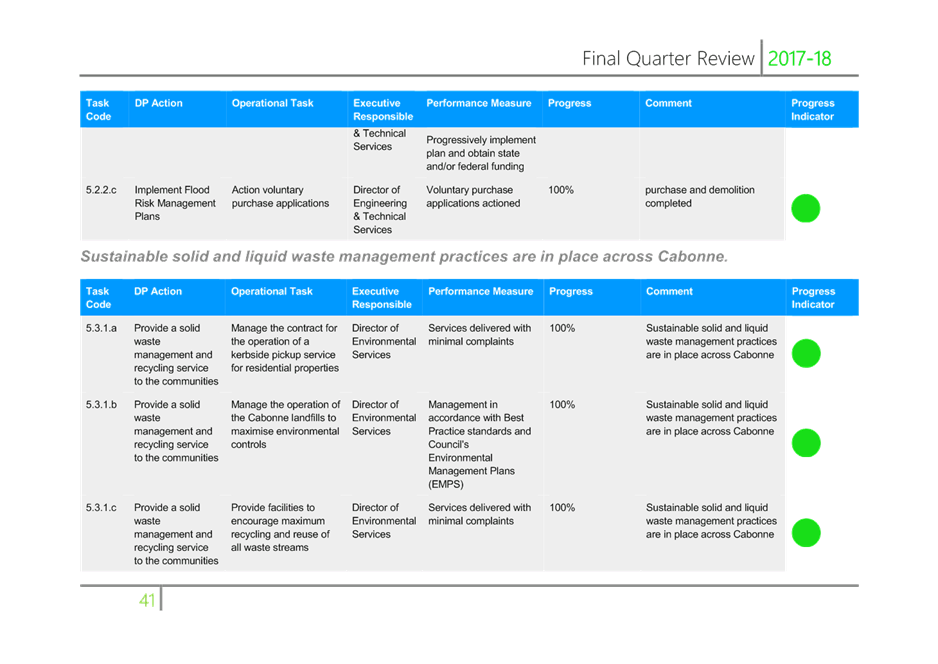








|
Item 14 Ordinary Meeting 24 July 2018
|
Item 14 - Annexure 1
|
 Corrupt Conduct – Reporting to
Corrupt Conduct – Reporting to
1 Document Information
|
Version
Date
(Draft or Council
Meeting date)
|
09
July 2018
|
|
Author
|
Administration Manager
|
|
Owner
(Relevant
director)
|
Director of Finance & Corporate Services
|
|
Status –
Draft,
Approved, Adopted by Council, Superseded or Withdrawn
|
Draft
|
|
Next
Review Date
|
Within 12 months of Council being elected
|
|
Minute
number
(once adopted by
Council)
|
|
2 Summary
A
requirement that all Councillors familiarise themselves with the ICAC
Publication titled: “Reporting suspected corrupt conduct to the ICAC:
Guidelines for principal officers”.
3 Approvals
|
Title
|
Date Approved
|
Signature
|
|
Director of Finance & Corporate
Services
|
|
|
4 History
|
Minute No.
|
Summary of Changes
|
New Version Date
|
|
00/03/12
|
|
20/03/00
|
|
|
Reviewed by Administration Manager – ICAC website still
lists this procedure as most current
|
27/08/08
|
|
10/02/17
|
Readopted by Council
|
15 February 2010
|
|
13/06/21
|
Reviewed by Administration
Manager – updated with latest version of ICAC publication
|
25 June 2013
|
|
13/09/30
|
Readopted as per s165(4)
|
17 September 2013
|
5 Reason
The
General Manager has obligations under ICAC Act to report suspected corrupt
conduct which councillors need to be aware of.
6 Scope
A
report must be made as soon as the General Manager has a reasonable suspicion
that corrupt conduct may have occurred or may be occurring. The
obligation to report may not be delegated.
7 Associated Legislation
Independent Commission Against
Corruption Act 1988
8 Definitions
ICAC – the Independent Commission Against Corruption
The
ICAC Act - Independent Commission
Against Corruption Act 1988
Corrupt
conduct – refer to Policy
Statement
Principal
Officer – The General Manager
of the Council
9 Responsibilities
9.1 General Manager
The
General Manager is responsible for the overall control and implementation of
the policy.
9.2 Directors and Managers
Directors
and Managers are responsible for the control of the policy and procedures
within their area of responsibility.
10 Related Documents
|
Document Name
|
Document Location
|
|
Public Interest Disclosures
(Internal Reporting) Policy
|
Policy Database
|
|
Code of Conduct - Procedure for the
Administration of Policy
|
Policy Database
|
|
ICAC Fact Sheet
– Blowing the Whistle
|
ICAC website
|
|
Section 11 reporting Template
|
At end of this
policy
|
11 Policy Statement
All
Councillors are to familiarise themselves with the ICAC Publication titled
“Reporting suspected corrupt conduct to the ICAC: Guidelines for
principal officers”.
Table of Contents
1. About these guidelines. 3
2. About the ICAC.. 3
3. Your Obligations under the
ICAC Act 4
4. What is corrupt conduct?. 5
5. Making a section 11 report
to the ICAC.. 6
6. What to do after a report
has been made. 7
7. How reports are assessed
by the ICAC.. 7
8. Feedback from the ICAC.. 8
9. The benefits of section 11
reporting. 8
Contacting the
ICAC.. 8
Section 11
reporting Template. 9
Reporting suspected corrupt
conduct to the ICAC: Guidelines for principal officers
1. About
these guidelines
These guidelines are intended to help you
as a principal officer understand your obligation under section 11 of the Independent
Commission Against Corruption Act 1988 to report suspected corrupt conduct
to the ICAC. The guidelines also explain how to report to the ICAC and
the process the ICAC follows once your report is received. Separate
guidelines exist regarding ministerial reporting obligations.
2. About
the ICAC
The ICAC was established under the Independent
Commission Against Corruption Act. The main purpose of the ICAC is to
expose and minimise corruption in the NSW public sector, which includes all
government departments, statutory authorities, local councils and public
officials, including Members of Parliament and the judiciary. It does
this by conducting investigations, examinations and inquiries, providing
corruption prevention advice, and informing and educating both the public
sector and the community about the detrimental effects of corruption.
Most of the ICAC’s work arises from reports made
by public authorities and information received from the public.
Consequently, the quality of this information is a significant factor
influencing the ICAC’s effectiveness in fighting corruption.
The ICAC does not attempt to investigate every matter
it receives and could not do so with the resources available to it.
However, even if the resources were available the ICAC considers that such a
strategy would be counter-productive because public sector managers and their
organisations are primarily the ones responsible for preventing, detecting and
responding to corruption. The ICAC’s role is to deal with those
matters that the public sector cannot or should not deal with. The ICAC
also works with public authorities to ensure they have the skills and
commitment to undertake most of the day-to-day corruption prevention and
investigation work.
This approach means that only a very small number of
reports made by public authorities end up becoming full investigations or the
subject of public inquiries. Nevertheless, the reporting requirement
benefits your organisation and the broader public sector in a number of ways
which are outlined below.
3. Your
Obligations under the ICAC Act
Section 11(2) of the Act imposes an obligation on you
in the following terms:
“A person to whom this section
applies is under a duty to report to the Commission any matter that the person
suspects on reasonable grounds concerns or may concern corrupt conduct.”
Key terms and issues related to section 11 reporting
are explained below.
Who is a principal officer?
A principal officer is the person who heads the
authority, its most senior officer or the person who usually presides at its
meetings. This is most commonly the Secretary or Chief Executive Officer
of a state government authority, or the General Manager of a local
council. You should contact the ICAC for advice if you are uncertain
about who is the principal officer in your agency.
Duty to report suspected corrupt conduct
The duty to report resides with the principal officer
and cannot be delegated. Where another person is acting as principal
officer during periods of leave or other absence, the duty applies to that person.
The duty extends to any matter you become aware of and not just those
concerning your own agency.
Reasonable grounds for suspicion
The words suspects on reasonable grounds mean
there is a real possibility that corrupt conduct is or may be involved.
There needs to be more than idle speculation but there can be less than a firm
belief. Proof is not necessary. In some cases you may hold the
suspicion even though no individual has been identified. Such matters
should be reported.
Agencies often ask whether there is a cut off point,
whereby matters of a minor nature need not be reported. There is no easy
answer to what constitutes a minor matter. In the ICAC’s experience
the real question is whether the conduct gives rise to a suspicion that it may
involve corruption. For example, the fact that a staff member’s
cash register is short by a small sum of money on one occasion is unlikely to
give rise to a reasonable suspicion that they have stolen the money.
Repeated occurrences may give rise to a suspicion that the person is either
stealing money or is incompetent.
You are encouraged to contact the ICAC to discuss
particular matters that you may be unsure about or to seek clarification on any
issue of reporting corrupt conduct. However, as a general rule, if you
are unsure about a matter you are encouraged to err on the side of caution and
report it to the ICAC.
When must a report be made?
The brief answer to this question is as soon as you
have a reasonable suspicion that corrupt conduct may have occurred or may be
occurring. The ICAC Act contains no provision permitting delay in
reporting. The ICAC prefers matters to be reported prior to disciplinary
or other action being taken. To delay reporting can result in the loss of
investigative opportunities.
If you obtain additional information after submitting
your report, it will assist the ICAC if you provide that to us in a timely
manner.
Matters must be reported to the ICAC regardless of any
duty of secrecy or other restriction on disclosure. Your section 11 duty
to report overrides any obligation to maintain secrecy.
Internal Reporting Systems
Agencies need to have effective internal reporting
systems in place to enable corrupt conduct to be reported. It is
important that all staff members are aware of these systems, consider them safe
and believe that appropriate action will result from reports being made.
The ICAC can assist you with advice on how to develop
internal reporting systems and to deal with problems sometimes encountered with
such systems.
Maintaining confidentiality
It is important that reports to the ICAC be made
without advising the person(s) to whom the report relates and without
publicity. Failure to handle reports to the ICAC confidentially may
prejudice any subsequent investigation and may cause unnecessary damage or
embarrassment to individuals.
Protection of the principal officer
Section 11 reporting is a statutory duty. It has
effect despite any duty of secrecy or other restriction on disclosure.
Provided reports are made in good faith you, as the principal officer, are
protected from any criminal or civil liability. This is the case even if
the suspicion on which the report is based turns out to be untrue or
unsubstantiated. (See s109(5) of the ICAC Act and also s27(d) of the Defamation
Act 2005.)
4. What
is corrupt conduct?
Corrupt conduct is defined under the ICAC Act. It involves deliberate or intentional wrongdoing
involving (or affecting) a public official or public authority in NSW.
Public officials include people working in government
departments, statutory authorities and local councils in NSW, as well as judges
and magistrates and elected officials such as Parliamentarians and local
government councillors.
For conduct to be considered corrupt under the ICAC
Act definition it has to be serious enough to involve a criminal or
disciplinary offence, be grounds for dismissal, or, in the case of Members of
Parliament, involve a substantial breach of their code of conduct.
However, at the point you report to the ICAC you need not know with any
certainty that this seriousness test can be satisfied as this will often only
be known after a full investigation.
Some examples of corrupt conduct by public
officials that fall within this definition include:
· A company wants to do business with the
government and pays a public official to choose that company for the job.
· A public official accepts money or a gift
to promote a development application.
· A public official bypasses recruitment
procedures to employ friends or family members.
· A public official accesses confidential
driver licence information as a favour to a friend.
· A public official uses a corporate credit
card to pay for personal items.
· A public official extorts money from a
disabled client in their care.
· A public official uses a work computer and
e-mail address to run a private internet business.
If you are unsure whether a complaint or
suspected activity involves corrupt conduct, you are encouraged to err on the
side of caution and report it to the ICAC.
5. Making
a section 11 report to the ICAC
Generally a report should be made in writing.
However, with serious matters it may be advisable to report initially by telephone
if you consider that some urgent investigative action may be required. A
written report should then follow. If you have any queries, please
contact the manager of the assessments section for advice on (02) 8281 5786.
If your agency has significant numbers of relatively
minor matters to report, you may seek approval from the ICAC to report some
categories of matters by way of a schedule.
All section 11 reports should be addressed to the
Commissioner of the ICAC, and marked to the attention of the Manager
Assessments.
What should be included in a report?
Your report should describe what has happened.
The nature and the seriousness of the allegation should be clear from your
report. Descriptions such as “theft”, “fraud”,
“improper conduct”, “assault” or “failure to
declare a conflict of interest” are insufficient.
The checklist in the box below is a guide to what the
report should include:
|
SECTION 11 REPORT CHECKLIST
|
|
'
|
a complete description of the allegations
|
|
'
|
the name and position of any public
official/s alleged to be involved
|
|
'
|
the name/s of the person/s who made the
allegation/s
|
|
'
|
the name and role of any other person/s
relevant to the matter
|
|
'
|
the dates and/or time frames in which the
alleged conduct occurred
|
|
'
|
an indication as to whether the conduct
appears to be a one-off event or part of a wider pattern or scheme
|
|
'
|
the date the allegation was made or the
date you became aware of the conduct
|
|
'
|
what your organisation has done about the
suspected conduct, including notification to any other agency (for example,
the NSW Police Force or the NSW Ombudsman)
|
|
'
|
what further action you propose
|
|
'
|
the approximate amount of money or value
of resources (if any) involved
|
|
'
|
any other indicators of seriousness
|
|
'
|
any other information deemed relevant to the matter
|
|
'
|
copies of any relevant documents
|
|
'
|
the name of the relevant contact officer
|
|
'
|
whether or not the matter is a public
interest disclosure under the Public Interest Disclosures Act 1994
|
If the matter is a public interest disclosure
under section 27 of the Public Interest Disclosures Act 1994, we may need to
notify the disclosant of the action the ICAC has taken, or proposes to take,
within six months of the disclosure occurring. We will therefore require
the contact details, unless the information was received anonymously, of any
person who has made a public interest disclosure.
The ICAC’s website includes a section 11
template reporting form, which you can download at www.icac.nsw.gov.au
6. What
to do after a report has been made
The ICAC will assess the information you have
provided. We may contact you for more information.
In the meantime, you should discuss with us any
proposed steps you wish to take before you take them. It can prejudice
any action we may take if you commence an investigation without consultation.
Reporting to the ICAC does not affect obligations to
report or refer matters to other bodies such as the NSW Police Force, the Audit
Office of NSW or the NSW Ombudsman or to carry out disciplinary procedures
after consultation with the ICAC. For example, if you have reported a
criminal matter to the ICAC you should also report it to the NSW Police Force
Fraud matters can also be reported to the Audit Office
of NSW.
7. How
reports are assessed by the ICAC
The ICAC carefully reviews every section 11 report it
receives. All reports are referred to a panel of senior officers who make
decisions about what action the ICAC should take. Most often that panel decides
that section 11 matters should be left with the reporting authorities to deal
with. The possible range of options, depending on the seriousness of the
reported information, includes:
· Further assessment to consider the
significance of the information to the ICAC’s prevention work and whether
advice should be provided to the reporting agency
· Referral to an appropriate authority with a
requirement that it investigate and report back to the ICAC. (The power to make such a referral is
contained in section 53 of the Act. Should such a referral be proposed
you will be consulted about the terms of the referral and provided with
information about how to meet the requirements of the referral.)
· Referral to another agency considered by
the ICAC to be appropriately placed to deal with the information
· Initial inquiries to be conducted by the
ICAC
· Immediate allocation to an ICAC
investigative team with a view to formal investigation.
8. Feedback
from the ICAC
The ICAC acknowledges all reports received.
After a report is assessed, a letter will be sent to you outlining the
ICAC’s decision and further action to be taken in relation to your
report, if any is required.
9. The
benefits of section 11 reporting
Developing and maintaining an effective capacity to
satisfy this statutory obligation will enable you to be better informed.
This is because it will require your organisation to have in place effective
internal reporting systems for staff to report concerns or suspicions about
corruption and an effective mechanism for receiving and responding to
information from customers and contractors which may concern corruption.
The ICAC uses the information in section 11 reports it
receives to improve its understanding of the nature and scope of corruption and
corruption risks in the NSW public sector. Whether or not a report is
significant in its own right, its aggregation with other matters may assist to
identify systemic corruption issues. Greater knowledge of trends in
corruption supports the ICAC’s work with the public sector to bring about
long-term changes to attitudes and practices.
The ICAC Act is available from the ICAC website www.icac.nsw.gov.au
Contacting
the ICAC
For further information and assistance on reporting
corrupt conduct in general, and other issues raised in these guidelines,
including any queries about public interest disclosures, please contact the
manager of the assessments section on (02) 8281 5786.
For corruption prevention advice, contact the
Corruption Prevention Division on (02) 8281 5999.
Section
11 reporting Template
Report of suspected corrupt conduct under
s. 11 ICAC Act
The notification form and any other
related documents can be sent to the ICAC by:
· mail
· hand
delivery, or
· courier.
Correspondence addressed to:
The
Commissioner
Independent
Commission Against Corruption
GPO Box 500
SYDNEY NSW 2001
Attention: Manager Assessments
Personal delivery:
Level 7
255 Elizabeth Street,
SYDNEY NSW 2000
The notification form and relevant
documents can be sent by email. However care should be taken to ensure
that the documents are correctly addressed, are not copied to persons who are
not entitled to the information and cannot be accessed by unauthorised persons.
The notification form can be emailed to:
icac@icac.nsw.gov.au
As the duty to report suspected corrupt
conduct resides with an agency’s principal officer and cannot be delegated,
there needs to be a covering letter accompanying this form, signed by the
principal officer.
Any queries can be directed to the Manager
Assessments on (02) 8281 5786.
|
1.1
|
Name:
|
|
Your
ref number:
|
|
|
2.1
|
Name:
|
|
2.2
|
Position
title:
|
|
2.3
|
Address:
|
|
2.4
|
Telephone:
|
E-mail
address:
|
3. Details of each person against whom the
allegation/s has been made
|
3.1
|
Does
this notification contain allegations of corrupt conduct against more than
one person?
|
Yes No
|
|
3.1a
|
If
yes, how many? (Please
copy this page for each person)
|
|
3.2
|
Family
name:
|
|
3.3
|
Given
names:
|
|
3.4
|
Gender: Male Female Date of birth: Employee
no:
|
|
3.6
|
Home
address:
|
|
3.7
|
Home
phone:
|
|
3.8
|
Position
title at time allegation made:
|
|
3.9
|
Employment
status with agency at the time the allegation was made (tick all applicable):
Permanent Part-time Casual Contractor
Other (state)
|
|
3.10
|
Work
address at the time of the alleged incident:
|
|
3.11
|
Is
the person/s aware that corrupt conduct allegations have been made against
them?
Yes
No
Unknown
If
yes, please complete sections 3.12
|
|
3.12
|
Who
informed the person the subject of the allegation/s?:
Your agency (name of person):
Another agency (state which):
Other (describe):
Unknown
Date
informed, if known:
|
|
3.13
|
Have
prior corrupt conduct allegations been made against the employee?
Yes No Unknown
|
|
3.14
|
If
yes, when was the most recent? Within
2yrs 2-5yrs
More than 5yrs ago
|
|
3.15
|
What
was the result or finding of the investigation in regard to the prior
allegation/s?
|
|
3.16
|
What
action has been taken or is proposed by the agency in respect of the subject
employee while the current allegation is being investigated and until
final decisions are made?
No action (state the current reason)
Increased supervision (describe)
Restriction on current duties (specify)
Transferred to alternate duties (specify)
Suspended with pay
Suspended without pay
Not re-engaged
Not relevant as matter finalised
|
4. Details of the allegations of corrupt conduct
|
4.1
|
Date
of alleged incident/s:
|
|
4.2
|
Location
of alleged incident/s:
|
|
4.3
|
Detailed
description of corrupt conduct. Attach relevant documentation
where available:
|
|
4.4
|
Is
the conduct a one-off event or part of a wider pattern or scheme? One-off wider pattern/scheme
|
|
4.5
|
When
did your agency become aware of the allegations?
|
|
4.6
|
Contact
details of the source of the allegations.
If
the matter is being treated as a public interest disclosure, please complete
Section 5
|
|
4.7
|
Do
the allegations involve money or resources? Yes No.
If
Yes, outline the approximate amount or value of the resources:
|
5. Disclosures under
the Public Interest Disclosures Act 1994 (the PID Act)
Under s. 27 of the PID Act, the Commission may
be required to notify the discloser of ICAC action. If you have any concerns
about releasing contact details, please let us know.
|
5.1
|
Does
this notification arise out of a public interest disclosure?
|
Yes No
|
|
5.1a
|
If
yes, how many persons are to be protected? (Please
copy this page for each person and provide details below).
|
|
5.2
|
Family
name:
|
|
5.3
|
Given
names:
|
|
5.4
|
Gender: Male Female
|
|
5.5
|
Home
address:
|
|
5.6
|
Home
phone:
|
|
5.7
|
Position
title at time allegation made:
|
|
5.8
|
Employment
status with agency at the time the allegation was made (tick all applicable):
Permanent Part-time Casual Contractor
Other (state)
|
|
5.9
|
Work
address at the time of the alleged incident:
|
|
5.10
|
Has
support been offered/provided to the
employee? Yes No Unknown
|
|
5.11
|
If
yes, what kind?
|
|
5.12
|
If
no, why not?
|
6. Interim action
taken or proposed in respect of the corrupt conduct allegation(s)
|
6.1
|
Have
you informed another agency? Yes No Unknown Not applicable
|
|
6.1a
|
If yes, name/s
|
|
6.1b
|
When
was that agency notified?
|
|
6.1c
|
Contact
details of the person to whom it was reported (telephone, email and postal
address)
|
|
6.1d
|
Does
that agency intend to take, or has that agency taken, any action?
Yes No Unknown If yes, detail that action
taken:
|
|
6.2
|
Other than action outlined in 3.16, what action has
your agency taken to date and why?
|
|
6.3
|
Other than action outlined in 3.16, what action is
your agency proposing to take and why?
|
|
Item 14 Ordinary Meeting 24 July 2018
|
Item 14 - Annexure 2
|
 Donations Policy
Donations Policy
1 Document Information
|
Version
Date
(Draft or Council
Meeting date)
|
09
July 2018
|
|
Author
|
Administration Manager
|
|
Owner
(Relevant
director)
|
Director of Finance & Corporate Services
|
|
Status –
Draft, Approved,
Adopted by Council, Superseded or Withdrawn
|
Draft
|
|
Next
Review Date
|
Within 12 months of Council being elected
|
|
Minute
number
(once adopted by
Council)
|
|
2 Summary
Provides for assistance given
by Council by way of donations.
3 Approvals
|
Title
|
Date Approved
|
Signature
|
|
General Manager
|
|
|
4 History
|
Minute No.
|
Summary of Changes
|
New Version Date
|
|
|
Compilation of various policies:
“Donations”, “Men’s Shed”,” Molong
Advancement Group – Use of Mitchell Room”, “S356 Funds
– Report to Council”, “Provision of Telephone
Facilities”, “Donations under Section 356 to Offset Rate Levies
and Charges”; and addition of “DA Fees” Category.
|
|
|
12/12/12
|
Submitted for adoption
|
17 December 2012
|
|
13/09/30
|
Readopted as per s165(4)
|
17 September 2013
|
5 Reason
This policy was created
to document the way in which Council will support the community by way of a
variety of donations.
6 Scope
This policy applies to
individuals, community groups, not-for-profit organisations and S355 committees
whose actions or activities bring benefit to the Cabonne LGA.
This policy does not
include any support, initiatives or incentives available under Council’s
Economic Development Strategy.
7 Associated Legislation
Local Government Act
1993
8 Definitions
LGA – Local
Government Area
Men’s
Shed - A
place where men can meet and engage in practical recreational pursuits and
build up support networks among their peers.
DA fees and charges
eligible to be donated - limited to:
a. Development
application fee
b. *Construction
certificate fee
c. *Complying
Development Certificate fee
*-
only when issued by Council – not by private certifiers.
Aged Units - relates
to approved non-resident funded aged accommodation facilities for people on low
income
9 Responsibilities
9.1 General Manager
The
General Manager is responsible for the overall control and implementation of
the policy.
9.2 Directors and Managers
Directors
and Managers are responsible for the control of the policy and procedures
within their area of responsibility.
9.3 Director of Environmental Services
Responsible
for approving or preparing reports to Council in relation to applications for a
donation equivalent to DA fees as required by the policy.
9.4 Finance Manager
Responsible
to ensure donations and refunds are processed as per policy.
9.5 Community Services Manager
Responsible
to report on applications for donations and sponsorships assessed to be of
benefit to the wider community to Council for its consideration during
Community Services Committee and Council meetings.
10 Related Documents
|
Document Name
|
Document Location
|
|
Donation Application Form
|
My
Workspace/Letters and Templates/Public Application Forms
|
|
Economic Development Strategy
|
Council’s
website
|
|
A listing of all current
organisations, properties and levels of donation eligible for Rate and Charge
equivalent donations
|
Council’s
EDRMS system
|
11 Policy Statement
Council will provide assistance by way of donations in
the following categories:
1. donations and sponsorships in
response to applications assessed to be of benefit to the wider community
2. donations equivalent to General
Rate / Water / Sewer charges and reimbursement of some service charges
3. donations equivalent to refunds
of Development Application (DA) fees
4. Men’s Sheds –
donations of cash and or services
5. Progress Associations –
donation of room hire for meetings
Procedure
Requests for donations shall be on the prescribed
Donation Application Form: the covering report to Council will identify funding as being from the
s.356 budget and identify the availability of funds and the impact of the
expenditure on the budget.
An acknowledgment or full reply will be provided to
applicants within the days nominated in Council’s Customer Service
Guarantee.
1. Donations and sponsorship - applications
assessed to be of benefit to the wider community
Council will consider applications from individuals,
groups and organisations for sponsorship and donations toward events and
activities considered to be of benefit with priority given to those benefiting
the Cabonne community.
Applications will be submitted for consideration on
their merits at the Community Services Committee and/or Council meetings.
2. Rate and Charge equivalent donations
Council resolved a policy in 1988 that an amount equal
to the respective General Rates will be donated to Aged Units (as defined)
within the Cabonne LGA (19 December 1988
Minute No: 8910/9). Over time other
organisations have been added.
Council will contribute an amount equal to the rental
cost of telephones at Cudal, Cumnock, Eugowra, Manildra and Yeoval pools
subject to the Pool Committees meeting costs of calls: rental costs are to be
funded from the Pool Maintenance Vote.
3. Development Application (DA) fees
Council will donate an amount equal to refunding the
actual amounts paid as Council DA fees
and charges, as defined, in instances relating to Council owned / controlled or
Crown Land where the improvement would become a Council Asset.
Any requests for a
refund/donation of DA fees by Not-For-Profit/Community Organisations will be
submitted for consideration by Council with the amount to be refunded / donated
to be determined on a case by case basis.
For clarity it is noted
the following fees are not eligible for donation: statutory fees such as
long service levy, advertising, planning reform (plan first levy) and other
fees which may be charged including inspections, occupation certificate,
subdivision, subdivision certificates, integrated development and principal
certifying authority.
All
fees associated with development applications, construction certificate
applications and complying development applications are to be paid with the
application. Requests for a refund of DA fees are to be made in writing
on the prescribed form, stating the grounds or reasons justifying why Council
should donate an amount equal to the relevant fees.
Fees
to be donated back to the applicant will only be donated after determination of
the relevant application.
Council
staff may process any such requests within the limits of the policy. Any
requests exceeding the policy are to be reported to Council for consideration.
4. Men’s Shed
Men’s
Sheds in the Cabonne LGA are varied in their circumstances and needs with some
operating from Council controlled buildings and others meeting in places owned
by other organisations.
In
the past support given by Council has included:
1. The
donation of money
2. Supply
of Concrete for the construction of a new shed
3. Loans
on favourable terms
4. Assistance
in identifying grant opportunities
5. Assistance
in writing grant applications
6. The
use of Council owned/controlled Buildings
7. Lobbying
to other bodies
8. Waiving
of fees and charges both partial and full
For
all requests for assistance from Men’s Sheds that have not previously
secured more than minor assistance from Council, Council will:
1. Consider
making donations of up to $1,500.00 to assist with establishment costs
2. Consider
loaning funds to assist with establishment costs
3. Consider
waiving fees and charges
4. Provide
assistance in identifying grant opportunities
5. Provide
limited assistance in writing Grant Applications
6. Consider
requests to use Council owned buildings at favourable rates
7. Assisting
them in lobbying for the support of other organisations
For
all requests for assistance from Men’s Sheds that have previously
received substantial assistance from Council, Council will:
1. Consider
making donations of up to $200.00 to assist with new projects
2. Consider
waiving fees and charges
3. Provide
assistance in identifying grant opportunities
4. Provide
limited assistance in writing Grant Applications
5. Consider
requests to lease Council owned buildings at favourable rates
6. Assisting
them in lobbying for the support of other organisations
Council
may at its discretion consider other requests on an individual basis and be
mindful of treating all Men’s Sheds in Cabonne in an equitable manner.
|
Item 14 Ordinary Meeting 24 July 2018
|
Item 14 - Annexure 3
|
 Privacy Management Plan Policy
Privacy Management Plan Policy
1 Document Information
|
Version
Date
(Draft or Council
Meeting date)
|
28 June 2018
|
|
Author
|
Administration Manager
|
|
Owner
(Relevant director)
|
Director of Finance & Corporate
Services
|
|
Status
–
Draft, Approved, Adopted by Council, Superseded or Withdrawn
|
Draft
|
|
Next
Review Date
|
Within 12 months of Council being elected
or when information practices are reviewed
|
|
Minute
number
(once adopted by
Council)
|
|
2 Summary
Council
has as a matter of policy adopted a Privacy Management Plan which outlines
policies and practices to ensure compliance
with the Privacy and Personal Information
Protection Act 1998.
3 Approvals
|
Title
|
Date Approved
|
Signature
|
|
General Manager
|
|
|
4 History
|
Minute No.
|
Summary of Changes
|
New
Version Date
|
|
00/07/6
|
First
adopted
|
17
July 2000
|
|
10/02/17
|
Readopted
by Council
|
15
February 2010
|
|
|
Not
further reviewed as advice received that the Division of Local Government,
Department of Premier and Cabinet and the Office of the NSW
Privacy Commissioner are currently reviewing the Model Privacy
Management Plan for Local Government
|
Email dated 11 April 2011
(doc ID
233565 refers)
|
|
13/09/30
|
Readopted
as per s165(4)
|
17 September 2013
|
|
13/10/10
|
Updated
based on the release of a
new Model Privacy Management Plan for Local Government by the DLG January
2013.
|
15 October 2013
|
|
15/02/11
|
Updated
with addition of timeframes for review by the Administrative Decisions
Tribunal – see 6.3
|
24 February 2015
|
Reason
The Privacy and Personal Information
Protection Act 1998 (the “PPIPA”) requires all councils to
prepare a Privacy Management Plan outlining their policies and practices to
ensure compliance with the requirements of that Act and the Health Records
and Information Privacy Act 2002 (the HRIPA).
5 Scope
Council collects, stores and
uses a broad range of information. A significant part of that information is personal information. This Plan applies to
that part of the Council’s
information that is personal information.
This Plan applies, wherever practicable, to:
• Councillors;
• Council
employees;
• Consultants
and contractors of the Council;
• Council
owned businesses; and
• Council
committees (including community members of those committees which may be
established under section 355 of the LGA).
6 Associated Legislation
Local Government Act 1993
Privacy and Personal Information Protection Act
1998
Health Records and Information Privacy Act 2002
Government
Information (Public Access) Act
2009
Plus others - refer to Plan.
7 Definitions
HRIPA - Health Records and Information Privacy Act 2002
LGA - Local Government Act 1993
PPIPA - The Privacy and Personal Information Protection Act 1998
Plus others - refer to Plan
8 Responsibilities
8.1 General Manager
The
General Manager has the responsibilities referred to within the Plan.
8.2 Administration Manager
The
Administration Manager has the responsibilities attributed to the Public Officer and those assigned to the role of the
Privacy Contact Officer referred to within the Plan.
8.3 Others
Others including councillors, employees, contractors, consultants and
members of s355 committees have the responsibilities included in the relevant
legislation and this Plan.
9
Related Documents
|
Document Name
|
Document Location
|
|
Privacy Code of Practice for Local Government June 2010
|
Magiq
Documents – Doc Id 456297
|
|
OLG Director General’s guidelines re Companion Animals Register
|
OLG
website
|
10 Policy Statement
TABLE OF
CONTENTS
Preface. 5
Part 1
– Introduction. 5
1.1 What is “personal information”?. 6
1.2 What is not “personal information” 6
1.3 Policy on Electoral Rolls. 7
1.4 Application of this Plan.. 7
1.5 Personal Information held by Council 8
1.6 Applications for suppression in relation to general
information (not public registers). 8
1.7 Caution as to unsolicited information.. 9
Part 2
– Public Registers. 10
2.1 Public registers, the PPIPA and the HRIPA.. 11
2.2 Effect on section 6 of the GIPA Act 11
2.3 Where some information in the public register has been
published. 12
2.4 Disclosure of personal information contained in the public
registers. 12
2.5 Purposes of public registers. 12
2.6 Applications for access to own records on a public register 14
2.7 Applications for suppression in relation to a public
register 14
2.8 Other registers. 15
Part 3
– The Information Protection Principles. 16
3.1 Information Protection Principle 1 – Section 8. 16
3.2 Information Protection Principle 2 – Direct Collection.. 18
3.3 Information Protection Principle 3 - Requirements when
collecting personal information 20
3.4 Information Protection Principle 4 - Other requirements
relating to collection of personal information.. 23
3.5 Information Protection Principle 5 - Retention and security
of personal information 24
3.6 Information Protection Principle 6 - Information held by
agencies. 25
3.7 Information Protection Principle 7 - Access to personal
information held by agencies 26
3.8 Information Protection Principle 8 - Alteration of personal
information.. 27
3.9 Information Protection Principle 9 - Agency must check
accuracy of personal information before use. 30
3.10 Information
Protection Principle 10 - Limits on use of personal information.. 30
3.11 Information
Protection Principle 11 - Limits on disclosure of personal information 33
3.12 Information
Protection Principle 12 - Special restrictions on disclosure of personal
information.. 36
Part 4
– Health Privacy Principles. 39
Part 5
– Implementation of the Privacy Management Plan. 56
5.1 Training Seminars/Induction. 56
5.2 Responsibilities of the Privacy Contact Officer 56
5.3 Distribution of information to the public. 57
Part 6
– Decision Review options. 58
6.1 How does the process of Internal Review operate?. 58
6.2 What happens after an Internal Review?. 58
6.3 Is there a timeframe for a review by the Administrative
Decisions Tribunal?. 59
Part 7
– Other Relevant Matters. 60
7.1 Contracts with consultants and other private contractors. 60
7.2 Confidentiality. 60
7.3 Misuse of personal or health information. 60
7.4 Regular review of the collection, storage and use of
personal or health information 60
7.5 Regular review of Privacy Management Plan.. 60
7.6 Further information.. 60
Part 8
– Appendices. 61
Appendix 1: Statutory Declaration for access under Section
57 of the Privacy and Personal Information Protection Act 1998 to a Public
Register held by Council 62
Appendix 2: Base wording for Privacy Notification and Sample. 63
- Section 10 (Pre – Collection) 63
Appendix 3: Base wording for Privacy Notification and Sample. 64
- Section 10 (Post – Collection) 64
Appendix 4: Application under Section 13 of the Privacy and
Personal Information Protection Act 1998: To determine whether Council holds
personal information about a person. 65
Appendix 5: Application under section 14 of the Privacy And
Personal Information Protection Act 1998: For access to Applicant’s
Personal Information.. 66
Appendix 6: Application under section 15 of the Privacy and
Personal Information Protection Act 1998: For alteration of Applicant’s
Personal Information. 67
Preface
The Privacy and Personal Information Protection Act 1998 (the
“PPIPA”) requires all councils to prepare a Privacy Management Plan
outlining their policies and practices to ensure compliance with the
requirements of that Act and the Health Records and Information Privacy Act
2002 (the HRIPA).
In
particular, the object of this plan is to inform:
· The community
about how their personal information will be used, stored and accessed after it
is collected by the Council; and
· Council staff of
their obligations in relation to handling personal information and when they
can and cannot disclose, use or collect it.
Part 1 – Introduction
The Privacy and Personal Information Protection
Act 1998 (“PPIPA”) provides for the protection of personal
information and for the protection of the privacy of individuals.
Section 33 of the PPIPA requires all councils to
prepare a Privacy Management Plan (the “Plan”) to deal with:
· the devising of policies and practices to ensure
compliance by the Council with the requirements of the PPIPA and the Health
Records and Information Privacy Act 2002 (“HRIPA”);
· the dissemination of those policies and practices
to persons within the Council;
· the procedures that the Council proposes for
internal review of privacy complaints;
· such other matters as are considered relevant by
the Council in relation to privacy and the protection of personal information
held by it.
This Plan has been prepared for the purpose of
section 33 of the PPIPA.
PPIPA provides for the protection of personal
information by means of 12 Information Protection Principles. Those
principles are listed below:
Principle 1 - Collection of personal
information for lawful purposes
Principle 2 - Collection of personal
information directly from individual
Principle 3 - Requirements when
collecting personal information
Principle 4 - Other requirements
relating to collection of personal information
Principle 5 - Retention and security
of personal information
Principle 6 - Information about
personal information held by agencies
Principle 7 - Access to personal
information held by agencies
Principle 8 - Alteration of personal
information
Principle 9 - Agency must check
accuracy of personal information before use
Principle 10 - Limits on use of
personal information
Principle 11 - Limits on disclosure
of personal information
Principle 12 - Special restrictions
on disclosure of personal information
Those principles are modified
by the Privacy Code of Practice for Local Government (“the Code”)
made by the Attorney General. To date there has been no Health Records
and Information Privacy Code of Practice made for Local Government.
The Privacy Code has been developed
to enable Local Government to fulfil its statutory duties and functions under
the Local Government Act 1993 (the “LGA”) in a manner that
seeks to comply with the PPIPA.
This Plan outlines how the Council
will incorporate the 12 Information Protection Principles into its everyday
functions.
This Plan should be read in conjunction with the Code of Practice for
Local Government.
Nothing in this Plan is to:
· affect any matter of interpretation of the Codes
or the Information Protection Principles and the Health Privacy Principles as
they apply to the Council;
· affect any obligation at law cast upon the
Council by way of representation or holding out in any manner whatsoever;
· create, extend or lessen any obligation at law
which the Council may have.
This Plan is designed to introduce
policies and procedures to maximise compliance with the PPIPA and the HRIPA.
Where the Council has the benefit of an exemption, it will nevertheless
describe procedures for compliance in this Plan. By doing so, it is not
to be bound in a manner other than that prescribed by the Codes.
Council collects, stores and uses a
broad range of information. A significant part of that information is
personal information. This Plan applies to that part of the
Council’s information that is personal information.
It may mean in practice that any
information that is not personal information will receive treatment of a higher
standard; namely treatment accorded to personal information where the information
cannot be meaningfully or practicably separated.
1.1 What
is “personal information”?
“Personal information”
is defined in section 4 of the PPIPA as follows:
Personal information is defined to
mean information or an opinion about an individual whose identity is apparent
or can reasonably be ascertained from the information or opinion. This
information can be on a database and does not necessarily have to be recorded
in a material form.
1.2 What
is not “personal information”
“Personal information”
does not include “information about an individual that is contained in a
publicly available publication”. Personal information, once it is
contained in a publicly available publication, ceases to be covered by the
PPIPA.
Section 4A of the PPIPA also
specifically excludes “health information”, as defined by section 6
of the HRIPA, from the definition of “personal information”, but
includes “health information” in the PPIPA’s consideration of
public registers (discussed below). “Health information” is
considered in Part 4 of this Plan.
Where the Council is requested to
provide access or make a disclosure and that information has already been
published, then the Council will rely on the provisions of the relevant Act
that authorises Council to hold that information and not the PPIPA (for
example, section 8 of the Government Information (Public Access) Act 2009 (GIPA
Act).
Council considers the following to
be publicly available publications:
· An advertisement containing personal information
in a local, city or national newspaper;
· Personal information on the Internet;
· Books or magazines that are printed and
distributed broadly to the general public;
· Council Business papers or that part that is
available to the general public;
· Personal information that may be a part of a
public display on view to the general public.
Information published in this way
ceases to be covered by the PPIPA.
Council’s decision to publish
in this way must be in accordance with PPIPA.
1.3 Policy
on Electoral Rolls
The Electoral Roll is a publicly
available publication. Council will provide open access to the Electoral
Roll by the public being able to use computers in Council’s libraries at Canowindra, Manildra and Molong
to access electoral bodies’ rolls. Council will refer any requests for copies of the Electoral Roll to the
State Electoral Commissioner.
1.4 Application
of this Plan
The PPIPA, the HRIPA and this Plan
apply, wherever practicable, to:
· Councillors;
· Council employees;
· Consultants and contractors of the Council;
· Council owned businesses; and
· Council committees (including community members
of those committees which may be established under section 355 of the LGA).
Council will ensure that all such
parties are made aware that they must comply with the PPIPA, the HRIPA, any
other applicable Privacy Code of Practice and this Plan.
1.5 Personal
Information held by Council
The Council holds personal information concerning Councillors, such as:
· personal contact information;
· complaints and disciplinary matters;
· pecuniary interest returns; and
· entitlements to fees, expenses and facilities.
The Council holds personal
information concerning its customers, ratepayers and residents, such as:
· rates records; and
· DA applications and objections; and
· various types of health information (see Part 4
for detailed examples).
The Council holds personal information concerning its employees, such
as:
· recruitment material;
· leave and payroll data;
· personal contact information;
· performance management plans;
· disciplinary matters;
· pecuniary interest returns;
· wage and salary entitlements; and
· health information (such medical certificates and
workers compensation claims).
1.6 Applications
for suppression in relation to general information (not public registers).
Under section 739 of the LGA a
person can make an application to suppress certain material that is available
for public inspection in circumstances where the material discloses or would
disclose the person’s place of living if the person considers that the
disclosure would place the personal safety of the person or their family at
risk.
Section 739 of the LGA relates to
publicly available material other than public registers. As such, it
limits disclosure in those circumstances where an application for suppression
is successful. An application for suppression must be verified by
statutory declaration and otherwise meet the requirements of section 739.
When in doubt, Council will err in favour of suppression.
For more information regarding
disclosure of information (other than public registers) see the discussion of
IPPs 11 and 12 in Part 3 of this Plan. For information regarding
suppression of information on public registers, see Part 2 of this Plan.
1.7 Caution
as to unsolicited information
Where an individual, a group or committee, not established by Council,
gives Council unsolicited personal or health information, then that information
should be still treated in accordance with this Plan, the Codes, the HRIPA and
the PPIPA for the purposes of IPPs 5-12 and HPPs 5-15 which relate to storage,
access, use and disclosure of information.
Note that for the purposes of section 10 of the HRIPA, the Council is
not considered to have “collected” health information if the
receipt of the information by the Council is unsolicited.
Section 4(5) of the PPIPA also provides that personal information is not
“collected” by Council if it is unsolicited.
Part 2 – Public Registers
A public register is defined in
section 3 of the PPIPA:
“…public register
means a register of personal information that is required by law to be, or is
made, publicly available or open to public inspection (whether or not on
payment of a fee).”
A distinction needs to be drawn between “public registers”
within the meaning of Part 6 of the PPIPA and “non public
registers”. A “non public register” is a register but
it is not a “public register” for the purposes of the PPIPA.
For example, the register might not be publicly available or it may not contain
personal information.
Disclosure in relation to public registers must comply with Part 6 of
the PPIPA and the Privacy Code. Personal
information cannot be accessed by a person about another person unless the
personal information is contained in a public register. Where personal
information is contained in a public register, then Part 6 of the PPIPA applies
to determine whether access to that information will be given to another
person.
Disclosure in relation to all other personal information must comply
with the Information Protection Principles as outlined in Part 2 of this Plan
and the Privacy Code where it includes personal information that is not
published.
The Council holds the following public
registers under the LGA: ***
· Section 53 - Land Register
· Section 113 - Records of Approvals;
· Section 449 -450A - Register of Pecuniary
Interests;
· Section 602 - Rates Record.
***Note – this is purely
indicative. Council may, by virtue of its own practice, hold other Public
Registers, to which the PPIPA applies.
Council holds the following public
registers under the Environmental Planning and Assessment Act:
· Section 4.58 – Register of consents and
certificates
· Section 6.26(8) – Record of building
information certificates issued
Council holds the following public
register under the Protection of the Environment (Operations) Act:
· Section 308 – Public register of licences
held
Council holds the following public
register under the Impounding Act 1993:
· Section 30 & 31 – Record of impounding
Members of the public may enquire
only in accordance with the primary purpose of any of these registers.
The primary purpose for each of these public registers is set out in the sections
that follow.
2.1 Public
registers, the PPIPA and the HRIPA
A public register generally confers
specific rights or privileges, a benefit, or status, which would not otherwise
exist. It may be required by law to be made publicly available or open to
public inspection, or it is simply made publicly available or open to public
inspection (whether or not payment is required).
Despite the exclusion of
“health information” from the definition of “personal
information” under section 4A of the PPIPA, section 56A of the PPIPA includes
as “personal information”, “health information”
on public registers.
Section 57 of the PPIPA requires
very stringent controls over the disclosure of personal information contained
in a public register. It provides broadly that where Council is
responsible for keeping a public register, it will not disclose any personal
information kept in that register unless it is satisfied that the information
is to be used for a purpose relating to the purpose of the register or the Act under
which the register is kept.
Section 57 (2) provides that in
order to ensure compliance with section 57(1), a Council may require any person
who applies to inspect personal information contained in the public register to
give particulars in the form of a statutory declaration as to the proposed use
of that information. (Form at Appendix 1 may be used a guide)
Councils also need to consider the
Privacy Code of Practice for Local Government which has the effect of modifying
the application of Part 6 of the PPIPA (the “public register”
provisions).
If the stated purpose of the applicant
does not conform with the purpose for which the public register is kept, access
to the information sought will not be given.
Where personal information is
contained in a publicly available publication, that information will not be
regarded as personal information covered by the PPIPA or as health information
for the purposes of part 6 of the PPIPA.
2.2 Effect
on section 6 of the GIPA Act
Section 57 of the PPIPA prevails
over clause 1(3) of Schedule 1 of the Government Information (Public Access)
Regulation 2009 (GIPA Regulation) to the extent of any inconsistency.
Therefore:
1. If
a register is listed in Schedule 1 of the GIPA Regulation, access must not be
given except in accordance with section 57(1) of the PPIPA.
2. If
a register is not listed in Schedule 1 of the GIPA Regulation, access must not
be given except:
(i) if
it is allowed under section 57(1) of the PPIPA; and
(ii) there
is no overriding public interest against disclosure of the information under
section 6 of the GIPA Act.
Note: Both 1 and 2 are amended with regard to
specific public registers in the Privacy Code of Practice for Local Government.
2.3 Where
some information in the public register has been published
That part of a public register that
is not published in a publicly available publication will be treated as a
“public register” and the following procedure for disclosure will
apply.
For example, the Register of
Consents and Certificates held by Council under section 4.58 of the
Environmental Planning and Assessment Act requires Council to advertise or
publish applications for development consent.
When Council publishes the address
of the property, it may identify the owner. The personal information that
has not been published and any applications not advertised or that have been
rejected or withdrawn (and hence also not published) will be treated as a
public register under PPIPA.
Council may hold a register under
the Contaminated Land Management Act on behalf of the Environment Protection
Authority. This is not to be considered a public register of the Council
as the statute does not place any obligations on the Council to make this register
publicly available as a register of contaminated land. Furthermore, the
legislation foreshadows that the Environment Protection Authority may indeed
post this list or register on the internet. This may constitute a
publication of the information and therefore the PPIPA will not apply.
Registers should not be published on
the internet.
2.4 Disclosure
of personal information contained in the public registers
A person seeking a disclosure
concerning someone else’s personal information from a public register
must satisfy Council that the intended use of the information is for a purpose
relating to the purpose of the register or the Act under which the register is
kept.
In the following section, by way of
guidance only, what might be called the “primary” purpose (or
“the purpose of the register”) has been specified for each
identified register. In some cases a “secondary purpose” has
also been specified, by way of guidance as to what might constitute “a
purpose relating to the purpose of the register”.
2.5 Purposes
of public registers
Purposes of public registers
under the Local Government Act
Section 53 - Land Register – The primary purpose is to identify all
land vested in Council, or under its control. The secondary purpose
includes a consideration of public accountability as to the land held by
Council. Third party access is therefore a secondary purpose.
Section 113 - Records of
Approvals – The primary
purpose is to identify all approvals granted under the LGA.
Section 450A - Register of Pecuniary
Interests – The primary
purpose of this register is to determine whether or not a Councillor or a
member of a council committee has a pecuniary interest in any matter with which
the council is likely to be concerned. There is a corresponding public
accountability purpose and third party access is a secondary purpose.
Section 602 - Rates Record - The primary purpose is to record the value of
a parcel of land and record rate liability in respect of that land. The
secondary purpose includes recording the owner or lessee of each parcel of
land. For example, that a disclosure on a section 603 (of the LGA) rating
certificate that a previous owner was a pensioner is considered to be allowed,
because the secondary purpose is “a purpose relating to the purpose of
the register”.
Purposes of public registers
under the Environmental Planning and Assessment Act
Section 4.58 – Register of
consents and certificates
– The primary purpose is to identify applications for development consent
and other approvals, confirm determinations on appeal and identify applications
for complying development certificates.
Section 6.28(8) – Record of
building information certificates
– The primary purpose is to identify all building certificates.
Purposes of public registers
under the Protection of the Environment (Operations) Act
Section 308 – Public
register of licences held
– The primary purpose is to identify all licences granted under the
Act.
Purposes of the public register
under the Impounding Act
Section 30 & 31 –
Record of impounding – The
primary purpose is to identify any impounding action by Council.
Secondary purpose of all Public
Registers
Due to the general emphasis (to be
found in the LGA and elsewhere) on local government processes and information
being open and accountable, it is considered that a secondary purpose for which
all public registers are held by Council includes the provision of access to members
of the public. Therefore disclosure of specific records from public
registers would normally be considered to be allowable under section 57 of the
PPIPA.
However, requests for access,
copying or the sale of the whole or a substantial part of a Public Register
held by Council will not necessarily fit within this purpose. Council
should be guided by the Privacy Code of Practice for Local Government in this
respect. Where Council officers have doubt as to the intended use of the
information, an applicant may be requested to provide a statutory declaration
so that Council may satisfy itself as to the intended use of the information.
Council will make its assessment as
to the minimum amount of personal information that is required to be
disclosed with regard to any request.
Other Purposes
Persons or organisations who apply
to Council to have access to the information contained in any public register
for a purpose not related to the purpose of the register, may be given access
at the discretion of Council but only in accordance with the Privacy Code of
Practice for Local Government concerning Public Registers.
2.6 Applications
for access to own records on a public register
A person wishing to have access to a
public register to confirm their own details needs only to prove their identity
to Council before having access to their own personal information.
2.7 Applications
for suppression in relation to a public register
An application for suppression in
relation to a public register will be dealt with under PPIPA, rather than
section 739 of the LGA.
A person about whom personal
information is contained (or proposed to be contained) in a public register,
may request Council under section 58 of the PPIPA to have the information
removed from, or not placed on the register.
If Council is satisfied that the
safety or well-being of any person would be affected by not suppressing the
personal information as requested, Council will suppress the information in
accordance with the request unless Council is of the opinion that the public
interest in maintaining public access to the information outweighs any
individual interest in suppressing the information, in accordance with section
58(2) of the PPIPA. (“Well-being” is defined in the Macquarie
Dictionary as “the good or satisfactory condition of existence;
welfare”.)
When in doubt, Council will err in
favour of suppression.
Any information that is removed
from, or not placed on, that aspect of a public register to be made public may
be kept on the register for other purposes. That is, the information may
still be used for council functions, but it cannot be disclosed to other
parties.
An application for suppression
should be made in writing addressed to the General Manager and must outline the
reasons for the request. The Council may require supporting documentation
where appropriate.
2.8 Other
registers
Council may have other registers
that are not public registers. The Information Protection Principles,
this Plan, any applicable Codes and the PPIPA apply to those registers or
databases.
Part 3 – The Information Protection Principles
3.1 Information
Protection Principle 1 – Section 8
Section 8 Collection of
personal information for lawful purposes
(1) A public sector
agency must not collect personal information unless:
(a) the information is
collected for a lawful purpose that is directly related to a function or
activity of the agency, and
(b) the collection of the
information is reasonably necessary for that purpose.
(2) A
public sector agency must not collect personal information by any unlawful
means.
The Privacy Code of Practice for
Local Government
The Code makes no provision to
depart from the requirements of this principle.
Council Policy
Council will only collect personal
information for a lawful purpose as part of its proper functions. The
LGA governs Council’s major obligations and functions.
Section 22 of the LGA provides other
functions under other Acts. Some of those Acts are as follows:
· Community Land Development Act 1989
· Companion Animals Act 1998**
· Conveyancing Act 1919
· Environmental Planning and Assessment Act 1979
· Fire Brigades Act 1989
· Fluoridation of Public Water Supplies Act 1957
· Food Act 2003
· Impounding Act 1993
· Library Act 1939
· Protection of the Environment Operations Act 1997
· Public Health Act 2010
· Recreation Vehicles Act 1983
· Roads Act 1993
· Rural Fires Act 1997
· State Emergency Service Act 1989
· Strata Schemes Development Act 2015
· Swimming Pools Act 1992
This list is not exhaustive.
Additionally, the exercise by
Council of its functions under the LGA may also be modified by the
provisions of other Acts. Some of those Acts follow:
· Environmental Offences and Penalties Act 1989;
· Government Information (Public Access) Act 2009;
· Heritage Act 1977;
· State Emergency and Rescue Management Act 1989;
· Unclaimed Money Act 1995.
The circumstances under which
Council may collect information, including personal information, are varied and
numerous.
Council will not collect any more
personal information than is reasonably necessary for it to fulfil its proper
functions.
Anyone engaged by Council as a
private contractor or consultant that involves the collection of personal
information must agree to be bound not to collect personal information by any
unlawful means. This will include debt recovery actions by or undertaken
on behalf of Council by commercial agents.
**Companion Animals Act
Collection of information under the Companion
Animals Act and Council’s use of the Companion Animals Register should be
guided by the guideline on the exercise of functions under the Companion
Animals Act. Refer to the OLG website for guidelines.
Role of the Privacy Contact
Officer
In order to ensure compliance with
Information Protection Principle 1, internet contact forms, rates notices,
application forms of whatsoever nature, or written requests by which personal
information is collected by Council; will be referred to the Privacy Contact
Officer prior to adoption or use.
The Privacy Contact Officer will
also provide advice as to:
1. Whether
the personal information is collected for a lawful purpose;
2. If
that lawful purpose is directly related to a function of Council; and
3. Whether
or not the collection of that personal information is reasonably necessary for
the specified purpose.
Any further concerns of a legal
nature will be referred to Council’s solicitor.
3.2 Information
Protection Principle 2 – Direct Collection
Section 9 Collection of
personal information directly from individual
A public sector agency must, in
collecting personal information, collect the information directly from the
individual to whom the information relates unless:
(a) the individual has authorised
collection of the information from someone else, or
(b) in the case of
information relating to a person who is under the age of 16 years—the
information has been provided by a parent or guardian of the person.
The Privacy Code of Practice for
Local Government
The Code makes provision for Council
to depart from this principle where indirect collection of personal information
is reasonably necessary when an award, prize, benefit or similar form of
personal recognition is intended to be conferred upon the person to whom the
information relates. Examples include Youth of the Month and
Australia Day awards nominations.
Council Policy
The compilation or referral of
registers and rolls are the major means by which the Council collects personal
information. For example, the information the Council receives from the
Land Titles Office would fit within section 9(a) above.
Other means include forms that
customers may complete and lodge with Council for development consent,
companion animal registration, applications for specific inspections or
certifications or applications in respect of tree preservation orders.
In relation to petitions, the
Council will treat the personal information contained in petitions in
accordance with PPIPA.
Where Council or a Councillor
requests or requires information from individuals or groups, that information
will be treated in accordance with PPIPA.
Council regards all information
concerning its customers as information protected by PPIPA. Council will therefore
collect all personal information directly from its customers except as provided
in section 9 or under other statutory exemptions or Codes of Practice.
Council may collect personal information from other public sector agencies in
respect of specific statutory obligations where it is authorised by law to do
so.
Where Council anticipates that it
may otherwise need to collect personal information indirectly it will first
obtain the authorisation of each individual under section 9 (a) of the PPIPA.
External and related bodies
Each of the following will be
required to comply with this Plan, any applicable Privacy Code of Practice, and
the PPIPA:
· Council owned businesses
· Council consultants
· Private contractors
· Council committees
Council will seek to contractually
bind each of these bodies or persons to comply with the PPIPA.
Where any of the above collect personal information on behalf of Council
or in relation to the performance of their activities, that body or person will
be required to:
· obtain a written authorisation and consent to
that collection; and
· notify those persons in accordance with
Information Protection Principle 3 as to the intended recipients and other
matters required by that principle.
Council owned businesses, committees
and private contractors or consultants must abide by this Plan, the relevant
Codes and the PPIPA under the terms of their incorporation by Council or by
contract.
Investigative Functions
Where Council is conducting an
investigation, it will have regard to any applicable Direction of the Privacy
Commissioner under section 41 of the PPIPA that may affect the application of
Information Protection Principle 2.
Existing statutory exemptions
under the Act
Compliance with Information
Protection Principle 2 is also subject to certain exemptions under the
Act. If one of those exemptions applies, Council need not comply.
The statutory exemption will be relied upon only in very obvious and limited
circumstances and legal advice should normally be obtained.
The relevant statutory exemptions
follow:
Section 23(2) of the PPIPA permits
non-compliance with Information Protection Principle 2 if the information
concerned is collected in connection with proceedings (whether or not actually
commenced) before any court or tribunal.
Section 24(4) of the PPIPA extends
the operation of section 24(1) to councils and permits non-compliance with
Information Protection Principle 2 if a council is:
(i) investigating
or otherwise handling a complaint or other matter that could be referred or
made to, or has been referred from or made by, an investigative agency; and
(ii) if
compliance might detrimentally affect (or prevent the exercise of) the
Council’s complaint handling or investigative functions.
Section 25(a) of the PPIPA permits
non-compliance with Information Protection Principle 2 where the agency is
lawfully authorised or required not to comply with the principle.
(iii) Section
25(b) of the PPIPA permits non-compliance with Information Protection Principle
2 where non-compliance is “necessarily implied” or
“reasonably contemplated” under any Act or law.
Section 26(1) of the PPIPA permits
non-compliance with Information Protection Principle 2 if compliance would
prejudice the interests of the individual concerned.
Further Explanation regarding IPP 2
Where Council cannot collect personal information directly from the
person, it will ensure one of the following:
1. Council has obtained
authority from the person under section 9(a) of the PPIPA.
2. The collection of
personal information from a third party is permitted under an Act or law. (For
example, the indirect collection from the Land Titles Office.)
3. The collection of
personal information from a parent or guardian is permitted provided the person
is less than 16 years of age.
4. The collection of
personal information indirectly where one of the above exemptions applies.
5. The collection of
personal information indirectly is permitted under the Privacy Code of Practice
for Local Government or the Investigative Code of Practice.
The only other exception to the above is in the case where Council is
given unsolicited information.
3.3 Information
Protection Principle 3 - Requirements when collecting personal information
Section 10 Requirements
when collecting personal information
If a public sector agency
collects personal information from an individual, the agency must take such
steps as are reasonable in the circumstances to ensure that, before the
information is collected or as soon as practicable after collection, the
individual to whom the information relates is made aware of the following:
(a) the fact that the
information is being collected,
(b) the purposes for
which the information is being collected,
(c) the intended
recipients of the information,
(d) whether the supply of
the information by the individual is required by law or is voluntary, and any
consequences for the individual if the information (or any part of it) is not
provided,
(e) the existence of any
right of access to, and correction of, the information,
(f) the name and
address of the agency that is collecting the information and the agency that is
to hold the information.
The Privacy Code of Practice for
Local Government
The Code makes provision for Council
to depart from this principle where personal information is collected about an
individual for the purpose of conferring upon that person, an award, prize,
benefit or similar form of personal recognition without prior or subsequent
notification.
Council Policy
Where Council proposes to collect personal information directly from the
person, it will inform that person that the personal information is being
collected, what is done with that information and who the intended recipients
will be.
Council will inform persons if the
information is required by law or voluntarily given. Council will also
inform individuals that Council will hold their personal information, and of
the right to access and correct that information. Council will adapt the base wording for pre-collection Privacy Notification
as appropriate (See Appendix 2 for wording and sample).
The following are examples of
application procedures that will require a Privacy Notice in accordance with
section 10:
· Lodging Development Applications;
· Lodging objections to Development Applications;
· Lodging applications for approval under the LGA;
· Any stamps or printed slips that contain the
appropriate wording for notification under section 10 (see Appendix 2); and
· When collecting an impounded item.
In relation to the Privacy
Notification Form that may be attached to a Development Application provided to
objectors, it could be stated that objectors have a right to remain anonymous
if they so choose. However, should there be a need to substantiate their
objections, anonymous objections may be given less weight (or no weight) in the
overall consideration of the Application.
Post - Collection
Where Council collects personal
information by another procedure which does not allow providing a Privacy
Notice, it will advise those individuals that it has collected their personal
information by including a privacy notification in an acknowledgment letter.
Appendix 3 contains a sample Privacy
Notice that could be used for post-collection.
External and related bodies
Each of the following will be
required to comply with Information Protection Principle 3:
· Council owned businesses
· Council consultants
· Private contractors
· Council committees
Council will seek to contractually
bind each of these bodies or persons to comply with the Information Protection
Principle 3.
Where any of the above collects personal information on behalf of Council
or in relation to the performance of their activities, that body or person will
be required to notify those persons in
accordance with Information Protection Principle 3 as to the intended
recipients and other matters required by that principle.
Investigative Functions
Where Council is conducting an
investigation, it will have regard to any applicable Direction of the Privacy
Commissioner under section 41 of the PPIPA that may affect the application of
Information Protection Principle 3.
Existing statutory exemptions
under the Act
Compliance with Information
Protection Principle 3 is also subject to certain exemptions under the
Act. If one of those exemptions applies, Council need not comply.
The statutory exemption will be relied upon only in limited circumstances and
legal advice should normally be obtained.
The relevant statutory exemptions
follow:
Section 23(3) permits non-compliance
with Information Protection Principle 3 where information is collected for law
enforcement purposes. Law enforcement means a breach of the criminal law
and criminal law enforcement. This section does not remove the rights of
an accused person.
Section 24(4) of the PPIPA extends
the operation of section 24(1) to councils and permits non-compliance with
Information Protection Principle 3 if a council is:
(i) investigating
or otherwise handling a complaint or other matter that could be referred or
made to, or has been referred from or made by, an investigative agency; and
(ii) if
compliance might detrimentally affect (or prevent the exercise of) the
Council’s complaint handling or investigative functions.
Section 25(a) of the PPIPA permits
non-compliance with Information Protection Principle 3 where the agency is
lawfully authorised or required not to comply with the principle.
Section 25(b) of the PPIPA permits
non-compliance with Information Protection Principle 3 where non-compliance is
“necessarily implied” or “reasonably contemplated”
under any Act or law.
Section 26(1) of the PPIPA permits
non-compliance with Information Protection Principle 3 if compliance would
prejudice the interests of the individual concerned.
Section 26(2) of the PPIPA permits
non-compliance where the person expressly consents to such non-compliance.
Disclosure of information of
research purposes
The disclosure of personal information for research purposes will be
allowed only in accordance with any applicable Direction made by the Privacy
Commissioner under section 41 of PPIPA or any Research Code of Practice made by
the Attorney General as may be in force for the time being.
3.4 Information
Protection Principle 4 - Other requirements relating to collection of personal
information
Section 11 Other
requirements relating to collection of personal information
If a public sector agency
collects personal information from an individual, the agency must take such
steps as are reasonable in the circumstances (having regard to the purposes for
which the information is collected) to ensure that:
(a) the
information collected is relevant to that purpose, is not excessive, and is
accurate, up to date and complete, and
(b) the
collection of the information does not intrude to an unreasonable extent on the
personal affairs of the individual to whom the information relates.
The Privacy Code of Practice for
Local Government
The Code makes no provision to
depart from this principle.
Council Policy
Council will seek to ensure that no
personal information is collected which is not directly relevant to its proper
functions.
Council collects personal
information through the various forms that customers may complete and lodge
with Council. Before adoption of a new form, a draft form will be
reviewed for compliance with Information Protection Principle 4 by the EEO
Officer, Council’s solicitor, Public Officer or other suitable
person. Should Council have any residual doubts, the opinion of the
Office of the Privacy Commissioner NSW will be sought.
3.5 Information
Protection Principle 5 - Retention and security of personal information
Section 12 Retention
and security of personal information
A public sector agency that holds
personal information must ensure:
(a) that
the information is kept for no longer than is necessary for the purposes for
which the information may lawfully be used, and
(b) that
the information is disposed of securely and in accordance with any requirements
for the retention and disposal of personal information, and
(c) that
the information is protected, by taking such security safeguards as are
reasonable in the circumstances, against loss, unauthorised access, use,
modification or disclosure, and against all other misuse, and
(d) that,
if it is necessary for the information to be given to a person in connection
with the provision of a service to the agency, everything reasonably within the
power of the agency is done to prevent unauthorised use or disclosure of the
information.
The Privacy Code of Practice for
Local Government
The Code makes no provision to
depart from this principle.
Council Policy
Council may comply with this
principle by using any or all of the following or similar documents:
· Records and Archives Services Manual;
· The Council’s Policy on Security of and
Access to Misconduct Files;
· Council’s Internet Security Policy;
· Information Technology Security Policy; and
· General Records Disposal Schedule for Local
Government.
Disclosure of information of
research purposes
The disclosure of personal information for research purposes will be
allowed only in accordance with any applicable Direction made by the Privacy
Commissioner under section 41 of PPIPA or any Research Code of Practice made by
the Attorney General as may be in force for the time being.
3.6 Information
Protection Principle 6 - Information held by agencies
Section 13 Information
about personal information held by agencies
A public sector agency that holds
personal information must take such steps as are, in the circumstances,
reasonable to enable any person to ascertain:
(a) whether
the agency holds personal information, and
(b) whether the agency
holds personal information relating to that person, and
(c) if the agency holds
personal information relating to that person:
(i) the nature of
that information, and
(ii) the main purposes
for which the information is used, and
(iii) that person's entitlement
to gain access to the information.
The Privacy Code of Practice for
Local Government
The Code makes no provision to
depart from this principle.
Council Policy
Section 13 of the PPIPA requires a
council to take reasonable steps to enable a person to determine whether the
council holds personal information about them. If Council holds any
information about a person, upon request it will advise them the nature of that
information, the main purposes for which it is held, and that person’s
entitlement to access. As a matter of practicality, not every item of
personal information, however insignificant, will be capable of ascertainment.
Under section 20(5) of the PPIPA,
Information Protection Principle 6 is subject to any applicable conditions or
limitations contained in the Government Information (Public Access) Act 2009
(“GIPA Act”). Council must consider the relevant provisions
of the GIPA Act.
Any person can make application to
Council by completing the appropriate form and submitting it to Council.
An example is at Appendix 4.
Where council receives an
application or request by a person as to whether council holds information
about them, council will undertake a search of its records to answer the
enquiry. Council may ask the applicant to describe what dealings the
applicant has had with council in order to assist council to conduct the
search.
Council will ordinarily provide a
response to applications of this kind within 28 days of the application being made.
The fee structure is commensurate to that of the Council’s GIPA Act
rates structure.
Investigative Functions
Where Council is conducting an
investigation, it will have regard to any applicable Direction of the Privacy
Commissioner under section 41 of the PPIPA that may affect the application of
Information Protection Principle 6.
Existing exemptions under the Act
Compliance with Information
Protection Principle 6 is also subject to certain exemptions under the
Act. If one of those exemptions applies, Council need not comply.
The statutory exemption will be relied upon only in limited circumstances and
legal advice should normally be obtained.
Section 25(a) of the PPIPA permits
non-compliance with Information Protection Principle 6 where Council is
lawfully authorised or required not to comply with the principle.
Section 25(b) of the PPIPA permits
non-compliance with Information Protection Principle 6 where non-compliance is
“necessarily implied” or “reasonably contemplated”
under any Act or law.
Reporting matters
The Council will issue a statement
to be included on its Web page (if it has one) and in its Annual Report
concerning the nature of personal information it regularly collects, the
purpose for which the personal information is used and an individual’s
right to access their own personal information.
3.7 Information
Protection Principle 7 - Access to personal information held by agencies
Section 14 Access
to personal information held by agencies
A public sector agency that holds
personal information must, at the request of the individual to whom the
information relates and without excessive delay or expense, provide the
individual with access to the information.
The Privacy Code of Practice for
Local Government
The Code makes no provision to
depart from this principle.
Council Policy
Section 14 of the PPIPA requires a
council, at the request of any person, to give access to that person to
personal information held about them.
Compliance with Information
Protection Principle 7 does not allow disclosure of information about other
people. If access to information that relates to someone else is sought,
the application must be made under the GIPA Act, unless Information Protection
Principles 11 and 12 or the Public Register provisions apply.
Where a person makes an application
for access under the PPIPA and it is involved or complex, it may be referred,
with the written consent of the applicant, as an application under the GIPA Act.
However use of the GIPA Act is to be a last resort. The applicant has the
right to insist on being dealt with under PPIPA.
Under section 20(5) of the PPIPA,
Information Protection Principle 7 is subject to any applicable conditions or
limitations contained in the Government Information (Public Access) Act 2009
(“GIPA Act”). Council must consider the relevant provisions
of the GIPA Act.
Customers wishing to exercise their
right of access to their own personal information should apply in writing or direct
their inquiries to the General Manager, who will make a determination. A
sample form is provided at Appendix 5.
Members of staff wishing to exercise
their right of access to their personal information should apply in writing on
the attached form or direct their inquiries to the Manager of Personnel, who
will deal with the application.
In order to comply with the
requirement to provide the requested information “without excessive delay
or expense”, Council will ordinarily provide a response to applications
of this kind within 28 days of the application being made.
Investigative Functions
Where Council is conducting an
investigation, it will have regard to any applicable Direction of the Privacy
Commissioner under section 41 of the PPIPA that may affect the application of
Information Protection Principle 7.
Existing exemptions under the Act
Compliance with Information
Protection Principle 7 is also subject to certain exemptions under the
Act. If one of those exemptions applies, Council need not comply.
The statutory exemption will be relied upon only in limited circumstances and
legal advice should normally be obtained.
Section 25(a) of the PPIPA permits
non-compliance with Information Protection Principle 7 where Council is
lawfully authorised or required not to comply with the principle.
Section 25(b) of the PPIPA
non-compliance with Information Protection Principle 7 where non-compliance is
“necessarily implied” or “reasonably contemplated”
under any Act or law.
3.8 Information
Protection Principle 8 - Alteration of personal information
Section 15 Alteration
of personal information
(1) A public sector
agency that holds personal information must, at the request of the individual
to whom the information relates, make appropriate amendments (whether by way of
corrections, deletions or additions) to ensure that the personal information:
(a) is accurate, and
(b) having regard to the
purpose for which the information was collected (or is to be used) and to any
purpose that is directly related to that purpose, is relevant, up to date,
complete and not misleading.
(2) If
a public sector agency is not prepared to amend personal information in
accordance with a request by the individual to whom the information relates,
the agency must, if so requested by the individual concerned, take such steps
as are reasonable to attach to the information, in such a manner as is capable
of being read with the information, any statement provided by that individual
of the amendment sought.
(3) If
personal information is amended in accordance with this section, the individual
to whom the information relates is entitled, if it is reasonably practicable,
to have recipients of that information notified of the amendments made by the
public sector agency.
(4) This
section, and any provision of privacy code of practice that relates to the
requirements set out in this section, apply to public sector agencies despite
section 25 of this Act and section 21 of the State Records Act 1998.
(5) The
Privacy Commissioner’s guidelines under section 36 may make provision for
or with respect to requests under this section, including the way in which such
a request should be made and the time within which such a request should be
dealt with.
(6) In
this section (and in any other provision of this Act I connection with the
operation of this section), public sector agency includes a Minister and
a Minister’s personal staff.
The Privacy Code of Practice for
Local Government
The Code makes no provision to
depart from this principle.
Council Policy
Section 15 of the PPIPA allows a
person to make an application to council to amend (this includes by way of
corrections, deletions or additions) personal information held about them
so as to ensure the information is accurate, and, having regard to the purpose
for which the information is collected, relevant to that purpose, up to date
and not misleading.
Council wishes to have its
information current, accurate and complete. Proposed amendments or
changes to the personal information held by the Council are welcomed.
If Council declines to amend
personal information as requested, it will on request of the individual
concerned, place an addendum on the information in accordance with section
15(2) of the PPIPA.
Where there are complaints that are
or could be the subject of a staff complaint or grievance, they will be
referred to the Manager Personnel in the first instance and treated in
accordance with the Employee Grievance Handling and Complaint Handling
procedures.
Any alterations that are or could be
the subject of a customer complaint or grievance will be referred to the
General Manager, who will make a determination in relation to the matter.
Investigative Functions
Where Council is conducting an
investigation, it will have regard to any applicable Direction of the Privacy
Commissioner under section 41 of the PPIPA that may affect the application of
Information Protection Principle 8.
Existing exemptions under the Act
Compliance with Information
Protection Principle 8 is also subject to certain exemptions under the
Act. If one of those exemptions applies, Council need not comply.
The statutory exemption will be relied upon only in limited circumstances and
legal advice should normally be obtained.
Section 25(a) of the PPIPA permits
non-compliance with Information Protection Principle 8 where Council is
lawfully authorised or required not to comply with the principle.
Section 25(b) of the PPIPA permits
non-compliance with section Information Protection Principle 8 where
non-compliance is “necessarily implied” or “reasonably
contemplated” under any Act or law.
Procedure
Where information is requested to be
amended (either by way of correction, deletion or addition), the individual to
whom the information relates, must make a request. That request should be
accompanied by appropriate evidence as to the cogency of the making of the
amendment, sufficient to satisfy the Council that the proposed amendment is
factually correct and appropriate. The Council may require further
documentary evidence to support certain amendments. Council will not
charge to process an application to amend a record under s.15.
The Council’s application form
for alteration under IPP 8 is at Appendix 6 at the end of this Plan.
Where Council is not prepared to
amend
If the Council is not prepared to
amend the personal information in accordance with a request by the individual
the Council may attach to the information in such a manner as is capable of
being read with the information, any statement provided by that individual.
Where an amendment is made
If personal information is amended
in accordance with this section, the individual to whom the information relates
is entitled, if it is reasonably practicable, to have the recipients of that
information notified of the amendments made by the Council.
The Council will seek to notify
recipients of information as soon as possible, of the making of any amendment,
where it is reasonably practicable.
3.9 Information
Protection Principle 9 - Agency must check accuracy of personal information
before use
Section 16 Agency
must check accuracy of personal information before use
A public sector agency that holds
personal information must not use the information without taking such steps as
are reasonable in the circumstances to ensure that, having regard to the
purpose for which the information is proposed to be used, the information is
relevant, accurate, up to date, complete and not misleading.
The Privacy Code of Practice for
Local Government
The Code makes no provision to
depart from this principle.
Council Policy
The steps taken to comply with
section 16 will depend on the age of the information, its likelihood of change
and the particular function for which the information was collected.
The more significant the
information, the greater the necessity that checks to ensure its accuracy and
currency be undertaken prior to its use.
For example, each employee’s
record should be updated when there is any change of circumstances or when the
employee’s contact details change.
3.10 Information
Protection Principle 10 - Limits on use of personal information
Section 17 Limits
on use of personal information
A public sector agency that holds
personal information must not use the information for a purpose other than that
for which it was collected unless:
(a) the
individual to whom the information relates has consented to the use of the
information for that other purpose, or
(b) the
other purpose for which the information is used is directly related to the
purpose for which the information was collected, or
(c) the
use of the information for that other purpose is necessary to prevent or lessen
a serious and imminent threat to the life or health of the individual to whom
the information relates or of another person.
The Privacy Code of Practice for
Local Government
The Code makes provision that
Council may use personal information for a purpose other than the purpose for
which it was created in the following circumstances:
(i) where
the use is in pursuance of Council’s lawful and proper function/s and
Council is satisfied that the personal information is reasonably necessary for
the exercise of such function/s; or
(ii) where
personal information is to be used for the purpose of conferring upon a
particular person, an award, prize, benefit or similar form of personal recognition.
Explanatory Note
Council may use personal information obtained for one purpose for
another purpose in pursuance of its lawful and proper functions. For
example, the Rates Record that Council holds under section 602 of the LGA may
also be used to:
· notify neighbours of a proposed development;
· evaluate a road opening; or
· evaluate a tree preservation order.
Council Policy
Council will seek to ensure that
information collected for one purpose will be used for that same purpose.
Where Council may need to use personal information collected for one purpose
for another purpose, it will first gain the consent of the individual
concerned, unless an exemption applies.
External and related bodies
Each of the following will be
required to comply with the Information Protection Principle 10:
· Council owned businesses
· Council consultants;
· Private contractors; and
· Council committees.
Council will seek to contractually
bind each of these bodies or persons to comply.
Where any of the above seek to use personal information collected for
one purpose, that body or person will be required to obtain the written consent
of those persons in accordance with section
17(a) to the use of the information for another purpose.
The form of consent should include
the following elements:

|
I, (1)
|
|

|
(1) insert full name
|
|
|
|
|
|
of (2)
|
|
|
(2) insert address
|
|
|
|
|
|
hereby consent under
section 17(a) of the Privacy and Personal Information Protection Act 1998 to
Cabonne
|
|
|
|
Council using the
information collected from me by (3):
|
|
(3) insert name of collecting body/person
|
|
|
|
|
|
|
|
|
|
for the purpose of (4):
|
|
|
(4) insert purpose/s info was collected for
|
|
|
|
|
|
|
|
|
|
Signature
|
|
|
|
|
|
|
|
Name to be printed
|
|
|
|
|
|
|
|
Date signed
|
/ /
|
|
|
|
|
|
|
|
|
Investigative Functions
Where Council is conducting an
investigation, it will have regard to any applicable Direction of the Privacy
Commissioner under section 41 of the PPIPA that may affect the application of
Information Protection Principle 10.
Existing exemptions under the Act
Compliance with Information
Protection Principle 10 is also subject to certain exemptions under the
Act. If one of those exemptions applies, Council need not comply.
The statutory exemption will be relied upon only in limited circumstances and
legal advice should normally be obtained.
Section 23(4) of the PPIPA permits
Council not to comply with Information Protection Principle 10 where the use of
the information for another purpose is reasonably necessary for law enforcement
purposes or for the protection of the public revenue. “Law
enforcement purposes” means a breach of the criminal law and criminal
law enforcement. This section does not remove the rights of an accused
person. “Protection of the public revenue” means a fraud
with respect to taxes or other revenue earning processes such as avoidance of
stamp duty.
Section 24(4) of the PPIPA extends
the operation of section 24(2) to councils and permits non-compliance with
Information Protection Principle 10 if a council is:
(i) investigating
or otherwise handling a complaint or other matter that could be referred or
made to, or has been referred from or made by, an investigative agency; and
(ii) the
use of the information concerned for a purpose other than the purpose for which
it was collected is reasonably necessary in order to enable the council to
exercise its complaint handling functions or any of its investigative
functions.
Section 25(a) of the PPIPA permits
non-compliance with Information Protection Principle 10 where Council is
lawfully authorised or required not to comply with the principle.
Section 25(b) of the PPIPA permits
non-compliance with Information Protection Principle 10 where non-compliance is
“necessarily implied” or “reasonably contemplated”
under any Act or law.
Section 28(3) of the PPIPA permits
non-compliance where a disclosure is to be made to a public sector agency under
the administration of the Minister for Local Government (e.g., the Department
of Local Government) or a public sector agency under the administration of the
Premier for the purpose of informing the Minister (or Premier) about any matter
within the Minister’s (or Premier’s) administration.
3.11 Information
Protection Principle 11 - Limits on disclosure of personal information
Section 18 Limits
on disclosure of personal information
(1) A public sector agency
that holds personal information must not disclose the information to a person
(other than the individual to whom the information relates) or other body,
whether or not such other person or body is a public sector agency, unless:
(a) the
disclosure is directly related to the purpose for which the information was
collected, and the agency disclosing the information has no reason to believe
that the individual concerned would object to the disclosure, or
(b) the
individual concerned is reasonably likely to have been aware, or has been made
aware in accordance with section 10, that information of that kind is usually
disclosed to that other person or body, or
(c) the
agency believes on reasonable grounds that the disclosure is necessary to
prevent or lessen a serious and imminent threat to the life or health of the
individual concerned or another person.
(2) If
personal information is disclosed in accordance with subsection (1) to a person
or body that is a public sector agency, that agency must not use or disclose
the information for a purpose other than the purpose for which the information
was given to it.
The Privacy Code of Practice for
Local Government
The Code makes provision for council
to depart from this principle in the circumstances described below:
1. Council
may disclose personal information to public sector agencies or public utilities
on condition that:
(i) the
agency has approached Council in writing;
(ii) Council
is satisfied that the information is to be used by that agency for the proper
and lawful function/s of that agency, and
(iii) Council
is satisfied that the personal information is reasonably necessary for the
exercise of that agency’s function/s.
2. Where
personal information which has been collected about an individual is to be
disclosed for the purpose of conferring upon that person, an award, prize,
benefit or similar form of personal recognition.
3. Where
Council is requested by a potential employer, it may verify that a current or
former employee works or has worked for Council, the duration of that work, and
the position occupied during that time. This exception shall not permit
Council to give an opinion as to that person’s suitability for a
particular position with any potential employer unless Council is satisfied
that the person has provided their consent for Council to provide a reference,
which may include an opinion as to that person’s suitability for the
position for which he/she has applied.
Council Policy
Council will not disclose the information to another person or other
body, unless the disclosure is directly
related to the purpose for which the information was collected or where the
Council has no reason to believe that the individual concerned would object to
the disclosure.
Council may disclose personal
information to another person or other body where this disclosure is directly related to the purpose for which the
personal information was collected and the individual concerned is reasonably
likely to have been aware, (or has been made aware in accordance with section
10), of the intended recipients of that information. “Directly
related” can mean the disclosure to another person or agency to deliver a
service which supplements that of Council or disclosure to a consultant for the
purpose of assessing or reviewing the delivery of a program to which the
original collection relates.
The council may disclose personal information to another person or other
body where this disclosure is necessary to prevent or lessen a serious and
imminent threat to the life or health of the individual concerned or another
person.
Public Registers
Sections 18 and 57 of the PPIPA
should be read in conjunction in regard to Public Registers. Public
Registers are discussed further in Part 2 of this Plan.
Investigative Functions
Where Council is conducting an
investigation, it will have regard to any applicable Direction of the Privacy
Commissioner under section 41 of the PPIPA that may affect the application of
Information Protection Principle 11.
Existing exemptions under the Act
Compliance with Information
Protection Principle 11 is also subject to certain exemptions under the
Act. If one of those exemptions applies, Council need not comply.
The statutory exemption will be relied upon only in limited circumstances and
legal advice should normally be obtained.
Section 23(5)(a) of the PPIPA
permits non-compliance with Information Protection Principle 11 where
disclosure is made to a law enforcement agency in connection with proceedings
for an offence or for law enforcement purposes. “Law enforcement
purposes” means a breach of the criminal law and criminal law
enforcement. However Council need not disclose material that it is
entitled to refuse in the absence of a subpoena, warrant or other lawful
requirement.
Section 23(5)(b) of the PPIPA
permits non-compliance with Information Protection Principle 11 where the
disclosure is made to a law enforcement agency for the purpose of ascertaining
the whereabouts of a person reported to be missing. However Council need not
disclose material that it is entitled to refuse in the absence of a subpoena,
warrant or other lawful requirement.
Section 23(5)(c) of the PPIPA
permits non-compliance with Information Protection Principle 11 where
disclosure is authorised by subpoena, search warrant or other statutory
instrument. However Council need not disclose material that it is
entitled to refuse in the absence of a subpoena, warrant or other lawful requirement.
Section 23(5)(d)(i) of the PPIPA
permits non-compliance with Information Protection Principle 11 where
disclosure is reasonably necessary for the protection of the public
revenue. “Protection of the public revenue” could mean
a fraud with respect to taxes or other revenue earning processes such as
avoidance of stamp duty. However Council need not disclose material that
it is entitled to refuse in the absence of a subpoena, warrant or other lawful
requirement.
Section 23(5)(d)(ii) of the PPIPA
permits non-compliance with Information Protection Principle 11 where
disclosure is reasonably necessary to investigate an offence where there are
reasonable grounds to believe an offence has been committed.
Section 24(4) of the PPIPA states
that a public sector agency (whether or not an investigative agency) is not
required to comply with section 18 or 19 (1) if non-compliance is reasonably
necessary to assist another public sector agency that is an investigative agency
in exercising its investigative functions.
(Note: “investigative
agency” is defined at s.3 of PPIPA.)
Section 25(a) of the PPIPA permits
non-compliance with Information Protection Principle 11 where Council is
lawfully authorised or required not to comply with the principle.
Section 25(b) of the PPIPA permits
non-compliance with Information Protection Principle 11 where non-compliance is
“necessarily implied” or “reasonably contemplated”
under any Act or law (including the State Records Act 1998).
Section 26(2) of the PPIPA permits
non-compliance where the person expressly consents to such non-compliance.
Section 28(3) of the PPIPA permits
non-compliance where a disclosure is to be made to a public sector agency under
the administration of the Minister for Local Government (e.g. the Office of
Local Government) or a public sector agency under the administration of the
Premier for the purpose of informing the Minister (or Premier) about any matter
within the Minister’s (or Premier’s) administration.
It is anticipated that a disclosure
of personal information for research purposes will be allowed under a s.41
Direction made by the Privacy Commissioner until such time as a Research Code
of Practice is made by the Attorney General.
Suppression
Information held by Council may be suppressed such as to disallow
disclosure that would otherwise be allowed in the circumstances outlined
above. See Part 1 of this Plan for more details about suppression of
personal information.
3.12 Information
Protection Principle 12 - Special restrictions on disclosure of personal
information
Section 19 Special
restrictions on disclosure of personal information
(1) A
public sector agency must not disclose personal information relating to an
individual's ethnic or racial origin, political opinions, religious or
philosophical beliefs, trade union membership, sexual activities unless the
disclosure is necessary to prevent a serious or imminent threat to the life or
health of the individual concerned or another person.
(2) A
public sector agency that holds personal information must not disclose the
information to any person or body who is in a jurisdiction outside New South
Wales or to a Commonwealth agency unless:
(a) a
relevant privacy law that applies to the personal information concerned is in
force in the that jurisdiction or applies to that Commonwealth agency, or
(b) the
disclosure is permitted under a privacy code of practice.
(3) For
the purposes of subsection (2), a relevant privacy law means a law that
is determined by the Privacy Commissioner, by notice published in the Gazette,
to be a privacy law for the jurisdiction concerned.
(4) The
Privacy Commissioner is to prepare a code relating to the disclosure of
personal information by public sector agencies to persons or bodies outside New
South Wales and to Commonwealth agencies.
(5) Subsection
(2) does not apply:
(a) until
after the first anniversary of the commencement of this section, or
(b) until
a code referred to in subsection (4) is made,
whichever is the later.
The Privacy Code of Practice for
Local Government
The Code makes provision for Council
to depart from this principle in the circumstances described below:
1. For
the purposes of s.19(2) only, where Council is requested by a potential
employer outside New South Wales, it may verify that a current or former
employee works or has worked for Council, the duration of that work, and the
position occupied during that time. This exception shall not permit
Council to give an opinion as to that person’s suitability for a
particular position with any potential employer unless Council is satisfied
that the person has provided their consent for Council to provide a reference,
which may include an opinion as to that person’s suitability for the
position for which he/she has applied.
Council Policy
Council will not disclose personal information relating to an
individual's ethnic or racial origin, political opinions, religious or
philosophical beliefs, trade union membership, health or sexual activities
unless the disclosure is necessary to prevent a serious or imminent threat to
the life or health of the individual concerned or another person.
Public Registers
Sections 19 and 57 of the PPIPA
should be read in conjunction in regard to Public Registers. Public Registers
are discussed further in Part 2 of this Plan.
Investigative Functions
Where Council is conducting an
investigation, it will have regard to any applicable Direction of the Privacy
Commissioner under section 41 of the PPIPA that may affect the application of
Information Protection Principle 12.
Existing exemptions under the Act
Compliance with Information
Protection Principle 12 is also subject to certain exemptions under the
Act. If one of those exemptions applies, Council need not comply.
The statutory exemption will be relied upon only in limited circumstances and
legal advice should normally be obtained.
Section 23(7) of the PPIPA permits
non-compliance with Information Protection Principle 12 where the disclosure is
necessary to investigate an offence or where there are reasonable grounds to
believe an offence has been or may be committed.
Section 25(a) of the PPIPA permits
non-compliance with Information Protection Principle 12 where Council is
lawfully authorised or required not to comply with the principle.
Section 25(b) of the PPIPA permits
non-compliance with Information Protection Principle 12 where non-compliance is
“necessarily implied” or “reasonably contemplated”
under any Act or law (including the State Records Act 1998).
Section 26(2) of the PPIPA permits
non-compliance where the person expressly consents to such non-compliance.
Section 28(2) permits non-compliance
with Information Protection Principle 12 where, in the case of health
information, the consent of the person cannot reasonably be obtained and the
disclosure is made by an authorised person to another authorised person.
“Authorised person” means a medical practitioner, health worker, or
other official or employee providing health or community services who is employed
or engaged by a public sector agency.
Section 28(3) of the PPIPA permits
non-compliance where a disclosure is to be made to a public sector agency under
the administration of the Minister for Local Government (e.g. the Division of
Local Government) or a public sector agency under the administration of the
Premier for the purpose of informing the Minister (or Premier) about any matter
within the Minister’s (or Premier’s) administration.
It is anticipated that a disclosure
of personal information for research purposes will be allowed under a s.41
Direction made by the Privacy Commissioner until such time as a Research Code
of Practice is made by the Attorney General.
Suppression
Information held by Council may be suppressed such as to disallow disclosure
that would otherwise be allowed in the circumstances outlined above. See
Part 1 of this Plan for more details about suppression of personal information.
Part 4 – Health Privacy Principles
Health information includes personal
information that is information or an opinion about the physical or mental
health or a disability of an individual. Health information also
includes personal information that is information or an opinion about:
· a health service provided, or to be provided, to
an individual;
· an individual’s express wishes about the
future provision of health services to him or her;
· other personal information collected in
connection with the donation of human tissue; or
· genetic information that is or could be
predictive of the health of an individual or their relatives or descendants.
Health information is defined in
section 6 of the HRIPA. Local councils will often hold health information
by reason of their role in elder care, child care and various types of
community health support services. It is therefore very important for
councils to be familiar with the 15 Health Protection Principles
(“HPP”) set down in Schedule 1 to the HRIPA. Each of these
HPPs are considered below.
The following is a non-exhaustive
list of examples of the types of health information and circumstances in which
councils may collect health information in exercising their functions:
· Tree pruning/removal application where residents
approach council for a reconsideration or reassessment of a tree pruning/removal
application on medical grounds;
· Issuing of clean up orders which may include
recording information about a residents health, GP professional contact details
or involvement with mental health services;
· Volunteer programs where volunteers are asked to
disclose health conditions which may preclude them from some types of volunteer
work;
· Meals on wheels programs where residents may be
asked for medical or dietary requirements, e.g. allergies for catering
purposes;
· Seniors bus outings where information may be
collected on special medical needs;
· Councils may provide respite and social support
services collecting information that is consistent with the client intake and
referral record system;
· Information on families for the purposes of children’s
services, e.g. history of illness, allergies, asthma, diabetes, epilepsy etc;
· Physical exercise classes;
· Some councils run Podiatry services;
· Information may be collected through a healthy
community program;
· Children’s immunization records; and
· Family counsellor/youth support workers records.
HPPs 1-4 concern the collection of
health information, HPP 5 concerns the storage of health information, HPPs 6-9
concern the access and accuracy of health information, HPP 10 concerns the use
of health information, HPP 11 concerns the disclosure of health information,
HPPs 12-13 concern the identifiers and anonymity of the persons to which health
information relate, HPPs 14-15 concern the transferral of health information
and the linkage to health records across more than one organisation.
Health Privacy
Principle 1
Purposes of collection
of health information
(1) An
organisation must not collect health information unless:
(a) the information is
collected for a lawful purpose that is directly related to a function or
activity of the organisation, and
(b) the collection of the
information is reasonably necessary for that purpose.
(2) An
organisation must not collect health information by any unlawful means.
Health Privacy
Principle 2
Information must be relevant,
not excessive, accurate and not intrusive
An organisation that collects health information
from an individual must take such steps as are reasonable in the circumstances
(having regard to the purposes for which the information is collected) to
ensure that:
(a) the information is
collected is relevant to that purpose, is not excessive and is accurate, up to
date and complete, and
(b) the
collection of the information does not intrude to an unreasonable extent on the
personal affairs of the individual to whom the information relates.
Health Privacy
Principle 3
Collection to be from the
individual concerned
(1) An
organisation must collect health information about an individual only from that
individual, unless it is unreasonable or impracticable to do so.
(2) Health
information is to be collected in accordance with any guidelines issued by the
Privacy Commissioner for the purposes of this clause.
Health Privacy
Principle 4
Individual to be made aware of
certain matters
(1) An
organisation that collects health information about an individual from the
individual must, at or before the time it collects the information (or if that
is not practicable, as soon as practicable after that time), take steps that
are reasonable in the circumstances to ensure that the individual is aware of
the following:
(a) the identity of the
organisation and how to contact it,
(b) the fact that the
individual is able to request access to the information,
(c) the purposes for
which the information is collected,
(d) the persons to whom
(or the type of persons to whom) the organisation usually discloses information
of that kind,
(e) any law that requires
the particular information to be collected,
(f) the main consequences
(if any) for the individual if all or part of the information is not provided.
(2) If
the organisation collects health information about an individual from someone
else, it must take any steps that are reasonable in the circumstances to ensure
that the individual is generally aware of the matters listed in subclause (1)
except to the extent that:
(a) making the individual
aware of the matters would impose a serious threat to the life or health of any
individual, or
(b) the
collection is made in accordance with guidelines issued under subclause (3).
(3) The
Privacy Commissioner may issue guidelines setting out circumstances in which an
organisation is not required to comply with subclause (2).
(4) An
organisation is not required to comply with a requirement of this clause if:
(a) the individual to
whom the information relates has expressly consented to the organisation not
complying with it or,
(b) the organisation is
lawfully authorised or required not to comply with it, or
(c) non-compliance is
otherwise permitted (or necessarily implied or reasonably contemplated) under
any Act or any other law including the State Records Act 1998), or
(d) compliance by the
organisation would, in the circumstances, prejudice the interests of the
individual to whom the information relates, or
(e) the information
concerned is collected for law enforcement purposes or,
(f) the
organisation is an investigative agency and compliance might detrimentally
affect (or prevent the proper exercise of) its complaint handling functions or
any of its investigative functions.
(5) If
the organisation reasonably believes that the individual is incapable of
understanding the general nature of the matters listed in subclause (1), the
organisation must take steps that are reasonable in the circumstances, to
ensure that any authorised representative of the individual is aware of those
matters.
(6) Subclause
(4) (e) does not remove any protection provided by any other law in relation to
the rights of accused persons or persons suspected of having committed an
offence.
(7) The
exemption provided by subclause (4) (f) extends to any public sector agency, or
public sector official, who is investigating or otherwise handling a compliant
or other matter that could be referred or made to an investigative agency, or
that has been referred from or made by an investigative agency.
Council Policy
Council will only collect health
information for a lawful purpose that is directly related to Council’s
activities and is necessary for that purpose (HPP 1)
Council will ensure that the health
information is relevant, accurate, up to date and not excessive and that the
collection is not unnecessarily intrusive into the personal affairs of the
individual (HPP 2).
Council will only collect health
information directly from the individual that the information concerns, unless
it is unreasonable or impractical for Council to do so. (HPP 3).
Council will tell the person why the
health information is being collected, what will be done with it, who else
might see it and what the consequences are if the person decides not to provide
it. Council will also tell the person how he or she can see and correct
the health information.
If Council collects health
information about a person from someone else, Council will take reasonable
steps to ensure that the subject of the information is aware of the above
points (HPP 4).
Health Privacy
Principle 5
Retention and Security
(1) An
organisation that holds health information must ensure that:
(a) the information is
kept for no longer than is necessary for the purposes for which the information
may lawfully be used, and
(b) the information is
disposed of securely and in accordance with any requirements for the retention
and disposal of health information, and
(c) the information is
protected, by taking such security safeguards as are reasonable in the
circumstances against loss, unauthorised access, use, modification or
disclosure, and against all other misuse, and
(d) if it is necessary
for the information to be given to a person in connection with the provision of
a service to the organisation, everything reasonably within the power of an
organisation is done to prevent the unauthorised use or disclosure of the
information.
Note. Division 2 (Retention of health information) of
Part 4 contains provisions applicable to private sector persons in connection
with the matters dealt with in this clause.
(2) An
organisation is not required to comply with a requirement of this clause if:
(a) the organisation is lawfully
authorised or required not to comply with it, or
(b) non-compliance
is otherwise permitted (or is necessarily implied or reasonably contemplated)
under an Act or any other law (including the State Records Act 1998).
(3) An
investigative agency is not required to comply with subclause (1)(a).
Council Policy
Council will store health
information securely and protect health information from unauthorised access,
use or disclosure. Health information will not be kept for any longer
than is necessary and will be disposed of appropriately (HPP 5).
Health Privacy
Principle 6
Information about health
information held by organisations
(1) An
organisation that holds health information must take such steps as are, in the
circumstances, reasonable, to enable any individual to ascertain:
(a) whether the
organisation holds health information, and
(b) whether the
organisation holds health information relating to that individual, and
(c) if the organisation
holds health information relating to that individual:
(i) the
nature of that information
(ii) the
main purposes for which the information is used, and
(iii) that
person’s entitlement to request access to the information.
(2) An
organisation is not required to comply with a provision of this clause if:
(a) the
organisation is lawfully authorised or required not to comply with the
provision concerned, or
(b) non-compliance
is otherwise permitted (or is necessarily implied or reasonably contemplated)
under any Act or any other law (including the State Records Act 1998).
Health Privacy
Principle 7
Access to health information
(1) An
organisation that holds health information must, at the request of the
individual to whom the information relates and without excessive delay or
expense, provide the individual with access to the information.
Note. Division 3 (Access to health information) of
Part 4 contains provisions applicable to private sector persons in connection
with the matters dealt with in this clause. Access to health information
held by public sector agencies may also be available under the Government
Information (Public Access) Act 2009 or the State Records Act
1998.
(2) An
organisation is not required to comply with a provision of this clause if:
(a) the organisation is
lawfully authorised or required not to comply with the provision concerned, or
(b) non-compliance
is otherwise permitted (or is necessarily implied or reasonably contemplated)
under an Act or any other law (including the State Records Act 1998).
Health Privacy
Principle 8
Amendment of health
information
(1) An organisation that
holds health information must, at the request of the individual to whom the
information relates, make appropriate amendments (whether by way of
corrections, deletions or additions) to ensure that the health information:
(a) is accurate, and
(b) having regard to the
purpose for which the information was collected (or is to be used) and to any
purpose that is directly related to that purpose, is relevant, up to day,
complete and not misleading.
(2) If
an organisation is not prepared to amend health information under subclause (1)
in accordance with a request by the information to whom the information
relates, the organisation must, if so requested by the individual concerned,
take such steps as are reasonable to attach to the information, in such a
manner as is capable of being read with the information, any statement provided
by that individual of the amendment sought.
(3) If
health information is amended in accordance with this clause, the individual to
whom the information relates is entitled, if it is reasonably practicable, to
have recipients of that information notified of the amendments made by the
organisation.
Note. Division 4 (Amendment of health information) of
Part 4 contains provisions applicable to private sector persons in connection
with the matters dealt with in this clause.
Amendment of health information held
by public sector agencies may also be able to be sought under the Privacy
and Personal Information Protection Act 1998.
(4) An organisation is
not required to comply with a provision of this clause if:
(a) the
organisation is lawfully authorised or required not to comply with the
provision concerned, or
(b) non-compliance
is otherwise permitted (or is necessarily implied or reasonably contemplated)
under an Act or any other law (including the State Records Act 1998).
Health Privacy
Principle 9
Accuracy
An organisation that holds health
information must not use the information without taking such steps as are
reasonable in the circumstances to ensure that, having regard to the purpose
for which the information is proposed to be used, the information is relevant,
accurate and up to date, complete and not misleading.
Council Policy
Council will provide details about
what health information Council is holding about an individual and with
information about why Council is storing that information and what rights of
access the individual has (HPP 6).
Council will allow the individual to
access his or her health information without reasonable delay or expense (HPP
7).
Council will allow the individual to
update, correct or amend his or her health information where necessary (HPP 8).
Council will make sure that the
health information is relevant and accurate before using it (HPP 9).
Health Privacy
Principle 10
(1) An
organisation that holds health information must not use the information for a
purpose (a secondary purpose) other than the purpose (the primary
purpose) for which it was collected unless:
(a) Consent
the individual to whom the
information relates has consented to the use of the information for that
secondary purpose, or
(b) Direct
relation
the secondary purpose is directly
related to the primary purpose and the individual would reasonably expect the
organisation to use the information for the secondary purpose or,
Note: For example, if information is collected in order
to provide a health service to the individual, the use of the information to
provide a further health service to the individual is a secondary purpose
directly related to the primary purpose.
(c) Serious
threat to health or welfare
the use of the information for
the secondary purpose is reasonably believed by the organisation to be
necessary to lessen or prevent:
(i) a
serious and imminent threat to the life, health or safety of the individual or
another person, or
(ii) a
serious threat to public health and safety, or
(c1) Genetic Information
the information is genetic
information and the use of the information for the secondary purpose:
(i) is
reasonably believed by the organisation to be necessary to lessen or prevent a
serious threat to the life, health or safety (whether or not the threat is
imminent) of a genetic relative of the individual to whom the genetic
information relates, and
(ii) is
in accordance with guidelines, if any, issued by the Privacy Commissioner for
the purposes of this paragraph, or
(d) Management
of health services
the use of the information for the secondary
purpose is reasonably necessary for the funding, management, planning or
evaluation of health services and:
(i) either:
(A) that purpose cannot be
served by the use of information that does not identify the individual or from
which the individual or from which the individual’s identity cannot
reasonably be ascertained and it is impracticable for the organisation to seek
the consent of the individual for the use, or
(B) reasonable
steps are taken to de-identify the information, and
(ii) if the information
is in a form that could reasonably be expected to identify individuals, the
information is not published in a generally available publication, and
(iii) the use of the
information is in accordance with guidelines, if any, issued by the Privacy
Commissioner for the purposes of this paragraph, or
(e) Training
the use of the information for the secondary purpose is reasonably
necessary for the training of employees of the organisation or
persons working with the organisation
and:
(i) either:
(A) that purpose cannot be served by the use of information
that does not identify the individual or from which the individual’s
identity cannot reasonably be ascertained and it is impracticable for the organisation to
seek the consent of the individual for the use, or
(B) reasonable
steps are taken to de-identify the information, and
(ii) if
the information could reasonably be expected to identify individuals, the
information is not published in a generally available publication,
and
(iii) the
use of the information is in accordance with guidelines, if
any, issued by the Privacy Commissioner
for the purposes of this paragraph, or
(f) Research
the use of the information for the secondary purpose is reasonably
necessary for research, or the compilation or analysis of statistics, in the
public interest and:
(i) either:
(A) that purpose cannot be served by the use of information
that does not identify the individual or from which the individual’s
identity cannot reasonably be ascertained and it is impracticable for the organisation to
seek the consent of the individual for the use, or
(B) reasonable
steps are taken to de-identify the information, and
(ii) if
the information could reasonably be expected to identify individuals, the
information is not published in a generally available publication,
and
(iii) the
use of the information is in accordance with guidelines, if any, issued by the
Privacy Commissioner for the purpose of this paragraph, or
(g) Find missing person
the use of the information for the secondary purpose is by a law enforcement agency
(or such other person or organisation as
may be prescribed by the regulations) for the purposes of ascertaining the
whereabouts of an individual who has been reported to a police officer as a
missing person, or
(h) Suspected
unlawful activity, unsatisfactory professional conduct or breach of discipline
the organisation:
(i) has reasonable
grounds to suspect that:
(A) unlawful activity has been or
may be engaged in, or
(B) a person has or may have engaged in conduct that may be
unsatisfactory professional conduct or professional misconduct under a the Health
Practitioner Regulation National Law (NSW), or
(C) an employee of the organisation
has or may have engaged in conduct that may be grounds for disciplinary action,
and
(ii) uses
the health information
as a necessary part of its investigation of the matter or in reporting its
concerns to relevant persons or authorities, or
(i) Law enforcement
the use of the information for the secondary purpose is reasonably
necessary for the exercise of law
enforcement functions by
law enforcement agencies in circumstances where there are reasonable grounds to
believe that an offence may have been, or may be, committed, or
(j) Investigative
agencies
the use of the information for the secondary purpose is reasonably
necessary for the exercise of
complaint handling functions or
investigative functions by
investigative agencies, or
(k) Prescribed
circumstances
the use of the information for the secondary purpose is in the
circumstances prescribed by the regulations for the purposes of this paragraph.
(2) An
organisation is not required to comply with a provision of this clause if:
(a) the organisation is
lawfully authorised or required not to comply with the provision concerned, or
(b) non-compliance is
otherwise permitted (or is necessarily implied or reasonably contemplated)
under an Act or any other law (including the State Records Act 1998).
(3) The Ombudsman’s
Office, Health Care Complaints Commission, Anti-Discrimination Board and
Community Services Commission are not required to comply with a provision of
this clause in relation to their complaint handling functions and their
investigative, review and reporting functions.
(4) Nothing in this clause prevents
or restricts the disclosure of health information
by a public sector agency:
(a) to another public sector agency
under the administration of the same Minister if the disclosure is for the
purposes of informing that Minister about any matter within that
administration, or
(b) to any public sector agency
under the administration of the Premier, if the disclosure is for the purposes
of informing the Premier about any matter.
(5) The exemption provided
by subclause (1) (j) extends to any public sector agency,
or public sector official,
who is investigating or otherwise handling a complaint or other matter that
could be referred or made to an investigative agency,
or that has been referred from or made by an investigative agency.
Council policy
Council will only use the health information for the purpose for which
it was collected or for a directly related purpose that the individual to whom
the information relates would expect. Otherwise, Council will obtain the
individual’s consent (HPP 10).
Health Privacy
Principle 11
(1) An organisation
that holds health information
must not disclose the information for a purpose (a secondary purpose)
other than the purpose (the primary purpose) for which it was collected
unless:
(a) Consent
the individual to whom the information relates has consented to the
disclosure of the information for that secondary purpose, or
(b) Direct
relation
the secondary purpose is directly related to the primary purpose and
the individual would reasonably expect the organisation to
disclose the information for the secondary purpose, or
Note: For example, if information is collected in order to provide a health
service to the individual, the disclosure of the information to provide a
further health service to the individual is a secondary purpose directly
related to the primary purpose.
(c) Serious
threat to health or welfare
the disclosure
of the information for the secondary purpose is reasonably believed by the organisation to
be necessary to lessen or prevent:
(i) a serious and imminent threat to the life,
health or safety of the individual or another person, or
(ii) a serious threat to public health or public
safety, or
(c1) Genetic information
the information is genetic information and the
disclosure of information for the secondary purpose:
(i) is to a genetic relative of the individual to
whom the genetic information relates, and
(ii) is reasonably believed by the organisation
to be necessary to lessen or prevent a serious threat to the life, health or
safety (whether or not the threat is imminent) of a genetic relative of the
individual to whom the genetic information relates, and
(iii) is in accordance with guidelines, if any,
issued by the Privacy Commissioner for the purposes of this paragraph, or
(d) Management
of health services
the disclosure
of the information for the secondary purpose is reasonably necessary for the
funding, management, planning or evaluation of health services
and:
(i) either:
(A) that purpose cannot be served by the disclosure of
information that does not identify the individual or from which the
individual’s identity cannot reasonably be ascertained and it is
impracticable for the organisation to
seek the consent of the individual for the disclosure, or
(B) reasonable steps are taken to de-identify the information,
and
(ii) if
the information could reasonably be expected to identify individuals, the
information is not published in a generally available publication,
and
(iii) the
disclosure of the information is in accordance with guidelines, if
any, issued by the Privacy Commissioner
for the purposes of this paragraph, or
(e) Training
the disclosure
of the information for the secondary purpose is reasonably necessary for the
training of employees of the organisation or
persons working with the organisation
and:
(i) either:
(A) that purpose cannot be served by the disclosure of
information that does not identify the individual or from which the
individual’s identity cannot reasonably be ascertained and it is
impracticable for the organisation to
seek the consent of the individual for the disclosure, or
(B) reasonable
steps are taken to de-identify the information, and
(ii) if
the information could reasonably be expected to identify the individual, the
information is not made publicly available, and
(iii) the
disclosure of the information is in accordance with guidelines, if
any, issued by the Privacy Commissioner
for the purposes of this paragraph, or
(f) Research
the disclosure
of the information for the secondary purpose is reasonably necessary for
research, or the compilation or analysis of statistics, in the public interest
and:
(i) either:
(A) that purpose cannot be served by the disclosure of
information that does not identify the individual or from which the
individual’s identity cannot reasonably be ascertained and it is
impracticable for the organisation to
seek the consent of the individual for the disclosure, or
(B) reasonable
steps are taken to de-identify the information, and
(ii) the
disclosure will not be published in a form that identifies particular
individuals or from which an individual’s identity can reasonably be
ascertained, and
(iii) the
disclosure of the information is in accordance with guidelines, if
any, issued by the Privacy Commissioner
for the purposes of this paragraph, or
(g) Compassionate
reasons
the disclosure
of the information for the secondary purpose is to provide the information to
an immediate family member
of the individual for compassionate reasons and:
(i) the
disclosure is limited to the extent reasonable for those compassionate reasons,
and
(ii) the
individual is incapable of giving consent to the disclosure of the information,
and
(iii) the
disclosure is not contrary to any wish expressed by the individual (and not
withdrawn) of which the organisation
was aware or could make itself aware by taking reasonable steps, and
(iv) if
the immediate family member
is under the age of 18 years, the organisation
reasonably believes that the family member has sufficient maturity in the
circumstances to receive the information, or
(h) Finding
missing person
the disclosure
of the information for the secondary purpose is to a law enforcement agency
(or such other person or organisation as
may be prescribed by the regulations) for the purposes of ascertaining the
whereabouts of an individual who has been reported to a police officer as a
missing person, or
(i) Suspected
unlawful activity, unsatisfactory professional conduct or breach of discipline
the organisation:
(i) has
reasonable grounds to suspect that:
(A) unlawful
activity has been or may be engaged in, or
(B) a person has or may have engaged in conduct that may be
unsatisfactory professional conduct or professional misconduct under a the Health
Practitioner Regulation National Law (NSW), or
(C) an employee of the organisation
has or may have engaged in conduct that may be grounds for disciplinary action,
and
(ii) discloses
the health information
as a necessary part of its investigation of the matter or in reporting its
concerns to relevant persons or authorities, or
(j) Law
enforcement
the disclosure
of the information for the secondary purpose is reasonably necessary for the exercise of law
enforcement functions by
law enforcement agencies in circumstances where there are reasonable grounds to
believe that an offence may have been, or may be, committed, or
(k) Investigative
agencies
the disclosure
of the information for the secondary purpose is reasonably necessary for the exercise of
complaint handling functions or
investigative functions by
investigative agencies, or
(l) Prescribed
circumstances
the disclosure
of the information for the secondary purpose is in the circumstances prescribed
by the regulations for the purposes of this paragraph.
(2) An
organisation is
not required to comply with a provision of this clause if:
(a) the organisation is
lawfully authorised or required not to comply with the provision concerned, or
(b) non-compliance is
otherwise permitted (or is necessarily implied or reasonably contemplated)
under an Act or any other law (including the State Records Act 1998
), or
(c) the organisation is
an investigative agency
disclosing information to another investigative agency.
(3) The Ombudsman’s
Office, Health Care Complaints Commission,
Anti-Discrimination Board and Community Services Commission are not required to
comply with a provision of this clause in
relation to their complaint handling functions and
their investigative, review and reporting functions.
(4) Nothing
in this clause prevents
or restricts the disclosure of health information
by a public sector agency:
(a) to another public sector agency
under the administration of the same Minister if the disclosure is for the
purposes of informing that Minister about any matter within that
administration, or
(b) to any public sector agency
under the administration of the Premier, if the disclosure is for the purposes
of informing the Premier about any matter.
(5) If health information
is disclosed in accordance with subclause (1), the person, body or organisation to
whom it was disclosed must not use or disclose the information for a purpose
other than the purpose for which the information was given to it.
(6) The exemptions provided
by subclauses (1) (k) and (2) extend to any public sector agency,
or public sector official,
who is investigating or otherwise handling a complaint or other matter that
could be referred or made to an investigative agency,
or that has been referred from or made by an investigative agency.
Council Policy
Council will only disclose health information
under the following circumstances:
· With the consent of the individual to whom the
information relates; or
· For the purpose for which the health information
was collected or a directly related purpose that the individual to whom it
relates would expect; or
· If an exemption applies (HPP 11).
Health Privacy
Principle 12
Identifiers
(1) An organisation
may only assign identifiers to
individuals if the assignment of identifiers is
reasonably necessary to enable the organisation to
carry out any of its functions
efficiently.
(2) Subject to subclause
(4), a private sector person
may only adopt as its own identifier of
an individual an identifier of
an individual that has been assigned by a public sector agency
(or by an agent of, or contractor to, a public sector agency
acting in its capacity as agent or contractor) if:
(a) the individual has
consented to the adoption of the same identifier, or
(b) the use or disclosure of
the identifier is
required or authorised by or under law.
(3) Subject
to subclause (4), a private sector person
may only use or disclose an identifier
assigned to an individual by a public sector agency
(or by an agent of, or contractor to, a public sector agency
acting in its capacity as agent or contractor) if:
(a) the
use or disclosure is required for the purpose for which it was assigned or for
a secondary purpose referred to in one or more paragraphs of HPP 10 (1) (c)-(k)
or 11 (1) (c)-(l), or
(b) the
individual has consented to the use or disclosure, or
(c) the
disclosure is to the public sector agency
that assigned the identifier to
enable the public sector agency
to identify the individual for its own purposes.
(4) If
the use or disclosure of an identifier
assigned to an individual by a public sector agency
is necessary for a private sector person
to fulfil its obligations to, or the requirements of, the public sector agency,
a private sector person
may either:
(a) adopt
as its own identifier of
an individual an identifier of
the individual that has been assigned by the public sector agency,
or
(b) use
or disclose an identifier of
the individual that has been assigned by the public sector agency.
Council Policy
Council will only give an identification number to health information if
it is reasonably necessary for Council to carry out its functions effectively
(HPP 12).
Health Privacy
Principle 13
Anonymity
Wherever it is lawful and practicable, individuals
must be given the opportunity to not identify themselves when entering into
transactions with or receiving health services from an organisation.
Council Policy
Council will provide health services anonymously where
it is lawful and practical (HPP 13).
Health Privacy
Principle 14
Transborder data flows and
data flow to Commonwealth agencies.
An organisation must not transfer health information about an individual to any person or body who is in a jurisdiction
outside New South Wales or to a Commonwealth agency unless:
(a) the organisation
reasonably believes that the recipient of the information is subject to a law,
binding scheme or contract that effectively upholds principles for fair
handling of the information that are substantially similar to the Health Privacy Principles,
or
(b) the individual consents
to the transfer, or
(c) the transfer is
necessary for the performance of a contract between the individual and the organisation,
or for the implementation of pre-contractual measures taken in response to the
individual’s request, or
(d) the transfer is
necessary for the conclusion or performance of a contract concluded in the
interest of the individual between the organisation
and a third party, or
(e) all
of the following apply:
(i) the
transfer is for the benefit of the individual,
(ii) it
is impracticable to obtain the consent of the individual to that transfer,
(iii) if
it were practicable to obtain such consent, the individual would be likely to give
it, or
(f) the
transfer is reasonably believed by the organisation to
be necessary to lessen or prevent:
(i) a
serious and imminent threat to the life, health or safety of the individual or
another person, or
(ii) a
serious threat to public health or public safety, or
(g) the organisation has
taken reasonable steps to ensure that the information that it has transferred
will not be held, used or disclosed by the recipient of the information
inconsistently with the Health Privacy Principles,
or
(h) the transfer is
permitted or required by an Act (including an Act of the Commonwealth) or any
other law.
Council Policy
Council will only transfer personal information out of New South Wales
if the requirements of Health Privacy Principle 14 are met.
Health Privacy
Principle 15
Linkage of health records
(1) An
organisation must
not:
(a) include health information
about an individual in a health records linkage system unless the individual
has expressly consented to the information being so included, or
(b) disclose an identifier of
an individual to any person if the purpose of the disclosure is to include health information
about the individual in a health records linkage system, unless the individual
has expressly consented to the identifier
being disclosed for that purpose.
(2) An
organisation is
not required to comply with a provision of this clause if:
(a) the organisation is
lawfully authorised or required not to comply with the provision concerned, or
(b) non-compliance is otherwise permitted (or is
necessarily implied or reasonably contemplated) under an Act or any other law
(including the State Records Act 1998
), or
(c) the inclusion of the health information
about the individual in the health records information system (including an
inclusion for which an identifier of
the individual is to be disclosed) is a use of the information that complies
with HPP 10 (1) (f) or a disclosure of the information that complies with HPP
11 (1) (f).
(3) In this clause:
health record means an ongoing
record of health care for
an individual.
health records linkage system means a computerised
system that is designed to link health records for an individual held by
different organisations
for the purpose of facilitating access to health records, and includes a system
or class of systems prescribed by the regulations as being a health records
linkage system, but does not include a system or class of systems prescribed by
the regulations as not being a health records linkage system.
Council Policy
Council will only include health
information in a system to link health records across more than one
organisation if the individual to whom the health information relates expressly
consents to the link (HPP 15).
Part 5 – Implementation of the Privacy Management
Plan
5.1 Training
Seminars/Induction
During induction, all employees
should be made aware that the performance management system has the potential
to include personal information on their individual work performance or
competency.
Councillors, all staff of the
Council including staff of council businesses, and members of council
committees should be acquainted with the general provisions of the PPIPA, the
HRIPA and in particular, the 12 Information Protection Principles (IPPs), the
15 Health Privacy Principles (HPPs), the Public Register provisions, the
Privacy Code of Practice for Local Government, this Plan and any other
applicable Code of Practice.
5.2 Responsibilities
of the Privacy Contact Officer
The Public Officer within Council is
assigned the role of the Privacy Contact Officer (unless the General Manager
directs otherwise).
In order to ensure compliance with
PPIPA and the HRIPA, the Privacy Contact Officer will review all rates notices,
application forms of whatsoever nature, and other written requests by which
personal information is collected by Council, to ensure that Council is in
compliance with the PPIPA. Staff involved with contracts and agreements
with consultants and other contractors will be advised of the requirements of
the Plan to contractually bind same to comply with the PPIPA, HRIPA, the Code
and Plan.
Interim measures to ensure
compliance with IPP 3 in particular may include the creation of stamps or
printed slips that contain the appropriate wording (see Appendices 2 and 3).
The Privacy Contact Officer will ensure Council in its public areas has
special provisions for working with computer screens. Computer screens
may require:
· fast screen savers;
· face the computers away from the public; or
· only allow the record system to show one
record at a time.
Council’s electronic databases
should also be reviewed to ensure that they contain procedures and protocols to
check the accuracy and currency of personal and health information.
The Privacy Contact Officer will
also provide opinions within Council as to:
(i) Whether
the personal or heath information is collected for a lawful purpose;
(ii) If
that lawful purpose is directly related to a function of Council; and
(iii) Whether
or not the collection of that personal or heath information is reasonably necessary
for the specified purpose.
Any further concerns of a legal
nature will be referred to Council’s solicitor.
Should the Council require, the
Privacy Contact Officer may assign designated officers as “Privacy
Resource Officers”, within the larger departments of Council. In
this manner the Council may ensure that the information protection principles
are more broadly understood and that individual departments have a greater
focus on the information protection principles and are directly applied to Council’s
day to day functions.
NOTE: This option has not been
pursued at this time.
5.3 Distribution
of information to the public
Council may prepare its own
literature such as pamphlets on the PPIPA, HRIPA or it may obtain and
distribute copies of literature available from the Office of the Privacy
Commissioner NSW.
Part 6 – Decision Review options
6.1 How
does the process of Internal Review operate?
Under section 53 of the PPIPA a person (the applicant) who is aggrieved
by the conduct of a council is entitled to a review of that conduct. An
application for internal review is to be made within 6 months of when
the person first became aware of the conduct.
The application is to be in writing and addressed to Council’s
Privacy Contact Officer. The Privacy Contact Officer will appoint a
Reviewing Officer to conduct the internal review. The Reviewing Officer
must not be substantially involved in any matter relating to the
application. The Reviewing Officer must be an employee and suitability
qualified.
The review must be completed as soon as is reasonably practicable in the
circumstances. If the review is not completed within 60 days of
the lodgement, the applicant is entitled to seek external review.
The Council must notify the Privacy Commissioner of an application as
soon as practicable after its receipt, keep the Commissioner informed of the
progress of the application and inform the Commissioner of the findings of the
review and of the action it proposes to take in relation to the application.
The Privacy Commissioner is entitled to make submissions in relation to
internal reviews and the council is required to consider any relevant material
submitted by the Privacy Commissioner. The Council must provide the
Privacy Commissioner with a draft of the council’s internal review report
to enable the Privacy Commissioner to make a submission.
Council may provide a copy of any submission by Privacy Commissioner’s
to the applicant.
The Council must notify the applicant of the outcome of the review
within 14 days of its determination. A copy of the final review
should also be provided to the Privacy Commissioner where it departs from the
draft review.
An internal review checklist has been prepared by the Office of the
Privacy Commissioner NSW and can be accessed from its website http://www.ipc.nsw.gov.au.
The Privacy Commissioner must be notified of a complaint, briefed on
progress and notified of the outcome of an internal review under the PPIPA or
HRIPA.
6.2 What
happens after an Internal Review?
If the complainant remains unsatisfied, he/she may appeal to the
Administrative Decisions Tribunal which hears the matter afresh and may impose
its own decision and can make a range of orders including an award of damages
for a breach of an information protection principle or a health privacy
principle.
6.3 Is
there a timeframe for a review by the Administrative Decisions Tribunal?
The time frame is specified in Rule 24 of the Civil and Administrative
Tribunal Rules 2014.
The time frame is as follows:
1. If the internal review was completed within
60 days, then the time frame for applicants seeking to make an application to
the Tribunal for a review of a privacy matter is 28 calendar days after the day
on which the applicant was notified of the result of the internal review.
2. If the internal review was not completed
within 60 days, then the time frame for applicants seeking to make an
application to the Tribunal for a review of a privacy matter is 28 calendar
days after the later date of either:
a) when the applicant was
notified of the result of the internal review, or
b) the day on which the 60 day
period expires.
Part 7 – Other Relevant Matters
7.1 Contracts
with consultants and other private contractors
It is necessary to have specific
provisions to protect the Council in any dealings with private contractors.
7.2 Confidentiality
The obligation of confidentiality is
additional to and separate from that of privacy. Nevertheless, a duty to
withhold information lies at the heart of both concepts. Confidentiality
attaches to information per se, personal or health information to the person to
whom that information relates.
An obligation of confidentiality
exists for all employees whether express or implied as a matter of law.
Information which may be
confidential is also likely to have a separate and independent obligation
attaching to it in the form of privacy and in that regard, a release for the
purposes of confidentiality will not suffice for privacy purposes. Two
separate releases will be required and, in the case of privacy, the person to
whom the information relates will be required to provide the release.
7.3 Misuse
of personal or health information
Section 664 of the LGA makes it an
offence for anyone to disclose information except in accordance with that
section. Whether or not a particular disclosure is made with lawful
excuse is a matter that requires legal opinion from case to case.
7.4 Regular
review of the collection, storage and use of personal or health information
The information practices relating
to the collection, storage and use of personal or health information will be
reviewed by the Council every three (3) years. Any new program
initiatives will be incorporated into the review process with a view to
ascertaining whether or not those programs comply with the PPIPA.
7.5 Regular
review of Privacy Management Plan
When information practices are
reviewed from time to time, the Privacy Management Plan will also be reviewed
to ensure that the Plan is up to date.
7.6 Further
information
For assistance in understanding the
processes under the PPIPA and HRIPA, please contact the Council or the Office
of the Privacy Commissioner NSW.
Part 8 – Appendices
|
Item 14 Ordinary
Meeting 24 July 2018
|
Item 14 - Annexure 3
|
Appendix
1: Statutory Declaration for access under Section 57 of the Privacy and
Personal Information Protection Act 1998 to a Public Register held by Council
Statutory Declaration - Oaths Act, 1900, Eighth Schedule
|
I, the undersigned (1)
|
|

|
(1) insert full name
|
|
of (2)
|
|
|
(2) insert address
|
|
|
|
|
|
in the State of New South Wales, do solemnly and
sincerely declare that:
|
|
|
|
|
|
|
|
|
I am (3)
|
|
|
(3) insert relationship, if any, to person
|
|
|
|
|
inquired about
|
|
I seek to know whether (4)
|
|
|
(4) insert name
|
|
|
|
|
|
|
is on the public register of (5)
|
|
|
(5) Applicant to describe the relevant
|
|
|
|
|
public register
|
|
The purpose for which I seek this information is (6)
|
|
|
(6) insert purpose for
|
|
|
|
|
seeking information
|
|
|
|
|
|
|
The purpose for which the information is required is
to (7)
|
|
|
(7) insert purpose
|
|
|
|
|
|
|
|
|
|
|
|
|
|
|
|
|
And I make this solemn declaration conscientiously believing the same to be true, and by virtue of the provisions of the Oaths Act 1900.
Declared
at: .................................................... on ........................................................................
[place] [date]
.......................................................................
[signature of declarant]
in the presence of an authorised witness, who states:
I, ...................................................................... , a .......................................................................,
[name of authorised witness] [qualification
of authorised witness]
certify
the following matters concerning the making of this statutory declaration by the person who
made it: [* please cross out any text
that does not apply]
1. *I saw the face of the person OR *I did not see the face of the person
because the person
was wearing a face covering,
but I am satisfied that the person had a special justification for not removing the covering, and
2. *I have known the person for at least 12 months OR *I have not known the person for at
least 12 months, but I have confirmed the person’s identity using an identification document and the document I relied on was .........................................................................
[describe identification document relied on]
............................................................... ................................................................
[Signature of
authorised witness] [date]
Appendix 2: Base wording for Privacy
Notification and Sample
- Section 10 (Pre – Collection)
(The words are to be adapted
subject to the specific form on which it appears)
BASE
The personal information that Council
is collecting from you is personal information for the purposes of the Privacy
and Personal Information Protection Act 1998 (PPIPA).
The intended recipients of the
personal information are:
|
· officers within the Council;
|
|
· data service providers engaged by the Council
from time to time;
|
|
· any other agent of the Council; and
|
|
·
|
|
(Insert Name of any other recipients)
|
|
The supply of information by you
is:
|
r Voluntary
|
r Not
voluntary
|
|
|
|
|
|
If you cannot provide, or do not
wish to provide, the information sought, Council
|
|
r May
be unable to process your application.
|
|
r Will
be unable to process your application.
|
|
|
|
|
Council is collecting this
personal information from you in order to:
|
|
|
|
|
|
|
You may make application for access
or amendment to information held by Council.
You may also make a request that
Council suppress your personal information from a public register.
Council will consider any such application in accordance with the PPIPA.
Council is to be regarded as the
agency that holds the information.
SAMPLE (From GIPA application
forms):
PRIVACY NOTICE
Purpose of collection: Public access
to Council's documents.
Intended recipients: Council staff
and is publicly available under the Government Information Public Access Act
2009.
Supply: Voluntary, a consequence of
non provision is that insufficient information will be provided.
Access / Correction: Requests for
access / correction of information under the Government Information (Public
Access) Act or Privacy & Personal Information Protection Act 1998, contact
the Council’s Public Officer.
Storage: This form will be placed on
a relevant file and/or will be saved on Council’s main records management
system.
Appendix 3: Base wording for Privacy
Notification and Sample
- Section 10 (Post – Collection)
(Addressed to the person from
whom information has been collected. In instances where personal
information is collected without using a form that contains a Privacy Notice
the following wording is to be adapted.)
BASE
The personal information that
Council has collected from you is personal information for the purposes of the
Privacy and Personal Information Protection Act 1998 (PPIPA).
The intended recipients of the
personal information are:
|
· officers within the Council;
|
|
· data service providers engaged by the Council
from time to time;
|
|
· any other agent of the Council; and
|
|
·
|
|
(Insert Name of any other recipients)
|
|
The supply of information by you
is:
|
r Voluntary
|
r Not
voluntary
|
|
|
|
|
|
If you cannot provide, or do not
wish to provide, the information sought, the Council
|
|
may:
|
|
|
|
|
|
Council has collected this
personal information from you in order to:
|
|
|
|
|
|
|
You may make application for access
or amendment to information held by Council.
SAMPLE (From Job Application
acknowledgment letter):
PRIVACY NOTICE
Some information that Council has
collected from you is personal information for the purposes of the Privacy and
Personal Information Protection Act 1998 (PPIPA). Council has collected
this personal information from you in order to assess your job application; the
supply of information by you is Voluntary however a consequence of non
provision is that Council may not be able to consider your application.
The intended recipients of the personal
information are officers within the Council and may be made available under the
Government Information Public Access Act 2009.
You may make application for access
or amendment to information held by Council.
You may also make a request that
Council suppress your personal information from a public register.
Council will consider any such application in accordance with the PPIPA.
Council is to be regarded as the
agency that holds the information. Your application will be placed on a
relevant file and/or will be saved on Council’s main records management
system.
Appendix 4: Application under Section
13 of the Privacy and Personal Information Protection Act 1998: To determine
whether Council holds personal information about a person.
Personal information held by the
Council
|
I, (1)
|
|

|
(1) insert full name
|
|
|
|
|
|
of (2)
|
|
|
(2) insert address
|
|
|
|
|
|
Hereby request the General
Manager of Cabonne Council provide the following:
|
|
|
|
|
|
|
· Does the Council hold personal information
about me?
|
r Yes
|
r No
|
|
|
|
|
|
· If so, what is the nature of that information?
|
|
|
|
|
|
|
|
|
· What is the main purpose for holding the
information?
|
|
|
|
|
|
|
|
|
· Am I entitled to access the information?
|
r Yes
|
r No
|
|
|
|
|
|
|
My address for response to this
application is:
Note to applicants
Council will not record your
address or any other contact details that you provide for any other purpose
other than to respond to your application.
As an applicant, you have a right of
access to personal information concerning yourself that is held by the Council
under section 14 of the Privacy and Personal Information Protection Act 1998
(PPIPA). There is a separate application form to gain access.
The Council may refuse to process
this application in part or in whole if:
· there is an exemption to section 13 of the PPIPA;
or
· a Code of Practice may restrict the operation of
section 14.
|
Enquiries concerning this matter
can be addressed to:
|
|
|
The General Manager - Cabonne
Council, PO Box 17 MOLONG NSW 2866
|
Appendix 5: Application under section
14 of the Privacy And Personal Information Protection Act 1998: For access to
Applicant’s Personal Information
Personal information held by the
Council
|
I, (1)
|
|

|
(1) insert full name
|
|
|
|
|
|
of (2)
|
|
|
(2) insert address
|
|
|
|
|
|
Hereby request that Cabonne
Council provide me with:
|
|
(
|
|
|
|
|
r (a) access
to all personal information held concerning myself; or
|
|
r (b) access
to the following personal information only (list
information required below):
|
|
|
|
|
My address for response to this
application is:
Note to applicants
As an applicant, you have a right of
access to personal information concerning yourself that is held by the Council
under section 14 of the Privacy and Personal Information Protection Act 1998
(PPIPA).
You are entitled to have access
without excessive delay or cost.
Council may refuse to process your
application in part, or in whole, if:
· the correct amount of fees has not been paid;
· there is an exemption to section 14 of the PPIPA;
or
· a Code of Practice may restrict disclosure.
Note: The fee structure is
commensurate to that of the Council’s GIPA Act rates structure.
|
Enquiries concerning this matter
can be addressed to:
|
|
|
The
General Manager - Cabonne Council, PO Box 17 MOLONG NSW 2866
|
Appendix 6: Application under section 15 of the Privacy
and Personal Information Protection Act 1998: For alteration of
Applicant’s Personal Information
Personal information held by the Council
|
I, (1)
|
|

|
(1) insert full name
|
|
|
|
|
|
of (2)
|
|
|
(2) insert address
|
|
|
|
|
|
Hereby request that the
Cabonne Council alter personal information regarding myself in the following
manner:
|
|
|
|
|
|
|
|
|
|
|
· I
propose the following changes:
|
|
|
|
|
|
|
|
· The
reasons for the changes are as follows:
|
|
|
|
|
|
|
The documentary bases for
those changes is as shown on the attached documents
|
|
|
|
|
|
|
|
|
|
|
Note to Applicants:
You have a right to request
appropriate amendments are made (whether by way of corrections, deletions or
additions) to ensure that the personal information held by the Council:
(a) is
accurate, and
(b) having
regard to the purpose for which the information was collected (or is to be
used) and to any purpose that is directly related to that purpose, is relevant,
up-to- date, complete and not misleading.
If Council is not prepared to amend the personal
information in accordance with a request by you, Council must take such steps
as are reasonable to attach to the information in such a manner as is capable
of being read with the information, any statement provided by you.
If your personal information is amended, you are
entitled under the Privacy and Personal Information Protection Act 1998
(PPIPA), if it is reasonably practicable, to have recipients of that
information notified of the amendments made by Council.
Council may refuse to process your
application in part, or in whole, if:
· there is an exemption to section 15 of the PPIPA;
or
· a Code of Practice may restrict alteration.
|
Enquiries concerning this matter can be
addressed to:
|
|
|
The General
Manager - Cabonne Council, PO Box 17 MOLONG NSW 2866
|
|
Item 14 Ordinary Meeting 24 July 2018
|
Item 14 - Annexure 4
|
 Public Interest Disclosures
Public Interest Disclosures
(Internal Reporting) Policy
1 Document Information
|
Version Date
(Draft or Council
Meeting date)
|
12 July 2018
|
|
Author
|
Administration Manager
|
|
Owner
(Relevant director)
|
General Manager
|
|
Status –
Draft, Approved, Adopted by
Council, Superseded or Withdrawn
|
Draft
|
|
Next Review Date
|
Within 12 months of Council being
elected
|
|
Minute number
(once adopted by
Council)
|
|
2 Summary
This policy establishes an internal
reporting system for the reporting of disclosures of corrupt, maladministration
or serious and substantial waste of public money by Cabonne Council, its staff
and Councillors.
3 Approvals
|
Title
|
Date Approved
|
Signature
|
|
Mayor
|
|
|
|
General Manager
|
|
|
4 History
|
Minute No.
|
Summary of Changes
|
New Version Date
|
|
06/05/7
|
Public interest disclosures Policy adopted
|
15 May 2006
|
|
10/03/08
|
Readopted by Council with the amendment “The
Corporate Development Manager be deleted from the list of nominated
Disclosure Officers.”
|
15 March 2010
|
|
|
Policy retitled to “Internal Reporting
Policy” and amended in keeping with legislation changes to (retitled)
Public Interest Disclosures Act 1994
|
November 2011
|
|
11/11/29
|
Readopted by Council with the amendment “information will be given to you within forty five
(45) working days from the date you make your report”
|
November 2011
|
|
13/09/30
|
Readopted as per s165(4)
|
17 September 2013
|
|
13/10/9
|
Amended to reflect revised Model internal reporting
policy dated July 2013 from NSW Ombudsman (with DLG)
|
15 October 2013
|
|
15/08/17
|
Provision for meeting ex-staff members expenses for
attending enquiries added – see section 2.
|
August 2015
|
5 Reason
In accordance with requirements of the
Public Interest Disclosures Act 1994 Council has adopted this policy to:
1. Encourage and facilitate the disclosure, in the public
interest, of corrupt conduct, maladministration and serious and substantial
waste in Council by staff and/or Councillors; and
2. Ensure that any Council staff member who wishes to
make a disclosure receives legal protection from reprisals, and that the
matters raised in any disclosure are properly investigated.
6 Scope
Refer below.
7 Associated Legislation
Public Interest Disclosures Act 1994
Government Information (Public Access)
Act 2009
Independent Commission Against Corruption Act 1988
8 Definitions
Three
key concepts in the internal reporting system are “corrupt
conduct”, “maladministration” and “serious and
substantial waste of public money”. Definitions of these concepts
are outlined below.
(1) Corrupt
conduct
“Corrupt
conduct” is defined in the Independent Commission Against Corruption Act
1988 (sections 8 and 9). The definition used in the Act is intentionally
quite broad - corrupt conduct is defined to include the dishonest or partial
exercise of official functions by a public official. Conduct of a person
who is not a public official, when it adversely affects the impartial or honest
exercise of official functions by a public official, also comes within the
definition.
Corrupt
conduct can take many forms, i.e. taking or offering bribes, public officials
dishonestly using influence, blackmail, fraud, election bribery and illegal
gambling are some examples.
(2) Maladministration
“Maladministration”
is defined in the Public Interest Disclosures Act as conduct that involves
action or inaction of a SERIOUS NATURE that is:
¨ contrary to law (s.11(2)(a)) - for example:
· decisions or actions contrary to the law or ultra
vires (defined below)
· decisions or actions contrary to lawful and reasonable
orders from persons or body’s with authority to make or give such orders
· a breach of natural justice/procedural fairness
· unauthorised disclosure of confidential information
¨ unreasonable (s.11(2)(b))
- for example:
· decisions or actions:
§ inconsistent with adopted guidelines or policy
§ made or taken without obvious relationship to the
facts or circumstances
§ so unreasonable that no reasonable person could so
decide or act (i.e. irrational)
· relevant considerations not taken into account or
irrelevant considerations taken into account
· serious delay
· wrong, inaccurate or misleading advice leading to
detriment
· means used not reasonably proportional to ends to be
achieved (i.e. excessive use of authority)
· failure to rectify identified mistakes, errors,
oversights or improprieties
¨ unjust (s.11(2)(b))
- for example:
· decisions or actions not justified by any evidence, so
unreasonable that no reasonable person could so decide to act (i.e.
irrational), or unconscionable
· partial, unfair or inequitable decisions or actions
· abuse of power
¨ oppressive (s.11(2)(b))
- for example:
· unconscionable decisions or actions
· abuse of power, intimidation or harassment
· punitive, harsh, cruel or offensive decisions or
actions
¨ improperly discriminatory (s.11(2)(b)) - for example:
· inconsistent application of laws, policies or
practices when there is no reasonable, justifiable or appropriate reason to do
so
· distinctions applied not authorised by law, or failure
to make a distinction which is authorised or required by law
· failure to perform duties impartially and equitably
¨ based wholly or partially on improper motives (s.11(2)(c)) - for example:
· decisions or actions for a purpose other than that for
which power was conferred
· decisions or actions for personal advantage
· bad faith
ultra vires - [Latin,
Beyond the powers.] The doctrine in the law of corporations that
holds that if a corporation enters into a contract that is beyond the scope of
its corporate powers, the contract is illegal.
9 Responsibilities
Refer to Policy Statement.
10 Related Documents
|
Document
Name
|
Document
Location
|
|
Code of Conduct
Complaints Management Policy
HR Manual
Work Health and Safety Policy
|
Council’s Policy
Database – Magiq and website
|
|
NSW
Ombudsman: What should be reported?
|
http://www.ombo.nsw.gov.au/__data/assets/pdf_file/0005/3596/GL_-B2-What_should_be_reported_nov11.pdf
|
|
NSW
Ombudsman: Public Interest Disclosures Guidelines
|
http://www.ombo.nsw.gov.au/news-and-publications/publications/guidelines/public-interest-disclosures
|
11 Policy Statement
CONTENTS:
·
1. Purpose and context of the policy 7
·
2. Organisational commitment 8
·
3. Roles and responsibilities in
Council 8
·
4. What should be reported? 9
·
5. When will a report be protected? 10
·
6. How to make a report 11
·
7. Can a report be anonymous? 11
·
8. Maintaining confidentiality 11
·
9. Who can receive a report within
Cabonne Council? 12
·
10. Who can
receive a report outside of Cabonne Council? 13
·
11. Feedback to
the individual who reported wrongdoing 14
·
12. Protection
against reprisals 15
·
13. Support for
those reporting wrongdoing 16
·
14. Sanctions
for making false or misleading disclosures 16
·
15. Support for
the subject of a report 17
·
16. Review 17
·
17. More
Information 17
·
18. Resources 18
1. Purpose
and context of the policy
Under
section 6D of the Public Interest Disclosures Act 1994 (the PID Act), Councils
as public authorities are required to have a policy and procedures for
receiving, assessing and dealing with public interest disclosures.
The
purpose of the Public Interest Disclosures Act (PID) 1994 is:
1. To encourage and facilitate the disclosure,
in the public interest, of corrupt conduct, maladministration and serious and
substantial waste in the public sector; and
2. To ensure that any public official who
wishes to make a disclosure receives legal protection from reprisals, and that
the matters raised in any disclosure are properly investigated.
The Act aims to encourage and facilitate
the disclosure - in the public interest - of corrupt conduct, maladministration
and serious and substantial waste in the public sector. This is achieved
by:
· enhancing and augmenting established procedures based
on the Ombudsman’s guidelines for making disclosures concerning such
matters;
· protecting persons from reprisals that might otherwise
be inflicted on them because of these disclosures; and
· providing for those disclosures to be properly
investigated and dealt with.
This internal reporting
policy clearly states the Council's commitment to supporting and protecting
individuals that report wrongdoing.
Council has adopted this
policy with strong endorsement by the Mayor and General Manager to show the
Council's commitment to high standards of ethical and accountable conduct,
consistent with Council’s Code of Conduct and to confirm that it will not
tolerate any form of wrongdoing.
Individuals who come
forward and report wrongdoing are considered to be helping to promote integrity,
accountability and good management within the Council. As such they
should not be exposed to any conduct which may be covered in Council’s
grievance policy (available in the HR Manual on Council’s Intranet
or on request from the HR Officer).
The policy applies to
Council staff, as well as Councillors and other persons as defined in “3.
Roles and responsibilities of staff”
This
policy seeks to:
1. To establish and explain an internal
reporting system for the reporting of disclosures of corrupt conduct,
maladministration or serious and substantial waste of public money by Cabonne
Council, members of Council staff and Councillors. This enables public
interest disclosures to be made to the Disclosure Coordinator, nominated
Disclosures Officers, the Mayor, or the General Manager and explains how they
will be handled.
2. To complement the normal means of
communication between managers and members of Council staff. (Council
staff are encouraged to continue to raise appropriate matters at any time with
their managers but they also have the right to make public interest disclosures
in accordance with this policy.)
3. To ensure that Council will take all
reasonable steps to protect any Councillor or member of Council staff or
Council contractor who makes a disclosure from any detrimental action in
reprisal for making that disclosure.
2. Organisational
commitment
Cabonne Council, as an ethical Council, is
committed to acting in accordance with the spirit and letter of the PID Act by:
· creating a climate of trust,
where Council staff are comfortable and confident about reporting wrongdoing
· encouraging staff to come
forward if they have witnessed what they consider to be wrongdoing within the
Council
· keeping the identity of the
staff member disclosing wrongdoing confidential, wherever possible and
appropriate
· protecting staff who make
disclosures from any adverse action motivated by their report
· dealing with reports thoroughly
and impartially and if some form of wrongdoing has been found, taking
appropriate action to rectify it
· keeping individuals who make
reports informed of their progress and the outcome
· encouraging staff to report
wrongdoing within Council, but respecting any decision to disclose wrongdoing
outside Council, provided that disclosure outside Council is made in accordance
with the PID Act
· ensuring managers and
supervisors at all levels in Council understand the benefits of reporting
wrongdoing, are familiar with this policy, and aware of the needs of those who
report wrongdoing
· providing adequate resources,
both financial and human, to:
o encourage reports of wrongdoing
o protect and support those who make them
o provide training for key personnel
o investigate allegations - in this regard the council
will meet the reasonable costs of attending an investigation including loss of
income, travel, accommodation and for legal representation for ex-employees who
may be called as witnesses during any such investigation
o properly manage any workplace issues that the allegations
identify or create
o correct any problem that is identified
o reassess or review the policy each year to ensure it is
still relevant and effective.
· reviewing the policy
periodically to ensure it is relevant and effective
3. Roles
and responsibilities in Council
This
policy will apply to:
· Members of Council staff and Councillors
· permanent employees, whether full-time or
part-time
· temporary or casual employees
· consultants
· individual contractors working for Council.
The policy
may also apply to other people who perform public official functions and their
conduct and activities could be investigated by an investigating
authority. This can include volunteers and those contracted to work for
Council.
Members of Council staff are
encouraged to support those who have made disclosures, as well as protect and
maintain their confidentiality. Staff must not victimize or harass anyone
who has made a disclosure.
This policy is designed to complement
normal communication channels between supervisors and staff. Staff are
encouraged to continue to raise appropriate matters at any time with their
supervisors, but as an alternative have the option of making a public interest
disclosure in accordance with this policy.
The policy needs to be signed by both the
Mayor and the General Manager.
Under the PID Act, the general manger as
the head of the public authority is responsible for ensuring that:
• the
Council has an internal reporting policy
• the
staff of the Council and Councillors are aware of the contents of the policy
and the protection under the PID Act for people who make public interest
disclosures
• the
Council complies with the policy and the Council’s obligations under the
PID Act, and
• the
policy delegates at least one staff member as being responsible for receiving
public interest disclosures. Clause 3.15 of the Procedures for the
Administration of the Model Code of Conduct for Local Councils in NSW requires
the complaints coordinator to be a nominated disclosures coordinator. The
Ombudsman recommends Council nominates more than one person as being
responsible for receiving public interest disclosures.
4. What
should be reported?
You should report any wrongdoing you see within
Cabonne Council. Reports about the five categories of serious
wrongdoing – corrupt conduct, maladministration, serious and substantial
waste of public money, government information contravention, and local
government pecuniary interest contravention – will be dealt with under
the PID Act as public interest disclosures and according to this policy.
a. Corrupt conduct
Corrupt conduct is the
dishonest or partial exercise of official functions by a public official.
For example, this could
include:
· the improper use of knowledge, power or
position for personal gain or the advantage of others
· acting dishonestly or unfairly, or
breaching public trust
· a Council official using their position
in a way that is dishonest, biased or breaches public trust.
For more information about
corrupt conduct, see the NSW Ombudsman’s guideline on “what can be reported” at www.ombo.nsw.gov.au.
b. Maladministration
Maladministration is
conduct that involves action or inaction of a serious nature that is contrary
to law, unreasonable, unjust, oppressive or improperly discriminatory or based
wholly or partly on improper motives.
For example, this could
include:
· making a decision and/or taking action
that is unlawful
· refusing to grant an approval for
reasons that are not related to the merits of their application.
For more information about
maladministration, see the NSW Ombudsman’s guideline on “what can be reported” at www.ombo.nsw.gov.au.
c. Serious and
substantial waste in local government
Serious and substantial
waste is the uneconomical, inefficient or ineffective use of resources that
could result in the loss or wastage of local government money. This
includes all revenue, loans and other money collected, received or held by, for
or on account of the Council.
For example, this could
include:
· poor project management practices
leading to projects running over time
· having poor or no processes in place for
a system involving large amounts of public funds.
For more information about
serious and substantial waste, see the NSW Ombudsman’s guideline on
“what can be reported” at www.ombo.nsw.gov.au.
d. Government
information contravention
A government information contravention is
a failure to properly fulfil functions under the Government Information
(Public Access) Act 2009 (GIPA Act).
For example, this could include:
· destroying, concealing or altering records to prevent
them from being released
· knowingly making decisions that are contrary to the
legislation
· directing another person to make a decision that is
contrary to the legislation.
For more information about
government information contravention, see the NSW Ombudsman’s guideline
on “what can be reported” at
www.ombo.nsw.gov.au.
e. Fraudulent
conduct
Fraud is dishonest
activity causing actual or potential financial loss to any person or entity,
including theft of personal identity, moneys or other property by employees or
persons external to the University and where deception is used at the time,
immediately before or immediately following the activity. This also includes
the deliberate falsification, concealment, destruction or use of falsified
documentation used or intended for use for a normal business purpose or the
improper use of information or position for personal financial benefit.
The concept of
fraud involves fraudulent or corrupt conduct by internal parties or external
entities targeting the organisation, or fraudulent or corrupt conduct by the
University itself targeting external entities.
f. Other wrongdoing
Although reports about the previous four
categories of conduct can attract the specific protections of the PID Act, you
should report all activities or incidents that you believe are wrong.
For example, these could include:
· harassment or unlawful discrimination
· reprisal action against a person who has reported
wrongdoing
· practices that endanger the health or safety of staff
or the public.
These types of issues should be reported
to a supervisor, in line with Cabonne Council’s policies including the
Code of Conduct, Complaints handling, Employee Grievance Handling and
harassment in the workplace policies and procedures.
Even if these reports are not dealt with
as public interest disclosures, Cabonne Council will
consider each matter and make every attempt to protect the staff member making
the report from any form of reprisal.
5. When
will a report be protected?
Cabonne Council will support any person
that reports wrongdoing. For a report to be considered a public interest
disclosure, it has to meet all of the requirements under the PID Act.
These requirements are:
· The person making the disclosure must honestly believe
on reasonable grounds that the information shows or tends to show wrongdoing.
The Ombudsman Guideline What should be reported?
provides further detail on when a report will be protected. Some
examples are:
o a senior Council staff member recommending a family
member for a Council contract and not declaring the relationship
o a General Manager holding an undisclosed shareholding
in a company competing for a Council contract.
· The report has to be made to a position nominated in
this policy (see section 9) or an investigating authority (see section 10).
Reports by staff and Councillors will not
be considered to be public interest disclosures if they:
· mostly question the merits of the policy of the
governing body of the Council.
· are made with the sole or substantial motive of
avoiding dismissal or other disciplinary action.
6. How
to make a report
You can report wrongdoing in writing or
verbally. You are encouraged to make a report in writing as this can help
to avoid any confusion or misinterpretation.
If a report is made verbally, the person
receiving the report must make a comprehensive record of the disclosure and ask
the person making the disclosure to sign this record. The individual
should keep a copy of this record.
If you are concerned about being seen
making a report, ask to meet in a discreet location away from the workplace.
7. Can
a report be anonymous?
There will be some situations where you
may not want to identify yourself when you make a report. Although these
reports will still be dealt with by Cabonne Council, it is best if you
identify yourself. This allows us to provide you with any necessary
protection and support, as well as feedback about the outcome of any
investigation into the allegations.
It is important to realise that an
anonymous disclosure may not prevent you from being identified. If we do not know who made the report, it is very
difficult for us to prevent any reprisal action.
8. Maintaining
confidentiality
Cabonne Council realises many staff will
want their report to remain confidential. This can help to prevent any
action being taken against you for reporting wrongdoing.
We are committed to keeping your
identity, and the fact you have reported wrongdoing, confidential.
However there may be situations where this may not be possible or
appropriate. We will discuss with you whether it is possible to keep your
report confidential.
If confidentiality cannot be maintained,
we will develop a plan to support and
protect you from risks of reprisal. You will be involved in developing
this plan. You will also be told if your report will be dealt with under
the Council’s code of conduct, as this may mean certain information will
have to be tabled at a Council meeting.
If you report wrongdoing, you should only
discuss your report with those responsible to deal with it. This will
include the disclosures coordinator and the General Manager. In the case
of a report about the General Manager, you should only discuss your report with
the disclosures coordinator and the Mayor.
Where your complaint is made under the
Council’s code of conduct and relates to the General Manager or a
Councillor, you may be required to discuss it with a conduct reviewer.
If you discuss your report more broadly,
you may affect the outcome of any investigation.
9. Who
can receive a report within Cabonne Council?
You are encouraged to report general
wrongdoing to your supervisor. However the PID Act requires that for a
report to be a public interest disclosure it must be made to a public official
in accordance with the Council’s disclosure procedures. For Cabonne
Council, this means this policy and any supporting procedures.
Any supervisor who receives a report that
they believe may be a public interest disclosure must refer the individual
making the report to one of the positions listed below. The broader
responsibilities of these positions will be outlined below in this policy.
If your report involves a Councillor, you
should make it to the General Manager. If your report relates to the
General Manager, you should make it to the Mayor.
The following positions are the only
staff within Cabonne Council who can receive a public interest disclosure.
a. General Manager
You can report wrongdoing directly to the
General Manager. The General Manager is responsible for:
· deciding if a report is a public interest disclosure
· determining what needs to be done next, including
referring it to other authorities
· deciding what needs to be done to correct the problem
that has been identified.
· ensuring there are systems in place in to support and
protect people who report wrongdoing
· dealing with disclosures made under the
Council’s code of conduct in accordance with the Council’s adopted
code of conduct procedures
· referring actual or suspected corrupt conduct to the
Independent Commission Against Corruption.
The General Manager may be contacted on
02 6392 3208.
b. Mayor
If you are making a
report about the General Manager, you should make your report to the
Mayor. The Mayor is responsible for:
· deciding if a report is a public interest disclosure
· determining what needs to be done next, including
referring it to other authorities
· deciding what needs to be done to correct the problem
that has been identified.
· dealing with disclosures made under the
Council’s code of conduct in accordance with the Council’s adopted
code of conduct procedures
The Mayor must make sure there are
systems in place in Cabonne Council to support and protect
staff who report wrongdoing.
If the report is about the General
Manager, the Mayor is also responsible for referring actual or suspected
corrupt conduct to the Independent Commission Against Corruption.
The Mayor may be contacted on 02 6392
3208.
c. Disclosures
Coordinator
The disclosures coordinator (DC) has a
central role in dealing with reports made by staff and Councillors. The
DC receives them, assesses them, and refers them to the people within Cabonne
Council who can deal with them appropriately.
The Cabonne Council Disclosures
Coordinator (Director of Finance & Corporate Services) may be contacted on
telephone 02 6392 3222.
d. Disclosures
Officers
Disclosures officers are responsible for
receiving, forwarding and/or dealing with reports made in accordance with this
policy.
Council’s Disclosures Officers are
listed below and may be contacted as follows:
· Director of Engineering & Technical Services on
telephone: 02 6390 7123
· Director Environmental Services on telephone: 02 6392
3241
· Human Resources Coordinator on telephone: 02 6392 3218
10. Who
can receive a report outside of Cabonne Council?
Staff and Councillors are encouraged to
report wrongdoing within Cabonne Council, but internal reporting is not
your only option. If you follow the guidance below, your report can still
be a public interest disclosure to:
· an investigating authority. If your report is
about both the General Manager and the Mayor, you may wish to consider making
it to an investigating authority.
· a Member of Parliament or a journalist, but only
in limited circumstances outlined below.
a. Investigating
authorities
The PID Act lists a number of
investigating authorities in NSW that staff and Councillors can report
wrongdoing to and the categories of wrongdoing each authority can deal with.
In relation to Council, these authorities
are:
· the Independent Commission Against Corruption (ICAC)
— for corrupt conduct
· the Ombudsman — for maladministration
· the Director-General of the Office of Local
Government, Department of Premier and Cabinet — for disclosures about
local government agencies
· the Information Commissioner — for disclosures
about a government information contravention.
You should contact the relevant authority
for advice about how to make a disclosure to them. Contact details for
each investigating authority are provided at the end of this policy.
You should be aware that it is very
likely the investigating authority will discuss the case with Cabonne Council.
We will make every effort to assist and cooperate with the
investigating authority to ensure the matter is dealt with appropriately and
there is a satisfactory outcome. We will also provide appropriate support
and assistance to individuals who report wrongdoing to an investigating
authority.
b. Members of
Parliament or journalists
To have the protections of the PID Act,
staff reporting wrongdoing to a Member of Parliament (MP) or a journalist must
have already made substantially the same report to one of the following:
· the General Manager
· a person nominated in this policy
· an investigating authority in accordance with the PID
Act.
Also, Cabonne Council or the investigating authority that received the
report must have either:
· decided not to investigate the matter
· decided to investigate the matter, but not completed
the investigation within six months of the original report
· investigated the matter but not recommended any action
as a result
· not told the person who made the report, within six
months of the report being made, whether the matter will be investigated.
Most importantly – to be protected
under the PID Act – if you report wrongdoing to an MP or a journalist you
will need to be able to prove that you have reasonable grounds for believing
that the disclosure is substantially true and that it is in fact substantially
true.
If you report wrongdoing to a person or
an organisation that is not listed above, you will not be protected under the
PID Act. This may mean you will be in breach of legal obligations or our
Code of Conduct – by, for example, disclosing confidential information.
For more information about reporting
wrongdoing outside Cabonne Council, contact the disclosures coordinator or the
NSW Ombudsman’s Public Interest Disclosures Unit. Their contact
details are provided at the end of this policy.
11. Feedback
to the individual who reported wrongdoing
The individual who reported wrongdoing
will be told what is happening in response to their report.
When you make a report, you will be
given:
· an acknowledgement that your disclosure has been
received
· the timeframe for when you will receive further
updates
· the name and contact details of the people who can
tell you what is happening.
The PID Act requires that you are
provided with an acknowledgement letter and a copy of this policy within 45
days after you have made your report. We will attempt to get this
information to you within two working days from the date you make your report.
While the PID Act requires policies to
advise that an acknowledgement and a copy of this policy is to be provided to a
person reporting wrongdoing within 45 days of the report being made, it is
recommended by the DLG and NSW Ombudsman that the reporter is provide an acknowledgement
much sooner.
After a decision is made about how your
report will be dealt with, you will be given:
· information about the action that will be taken in
response to your report
· likely timeframes for any investigation
· information about the resources available within
Cabonne Council to handle any concerns you may have
· information about external agencies and services you
can access for support.
This information will be given to you
within 10 working days from the date you make your report.
During any investigation, you will be
given:
· information on the ongoing nature of the investigation
· information about the progress of the investigation
and reasons for any delay
· advice if your identity needs to be disclosed for the
purposes of investigating the matter, and an opportunity to talk about this.
At the end of any investigation, you will
be given:
· enough information to show that adequate and
appropriate action was taken and/or is proposed to be taken in response to your
disclosure and any problem that was identified
· advice about whether you will be involved as a witness
in any further matters, such as disciplinary or criminal proceedings.
Behaviour of all people involved in the
PID process needs to adhere to Council’s code of conduct. A breach
of the code of conduct could result in disciplinary action.
12. Protection
against reprisals
The PID Act provides protection for
people reporting wrongdoing by imposing penalties on anyone who takes
detrimental action substantially in reprisal for them making the public
interest disclosure. It may also be a breach of Council’s Code of
Conduct.
Cabonne Council will not tolerate any
reprisal action against a person who reports wrongdoing. The criminal
penalties that can be imposed include imprisonment or fines. Detrimental
action is also misconduct that justifies disciplinary action. A person
who take detrimental action against someone who has made a disclosure can also
be required to pay damages for any loss suffered by that person.
Detrimental action means action causing,
comprising or involving any of the following:
· injury, damage or loss
· intimidation or harassment
· discrimination, disadvantage or adverse treatment in
relation to employment
· dismissal from, or prejudice in, employment
· disciplinary proceedings.
a. Responding to
reprisals
Cabonne Council will act to protect staff who report wrongdoing from
reprisals.
When a report is received, we will ensure that a
thorough risk assessment is conducted. This will identify any risks to the
member of staff or Councillor who reported the wrongdoing, as well as
strategies to deal with those risks.
If you believe that detrimental action has been or is
being taken against you or someone else who has reported wrongdoing in reprisal
for making a report, you should tell your supervisor, the disclosures
coordinator or the General Manager immediately, or in the case of an allegation
of reprisal action by the General Manager, the Mayor.
All supervisors must report any suspicions they have
that reprisal action against a staff member is occurring, or any reports that
are made to them, to the disclosures coordinator or the General Manager, or in
the case of an allegation of reprisal by the General Manager, to the Mayor.
If the disclosures coordinator becomes aware of or
reasonably suspects that reprisal action is or has been taken against a person
who has made a disclosure, they will ensure that the matter is reported under
the Council’s code of conduct and dealt with in accordance with the Council’s
code of conduct procedures.
If you report reprisal action, you will be kept
informed of the progress of any investigation and the outcome.
The General Manager may issue specific directions to
help protect against reprisals, including:
· issuing warnings to those alleged to have taken
reprisal action against the individual who made the disclosure
· relocating the member of staff who made the disclosure
or an officer the subject of the allegations within the current workplace
· transferring the member of staff who made the
disclosure or the staff member who is the subject of the allegations to another
position for which they are qualified
· granting the member of staff who made the disclosure
or the subject officer leave of absence during the investigation of the
disclosure.
In relation to staff who make reports, such directions
will only be made if the member of staff agrees to it. The disclosures
coordinator will make it clear to other staff that this action was taken in
consultation with the staff member and with management support – and it
is not a punishment.
If you have reported wrongdoing and feel that any
reprisal action is not being dealt with effectively, contact the Ombudsman, the
ICAC, or the Chief Executive of the Division of Local Government –
depending on the type of wrongdoing you reported. Contact details for all
these investigating authorities are included at the end of this policy.
b. Protection
against legal action
If you make a disclosure in accordance
with the PID Act, you will not be subject to any liability and no action, claim
or demand can be taken against you for making the disclosure. You will
not have breached any confidentiality or secrecy obligations and you will have
the defence of absolute privilege in defamation.
13. Support
for those reporting wrongdoing
Cabonne Council will make sure that
staff who have reported wrongdoing, regardless of whether they have made a
public interest disclosure, are provided with access to any professional
support they may need as a result of the reporting process – such as
stress management, counselling services, legal or career advice.
We also have staff that will provide
support for those who report wrongdoing. They are responsible for
initiating and coordinating support, particularly to those who are suffering
any form of reprisal.
Council’s support officer in this
regard is the Human Resources Officer who may be contacted on 02 6392 3218.
All supervisors must notify the
disclosures coordinator if they believe a staff member is suffering any
detrimental action as a result of disclosing wrongdoing.
14. Sanctions
for making false or misleading disclosures
It is important that all staff and Councillors
are aware that it is a criminal offence under the PID Act to wilfully make a
false or misleading statement when reporting wrongdoing. It may also be a
breach of the Council’s code of conduct and may result in disciplinary
action. In the case of Councillors, such disciplinary action may be taken
under the misconduct provisions of the Local Government Act 1993 and may
include suspension or disqualification from civic office.
15. Support
for the subject of a report
Cabonne Council is committed to ensuring
people who are the subject of a report of wrongdoing are treated fairly and
reasonably. If you are the subject of a report, you will be:
· treated fairly and impartially
· told your rights and obligations under our policies
and procedures
· kept informed during any investigation
· given the opportunity to respond to any allegation
made against you
· told the result of any investigation.
16. Review
This policy will be reviewed by Council
every twelve/eighteen months. For any advice or guidance about this
review, Council may contact the NSW Ombudsman’s Public Interest
Disclosures Unit.
17. More
Information
Staff and Councillors can access advice
and guidance about the PID Act from Cabonne Council Disclosures Coordinator
(Director of Finance and Corporate Services on telephone 6392 3222) and the NSW
Ombudsman (for general advice on telephone 9286 1000) or website at www.ombo.nsw.gov.au.
18. Resources
The contact details for external
investigating authorities that staff can make a public interest disclosure to
or seek advice from are listed below.
|
For disclosures about
corrupt conduct:
Independent
Commission Against Corruption (ICAC)
Phone: 02 8281 5999
Toll free: 1800 463
909
Tel. typewriter
(TTY): 02 8281 5773
Facsimile: 02 9264
5364
Email: icac@icac.nsw.gov.au
Web: www.icac.nsw.gov.au
Address: Level 21,
133 Castlereagh Street,
Sydney NSW 2000
|
For disclosures
about maladministration:
NSW Ombudsman
Phone: 02 9286 1000
Toll free (outside
Sydney metro): 1800 451 524
Tel. typewriter
(TTY): 02 9264 8050
Facsimile: 02 9283
2911
Email: nswombo@ombo.nsw.gov.au
Web: www.ombo.nsw.gov.au
Address: Level 24, 580 George Street, Sydney NSW 2000
|
|
For disclosures
about breaches of the GIPA Act:
Information
Commissioner
Information and
Privacy Commission
Phone: 1800 472 679
Facsimile: (02)
8114 3756
Email: ipcinfo@ipc.nsw.gov.au
Web: www.ipc.nsw.gov.au
Address: Level 11,
1 Castlereagh Street, Sydney NSW 2000
Post: GPO Box 7011,
Sydney NSW 2001
|
For disclosures
about Council:
Director-General,
Division of Local Government in the Department of Premier and Cabinet
Phone: 02 4428 4100
Tel. typewriter
(TTY): 02 4428 4209
Facsimile: 02 4428
4199
Email: dlg@dlg.nsw.gov.au
Web: www.dlg.nsw.gov.au
Address: 5
O’Keefe Avenue, Nowra, NSW 2541
|
|
Item 14 Ordinary Meeting 24 July 2018
|
Item 14 - Annexure 5
|
 Policing in the Cabonne Area
Policing in the Cabonne Area
1 Document Information
|
Version
Date
(Draft or Council
Meeting date)
|
12 July 2018
|
|
Author
|
General Manager
|
|
Owner
(Relevant
director)
|
General Manager
|
|
Status –
Draft,
Approved, Adopted by Council, Superseded or Withdrawn
|
Draft
|
|
Next
Review Date
|
Within 12 months of Council being elected
|
|
Minute
number
(once adopted by
Council)
|
|
2 Summary
As a matter of Council policy, the
Mayor attends the Community Safety Precinct Meetings quarterly.
3 Approvals
|
Title
|
Date Approved
|
Signature
|
|
Director of Finance & Corporate
Services
|
|
|
4 History
|
Minute No.
|
Summary of Changes
|
New Version Date
|
|
02/04/13-1
|
|
02/04/02
|
|
10/02/17
|
Readopted by Council
|
15 February 2010
|
|
|
Tidied up
|
April 2012
|
|
13/09/30
|
Readopted as per s165(4)
|
17 September 2013
|
5 Reason
Council acknowledges
that every attempt is made by Police to channel resources to where they are
needed including targeting of specific areas of criminal activity and
recognises the need to maintain a close working relationship to ensure adequate
resourcing of the Cabonne LGA.
6 Scope
The Mayor reports back
to Council any matters relevant to the Cabonne LGA.
7 Associated Legislation
8 Definitions
LGA – Local
Government Area
9 Responsibilities
9.1 General Manager
The
General Manager is responsible for the overall control and implementation of
the policy.
9.2 Directors and Managers
Directors
and Managers are responsible for the control of the policy and procedures
within their area of responsibility.
10 Related Documents
|
Document Name
|
Document Location
|
|
|
|
11 Policy Statement
As a matter of Council policy, the Mayor attend the
Community Safety Precinct Meetings quarterly.
|
Item 14 Ordinary Meeting 24 July 2018
|
Item 14 - Annexure 6
|
 Communications and Media
Communications and Media
1 Document Information
|
Version
Date
(Draft or Council
Meeting date)
|
18
April 2018
|
|
Author
|
Community Engagement & Development Manager
|
|
Owner
(Relevant
director)
|
The General Manager
|
|
Status –
Draft,
Approved, Adopted by Council, Superseded or Withdrawn
|
Draft
|
|
Next
Review Date
|
Within 12 months of Council being elected
|
|
Minute
number
(once adopted by
Council)
|
|
2 Summary
Cabonne Council acknowledges that strong
two-way communication is the key to building positive and permanent
partnerships with its community.
An effective
Communications and Media Policy is a vital tool in building these partnerships
and relaying accurate, timely and quality information to the community.
3 Approvals
|
Title
|
Date Approved
|
Signature
|
|
The General Manager
|
|
|
4 History
|
Minute No.
|
Summary of Changes
|
New Version Date
|
|
06/11/08
|
Media Policy
|
7/11/06
|
|
10/10/16
|
Adopted by Council at October 2010 meeting
|
18 October 2010
|
|
13/09/30
|
Readopted as per s165(4)
|
17 September 2013
|
5 Reason
Council
recognises the important role local, regional and community media play in
communicating Council policy and strategy messages to its residents.
The
objectives of this policy are to:
· Assist Council and
confirm its commitment to communicate with the community and the media and,
where applicable, to make accurate and timely public comment;
· Provide a protocol
for informing the public through the media and other means about matters that
may impact on them.
Council is
committed to implementing protocols and practices that:
· Inform the
community of key decisions, services, programs and initiatives;
· Promote the
transparency and accountability of Council’s decision making processes;
· Promote the
accessibility of Cabonne Councillors and staff;
· Promote
opportunities for public consultation and participation in Council’s
activities; and
Build
pride in the community through the development of a positive image of Cabonne
Council and Shire.
6 Scope
This policy
applies to:
· Circumstances
where the Council wishes to communicate with the community and the media to
provide information about Council’s activities and services;
· Instances when the
media approaches Council for comment or to provide background information on
matters applicable to Cabonne Council;
· All Councillors
and Council employees and contractors;
· All comment to the
media on Council business and policy.
To ensure
that Councillors and staff present a consistent message and image of Cabonne
Council and avoid contradictory statements in the public arena, the following
protocol will apply to all media comment on behalf of Council.
In all forms
of communication, Councillors and staff are expected to adhere to the highest
standards of ethical practice and professional competence.
Any
media comment by Councillors, outside the protocols outlined in this policy,
must be clearly expressed as the personal view of those Councillors and not the
official view of Cabonne Council.
7 Associated Legislation
Nil
8 Definitions
Nil
9 Responsibilities
See Authorisations in Policy Statement
10 Related Documents
|
Document Name
|
Document Location
|
|
Media Kit Template
|
|
11 Policy Statement
11.1 Authorisations
Only
authorised elected members and staff should speak, comment or post comments on
social media on behalf of Cabonne Council.
The Mayor and
General Manager are the official spokespersons of Cabonne Council and the
General Manager is the official spokesperson for all operational matters.
Where the
Mayor is unavailable, the Deputy Mayor will generally fulfill the spokesperson
role, or the Mayor or General Manager may authorise a spokesperson for
particular topics.
With the
approval of the Mayor, a Councillor may be authorised to comment on a matter
where there is significant involvement by the Councillor.
Council
recognises that Councillors are able to speak to the media in their capacity as
individuals. However, as a matter of courtesy, Councillors should advise
Council’s General Manager and Community Engagement and Development
Manager of any media dealings to ensure that a consistent message is conveyed
to the public and to enable the Mayor and other Councillors to be informed.
The General
Manager may delegate relevant staff to discuss specific issues and the
Community Engagement and Development Manager to provide general comment on
Council issues.
11.2 Media Releases
Council’s
Community Engagement and Development Manager will be responsible for
co-ordinating, preparing and distributing all media releases and advising of
photographic opportunities and media briefings.
All media
releases and other information provided to media organisations must be approved
by the General Manager and where appropriate with the Mayor.
With the
approval of the Mayor, the Councillor may be authorised to make a statement on
a specific matter during a direct interview by electronic and print media
representatives.
Where
possible Council’s Community Engagement and Development Manager shall
provide background and briefing notes to Councillors and employees being
interviewed by the media and, when possible, be present during such interviews
to provide assistance where needed.
With the
approval of the Mayor, and where practicable, Council’s Community
Engagement and Development Manager will contact relevant Councillors to appear
in media photographs that relate to issues, programs or services pertaining to
the relevant issue.
All media
inquiries should be handled efficiently and courteously to preserve
Council’s positive image while recognising the fact that media work to
strict deadlines, which require prompt responses.
Any media
release and comments made by an official spokesperson must accurately reflect
the Council’s position, as adopted in Council’s minutes or included
management plans, policies and strategies.
Councillors
shall be provided with copies of all media releases at the time they are
issued.
To ensure
interaction with the media is co-ordinated effectively, all material prepared
by Council’s departments for public distribution should be forwarded to
Council’s Community Engagement and Development Manager to be edited for
compliance and style prior to release.
11.3 Contact With The Media
Council
officers contacted by the media should advise the Community Engagement and
Development Manager by email or telephone, or refer the media representative to
the Community Engagement and Development Manager. The Community Engagement and
Development Manager is available for advice on any complex issues that needs to
be discussed with the media. This will ensure a corporate, consistent and
authorised view is presented.
Council
employees may communicate with the media as private individuals provided:
· They do not
comment on Council business or policy;
· They are not
identified as Council employees;
· Their comments are
not perceived as representing Council’s official position or policy.
Council staff
shall not engage in media activity which may be to the personal advantage or
detriment of a Councillor.
During Local
Government election campaigns, Councillors must ensure that their media
comments are made as a candidate and are clearly distinguished from their role
as a Councillor.
11.4 Letters to the Editor
Any Letters to the Editor or comments or replies on social media
generated from within Cabonne Council, which are determined necessary to inform
the community of a particular matter, are to be authorised by the General
Manager and issued by the Community Engagement and Development Manager.
11.5 Public Speaking Roles
The Mayor shall be responsible for allocating public speaking roles at
Council-organised events. In the absence of the Mayor this shall be
referred to the Deputy Mayor or General Manager to allocate.
11.6 Council’s Website
Council’s
Community Engagement and Development Manager shall ensure that all media
releases are posted on Cabonne Council’s website and that the
website’s design and content are up to date and most effectively convey
key information to the public.
11.7 Media Training
Council’s
Community Engagement and Development Manager shall organise relevant media
skills training as required for Councillors and relevant staff to ensure
co-ordinated, coherent, professional, accurate and reliable presentation.
Council may
organise any other appropriate media training.
11.8 Conclusion
Cabonne
Council’s relationship with the media and their ability to convey
information to the community is critical.
The protocols
contained in this policy will assist in maximising a positive public image of
Cabonne Council and the Shire.
|
Item 14 Ordinary Meeting 24 July 2018
|
Item 14 - Annexure 7
|
 Cabonne Council CHSP
Cabonne Council CHSP
Policies
and Procedures Policy
1 Document Information
|
Version
Date
(Draft or Council
Meeting date)
|
10
July 2018
|
|
Author
|
CHSP
Coordinator
|
|
Owner
(Relevant
director)
|
Director
of Finance & Corporate Services
|
|
Status –
Draft,
Approved, Adopted by Council, Superseded or Withdrawn
|
Draft
|
|
Next
Review Date
|
Within
12 months of Council being elected
|
|
Minute
number
(once adopted by
Council)
|
|
2 Summary
This
document contains all policies and procedures relating to the operation of
Cabonne Council’s CHSP Multi-Purpose Outlet
3 Approvals
|
Title
|
Date Approved
|
Signature
|
|
Director of Finance & Corporate
Services
|
|
|
4 History
|
Minute No.
|
Summary of Changes
|
New Version Date
|
|
09/12/11-CS22/09
|
Adopted by Council
|
21 December 2009
|
|
13/09/30
|
Readopted by Council per s165(4)
|
17 September 2013
|
|
15/04/18
|
Readopted by Council per s165(4)
|
28 April 2015
|
5 Reason
To ensure that the Service operates
according to CHSP Program Guidelines, the CHSP Program Manual, Service
Description and Funding Agreements under the Home Care Standards and all
relevant legislation.
6 Scope
Refer to Section 1-
Service Management
7 Associated Legislation
8 Definitions
9 Responsibilities
9.1 GM
The
General Manager is responsible for the overall control and implementation of
the policy.
9.2 Directors and Managers
Directors
and Managers are responsible for the control of the policy and procedures
within their area of responsibility.
10 Related Documents
|
Document Name
|
Document Location
|
|
|
|
11 Policy Statements and Procedures
Table
of Contents
Section 1 - Service Management 3
Section 2 – Service Users
Service Management 38
Section 3 – Principles for
Service Delivery. 72
Section 1 - Service Management
Responsibility
The Service is responsible for the
provision of:
· high quality, responsive and individually planned services
· services that are accessible and appropriate to the target population
· services that are in response to relative need and assessment
Guidelines
The Cabonne Council will ensure that
the service operates according to The Commonwealth Home Support Program Manual,
Service Description and Funding Agreements under the Home Care Standards and
all relevant legislation.
Statement of Purpose:
The purpose of the Cabonne Council CHSP Service
is to help maintain the independence of frail older people, to assist them to
remain living safely at home. Many of these older people would otherwise be at
risk of premature or inappropriate admission to residential aged care.
Goal
To support service users
to live safely and independently in their own homes by:
· Ensuring that the Service User remains the focus of
the service
· Providing and promoting coordinated, individualised,
planned and high quality services
· Developing services that respond to
individual need and promote the independence and quality of life of the Service
User.
· To meet the Aims and Objectives of
the CHSP:
a. Provide a comprehensive, coordinated and integrated
range of basic maintenance, support and care services for frail older people
and their carers;
b. Support these people to be more independent at home
and in the community, thereby enhancing their quality of life and/or preventing
or delaying their admission to long term residential care; and
c. Provide flexible, timely services
that respond to the needs of these people.
Objectives of
the Service are to:
· Ensure high quality service
provision to members of the CHSP target population
· Research consumer needs in order
to develop appropriate services within the funding agreement
· Maintain a formal assessment
system
· Work cooperatively with
assessors and referrers
· Employ qualified and experienced
staff with the skills and knowledge to provide appropriate services and support
to the target group.
· Provide training and development
to staff to ensure they have current and relevant skills and knowledge.
· Recruit, train and retain
volunteers
· Promote the services throughout
the Cabonne Local Government Area
· Monitor and evaluate consumer
satisfaction with services provided and utilise this information to inform
service development and planning - within a Continuous Improvement approach to
the service.
· Liaise with relevant bodies i.e.
Department of Health, New South Wales Meals on Wheels Association, New South
Wales Neighbour Aid & Social Support Association, other CHSP funded and
Health Services
Statement
of Philosophy
The
Cabonne Council CHSP Service supports the right of individuals to:
· Make choices
· Dignity, respect, privacy and
confidentiality
· Be valued as individuals
· Access appropriate services on a
non-discriminatory basis
· Have accountable and responsive
services available to the community
Outcomes
The
desired outcomes for The Cabonne Council CHSP Services are that:
a) Older people are
supported to remain safely in their homes for as long as possible
b) Family
or other primary care givers are supported in their role
c) The
service operates in an effective, efficient, responsive and an accountable
manner
Target Population (as defined by the Commonwealth Home
Support Programme 2015)
· frail older people with
functional limitations as a result of moderate, severe and profound
disabilities; and
· the unpaid carers of these frail
older people. Older people are defined as people aged 65 years and over and
Aboriginal and Torres Strait Islander people aged 50 years and over.
The target population is frail older people living in
the community who, without the basic maintenance, support and care services
provided under the CHSP Program, would be at risk of premature or inappropriate
long-term residential care.
The CHSP target
population also includes older people who might not have, or be able to access
long term residential care for cultural or geographic reasons, such as
Aboriginal and Torres Strait Islander people in isolated communities, or care
leavers, including people from the Stolen Generation.
Policies and Procedures
1. Committees
a) The service is
managed by and is under the auspice of Cabonne Council. Cabonne Council has
established Meals on Wheels Committees in Eugowra, Canowindra, Manildra and
Yeoval in relation to the CHSP Services.
1.1 The Community Services Committee
1.1.1
Legal responsibilities
Home
Care Standards References: EO 1.1, EO 1.2
Policy:
Cabonne Council will ensure that:
a) Cabonne
Council CHSP Services operate in line with:
- CHSP Funding Agreement
- Service Description
- CHSP Guidelines
- CHSP Manual
- Home Care Standards
b) Staff employment
agreements are complied with, that proper tax is deducted, and safe working
conditions are provided
c) Adequate
insurance cover is provided
d) The service operates within
all the relevant Australian, State and Local Government Laws and Regulations
and Legislation
b)
Procedures:
· Organisational structure and
decision-making processes are documented clearly.
· The Committee will be provided
with regular reports from the Manager providing information relating to
compliance with:
o CHSP Funding Agreement
o Service Description
o CHSP Guidelines
o Home Care Standards
o WHS requirements
o Insurances
o Relevant Regulations and
Legislation
1.1.2 Policy and Planning
Responsibilities
Home Care Standards References: EO
1.1, EO 1.4, EO 1.5, and EO 1.6.
Policy:
Cabonne
Council will ensure that:
a) The
policies and procedures are kept up to date and put into practice
b) The
Cabonne Council CHSP Services have clear goals
c) High quality, effective and
efficient services are available to service users
d) The
service meets the needs of those people most in need, including people from
Aboriginal and/or Torres Strait Islander backgrounds, Culturally and
Linguistically Diverse (CALD) backgrounds; special needs such as sensory loss
or dementia.
Procedures:
· Policies and Procedures are
reviewed regularly.
· The Community Services Committee
will ensure that the service Coordinator establishes an audit program for the
review of Policies and Procedures. The Corporate Calendar will identify the
program of audits.
· Other reviews of Policies and
Procedures are triggered by:
o Changes
to Regulations and/or Legislation
o Changes
to Funding Agreement and/or Home Care Standards
o Continuous
Improvement processes identifying a gap in the Policies and Procedures.
o An
incident, accident, complaint or other event that identifies the need for
changes to policy or procedures.
· Goals of the service are
reported annually by the service Coordinator to the Community Services
Committee for discussion and/or review.
· Annual review and evaluation
processes will assess the service quality and efficiency and the number of
service users with special needs who have been supported. These will include
but not be limited to:
o Service
user surveys
o Service
user focus groups
o Community
consultations
o Gathering
of informal feedback
· The Community Services Manager
and the service Coordinator are responsible for ensuring that the data from
these evaluations is collated, reviewed and utilised to improve service
quality, plan for new services, amend policies and procedures and improve
operations of the service.
· The annual Continuous
Improvement Plan will identify and describe the review and evaluation processes
and the actions arising from these.
· The Continuous Improvement Log
will be used to detail day-to-day Continuous Improvement actions that are
identified and completed in response to various opportunities including but not
limited to: formal and informal feedback; complaints, compliments and
suggestions; incidents and accidents; staff training.
· The Community Services Manager
and the service Coordinator will provide the Committee with regular reports on
the operations of the CHSP services. These reports will include information on
(see template for Report to Committee):
o Compliance
o Finances
o Progress
against the budget
o Progress
against the Strategic Plan
o Risk
Management
o Quality
Reporting issues
o Service
statistics
1.1.3 Participation in
Planning
Home Care Standards
references: EO 1.1, EO 1.4 and EO 1.5
Policy:
Cabonne
Council will ensure that the planning and evaluation processes of the service
include:
a) Ongoing
monitoring of the service
b) Plans
are developed and evaluated on an annual basis, including an annual strategic
plan
c) Input
from service users, volunteers, staff and other stakeholders
d) Consideration
of service users and potential service users with special needs such as those
from ATSI backgrounds, CALD backgrounds, people with sensory loss and people
living with dementia.
e) Unmet
needs of the people from the service target group
f) Regular
reporting from the Coordinator
Procedures:
· Ongoing monitoring and planning
will involve:
· Regular reporting processes to
the Committee as detailed in 1.1.2 Policy and Planning responsibilities.
· Annual review of the service
statistics and the service user and stakeholder feedback results by the
Committee.
· The Community Services Manager
and the Service Coordinator are required to provide the Committee with an
annual report on the service statistics and the client and stakeholder
feedback.
· Consultations and other
opportunities for feedback and input from the community and other stakeholders
including representatives for people with special needs including but not
limited to people with dementia, ATSI community, CALD communities.
· The Committee will provide the
Community Services Manager and the Service Coordinator with feedback on the
current Strategic Plan prior to the Strategic Planning Day.
· The Committee will provide
support to the Community Services Manager and the Coordinator to undertake an
annual Strategic Planning Day.
· The Strategic Planning Day will
include as many of the following people as possible: representatives of the
Cabonne Council Community Services Committee; members of the Advisory
Committee; representatives of Community Transport; consumer representatives;
other stakeholders including the CHSP Development Officer and representatives
from other service providers including those .
· The service Coordinator’s
regular report to the Committee will include progress against the Strategic
Plan.
· The Coordinator will complete an
annual Corporate Calendar that details work to be completed for the year
including tasks relating to the Strategic Plan.
· Input from service users, volunteers,
staff and stakeholders will be gathered informally and formally in a number of
ways such as: surveys; focus groups; informal feedback; discussions; volunteer
and staff meetings; client service reassessments.
· The feedback will be collated,
reviewed, analysed and the information will be used to inform the development
of new services, the improvement of current services and the general operations
of the service.
· The Continuous Improvement Plan
and Log will record and track continuous improvements including those arising
from input from our stakeholders.
· The demographic data and social
planning data available to Council will be utilised to ensure the unmet needs
of the target group are identified and understood.
· The Community Services Committee
and the Community Services Manager will assist the service Coordinator to
analyse this information and use the data in the Strategic Planning processes
and in the review of current services and the development of new services.
· The service Coordinator will
undertake regular re-assessment of service users to identify changing and/or
unmet needs.
· The service Coordinator will
report to the Community Services Manager and the Community Services Committee
regarding the identified unmet needs of the target group and strategies to
address these needs.
· The Coordinator will provide a
regular report to the Community Services Committee and the Advisory Committee,
addressing all the issues listed in the template for the Coordinator’s
report.
· The Coordinator will provide
verbal reports to the Community Services Manager regarding issues that require
attention before the next scheduled Committee meeting.
1.1.4
Financial
Home
Care Standards references: EO 1.2 and EO 1.6
Policy:
Cabonne
Council's financial responsibility is to make sure that:
a) Expenditure
is kept within budget
b) Conditions
of funding agreement are followed
c) Funds
are properly accounted for and an audit is conducted each year
d) Audit
is completed in time to be attached to the Annual Report, which is submitted to
the funding body
e) Unexpended
funds are accounted for through the acquittal process
f) Financial
risk management policies are in place
Procedures:
· The conditions of the Funding Agreement are reviewed
annually by the Coordinator to ensure all conditions are being met.
· The Coordinator will update the financial records to
ensure funds are properly accounted for (at least 6 weekly).
· The Community Services Committee will annually review
the financial records of the service to ensure unexpended funds are accounted
for through the acquittal process.
1.1.5
Staff
Home
Care Standards References: EO 1.7
Policy:
Cabonne
Council is responsible for:
a) The
recruitment of staff with appropriate qualifications, skills, experience and
attributes.
b) Upholding
and meeting the requirements of the Equal Employment Opportunity Policy
c) Adhering
to WH&S requirements
d) Providing staff with support,
direction, supervision and appropriate training
Procedures:
· The Human Resources Policies and
Procedures of Cabonne Council apply to the employees and volunteers of the
Cabonne Council CHSP Services.
· The Coordinator has direct access
to the Human Resources Manual of Cabonne Council.
· The HR Department of Council will
assist with implementing and executing these procedures where possible.
· The recruitment of staff will
adhere to the Council’s recruitment policy and procedures. This includes
but is not limited to the identification of the relevant skills,
qualifications, experience and personal attributes for each position in the
service.
· The Community Services Committee
will ensure that the Job Description for the Coordinator is relevant and
up-to-date.
· The Coordinator will ensure that
there are up-to-date job descriptions for each employee position.
· The Community Services Manager
will conduct (or arrange for an appropriate person to conduct) annual
Performance Appraisals for the Coordinator.
· The Coordinator will conduct
annual Performance Appraisals for the employees of the service, or will arrange
for an appropriate person to conduct the appraisals.
· The Community Services Committee
will ensure that Council’s Equal Employment Opportunity Policy is
up-to-date and a current copy is available to the Service.
· The Community Services Committee
will ensure that the WHS Manual is regularly reviewed to ensure it meets all
Legislative requirements.
· An up-to-date copy of the Cabonne
Council WHS policies will be provided to the Coordinator.
· The Community Services Manager is
responsible for advising staff at the service of the availability of WHS
training through Council.
· The Community Services Manager is
responsible for ensuring that the Coordinator has appropriate and timely
support, direction, supervision and training. This will be achieved by meeting
regularly with the Coordinator; reviewing the Coordinator’s work plan and
Corporate Calendar; conducting annual Performance Appraisals and providing the
Coordinator with access to appropriate training to assist with building the
capacity and the skills of the Coordinator.
Information Management Systems
Home Care Standards References:
EO 1.3
Policy
Council will establish effective
information management systems that ensure the safety, security and
confidentiality of client and organisational records.
Council will ensure the service’s
information management systems meet all Commonwealth, and state government law
and policy operational requirements for record keeping.
Procedures:
· The Coordinator will keep accurate records
and accounts, including receipts, proof of purchase and invoices, to show how
funding has been spent and how the services have been provided.
· The Coordinator will maintain up-to-date
and accurate records detailing services provided, outcomes achieved and Service
User details;
· The Coordinator is responsible for ensuring that data reporting obligations under the CHSP MDS are fulfilled
(see Corporate Calendar);
· All Service User related information and files
(both paper and electronic) are securely stored in locked cabinets and, in the
case of electronic files, with password protection to ensure that access is
only permitted to those with the appropriate level of authority.
· Regular file back-up is conducted by
Cabonne Council at 5pm every Monday and the back-up storage is securely located
offsite.
· Service User records are
kept for a minimum period of seven years following the cessation of service
delivery;
· Records of business operations, including
financial transactions, for a minimum period of seven years.
· The Coordinator is responsible for
maintaining and securing accurate case notes on all Service Users. These
service user case notes include but are not limited to: Service User name and
contact details; Carer or other contact person; assessment form; re-assessment
form; care plan or support plan; consent to share information; emergency plan;
‘no response’ plan.
· The Coordinator ensures that an annual
check of service user records is undertaken to ensure that all information is
up-to-date. This usually occurs at the time of re-assessment, but may also
occur as part of an internal audit of client records.
Continuous Improvement
Home Care Standards references:
EO 1.5
Policy:
The Cabonne CHSP Services
actively pursues continuous improvement in all aspects of service management
and delivery. Continuous improvement is integral to ensuring that the changing
needs of service users are met with quality, responsive and individualised
services. The service has systems in place to demonstrate quality improvements.
Procedures:
· The Coordinator will develop an
annual Continuous Improvement Plan (see template for Continuous Improvement
Plan).
· The Coordinator will consult with
management, staff and volunteers in the development and review of the
Continuous Improvement Plan.
· The Continuous Improvement Plan
will be presented to the Advisory Committee and the Community Services
Committee for comment and approval.
· The Coordinator will regularly
report to the Advisory Committee and the Community Services Committee on
progress against the Continuous Improvement Plan.
· All employees and volunteers of
the service are encouraged to contribute to continuous improvement activities
of the service.
· The Continuous Improvement Log
(see template for Continuous Improvement Log) will be used to record identified
opportunities for continuous improvement activities in the day-to-day
operations of the service.
· The Continuous Improvement Log will
record the date the improvement was identified; priority; the issue;
strategies/actions; the person responsible and the date the actions are
completed.
· The Continuous Improvement Log is
accessible to all staff that are expected to identify and record continuous
improvement opportunities and strategies for addressing these.
· The Coordinator regularly checks
the Continuous Improvement Log (at least monthly) to monitor continuous
improvement and to ensure that appropriate actions are taken and that the
relevant policies and procedures are amended to reflect any changes.
· The Coordinator is responsible
for ensuring that ongoing consultation occurs with stakeholders including
service users, management, staff, volunteers and the wider community.
· Consultations will occur in
various formats to ensure that many views and experiences of stakeholders are
collected. These may include but are not limited to focus groups; surveys;
informal comments and discussions; networking meetings; casual comments and
feedback from service users and carers and public meetings.
· The Cabonne CHSP Service welcomes
and encourages stakeholders to feel safe to provide feedback on the
service.
· Service users and their
representatives, management, staff, volunteers, suppliers and other
stakeholders are given information about how to make a complaint and how to
provide suggestions and feedback to the service.
· Complaints are recorded on the
Complaint Form, which is stored in the Feedback folder. The issues in the
complaint are identified, actions taken and recorded and the person making the
complaint is advised of the actions taken.
· The Complaints Register
summarises all complaints and records the date of closure and the date any
related continuous improvement actions are completed. The Complaints register
located in the feedback folder.
· The Coordinator regularly
monitors the Feedback Folder (at least monthly) and ensures that complaints are
resolved promptly, appropriate actions are taken and recorded and that the
person making the complaint is advised of the outcome.
· The Coordinator evaluates the
outcomes of the feedback as part of the monitoring process.
· The Coordinator reports regularly
(see Coordinator’s Report template) to the Advisory Committee and the
Community Services Committee on feedback (complaints, compliments and
suggestions)
· The continuous improvement
processes of the Cabonne CHSP Service include collection, collation and
analysis of information, undertaking appropriate actions, and evaluation of
these actions.
· The monitoring processes include,
but are not limited to: (see Corporate Calendar)
o Internal audits of feedback
(complaints, satisfaction surveys etc)
o Internal audits of operations
o Review of the Risk Management
Plan
o Review of the Continuous
Improvement Plan
o Review of Accidents and Incidents
Register
o Review of Policies and Procedures
· The Coordinator ensures that
feedback on implemented improvements is given to service users and their
representatives, staff, volunteers, management and other stakeholders. This may
occur through reports; newsletters; memos; training; noticeboards.
Risk Management
Home Care Standards References:
EO 1.6
Policy:
The Cabonne CHSP Services are
actively working to identify and address potential risk, to ensure the safety
of service users, staff and the organisation.
Procedures:
· The Coordinator (in conjunction
with the Community Services Manager) is responsible for the development of a
Risk Management Plan.
· The Risk Management Plan includes
but is not limited to: Date identified; Identified risk; Impact; Likelihood;
Consequences; Risk Rating; Strategies to minimise or remove the risk; Person
Responsible; and Date actions are completed.
· The Risk Management Plan is
reviewed and updated annually by the Coordinator
· The Continuous Improvement Log is
used to record any identified potential or real risks, the actions taken to
minimise or prevent these risks, the person responsible for the actions and the
dates the actions are completed. The possible triggers for identifying risks
include, but are not limited to the following: Accident / incident; complaint;
other feedback; near miss; changing service user needs.
· The ongoing identification of
risks occurs in a number of ways including but not limited to: regular internal
audits; Home Environment Assessments; reviews of risk management processes;
during staff/volunteer meetings.
· The Coordinator and the Community
Services Manager consider risk management issues as part of the regular meeting
discussion topics.
· Risk Management issues are
discussed at staff/volunteer meetings.
· The Coordinator encourages staff
and volunteers to actively identify risks, to take a preventative approach and
to participate in risk management practices including but not limited to
reporting / recording identified risks and taking actions to minimise the
risks.
1.1.6
Other
Policy:
Cabonne
Council is responsible for:
a) Dealing with
service issues and problems as they arise and to provide necessary support and
assistance
Procedures:
· The Coordinator has several
avenues for raising service issues and problems with the Council. These
include:
o Via the Coordinator’s
report
o During meetings with the
Community Services Manager
1.1.7 Meetings
Council
meetings are held:
a) Community
Services Meetings on the first Tuesday of each month
b) General
Council meetings on the third Tuesday of each month
c)
1.2 Local Meals on Wheels Committees are responsible for:
a) Organising the delivery
of hot meals in their own area
2 Planning
And Evaluation
d)
Policy:
e) Council has a
commitment to ongoing planning and evaluation of the service to ensure that the
needs of the target group are met as effectively and efficiently as possible
and that the service description schedule is followed.
f)
g) Council will
ensure that the Cabonne CHSP Service is actively involved in planning processes
for the local community as well as broader regional planning processes.
h)
i) Procedures:
j)
2.1 Cabonne CHSP
Service will be represented at any NSW Department of Health Planning Sessions for
the Cabonne Local Government Area or for the Central West Region.
2.2
a) An Annual
Service Planning Day will be held to review and amend the current Strategic
Plan or to develop a new Strategic Plan.
b) The
Coordinator, in conjunction with the Community Services Manager will develop an
Operational Plan in response to the priorities and strategies identified in the
Strategic Plan.
c) Agenda for the Planning Day may
include, but is not limited to the following:
1.
Review and progress report on the previous plan
2.
Brief review of the Service Description Schedule, Service Agreement, Service
Guidelines and the Home Care Standards
3.
An overview of the CHSP populations and the group serviced by the Cabonne CHSP
Services including:
· Data gathered from service users
and/or volunteer surveys
· Summary of feedback (complaints,
compliments and suggestions including a summary of the issues, actions and
evaluation of outcomes)
· Service data including units of
service currently funded and /or provided
· Gap analysis ( identified unmet
need, unmet outputs, analysis for unmet outputs, recommendations for strategies
to address these issues)
· Demographic data for the
community
· Information on special needs
groups and identified needs
· Number of and description of
service users
4.
Overview of other services in the area:
· Location
· Services provided
5.
Identification of any duplication, gaps or unmet needs
6.
Categorization and prioritisation of plans and strategies for the next year
7. Review of current policies
8. Review of communication
strategy including but not limited to newsletter content.
9.Review of adequacy of
volunteer numbers, strategies for succession planning and ensuring ongoing
volunteer support.
2.3
The Coordinator will present a
mid-year report on the Strategic Plan and the Operational Plan to the Community
Services Committee to enable the Committees to review, monitor and revise the
Plans.
2.4 The Coordinator is responsible for
the development, implementation and monitoring of the Strategic Plan and
Operational Plan.
· The plan will include Key Result
Areas, priorities, strategies, actions, the person responsible for the actions
and the time frames.
· Progress against the Strategic
Plan will be monitored by the Coordinator and reported to the Community
Services Committee.
3. Volunteer
Management
Policy:
The Cabonne CHSP Service recognises the valuable
contribution made by volunteers to the service and the community. The Cabonne
CHSP Service actively encourages the participation of volunteers. Volunteers
will not be used to replace paid workers in the service.
The benefits of volunteer participation in the service
include:
· Enabling volunteers to
contribute to their community
· Encouraging the growth of social
capital
· Enhancing the range of services
available
· Ensuring community participation
in the service
3.1 Volunteer Roles
a) Information describing the roles of
Volunteers and Volunteer Job Descriptions will be kept in the Volunteer folder.
b) All Volunteers will be provided with a
Volunteer Information Pack which includes but is not limited to:
· Volunteer
handbook
· Written copy of
Role of Volunteers
· Copy of Job
Description
· Copy of
Volunteer Agreement for signing
· Copy of
Confidentiality Agreement for signing
· Service User
Rights and responsibilities
· Code of conduct
· Volunteer
Rights and Responsibilities
· WHS
responsibilities
· A record and
claim form
· Copy of
newsletter
c) Designated volunteers and
volunteers who give an average of six or more direct service hours per month
will be subject to an annual appraisal process
d) Volunteer appraisal will take place
annually. This will ensure:
· That volunteers are receiving
adequate support and training for their role
· That the position is being
carried out effectively and efficiently
e) Volunteers who give less than
six hours per month will receive support and information as needed, through the
newsletter and at information sessions
3.2
Volunteer Training
a) All new
Volunteers will participate in an Orientation Program before commencing work.
b) The Coordinator
will conduct the Volunteer Orientation program.
c) The Volunteer
Orientation program will include but not be limited to:
i. Meeting the
employees and volunteers of the service
ii. An introduction
to the Philosophy and Goals of the service
iii. A summary of
the services provided to the community
iv. General
information about eligibility for the service, target group, service user
assessment, and home safety assessment.
v. Information
about service user Rights and Responsibilities including privacy and
confidentiality
vi. Information on
the Feedback Management process (including complaints, compliments and
suggestions)
vii. Copy of
Volunteer Handbook
viii. Access to the
Policies and Procedures Manual
ix. WHS information
(risk management processes, working alone procedures; accidents and incidents
reporting; manual handling; infection control; food safety procedures)
x. Days and times of work
d) On-the-job
training is made available to all new volunteers following Orientation.
This involves providing appropriate written material, and arranging for
one-on-one training between an experienced volunteer or staff member and the
new recruit. This one-on-one training continues until such a time as the
new volunteer feels confident enough to carry out the task/job alone. All
volunteers will receive the service WHS booklet with other service information
at time of orientation.
e) Off-site training such as
workshops that are held periodically within the Cabonne LGA will be offered to
volunteers as appropriate. Topics for these workshops will be negotiated
with volunteers and set on an annual basis.
f) The Coordinator will use a number of
methods to identify the training needs of volunteers. These may include but are
not limited to, training needs analysis; changes in service user needs;
identified skills gap; discussions at Volunteer meetings; Identification of
training needs at annual appraisal meetings.
g) All volunteers
are expected to attend the compulsory training. (see list of compulsory
training topics in Training folder)
h) All volunteers
are encouraged to attend additional training sessions and workshops that are
applicable to their position. Training will be provided on a number of topics
depending upon identified gaps in skills and knowledge; changes in service user
needs; specialist training available; new approaches to service provision and
core training needs of the service. The topics may include but are not limited
to:
|
· Back care
· Manual Handling
· Stress management
· Use of the hands free car phone
· Safe food handling
· Lone worker safety
· Grief & Loss
|
· Keeping safe while on the job
· Dementia
· Confidentiality and privacy
· Communicable Diseases
· Basic First Aid
· Person centred care
· An enabling approach
· Consumer Directed care
|
i) All volunteers will sign the
Training Attendance Sheet and this will be noted on the Training Register and
in volunteer files.
j) All volunteers
will complete a Training Feedback Form. (see Appendix)
k) All training
sessions are free for CHSP volunteers. The sessions will include free
morning/afternoon teas or lunch. Accredited trainers or those with the relevant
skills and knowledge will present the training sessions or workshops. Where
relevant, certificates will be awarded for attendance and participation.
l) All Volunteers receive a
newsletter bimonthly
m) International Volunteers Day is recognised every year
3.3 Volunteer Safety
a) The Cabonne
Council CHSP Service, because of the nature of the area and the funding,
recognises that volunteer staff will be required, at times, to work alone and
this may expose them to potential risks. The following risk management
procedures have been developed to protect volunteers and to minimise the risks
when working alone.
b) WHS Home Safety
Check will be conducted on all service users’ homes, and a WHS Venue
Safety Checklist will be conducted for all activity venues and locations
c) Volunteers will
be informed of any identified risks/safety issues associated with their work
d) Volunteers will
not work alone in situations of known risk
e) A mobile phone
will be available to volunteers who use the service vehicles
f) Service
vehicles will be serviced regularly to minimise risk of breakdown.
g) Volunteers are
instructed to lock vehicle doors in situations of risk when they are in the
vehicle.
h) Following service
user visits, volunteers will report any identified risks/safety issues to the
CHSP Staff. These issues will be referred to the Coordinator, recorded in the
Risk Register, discussed at the next staff meeting and appropriate actions
taken to minimise or eliminate the risk.
i) The
Coordinator will ensure that these actions to minimise the risks are evaluated
and the relevant Policies and Procedures are amended.
j) All volunteers
will receive the service WHS Booklet with other service information at the
time of orientation or before the volunteer commences work with the service.
k) In the event of
the death or hospitalisation of a service user, volunteers who have been
involved with the support of that client will be informed of the situation.
l) The Coordinator
will ensure that appropriate support is available to these volunteers if
required.
3.4 Volunteer
Recruitment Procedure.
The
process used for volunteer recruitment is as follows:
a) Requests
for volunteers will be widely advertised in the community, amongst various
groups and within the cultural communities of our service users.
b) Interested
volunteers will complete a Volunteer Application Form (see Appendix)
c) The
Coordinator, or an authorised staff
member will conduct
an interview. The interview will include the following areas:
o Name,
address, telephone number
o Cultural
background
o Languages
spoken other than English
o Areas
of interest
o Particular
skills, talent and/or experience
o The type of work that the person would like and is
able to do
o Any physical/mobility/health restrictions that might
affect the type of volunteer work the person can undertake
o The service’s expectations of volunteers:
§ Service Users’ rights and responsibilities will
be respected, especially confidentiality and privacy
§ A cooperative approach
§ Honesty
§ Sensitivity to the service users’ needs,
preferences and choices
§ Good communication skills
§ Good team worker
§ Punctuality
§ Clean and
tidy appearance
o Times
available
o Explanation
of the procedure for reimbursement of out-of-pocket expenses
o The
Coordinator must sight the volunteer’s drivers licence, insurance and
vehicle registration if applicable to the position
o Police
check application forms
d) Referees
will be contacted for supporting evidence
e) Police
check forms will be processed
f) The
Coordinator will advise the applicant of the result of the police check and
his/her acceptance or non-acceptance as a volunteer in the service
g) If the
volunteer's application is rejected, they may ask for feedback. The
Coordinator’s feedback will be based upon the abilities, experience,
qualifications and skills relevant to the position applied for.
h) If the
application is accepted the volunteer will be given a Volunteer Information
Pack (see 3.1b).
i) The volunteer will
be given sufficient time to read the
information and ask questions.
j) Where
possible, the Coordinator will match the volunteer with the needs, interests
and attributes of the service user
3.5 Grievance Procedure.
Volunteers
will follow the same procedure for employee grievances as is described in the
Council’s Human Resources Manual, page 44 Employee Grievance Handling.
The Volunteer Handbook summarises this procedure.
3.6 Volunteer's Rights and
Responsibilities.
(From The Centre for Volunteering
website: http://www.volunteering.com.au/become_a_volunteer/rights_responsibilities.asp)
Volunteer Rights
o Both volunteers and the organisations
they work with have rights and responsibilities. Volunteers are engaged to
perform a specific job and the organisation agrees to provide the volunteer
with a worthwhile and rewarding experience. In return, each has the right to
some basic expectations of the other.
Volunteers have the
right to:
o Be treated as co-workers. This includes job descriptions and
adherence to the requirements of: Equal Employment Opportunity, Work Health
& Safety, anti-discrimination legislation and organisational grievance
processes.
o Be asked for their permission before any job-related
reference, police or other checks are conducted.
o A job or task worthwhile to them, for no more than 16 hours a
week on a regular basis in one role.
o Know the purpose and "ground rules" of the
organisation.
o Appropriate orientation and training for the job.
o Be kept informed of organisational changes and the reasons
for the changes.
o A place to work and suitable tools for the job.
o Reimbursement of agreed expenses.
o Be heard and make suggestions.
o Personal accident insurance (in place of workers compensation
insurance).
o A verbal reference or statement of service, if appropriate.
Organisations have the
right to:
o Receive as much effort and service from a volunteer as a paid
worker, even on a short-term basis.
o To select the best volunteer for the job by interviewing and
screening all applicants. This might include reference and police checks.
o Expect volunteers to adhere to their job
descriptions/outlines and the organisation's code of practice.
o Expect volunteers to undertake training provided for them and
observe safety rules.
o Make the decision regarding the best placement of a
volunteer.
o Express opinions about poor volunteer effort in a diplomatic
way.
o Expect loyalty to the organisation and only accept
constructive criticism.
o Expect clear and open communication from the volunteer.
o Negotiate work assignments.
o Release volunteers under certain circumstances.
Volunteer Responsibilities:
Volunteers have the
responsibility to:
o Maintain
confidentiality
o Value
the rights of the employees and users of the service
o Discuss
any concerns about their job with CHSP staff or a delegated committee member
o Participate
in appropriate information sessions, training and support activities
o Follow
the appropriate Job Description or negotiate changes with the Coordinator
o Submit claims and statistics in
a timely manner
3.7 Money Handling Procedures for Volunteers
a) When
handling money all volunteers will count the money and sign the run sheet
b) All
money received from service users will be receipted and the receipt given to
the service user or carer
c) All
money received from service users at Community Restaurants and/or Social
Gatherings by a volunteer is accounted in full view of the service user
d) When
money is returned to the office, a staff member will count the money and sign
off
e) When
shopping with service users, all purchases will be the responsibility of the
service user
3.8
Volunteer Insurance
The
service has an insurance policy, which covers all volunteers for any injury
they may sustain in the performance of their duties.
4 Staff
Management
Policy:
The Cabonne Shire CHSP Service is
committed to active staff management processes that ensure the workforce is
skilled, well supported and committed to the provision of quality services for
our service users.
Staff Management procedures are
detailed in the Council Human Resource Manual. Some policies are endorsed by
Council to augment present policies and to adhere to funding body (Department
of Social Services) requirements.
Procedures:
Staff Accountability
4.1 New Staff Orientation
a) All new staff
will receive orientation to their position. This will include but is not
limited to: Job Description; job specific information; location of relevant
resources; position of work station; information regarding relevant work
procedures, use of computer, access to shared drive, security procedures and
office procedures/practices; introduction to other staff; tour of staff
facilities; Staff Handbook; access to the Policies and Procedures Manual;
access to the WHS Manual; discussion of WHS issues relevant to the position.
b) The new staff
member in consultation with her/his immediate supervisor will work through the
CHSP Orientation checklist.
4.2 Gifts
a) The
CHSP Service recognises that making a contribution to others can enhance an
older person’s self-esteem. A legitimate form of this can be the giving
of home grown fruit or vegetables or small gifts to CHSP volunteers or
employees.
b) The
CHSP Service recognises the importance of not exploiting or abusing the
generosity of service users. With this in mind, employees and volunteers may
only accept gifts that have little monetary value.
c) All
employees and volunteers will abide by Council’s Code of Conduct.
d) Employees
and volunteers will not accept gifts that may be perceived as being offered with
the intent of influencing service provision.
e) Volunteers
and employees of the CHSP Service may accept small gifts on an occasional basis
of value up to $25. Gifts over this amount may not be accepted without
consultation with and approval by Council
f) Staff and
Volunteers of the CHSP Service may not purchase goods from service users at
less than market value
4.3 Trauma Support for Staff
The
CHSP Service is committed to the provision of information, training and
on-going support of employees and volunteers who, during the course of their
work encounter traumatic situations involving service users and/or carers.
These situations may include but not be limited to physical, verbal or
emotional abuse of service user and/or carer; witnessing of, or involvement in,
an adverse event or accident; a natural disaster and death of a service user
and/or carer.
The service will:
a) Inform
all employees and volunteers of the policy and procedures to be followed in
traumatic situations involving service users and/or carers
b) Make
a copy of the policy available to all staff on request
c) Ensure
training that is appropriate to the position is available to all staff
d) Offer
ongoing support, supervision and debriefing to all staff who have encountered
traumatic situations.
e) The need for
support will vary from case to case and it is the responsibility of
the Coordinator, in
consultation with Council’s Human Resources Department to negotiate and
implement a suitable method with the staff member affected by the traumatic
event.
The
Coordinator, or another person(s) chosen by the person affected by the
traumatic event may provide the support. This may include, but is not limited
to another staff member; the Community Services Manager, or another colleague.
Offered supervision, debriefing and support may include any or all of the
actions below.
a) Discussing
the problems and issues relating to the case in a climate of trust and
confidentiality
b) Sharing
some of the frustrations and concerns relating to the case with
c) Evaluating
the nature and quality of service input into the case
d) Determining
the progress of the case to date and exploring future directions
e) Deciding
future directions
f) Learning
and sharing new ideas, skills and techniques for dealing with abuse of service
users or their carers
g) Deciding
how to continually develop and improve the service’s response to abuse
h) Setting
in place stress management techniques if required
i) Offering
professional counselling if this is a perceived need of the staff member.
It
is the responsibility of the Cabonne Council Community Services Manager to
negotiate and implement a suitable support method if the Coordinator is the
affected staff member.
4.4
Staff Protection
k) The Cabonne
Council CHSP Service, because of the nature of the area and the funding,
recognises that employees will be required, at times, to work alone and this
may expose them to potential risks. The following risk management procedures
have been developed to protect staff and to minimise the risks when working
alone.
a) WHS Home Safety
Check / WHS Venue Safety Checklist & Venue Risk Assessment Check will be
conducted on all service user homes and all activity venues and locations.
b) Safety audits of
the workplace will regularly be undertaken
c) Staff will be
informed of any identified risks/safety issues associated with their work
d) Staff will not
work alone in situations of known risk
e) A
mobile phone will be available to staff who travel alone in the course of their
work
f) Service
vehicles will be serviced regularly to minimise risk of breakdown.
g) Staff are
instructed to lock vehicle doors in situations of risk when they are in the
vehicle.
h) Following service user visits or activities, staff will
report any identified risks/safety issues to the Coordinator. These issues will
be recorded in the Risk Register, discussed at the next staff meeting and
appropriate actions taken to minimise or eliminate the risk.
i) The Coordinator will ensure that
these actions to minimise the risks are evaluated and the relevant Policies and
Procedures are amended.
j) All staff will
receive the service WHS Booklet with other service information at the
time of orientation or before the staff member commences work with the service.
k) Where
an employee is working alone on the premises the following will apply:
i. Where
possible doors will be locked
ii. The
phone will be clearly labelled with emergency contact numbers
iii. Where
possible staff will avoid working after dark
iv. Where
possible staff will avoid entering or leaving the premises after dark
v. Where
this is not possible, strong exterior sensor lights will be activated to light
the car park and rear door
vi. Cars
will be parked as near as possible to lighting
4.5 Purchasing
a) All purchasing of
equipment will be in accordance with the Local Government Act and in harmony
with the current CHSP Service Outlet Budget.
b) Payments of accounts due ie Volunteer
Reimbursements are made by the completion of a requisition through
Council’s accounting system Synergysoft
c) Payments under $30.00 can be made using
the Petty Cash system maintained by the CHSP Administration Officer
d) Purchase of equipment or goods over $30.00
is made by using Council’s accounting system Synergysoft
e) Regular orders ie Frozen Meals are made
by CHSP Staff by completing a requisition
f) All equipment over the value of
$1,000.00 will have an asset number allotted prior to purchase
g) Purchase of equipment or goods will be
in compliance with Council’s Policy
4.6.
Code of Behaviour for All Staff (Employees and Volunteers)
All staff will follow the
Council’s Code of Behaviour as set down in the Council Policies and
Procedures Manual.
All employees and volunteers are
provided with a copy of the Council’s Code of Behaviour when they
commence work with the service.
5. Insurance
Policy:
The CHSP Service Outlet will comply with all legal
requirements with respect to insurance.
Procedures:
a) Insurance will include as a
minimum:
Public
liability for $10,000,000
Property-
fire
Contents-
theft
Volunteer
insurance- personal accident
Vehicle
insurance
Professional
indemnity
b) Insurance is through the Community
Related Insurance and Superannuation Program
c) All paid
staff will be insured through the Council's insurance policy
d) All insurance policies will be kept on file with Cabonne
Council.
6. Students
Policy:
Welfare
(or other relevant courses/faculties) students are welcome to view the
operations of the CHSP services when deemed appropriate by the Coordinator.
Students
on placement must be covered by the appropriate insurance by their University,
TAFE or other educational institution.
6.1 Students from
relevant faculties/courses (eg welfare; aged care; community services) can
apply to access quality workplace training with this organisation.
When the educational institution
contacts the Coordinator regarding student placement, the following process
will be followed:
a) The student will be interviewed by the
Coordinator to determine suitability
b) The Coordinator will contact the
educational institution regarding the decision of whether or not to accept the
student for placement
c) If the decision is not to accept the
student, an explanation will be given to the student and the educational
institution
d) If a student is accepted for a student
placement with the service, the following steps will be taken:
i. The student will be informed of
the starting date and time.
ii. The Coordinator (or another
delegated staff member) will provide an Orientation Program before the student
commences work. This Orientation Program is consistent with the Volunteer
Orientation Program (see 3.2)
iii. The Rights and Responsibilities of
volunteers will also apply to students (see 3.6)
iv. The student will adhere to the standards set
in this service
e) An Information Pack will be given to the student. The
contents of the Information Pack will include but is not limited to:
i. Volunteer handbook
ii. Copy of Confidentiality
Agreement for signing
iii. Service User Rights and
Responsibilities
iv. Code of conduct
v. Volunteer Rights and Responsibilities
vi. Information on accessing the Policies
and Procedures
vii. WHS responsibilities
viii. Copy of newsletter
f) The student and the service will
enter into and sign a learning contract
g) A student work plan will be formulated
from the learning contract
h) The student will be allocated tasks,
supported and supervised by the Coordinator in the performance of those tasks
i) The Coordinator, the student and
a representative of the educational institution will complete a mid-term
assessment.
j) The student work plan will be
modified if required after the assessment
k) The Coordinator will complete a final
assessment which will be submitted to the educational institution.
l) Should the student perform well,
then a letter of reference will be written by the Coordinator and given to the
student. All appropriate and approved expenses incurred while engaged in
workplace training will be reimbursed
e) Training may be terminated if the
student does not comply with the learning contract and plan or if he/she
contravenes the Code of Conduct.
f) The student will sign an
agreement to adhere to these procedures.
7. Work
Health and Safety
Policy:
The
Cabonne Council CHSP Service is committed to providing a safe and positive
working environment for its staff (employees and volunteers), acknowledging
that staff wellbeing is a major factor in enabling them to perform their duties
to the best of their ability. It is recognised that the service has a
responsibility to provide safe working conditions and work practices.
The
Cabonne Council WHS Manual applies to the Cabonne Council CHSP Service. A copy
of the Council WHS Manual is located at the CHSP Service office.
All
employees and volunteers are provided with training in WHS and are given access
to the WHS Manual.
The CHSP Service is
covered by Council’s WHS Policy with the following expansions:
7.1
First Aid
a) A
First Aid Kit is located in the bottom locker in the Coordinators office
b) A
First Aid Kit is located in the glove compartment of each service vehicle
c) The
Coordinator will appoint a staff member to be responsible in ensuring the First
Aid Kits are properly maintained
d) The
Register of Injuries is kept near the office First Aid Kit
e) All
Injuries or incidents will be recorded and dealt with according to
Council’s policy
f) All
paid staff will hold a current Senior First Aid Certificate
g) Accidents
and Incidents will be recorded in the Accident and Injury file. The outcomes of
these events will be recorded and actions taken to avoid recurrence will be
noted.
h) The
Coordinator will regularly review the Accident and Injury file to ensure that
relevant issues have also been recorded in the Continuous Improvement Log for
actions and appropriate review of Policies and procedures.
i) The
Coordinator will report on Accidents and Injuries as part of the Risk
Management and Continuous Improvement reporting to the Community Services
Committee. This data will also be reviewed at the Annual Planning Meeting to
inform future Risk Management Plans and Continuous Improvement Plans.
j) Should
a trend in accidents, injuries or risks be identified, the Coordinator will, in
consultation with the Council Risk Officer ensure appropriate measures are
taken to prevent recurrence or to minimise the risk. The relevant Polices and
Procedures will be amended and employees and volunteers advised and educated in
relation to these changes.
7.2 Immunizations.
All staff (employees and volunteers)
will be offered immunization against the current influenza virus
7.3 Staff Protection.
The Cabonne Council CHSP Service will
have appropriate procedures in place to ensure the workplace is safe for staff
(employees and volunteers). (See 4.4)
7.4 Keys
a) All keys allocated will be recorded in
a register which lists date of issue, to whom and when returned.
b) The number of keys issued will be kept
to a minimum.
c) Personnel leaving the service must
return all keys. If this does not occur, the locks will be changed.
d) All keys must be kept in a secure
place.
7.5 Cash and Valuables
a) All cash and valuables are to be kept
at a minimum at the Cabonne CHSP site
b) All cash and valuables that are kept on
site will be locked in a secure place
c) Personnel will be discouraged from
bringing large amounts of cash and valuables to the Cabonne CHSP site
d) A sign stating, “No cash kept on
premises” will be displayed
e) Monies will be banked frequently
f) Cash should be counted in a secure
place out of sight
g) Staff should not take cash home unless
permission is given by their supervisor
7.6 Staff and Volunteer
Phone Numbers
All staff (employees and
volunteers) are not to give out their private (home and/or mobile) phone
numbers to service users.
7.7
Client Home Safety Check
a) At the time of conducting the service
user assessment, the Coordinator will also complete the WHS Home Safety Check.
b) The completed WHS Home Safety Check
and the Risk Indicator Chart will be used to calculate risk for staff
(employees and volunteers) when they are attending the service user’s
home.
c) The Coordinator will prioritise and
undertake appropriate actions (based upon the calculated Risk Category) to
minimise or remove the identified risk. These actions will be recorded in the
service users’ file and also in the Risk Log and the Continuous
Improvement Log if appropriate.
d) The Coordinator will ensure that the
Continuous Improvement actions include revision of the relevant Policies and
Procedures and advising and educating employees and volunteers regarding any
changes.
7.8 Serious Incidents
Policy:
Cabonne Shire CHSP
Service has a commitment to minimise the risk of harm to service users and
staff members from:
i. the CHSP services they deliver; and
ii. the environment in which they deliver CHSP services.
If a serious incident
does occur during or as a result of service delivery, staff (employees and
volunteers) must respond appropriately (as detailed in the Procedures below).
The Cabonne CHSP Service
will have procedures in place to ensure that the appropriate people and
organisations are notified of any serious incident.
A serious incident
is an incident that occurs as a result of, or during, the delivery of CHSP
services, and includes:
i. the unexpected death of a service user, staff member,
subcontractor or volunteer;
ii. a serious injury to a service user, staff member, subcontractor or
volunteer;
iii. allegations of conduct that may result in death, harm or
injury, made in relation to a service provider’s organisation, staff,
subcontractors or volunteers;
iv. allegations of unlawful or criminal activity, made in relation to
a service provider’s organisation, staff, subcontractors or volunteers;
and
v. a serious fire, natural
disaster, accident or other incident which will or is likely to prevent service
provision, or which results in closure or significant damage to premises or
property, or which poses a significant threat to the health and safety of
service users, staff, subcontractors or volunteers.
Procedures:
7.8.1
If a serious incident occurs as a
result of, or during, the delivery of CHSP services, staff must:
a) Respond to the immediate needs of the
individual
b) Re-establish a safe environment;
c) Immediately advise the Coordinator or
most senior staff member available
d) The Coordinator will advise the staff
member of further actions to be taken eg Call 000 or the Police
e) The Coordinator is responsible to
immediately notify the Department of Social Services in writing. The
Coordinator must make this notice to the Department within 24 hours of the
incident occurring or within 24 hours of the Coordinator becoming aware of the
incident.
f) The Coordinator will document the
incident in the client file.
g) The Coordinator will also record the incident in the Accident
and Incident register and log the details in the Risk Register if there is
potential for recurrence.
h) Actions, outcomes and any amendments to Policies and
Procedures will be recorded in the Continuous Improvement Log.
i) Staff (employees and volunteers) will be advised
of any changes to procedures and relevant education provided.
(Also refer
to this requirement being set out in clause 35 of the Aged Care Funding
Agreement. In addition, the specific requirements for notices made under the
Aged Care Funding Agreement are set out in clause 50.)
7.8.2 Death of a Client
Procedure:
a) If staff (employee or volunteer) of
the CHSP Service are the first on the scene of the death of a service user,
they will:
i. Call 000 and report the death to the Police
ii. Do
not move, or even touch the service user
iii. Notify
the office on 63 441 199
iv. Wait for
the police or ambulance to arrive
v. Office
staff will then organise someone to take over any further work duties the staff
member involved may have (ie other service user appointments, delivering meals,
library book delivery)
vi. Staff are expected to assist
police with inquiries if required
b) At all times the decisions of the bereaved family will
be respected as will any cultural or religious beliefs and practices of the
service user and/or his or her family.
b) The Coordinator (in consultation with the Community Services
Manager) will assess whether this event requires notification to the Department
of Social Services as a ‘serious incident’. If so, the Coordinator
will notify the Department within 24 hours of the event occurring or within 24
hours of the Coordinator being made aware of the incident.
c) Following the incident:
i. The Staff member (employee or
volunteer) and Coordinator will write an incident report or, if the incident
takes place outside of Canowindra the volunteer will contact the Health Centre,
the hospital or the committee member who represents the town where the incident
occurred. In this instance these two people will write a report of the incident
and send it to the CHSP office as soon as possible. In all cases
the Coordinator or most senior staff member at the CHSP office should be
notified.
ii. The
incident report will then be forwarded to Council on the day it is received
iii. As
with any traumatic incident, informal debriefing or formal counselling will be
offered to the staff member involved
iv. The staff
member involved may be assisted or supported to attend the funeral if this is
the wish of the staff member.
7.8.3
Support for staff following a serious incident
a) Following the death of a service
user, bereavement support will be offered to the staff involved. Support from a
bereavement counselling service will be sought if necessary.
b) Carers who receive support from the
Cabonne CHSP Services will not be denied service provision because the service
user has died or has moved into residential aged care. Carers will receive
support during the grieving period and assisted to find ongoing support
services if required.
8.
Suspected abuse of service users and / or carers
Policy:
This
policy has been developed to:
· Provide all staff (paid and unpaid) with guidelines
for identifying and responding to these situations
· Clarify the roles of the service in responding to
these situations
· Clarify the type and range of responses that can be
provided to victims of abuse
a) Introduction & Background
The term ‘elder abuse’ was adopted in the 1980s to describe
family violence situations involving older people, and is still used in many
countries. The definition was adopted from the Australian Network for the
Prevention of Elder Abuse (ANPEA): Any act occurring within a relationship
where there is an implication of trust, which results in harm to an older
person. Abuse may be physical, sexual, financial, psychological, and social
and/or neglect. (ANPEA 1999).
Elder abuse is a complex issue, which can challenge views about the
nature of families and the status of older people in our community. In many
cases, both the victim and perpetrator may not be aware that what is occurring
is abuse.
CHSP recognises that abuse of service users and their carers does exist
in the community and that, in the course of work, staff (paid or unpaid) may
encounter suspected or actual abuse situations involving services users and
carers.
CHSP will ensure that services users, carers and volunteers are
protected from abuse if possible. It is the right of every individual to be
safe in their own home.
b) Definitions
Abuse as it is used throughout this Policy refers to sexual assault,
physical, emotional and financial abuse, domestic violence, and neglect.
Abuse is the wilful or intentional harm caused to an individual by
another person with whom they have a relationship implying trust.
There are different categories of abuse and each specific type has
different contributing factors. These are:
· Financial or material abuse – the illegal or
improper use of a persons property or finances
· Emotional abuse – includes verbal assaults,
threats or maltreatment, harassment, humiliation or intimidation, or failure to
interact with a person or to acknowledge the persons existence
· Physical abuse – the infliction of physical
pain, injury or physical coercion
· Sexual assault and abuse – sexual assault and
abuse includes a range of offences including rape, indecent assault and sexual
harassment. It also includes sexually exploitative or shaming behavior, such as
leaving an aged person undressed
· Domestic violence – violence, abuse and
intimidation perpetrated by one person against another in a personal, intimate
relationship. Occurs between two people where on has power over the other
causing fear, physical and / or psychological harm
· Social abuse – the forces isolation of older
people, restricting or stopping social contact with others, including
attendance at social activities
· Neglect – failure of a service or carer to
provide the necessities of life to a person for who they are caring for which
has a detrimental effect of the older person’s health and / or welfare.
This include failing to provide adequate food, shelter, clothing, medical or
dental care, hygiene, and failure to medicate or over-medicate.
c) Principles
The following principles are to be observed by CHSP
staff (paid and unpaid) in relation to elder abuse.
i. Prevention
CHSP acknowledges that prevention is the best protection from abuse.
Effective prevention strategies will include recruitment screening
process to protect service users from exposure to individuals who have a
history of harming vulnerable people. By ensuring both paid and unpaid staff is
adequately screened, CHSP can maximize the chances of employing suitable
individuals to work with vulnerable service users.
Prevention strategies will include
· Clear expectations regarding behaviors towards service
users included in Position Descriptions
· References provided by applicant will be thoroughly
checked
· Criminal record checks will be processed on all
applicants before employment commences
· Induction and ongoing training sessions will be
conducted, which will include:
o Inappropriate treatment of service users
o Identifying the risk factors for abuse
o Service Code of Conduct
o Service users Rights and Responsibilities
Protection of service users and prevention of harm will be enhanced by
fostering an organizational culture that actively encourages and supports
service users and their carers to access complaint mechanisms and raise
concerns about service delivery. This includes ensuring service users have the
opportunity to express their needs positively.
ii. Detection
Suspected and / or actual abuse situations may be detected by staff
(paid or unpaid) in a number of ways:
· Observing signs and changes in a service user or
carer’s status that may indicate an abuse situation
· Observing signs and change in a service user or
carer’s behaviour that my indicate and abuse situation
· Witnessing an incident of abuse involving the service
user and/or carer
· Noticing a home environment that is hazardous to a
service user’s and/or carer’s health, or where there is evidence of
neglect
· Disclosure of abuse by service user or carer
d) Intervention Principles and Procedure
i. Principles
The following principles will apply wherever CHSP identifies a case of
abuse:
· Victims will be encouraged and assisted to make their
own decision, and be provided with information about all relevant options
including the right of service refusal
· Intervention will be victim focused with a view of
ensuring safety
· Victims of abuse should be offered protection only
through legal remedies
· Assault and other forms of abuse are criminal offences
· Confidentiality of information is to be respected
· The desire of the victim for an independent advocate
of their own choice will be respected
ii. Procedure
The following procedure will be used in cases of suspected or actual
abuse:
· The staff member (paid or unpaid) who is the first to
identify the abuse situation will discuss the situation with the Coordinator
· The staff member will pass on all relevant information
and complete part of the Identification of Abuse Form. The staff members will
be offered support and debriefing.
e) Duty of Care, Privacy and
Confidentiality
CHSP
has a duty of care to its services users and carers who may be affected by the
service’s action or inaction. This duty of care refers not only to the
actions of staff, but also to advice which they give, or fail to give.
In
the case of abuse, confidentiality is between the service user and / or carer
and CHSP, not the individual staff member (paid or unpaid). The staff member
who identifies the symptoms of abuse will not discuss the suspected abuse with
anyone other than the Coordinator, or in the Coordinator’s prolonged
absence, the Community Services Manager. An exception to this would be if the
threat of danger is physical and imminent, then, as duty of care, the staff
identifying the abuse should contact the Police immediately. The Coordinator
should be informed of this outcome as soon as practical.
The
services and carer has the right to decide what personal information is to be
revealed to another organisation. Failing that, the service user/carer needs to
be aware that confidentiality cannot be maintained in some circumstances.
Circumstances
where a service user’s/carer’s confidentiality may be over-ridden
include:
· There is an obligation not to conceal a completed or
intended crime
· Disclosure may be required when in a person’s
interest i.e. the person may be suicidal
· There may be a duty of care to warn a third party who
may be in danger
f) Supporting Staff
CHSP is committed to the provision of information and training on abuse
issues and on-going support for those who encounter abuse situations involving
service users or carers.
CHSP will:
· Inform all paid an unpaid staff of agency policy and
procedure to be followed in cases of suspected or actual abuse situations
involving service users or carers
· Make a copy of this policy available to all paid and
unpaid staff on request
· Ensure that training is available by offering
information sessions as required
· Offer on-going support, supervision and debriefing to
all staff (paid and unpaid) who have encountered abuse situations
· It is the responsibility of the Community Services
Manager to negotiate and implement a suitable support method for the
Coordinator when and if needed
9.
Disaster and Recovery
Policy:
Cabonne
CHSP Service will have a Disaster/Emergency Plan to ensure quality service to
users is not disrupted in time of emergency and that the safety of service
users, staff (employees and volunteers) and equipment is protected.
As
the Cabonne CHSP service is not an emergency service provider, this plan will
focus on securing rather than rescuing.
Procedures:
9.1
The Securing of Service User and Volunteer Data
a) Each service user will be allocated a
code number
b) The service user data base will be
protected with an access code
c) All current service users records will
be entered onto the data base
d) All new service user data will be
entered onto the data base as soon as possible after being received
e) All service user minimum data will be
filed in hard copy
f) A back up of all information will
be occur weekly
g) The back up of information will be kept
off premises in a secure place
h) A copy of the volunteer register will
be held with the service user data
9.2
The Securing of Service Policies
a) A hard copy of the policies and
procedures will be kept in the Commonwealth Home Support Program office
b) The policies and procedures will be
stored in the computer
c) A back up disk will be kept in a
fire-proof container in the strong room
d) Cabonne Council will hold a soft copy
of the policies and procedures
e) The CHSP Office will be locked when
staff vacate the premises
9.3
The Securing of Equipment
a) All equipment will be entered onto an
equipment register
b) All equipment will be fully insured
c) Provision will be made in the budget
for asset replacement
d) The CHSP
Office will be locked when staff vacate the premises
9.4
Protection of People in the CHSP Service
Rooms
a) A roll will be compiled of all
attendees at the beginning of each session
b) Staff will be responsible for
maintaining the roll and for its safe removal from the premises
c) The Exit Plan will be explained at the
beginning of each session
d) An Exit Map will be prominently
displayed. The map will detail the location of Fire Extinguishers, Fire
Blankets and Meeting Points
e) First Aid Kits will be well signed
f) Fire Extinguishers, First Aid
Kits, Universal Precautions Kits and Fire Blankets will be regularly inspected
and updated as required
9.5. Recovery Plan
To
ensure that services will return to normal as soon as possible, prescribed
procedures will be followed:
a) Council will be informed
of the disaster and the extent of damage, if known
b) Council will provide
assistance in acquiring premises and setting up a temporary office
c) The insurance company
will be informed of damage
d) All information that has
been lodged with Council for safety will be obtained
e) Service users and
volunteers will be informed of any interruptions to service provision
f) Alternative
sources of service provision will be investigated if the disruption is expected
to be lengthy.
g) Service provision will be resumed as
quickly as possible
10. Use of Equipment
and Vehicles
10.1 Register of Equipment and
Training
a) A register of all
equipment will be kept up-to-date
b) The
WHS Policy must be followed when operating any equipment
c) The Coordinator will arrange for the provision of
appropriate training for any staff member who is inexperienced in the use of
any equipment
d) The Coordinator will arrange appropriate training as
required (eg new equipment) to update staff on the use of equipment.
10.2
Photocopier
The purpose of the
photocopier is for the use of Cabonne CHSP Service administration.
a) Office staff only may use the
photocopier
b) Service use cost is borne by the
project
c) All
other photocopying must be paid for as per the Council Fees and Charges Policy
10.3
Laminator
a) The purpose of the laminator is for the use of Cabonne
CHSP Service administration.
b) The laminator may only be used by office staff for the
administration of the service unless otherwise negotiated with the Coordinator
at an appropriate cost.
10.4.
Computers and Internet Access
a) The Computers owned by the Cabonne CHSP Service may
only be used by staff of the service.
b) Personal use of Internet access is limited and should
not interfere with work related duties. This must be in accordance with
established Council Policies.
10.5
Fax
The purpose of the fax
machine is for the use of the Cabonne CHSP service administration.
a) Office
staff only may use the fax.
b) Service
use cost is borne by the project.
c) All personal use of the fax must be paid for at the
cost as set by Cabonne Council
10.6
Telephones
a) Only office / Council staff, or people
authorised by an employee may use the office telephones
b) Service use cost is borne by the
program
c) Use
of the lines for personal calls should be kept to a minimum and not interfere
with work related duties
d) All personal STD calls are to be paid
for at standard rates
10.7 Mobile Phones
Staff (employees and volunteers) will have access to a mobile phone
while driving the Commonwealth Home Support Program vehicles and are engaged in
service work.
The Cabonne Commonwealth Home Support Program Service will abide by the
Council Mobile Phone Policy with the following amendments and expansions:
a) In 7.2.1.2 The
standard greeting does not apply but will reflect the actual service involved
and the contact phone number will be 02 63 441 199
b) In 7.2.3.3 the
suffix does not apply. The phone based in the Home and Community Car Service
vehicle is only used for service calls. The coordination phone will be
accounted each month against the users mobile phone account
c) All staff
(employees and volunteers) that use the Commonwealth Home Support Program
vehicles will be trained in the use of the mobile phone. This will form part of
the orientation pack for new staff members (paid and unpaid)
d) A short list of
emergency contact phone numbers will be kept with the mobile phones
e) The office phone
number is pre-programmed into the Commonwealth Home Support Program mobile
phones
f) The mobile phone is
recharged regularly by Commonwealth Home Support Program office employees to
ensure reliability of service in the event of a safety issue or emergency
occurring
10.8
Freezers
a) The purpose of the freezers is to
hold frozen meals for the Frozen Meal Service. They should be used exclusively
for that purpose.
b) Any other use must be negotiated with
the Coordinator.
10.9 Loan of Equipment
Service users may access
equipment if assessed as needing this service
11 Vehicle Management.
a) The use of all vehicles is subject to
Council’s Motor Vehicle Management Policy.
b) The
service vehicles may only be used for service-oriented work and not for private
use with the exemption of the vehicle under leaseback conditions
c) One
vehicle will be used primarily for the Coordination of the service
d) One
vehicle will be used primarily for Commonwealth Home Support Program and the
Community Visitor Scheme service provision and may be used by staff for
activities related to the position
e) A
register of vehicles must be kept up-to-date and held by Council
f) Staff
(employees and volunteers) who drive a service vehicle must have an appropriate
current drivers licence
g) Vehicles are
locked at all times when unattended
h) Vehicles
are cleaned on a regular basis by the contracted cleaner
i) Required
servicing and maintenance is carried out by qualified Council staff at the
Cudal or Molong depots
j) Fuel,
oil and tyre pressure are regularly checked
k) Petrol is
purchased from the assigned depot and accounted against the appropriate vehicle
job number using the CHSP Fuel Card
l) Should
petrol need to be purchased away from this point, an application for
reimbursement will made to Council and reimbursement made when a Tax Invoice is
presented
m) If the
vehicle is damaged, this must be reported to the CHSP office as soon as
possible
n) When
vehicles are in use a Council Log Sheet will be kept and submitted to Council
at the end of each two-week period by the Food Services Officer
o) A first aid kit will
remain in the vehicle. This kit will be updated and items renewed as necessary
p) Emergency telephone numbers are available in the vehicle.
q) A vehicle safety check
sheet will be filled in by the cleaner and drivers encouraged to check this
form prior to each trip
r) An incident/accident reporting form
must be kept in the
vehicle
s) Smoking is not permitted in CHSP
Service vehicles
11.1
Motor Vehicle Accident
Any staff member (employee or
volunteer) who has a car accident while driving a project vehicle should follow
the endorsed Council
Motor Vehicle Management Policy. A summary of this policy is kept in car glove
box.
12 Annual Presentation of Data
12.1
Reporting
to the Department of Social Services – as the funding body
· Submission of First Quarterly CHSP MDS
Report – no later than 25 October
· Submission of Second Quarterly CHSP MDS
Report – no later than 25 January
· Submission of a Progressive Output Variation
Report – due 31 March
· Submission of Third Quarterly CHSP MDS
Report – no later than 25 April
· Submission of Final Quarterly CHSP MDS
Report – no later than 25 July
· Submission of Annual Output Variation
Report for 12 month period – due 30 September
· Submission of Annual Financial
Accountability Report for 12 month period – due 30 September
12.2
Ongoing monitoring of the service will occur through numerous mechanisms:
a) The Coordinator
will report regularly to the Community Services Manager. This report will cover
all the above items and any other issues that may affect service outputs and/or
service quality.
12.3
Annual Report
A
detailed annual report will be prepared and submitted to Council.
This
Report will include but is not limited to:
a) Statistics of
the services provided including number of service users; basic demographic
information regarding service users’ profile; outputs in comparison with
estimated outputs and any other data that the Coordinator see relevant to the
Report.
b) Progress
against the Strategic Plan and the Operational Plan.
c) A general
summary of the variety of services provided
d) Summary of the
feedback from service users and other stakeholders regarding satisfaction with
the services
e) Review of Risk Management;
Continuous Improvement activities
f) The data and
information from the Annual report will be used to inform the development of
the Annual Service Plan and the review of the Strategic Plan
13.
Feedback
(See Continuous Improvement)
a) Feedback will be sought from service users, carers and
other stakeholders including but not limited to community members, other
service providers, representatives from special needs groups including CALD
communities, ATSI communities, ageing people with a disability
b) Service users are encouraged to provide formal feedback
through surveys, focus groups, and at time of reassessment.
c) Informal feedback from service users will be gathered
verbally. This will be recorded and given to the Coordinator.
d) Feedback in various formats will be sought from
volunteers and employees.
e) Feedback will be sought from other Service Providers by
questionnaire at least tri-annually
f) The Coordinator will collate and analyse the feedback.
This information will be included in the Coordinator’s Reports to the
Community Services Committee.
g) The Coordinator will utilise the information from
feedback to inform the service planning and development processes and the
continuous improvement activities throughout the year.
h) The Coordinator will annually evaluate and review the
feedback processes to ensure that:
i. Stakeholders (especially service users, carers and
their representatives) are given every opportunity to provide feedback (both
positive and negative)
ii. The feedback is collated and analysed appropriately
iii. The information from the feedback is used to improve
service quality and to meet the changing needs of the service users and carers.
iv. Policies and Procedures are amended as appropriate, in
response to feedback.
v. Employees and volunteers are advised of changes and
provided with the relevant education.
14. Statistics
A variety of statistics will be
recorded, collated, analysed and used to inform Continuous Improvement
activities and the development of the Strategic Plan and the Operational Plan.
The data that is collected will
include but is not limited to:
a) Number of
service users
b) Number of people
refusing the service and reasons why
c) Number of people
who have been refused a service and why
d) Number of people
on the waiting list over the year and waiting times experienced by potential
service users
e) Identified gaps
in the service
f) Identified unmet
needs of the target group
g) Feedback folder
(complaints, compliments and suggestions) including actions, outcomes,
evaluations of the resolution and continuous improvement actions arising from
the feedback
h) Feedback from
employees, volunteers and other stakeholders.
i) Analysis of the
Accidents / Incidents Register; Risk Register and Risk Management Plan;
Continuous Improvement Plan and Log
Section 2 – Service Users Service Management
Contents
Eligibility 38
Equity of Access 38
Service users with Special Needs 38
Assessment 39
Referral Processes 41
Care Planning 42
When a Service user does not respond to a scheduled visit or
service 43
Reassessment and Service Review 44
Appeal 45
Prioritising Need 45
Waiting List 45
Fees 46
Ceasing Services for Service Users 47
Information Provision 51
Complaints 53
Suspected Abuse of Service Users 55
Service Users Rights and Responsibilities 56
Privacy Confidentiality and access to personal information 56
Advocacy 61
Effective Management 62
Continuous Improvement 62
Planning and Evaluation 63
Management practices 64
Duty of Care versus Dignity of Risk 65
Notification of Incidents and Issues 67
Home Care Standard 2: EO 2.1, 2.2, 2.3, 2.4, 2.5
Home Care Standard 3: EO 3.1, 3.2, 3.3, 3.4, 3.5
Eligibility
To be
eligible for the Commonwealth Home Support Programme an individual must:
· Be having trouble doing everyday
activities without help, and
· Need support to live independently
in the community.
In
addition, are:
· 65 years or older (50 years or older
if Aboriginal or Torres Strait Islander)
· 50 years or older (45 years or older
if Aboriginal or Torres Strait Islander) and on a low income, homeless or at
risk of being homeless.
Eligibility
is determined by My Aged Care.
l)
Equity of Access
m)
n) Expected
Outcome 2.1
o)
The Cabonne Council CHSP Service aims to provide equity of access for
all eligible service users.
To ensure service users have equal
access to the service, a number of strategies are in place:
p)
· Service users
are not denied a service because of their inability to pay.
· Pre-paid envelopes will be used when service users are
asked to return questionnaires, surveys, etc.
· Where special needs groups appear to be
underrepresented among the service’s service users, the service will
explore the reasons for this and identify strategies to address the issue
· Any inequality
of access will be investigated and strategies to address the inequality will be
implemented. This information will be utilised in the Annual Planning processes
of the service to ensure that the services meet the needs of the target
population.
· Service users in receipt of other
services are not discriminated against in receiving additional services.
· People who are assessed as needing a
service from this agency will not be discriminated against in any way.
· Access to
service will depend solely on assessed and relative need.
Service Users with Special Needs
Cabonne Council ensures that access to services by service users with special needs, including those
unable to pay, is decided on a non-discriminatory basis.
a) People
who are assessed as needing a service from this agency will not be
discriminated against because of race, religion, political persuasion, or any
other reason. Access to service will depend solely on assessment and the
prioritised relative need as set out below in the ‘Prioritising
Need’ section of this document.
b) Culturally and Linguistically Diverse
service users will have access to an interpreter service, or a family member or
trusted friend may be used as an interpreter, with the service user’s
permission. An information leaflet, which lists the appropriate telephone
numbers, will be given to service users of non-English speaking background. The
need for an interpreter will be clearly defined at the front of the service
users file by the placement of a yellow dot on the upper left hand side of the
folder containing the file.
c) Aboriginal
service users will be provided with culturally appropriate services wherever
possible. The need for a culturally appropriate service will be clearly defined
by the placement of a blue dot on the upper left hand side of the folder
containing the file. Staff will ensure information regarding assessment;
reviews and services are available in culturally appropriate formats and are
clearly explained to the service users. Where necessary, staff will seek
information from and work in co-operation with the Aboriginal Access Worker,
aboriginal organisations and associations. Any official looking forms involving
service provision to aboriginal service users will NOT be coloured blue.
d) For service users who have difficulty
reading or writing, staff will ensure that all information is clearly explained. Where necessary, the services of
specialist communicators will be used. Any literacy needs will be clearly
defined in the service users file and where appropriate, the placement of an
orange dot on the upper left hand side of the folder containing the service
users file. Advocates or family members may be asked to assist if the service
user gives permission. For service users with dementia or specific
disabilities, every effort will be made to ensure services are delivered in a
sensitive manner. The assessment process will involve the carer, if
appropriate, to assist the Coordinator to fully understand the service
user’s needs and any triggers for challenging behaviours and strategies for
supporting the service user. Staff will focus on ensuring that carers or
advocates are fully informed regarding assessment, re-assessment, care plans,
service provision and any costs involved. To whatever extent it is
possible, the service user will be involved in the decision making process.
Cognitive impairment needs will be clearly defined in the service user’s
file and a white dot placed on the upper left hand side of the folder
containing the file.
e) For service users
who are unable to pay, an individual plan will be set in place to
q) address their
needs ie a sliding scale of fees or an instalment payment plan may be
applicable.
Assessment
Expected Outcome 2.2
Assessment
for all CHSP services is provided through My Aged Care (MAC). The assessment
helps to ensure the individual will receive the care are support they need and
also what types of services they are eligible for.
My Aged
Care can be contacted in three ways:
1. 1800 200 422
2. www.myagedcare.gov.au
3. Cabonne CHSP can do
an online referral direct for individuals
When an individual has been referred to Cabonne Council
CHSP, the Coordinator will conduct a service specific assessment.
r) The
Coordinator will provide the service user and/or carer with a copy of the
Service User Information Handbook and will carefully explain the information in
the Handbook to ensure that the service user and carer understand the
information. This explanation will include, but is not limited to the service
users rights and responsibilities, privacy and confidentiality, the complaints
process, services available, fees, and the service users right to have an
advocate speak on his/her behalf. The Coordinator will ensure that the service
user and/or carer have an opportunity to ask any questions.
At the time of
assessment service users are given information on services available including
costs.
s) The
Coordinator will assess the potential service user in his/her own home (another
venue may be arranged if necessary). The service specific assessment and care
planning process will actively involve the service user and carer (if
appropriate), so that the Care Plan reflects the needs, goals and priorities of
the service users and carer. The Coordinator will identify the service user’s
strengths and capacities and will work with the service user to identify how
the services may enhance the service user’s independence.
t) Every
service user who needs repetitive service will be formally assessed to: -
a) Establish
level and length of needed services
b) Ascertain
benefits to the service user by providing the service
c) Determine
special needs
d) Calculate
the level of service required
e) Identify the
existing formal and informal support networks, including other service
providers
f) Enable
the service to support the carer
g) Determine
an approximate date for reassessment and/or service review date
h) Identify
existing support system
i) Identify any
barriers to service provision
j) Develop
an individualised Care Plan that identifies the service user’s goals,
abilities and the strategies and services that will be implemented to enable
the service user to progress towards his/her goals.
The
Coordinator will monitor the service to ensure that each service user receives
coordinated services that are planned, reliable and meet his or her specific
ongoing needs.
If access to
service is denied, reasons will be explained to the potential service user, the
incident fully documented and referrals made if appropriate
Service users with
special needs
Service users from Aboriginal and
Torres Strait Islander backgrounds
The service endeavours to provide
Aboriginal and Torres Strait Islander service users with culturally appropriate
services. The Cabonne Council CHSP Service works closely with local agencies,
such as the CHSP Aboriginal Development Officer, to ensure that services are
culturally appropriate and that service users are supported whilst accessing
and receiving support.
The Coordinator ensures that the
information regarding the assessment, review, care plan and services is clearly
explained and understood by the service user and their family. Staff and
volunteers are trained in the provision of culturally sensitive care.
Service users with
Cultural and Linguistically Diverse backgrounds
Service users’
cultural needs are addressed by:
a) A
leaflet will be provided for service users of non-English speaking background
b) Staff
members are provided training in cultural awareness
c) A
list of interpreter services will be available for those who need an
interpreter service
d) An interpreter
information flier will be displayed in the CHSP office.
Service users with Dementia, memory
loss and similar disorders
The needs of service users with
dementia, memory loss and similar disorders are addressed:
a) The
assessment and care planning processes will involve the service user as much as
possible. The carer will also assist the Coordinator to identify and understand
any triggers for challenging behaviours and successful strategies for managing
these
b) Staff
are trained in how to work with and support people with dementia and similar
conditions
c) The
role of carers and other support persons is recognised
d) Principal
carers will be involved in any decision making and informed of all service
decisions.
The needs of service users with
special needs will be addressed using a number of strategies, including but not
limited to:
a) The
Coordinator will involve (with the service user’s consent) organisations
or service providers with expertise in meeting the special needs of the service
user, as necessary, to assist with understanding the service users needs, goals
and priorities.
b) Resources will be updated as required
Referral processes
Expected Outcome 2.3
Service
users receive services that include appropriate co-ordination and referral
processes.
a) A list
of relevant service providers will be kept up-to-date by staff
b) The
Coordinator will keep in contact with relevant service providers by attendance
at the appropriate meetings
c) The
service will be promoted to other service providers
d) Service
users will be asked for permission to refer before a referral is made
e) The
service will endeavour to work in partnership with other services where ever
possible
f) All
service users are to be referred to My Aged Care for the assessment of
additional services.
The
Coordinator will communicate and coordinate with other service providers to
ensure that services optimise resources and enhance service user independence
and quality of life. Coordination will ensure that services are not duplicated.
a) Co-ordination
with the Cabonne Community Transport Scheme
i. The Cabonne
Community Transport Scheme will provide, where possible, transport for the
Cabonne CHSP service users to attend Community Restaurants and Social Support
activities
ii. The co-ordinators
of both services will co-operate in organising the above events, in that, the
Cabonne CHSP Co-ordinator will organise the events and the Community Transport
Co-ordinator will organise the transport
iii. The
Cabonne CHSP Co-ordinator will ensure the activities are published in the
“Keeping in Touch” newsletter
b) Wherever possible the service
encourages a partnership approach to service provision.
Care Planning
Expected Outcome 2.4
An individualised Care Plan will be developed at the
time of assessment, in close consultation with the service user and the carer
(if a carer is involved). The Care Plan will include the service user’s
personal goals and the services and service plan that have been agreed upon by
the service user and the Coordinator. The
Care Plan is tailored to individual need and outlines the service the service
user can expect to receive.
The Care Plan will also include
details of the procedure the Cabonne Council CHSP Service will follow if the
service user does not respond to a scheduled service. These procedures will be
noted in the Care Plan and will reflect the preferences and wishes of the
service user and carer.
The service user and/or the
carer and the Coordinator will sign the Care Plan. The Care Plan will be kept
in the individual service user file and a copy will be offered to the service
user or carer to be left in his or her home.
The Care Plan is reviewed at the time of re-assessment
or service review. Any amendments to service provision will be made in
consultation with the service user or carer and with his or her permission.
Where appropriate and possible,
staff (paid and unpaid) are matched to service user to best meet service
user’s needs.
The service that has the role of principal service
provider will take responsibility for coordinating all services to the service
user, including the CIARR implementation, plus developing and monitoring a care
plan
At time of re-assessment the service user’s input
will be sought to ensure the plan is suited to the individual needs and goals
of the service user.
Service users are encouraged to participate in
formulating and amending when required, the care plan.
Staff (paid and unpaid) will be informed of any changes
to the Care Plan if appropriate
When a service user does not respond
to a scheduled visit or service
Cabonne Council CHSP Service will
take every reasonable precaution and action to ensure the safety of our service
users.
Every service user of Cabonne Council
CHSP Service will have a documented and planned response for when he/she does
not respond to a scheduled visit or service. This will be documented in the
Care Plan.
· The Service will take an individualised approach so
that the procedures are flexible and responsive to individual needs and
preferences.
· The purpose of these procedures is to ensure the
service user’s safety while maintaining individual autonomy.
· The levels of responsibility for the service provider,
care worker, service user and/or carer / advocate are to be acknowledged.
Procedures
1. The Coordinator who is conducting the
assessment and care planning must include discussion regarding actions to be taken
if the service user does not respond to a planned visit or activity. This
discussion will include the carer/advocate if appropriate and with the service
user’s consent.
2. Each service user is to have a
documented, planned approach to be implemented should s/he not respond to a
planned visit or activity.
3. This response plan is to be included in
the service user’s individual care plan and a copy is to be given to the
service user.
4. If the service user does not want any
response, this is to be documented in the care plan. In these circumstances, if
a care worker is concerned about a service user’s non-response, the care
worker should contact the service Coordinator and document their concerns.
5. The response will include information
such as:
v Actions for the care worker to take (knock on doors; ring the service
users home / mobile; contact service Coordinator or office to see if the
service user has advised the service s/he will not be attending)
v Person(s) to contact (eg. family member; neighbour)
v Whether employees are to enter the premises with or without
carer/family member/advocate
v Contact Police (with prior consent of the service user)
Re-assessment
Every service user who has been
assessed will be re-assessed and service provision reviewed at least annually
or sooner if necessary. Annual reassessment will be done via the telephone. If
an earlier re-assessment is required this will be done face to face. Triggers
for an earlier reassessment include but are not limited to: change in the
service user’s needs; discharge from hospital; prolonged absence from the
service (eg an extended holiday); carer circumstances change; service user
requests a review.
At the time of
reassessment, the service user’s input will be sought to ensure the plan
is suited to the individual needs and goals of the service user.
The
service user’s Care Plan will be monitored at the time of reassessment:
a) The Care Plan will be
monitored at time of re-assessment by assessing whether the service
user’s needs and abilities have changed and by requesting input from the
service user
b) Service provision may be
changed or amended as a result of this monitoring process
c) Any change to service
provision will be noted on the Care Plan
d) The date of the next
service review or re-assessment will be noted on the Care Plan
e) All appropriate staff (paid and unpaid)
will be given information on service changes
f) The service user will be asked to
sign the new Care Plan and will be offered a copy.
The outcomes of
a reassessment may include, but are not limited to:
a) Cease
service delivery if no longer required
b) Verify
suitability of service delivery
c) Change
the way a service is delivered if appropriate
d) Review
and amend care plan as needed
e) Make
appropriate referrals within 3 working days
f) Determine
an approximate date for re-assessment and/or review
g) Inform
service user of any changes to the fee structure if any changes to service
provision are planned.
h) Follow up
progress of referral with the agency concerned within 10 working days to
clarify status of referral.
The timing for follow up of referrals is monitored by the Coordinator
using an electronic spreadsheet. This spreadsheet identifies both due dates for
follow up of referrals and for service users’ reassessments. The
Coordinator checks this spreadsheet weekly.
Following the assessment process, service will commence as soon as
possible. This will depend upon service vacancies and the priority of service
for the individual service user. The Coordinator will advise each new service
user of the expected timing for the commencement of services.
Following reassessment,
service will be amended as soon as possible to ensure continuity of care for
service users.
Appeal
If a service user or carer is
not happy with any part of the assessment he or she may appeal against any
decision made using the Complaints
and Grievance Procedure.
Prioritising Need
Protocol
Service users
are allocated available resources according to prioritised need.
The
financial resources of the service may not always be sufficient to meet the
needs of all who request assistance. The Coordinator will assess, when
necessary, the relative need of service users to ensure that those who have the
highest level of need and/or are at risk will receive timely and appropriate
services to assist with the service user’s safety and wellbeing.
The
following factors will be used to determine relative need:
a) The
service user is at risk of inappropriate admission to residential care
b) The
service user is at risk of abuse
c) The
home or surrounds have become physically unsafe
d) The
family support structure is non-existent or at risk of breaking down
e) The
service user and carer are both frail, ill or have a disability
f) The
service user has a moderate to severe disability that places twenty-four hour
demands on the carer
g) The
service requested is one that the service user and/or carer cannot physically
manage
h) The
service user lives alone, or with a carer who is under stress because of their
caring role
i) The
service user and/ carer are socially or geographically isolated
j) The
service user and/or carer are financially disadvantaged
k) The carer is a
sole carer who has limited support networks
Waiting List
When the financial
resources of the service are not sufficient to meet the needs of all who
request assistance, a waiting list will be kept and a priority weighting given
based on the Priority Check List.
a) The
waiting list and priority rating will be explained to the service user or carer
b) Waiting
Lists will be reviewed bi-monthly or when a vacancy occurs to ensure the
service users are listed according to their priority rating. Access to service
is given only according to relative need.
Following each
review of the waiting list, service users will be informed of their status.
Service users who reapply for a
service
Service
users in receipt of other services are not discriminated against in receiving
additional services.
Service
users who decline a service or are denied access to services for any reason may
reapply for the service at a later date. Their assessed needs will be
prioritised according to their relative need.
u) A service user
who has declined service or who has been denied service will
a) Be informed of
other service options
b) Be informed of
the right of appeal
c) Be informed of
how to reapply for service if the need arises
d) Be informed of
circumstances that will allow him/her to receive service
e) Be informed of
the reasons why the service has been denied
f) Be informed
of the waiting list and priority rating system
v)
w) A service user
who reapplies for service following withdrawal for any reason will:
a) Not be discriminated
against in any way
b) Be subject to the
assessment process
x)
y)
z)
aa)
bb)
cc)
Fees
A fee will be charged for
some services and service users will be aware of any charges, fees or costs
associated with their service provision.
a) All service users
will be told of any cost of services to be provided. Cost of service may be
negotiated on a sliding scale appropriate to level of service user’s
income
b) Service
will not be refused to any service user who has been assessed as needing the
service but has an assessed inability to pay
c) If
a service user is assessed as being unable to pay, then alternative
arrangements will be made. This may include, but is not limited to: travel with
another service user at a reduced cost; a sliding scale of fee payment; payment
by instalment; or a waiver of the fee, according to need.
d) If
service users are receiving, or have received, compensation payments intended
to cover community care then the full cost of the service will be charged
e) Service
users with similar income and service usage patterns will be charged equivalent
fees for equivalent service provision
f) Fees
will be negotiated for service users who have a high level of need to ensure
there is no financial hardship caused by the higher level of service provision
that the service users needs. Extra costs will be borne by the service
g) Solicited
donations are regarded as fees
h) Fees
will not exceed the cost of the service provided
i) Fees
will cover cost of material used in the provision of services
j) All
policies for the determination and collection of fees will take into account
the service user with special needs
k) Assessment
of ability to pay will be simple, confidential and as unobtrusive as
possible
l) Service
users will be informed of their right of appeal regarding fees or changes in
costs
For Food Services/ Meals on Wheels Service users:
a) The service users will meet the
cost of the meal, or
b) If a service user is assessed as being unable to pay, assistance will be
sought from the Meals on Wheels Association
For
Neighbour Aid/Social Support Service users:
a. Some
services, such as telephone support, visiting, and related activities will be
supplied at no cost to the service users
b. Supported
transport will be $5.00 per in town trip, $15 if out of town
c. If
a service user is assessed as being unable to pay for a service an alternative
but like type of service will be sought, or if more appropriate:
1. a
lower level of service negotiated,
2. an
instalment plan introduced or
3. the fee waived.
For Lawn Mowing
and Low Level Maintenance Services
Subsidised services will be
subsidised at the rate of $10.00 per hour, the service user will pay the
difference or as otherwise negotiated
Service
user fees collected will allow expansion or enhancement of the service:
a) Fees
collected will be administered according to Council’s accounting
procedures
b) Revenue
from the fees will be used to enhance or expand service provision
c) All
procedures for the determination of fees will be fully documented
Ceasing services for service users
Cabonne
Council CHSP will ensure that a service user exit will be completed in such a
way that it will cause the least trauma possible and without discrimination of
any kind.
a) Exit procedures
will be strictly adhered to.
b) At all times the
process will be without discrimination on any grounds
Should
a service user discontinue service at any time without explanation, the
Coordinator will contact the service user to ascertain reasons for ceasing
services.
Procedure for ceasing
service to a service user:
a) When a service user is assessed as no longer
needing the service, the following steps will be taken:
i. Service
user file will be removed from the current file and placed in the safe box for
non-current service users
ii. Service
user name will be removed from the mailing list
iii. Service user
information will be removed from the current data base
iv. Withdrawal will be
entered as a statistic on the current month’s service report
v. Service user will
be informed that he or she may access the service again if the need arises
b) When a referral to another service provider is
required, due to the Cabonne Council CHSP Service being unable to meet the
needs of the service user, the following steps will be taken:
i. Service user
and/or carer is fully informed of the process
ii. Service
user and/or carer is involved in the process
iii. Service user
and/or carer consents to the referral
iv. Referral form is
filled in and referral is made to the appropriate service provider
v. Feedback is
sought from the referred to agency
c) The service will ensure that the service user
is informed of any decisions made regarding withdrawal of service. The process
will include, but is not limited to:
i. At time of
exit the service user or carer will be informed of the Complaints and Grievance
Procedure and the right to appeal any decision made regarding a change to
service provision
ii. If the
service user is assessed as needing a service at a later date, service will be
resumed without delay or the service user will be placed on the waiting list
according to assessed need.
Cabonne Council CHSP Service
will ensure that service users are made aware of their rights regarding exit
from the service.
i. Service
users and/or their carers will be made aware of the reason for their exit from
the service
ii. Information
regarding the exit process and other services available will be given verbally
and in writing
iii. Service users and/or
their carers will be informed of their right to appeal any decision regarding
service provision
iv. Service users and/or their
carers will be informed that they may reapply for service if the need arises
v. Reasons for exit will be noted on
the service user’s file and on the current Department Data Tool.
Cabonne Council CHSP Services
will ensure that service users exit from service provision only takes place under
certain circumstances.
Service
users will be exited from the service if the:
a) Service user
moves from the area, in which case a referral will be made to appropriate
service providers in the new area following discussion with the service user or
their carer and the service and only if the service user or carer consents to
the referral
b) Service user
is a danger or a perceived danger to the service staff because of any of the
following:
i) Physical, verbal, sexual abuse
ii) Staff feels threatened
iii) Service user is adversely
affected by drugs or alcohol
iv) Service user exhibits
unacceptable social behaviour that may cause damage to the property of staff or
the service in which case, two members of staff (the co-ordinator and one
other) will visit the service user to review the situation and either
appropriate strategies will be established which will allow for the protection
of staff, or, a referral to an appropriate service will be made.
c) Service user dies
d) Service user enters into full
time residential care
e) Service user
is the recipient of a Home Care Service (CACP; EACH) or similar (Services may
be continued on the principle of full cost recovery)
f) Service user is assessed as
no longer needing the service because:
i) need
was assessed as being short-term and is no longer current
ii) improvement
in service user’s abilities has meant service user is able to manage
independently
iii) a
change has occurred in the caring role which renders service unnecessary
iv) a more
appropriate service can be obtained for the service user by referral to another
service
v) other
change of circumstances has made service provision unnecessary
vi) duplication
of service provision has been identified and the service user has no preference
of service provider
g) Service user
is assessed as having the ability to pay for service and refuses to do so after
receiving verbal and written advice of the debt. The service user will be
offered referral to other appropriate services, reassessment of financial
status or payment by special arrangement.
h) Service user
requests that the service be discontinued.
dd)
ee) Service user
will be informed (verbally and in writing) of the reasons for his/her exit if a
service is denied him/her.
Reasons for exit will be
documented on the service user’s file.
Service users who have exited the service and who reapply will be
assessed with needs being prioritised.
People who are assessed as needing a service from this
agency will not be discriminated against for any reason. Access to service will
depend solely on assessment and relative need.
a) All
proposed overall changes in service delivery will be put forward to service
users and comments sought via the newsletter.
b) Service
users will be encouraged to comment on service delivery at time of
re-assessment.
c) A
reply paid envelope to encourage response will accompany satisfaction surveys.
Client Contribution
Policy
Policy Statement
Cabonne CHSP will
ensure that it operates in accordance with the National Guide to the CHSP Fees
Contribution Framework (2015), which reinforces fairness, transparency and
consistency in the collection of fees.
Cabonne CHSP
intends to improve the sustainability of the organisation by collecting a
target of 15% of the total grant revenue provided by the Australian Government.
This policy will be
publicly available to all stakeholders and will be provided to new clients of
the organisation (in a format relevant to their needs). Revenue from fees will
be used to enhance and expand services.
This policy will be
reviewed annually to ensure it aligns with regulatory and legislative
requirements.
Procedure
General principles
· The full cost of
services will be charged if clients and receiving or have received compensation
payments intended to cover the cost of community services
· Those who are not
eligible for subsidised services (for example, those under the age of 65 years)
may be charged at a higher rate determined by the individual service
· A record of client
contributions will be maintained and reported to the Department of Social
Services as per funding contract requirements.
Hardship provisions
· Clients who are
undergoing hardship may request a meeting in person with the Coordinator to
negotiate the client contribution
· Where a client is
considered to be undergoing hardship they may be asked to pay a minimum
contribution of have their contribution waived for a designated period of time
determined by the service
· If a client proves
they are unable to pay the minimum client contribution, Cabonne CHSP will make
an application to NSW Meals on Wheels Association for a financial subsidy, if
the service they are requesting is Meals (approval for this subsidy is
dependent upon funding and strict guidelines and criteria apply)
· The client may be
referred to relevant agencies for assistance with financial management /
counselling (with consent)
· A meeting will be
held with the client after a two month period to review the client
contributions and the client’s hardship status
· If able, the client
will continue paying the cost of the services from this meeting onwards
Collection of Fees
· Accounts will be
provided on a weekly / fortnightly / monthly basis
· Account can be paid
via direct debut, Centrepap deductions or via cash / cheque provided at the
Cabonne CHSP office
· A receipt will be
issued upon payment of services
· Other fees
collected may be in the form of “membership fees” “annual
subscriptions” and/or “donations”
· Bundling of feed
and/or a different fee structure may be considered for couples
Legislation
· The Aged Care Act
1997
· CHSP Guidelines
(2015)
· CHSP Manual (2015)
· Client Contribution
Framework (2015)
· National Guide to
the CHSP Fees Contribution Framework (2015)
Home Care Standard 3
Information Provision
Home Care Standard 1: EO 1.4
Home Care Standard 3: EO3.1
Cabonne
Council CHSP Service will ensure that each service user is informed about his
or her rights and responsibilities and the services available and consulted
about any changes required, using a number of strategies:
a) At time of
assessment every service user will be given a Service User Information Handbook
that includes a copy of the Service User’s Rights and Responsibilities.
b) An item will
appear in the service newsletter at least annually to remind service users of
their rights and responsibilities.
c) Staff will ensure that all information
contained in the Information Handbook is clearly explained to service users on
numerous occasions to remind service users of their rights and responsibilities
and to ensure they understand.
d) Employees and volunteers will pay
special attention to ensuring that service users with special needs clearly
understand their rights and responsibilities. Employees and volunteers will be
sensitive to any language or comprehension difficulties experienced by the
service user and/or carer and use plain English to explain service user rights
and responsibilities.
e) Orientation for employees and
volunteers will emphasise the rights and responsibilities of service users and
the expectation that employees and volunteers respect these rights.
f) Employee Handbook and Volunteer Handbook describe
service user rights and responsibilities.
g) At
the time of assessment every service user will be given written and verbal
information about services available.
h) This
information will be explained in detail by the staff.
i) The
carers of service users with dementia will also be given the written
information about the service as well as having the information explained in
detail by staff.
j) Staff
will ensure that the information is understandable and accessible for service
users with special needs.
k) A
bi-monthly newsletter will be sent to all service users. This newsletter will
include information about services available and updated information as
changes occur.
l) At the time of re-assessment
every service user will be reminded of the information about the service and
will be given written information if required.
m) Staff will ensure that
information is provided in a manner that is appropriate to the literacy and
language skills of the service user and/or carer.
n) Wherever
possible, service users will have the right to choose how and when a service is
delivered to them.
o) The
Coordinator will ensure that employees and volunteers have access to up-to-date
information about other services available in the area.
p) Service
users will be informed of other services available in the area as appropriate.
q) Information about
other services will be displayed in the office and available for service users,
carers and community members to take home.
Cabonne Council CHSP
Service will ensure that service users are informed of the basis of service
provision, including changes that may occur. A number of strategies will be
used to achieve this, including, but not limited to:
a) At the time of assessment
every service user will be given information about the fee for the service(s)
the service user requires. This is calculated on an individual basis.
b) Service users
will participate in the decision making process, including what service will be
provided, how long it will be provided and, if possible, the person who will
provide the service.
c) A
bi-monthly newsletter will be sent to all service users. This newsletter will
include information about costs if and as changes occur. It will also give an
explanation of those changes.
d) Individual
service changes will be explained fully to the individual service user. This
explanation will be given verbally and in writing.
e) The
staff will ensure that the information is accessible and understandable for
service users with special needs.
f) Service
users will be fully informed of their right to appeal any changes to service
provision.
g) At the time of reassessment,
every service user will receive up-to-date information about the current costs
of the service they receive.
h) When a service is
ceased, the service user will be informed of the reasons for exit, alternative
services available and a letter will be sent to the service user detailing the
circumstances in which the service will be able to assist the service user
again.
i) At the time of exit, service users will be informed that they may
re-enter the service on request and following an assessment.
Cabonne
Council CHSP Service will ensure that service users, prospective service users,
service providers and the local community are informed of the services
available by promoting the service throughout the area.
The strategies for promoting the
service include, but are not limited to:
a) The service will ensure
that other service providers are regularly informed of services available
through the Cabonne CHSP Service. This will include, but is not limited to
attendance at networking meetings; participation in community events; direct
contact with other service providers and agencies in the area.
b) General Practitioners,
Discharge Planners and other sources of potential referrals will be given (at
least annually) information on the services provided.
c) The service will be
promoted to service users, prospective service users, volunteers and the general
public by:
1. Newspaper items
2. Keeping in Touch articles
3. Staff attending and
occasionally speaking at service related forums, public forums and service club
meetings
4. Letterbox drops
5. Shop-front window displays
6. Communicating with other
service providers in the area
7. Distributing calendars
with service information to service users, volunteers and network service
providers
8. Holding promotional
displays at Health Fairs and Road Shows held throughout the area as funding permits
9. Displaying service
information posters in libraries, chemist shops and other relevant areas
accessed by potential service users and carers
Complaints
Home Care Standard 3: EO 3.3,
3.4
Cabonne Council CHSP Service welcomes and encourages
stakeholders to feel safe to provide feedback on the service.
· Service users, carers and their
representatives, committee members, employees, volunteers, suppliers and other
stakeholders are given information about how to make a complaint and how to
provide suggestions and feedback to the service.
· Complaints are recorded on the
Complaints and Grievances Form, which is filed by the Coordinator. The issues
in the complaint are identified, actions taken and recorded and the person
making the complaint is advised of the actions taken.
· The Coordinator regularly
monitors complaints and feedback (at least monthly) and ensures that complaints
are resolved promptly, appropriate actions are taken and recorded and that the
person making the complaint is advised of the outcome.
· Continuous Improvement
activities / actions that arise from a complaint are recorded in the Continuous
Improvement Log and the actions are monitored and evaluated.
· The Coordinator evaluates the
outcomes of the feedback as part of the monitoring process.
· The Coordinator ensures that
feedback on implemented improvements is given to service users and carers and
their representatives, employees, volunteers, committee members and other stakeholders.
This may occur though reports; newsletters; memos; training; and noticeboards.
Cabonne Council
CHSP Service will ensure that each service user has access to fair and
equitable procedures for dealing with complaints.
Service
users are made aware of the complaints process:
a) The
Complaints and Grievance Procedure will be explained to service users (verbally
and in writing) at time of assessment
b) Each
service user will be given a Service User Information Handbook that contains
the Complaints and Grievance Procedure
c) If
no Service User Handbook is available then a copy of the relevant pages will be
given to the service user
d) All
service information brochures will feature the heading “Do you have a
prickly problem?” and advice on who to contact and how.
e) At
least once a year the service user newsletter will feature the heading and the
advice as in c) above, together with the procedure as explained in the Service
User Information Handbook.
f) Staff
and volunteers will remind service users of the Complaints and Grievance
Procedure at various times and encourage service users to feel safe to raise
concerns or make a complaint.
Each service user complaint about a service, or access to a
service, will be dealt with fairly, promptly, confidentially and without
retribution:
a) Service
users will not have services withdrawn if they complain.
b) All
complaints will be handled in a confidential manner.
c) All
grievances/complaints received at the Cabonne Commonwealth Home Support Program
office will be noted on the Complaints and Grievances Form (attached as an
appendix).
d) The
grievance/complaint form will be referred to the Commonwealth Home Support
Program Coordinator with any action taken noted. If action has been taken
the service user who has lodged the complaint/grievance will be contacted by
the Coordinator and the results discussed. If the service user is
satisfied with these results no further action will be taken. If the
service user is not satisfied with the results further action options will be
discussed and acted upon.
e) If
no action has been taken, then the CHSP Coordinator will contact the service
user, action options will be discussed and the agreed action will be taken.
f) All
action to be taken will be entered on the complaint form in the appropriate
place.
g) The
CHSP Coordinator will advise the service user of the actions taken and results
achieved.
h) If the service
user is happy with the results no further action will be taken.
i) If
the service user is not happy with the results other options may be explored
and the Coordinator will take any further action as agreed between the
Coordinator and service user.
j) Any
complaints or grievances will be noted and dated on the service user’s
file; any outcomes will be also noted and dated as they occur.
k) Service
Users will not be discriminated against because of a complaint.
l) The
complaint, action taken and results will be noted on the service users file and
the complaint form will be kept in the complaints section of the service users
locked filing cabinet in the CHSP office. It will be available only to the
Coordinator or an authorised person
m) All
complaints will be followed up with the complainant within two working days
n) If
a complaint is not resolved within 5 working days, a list of options will be
discussed with the complainant. Following this consultation, an appropriate
action plan which includes a time frame will be drawn up to ensure either the
resolution of the complaint or referral to the Community Services Manager of
Council or the Aged Care Complaints Scheme or Community Services Commission
A copy of the Complaint and Grievance
form is filed in the Feedback folder. The Summary sheet at the front of the
folder records a summary of each complaint and the status of the complaint.
The Coordinator regularly (at least
monthly) reviews the Feedback folder to monitor the progress of complaints and
to ensure the actions arising from complaints have been evaluated.
As part of the Continuous Improvement processes, the
Coordinator will ensure that the issues and actions arising from complaint
trigger the review of appropriate Policies and Procedures and if appropriate,
services are modified as a result of substantiated complaints:
a) When
service is under review all substantiated complaints will be taken into account
before a service plan is completed.
b) At the Annual
Planning Day, substantiated complaints will be reviewed and may lead to a
modification in the way services are provided.
Each service user receives assistance, if requested, to help
with the resolution of conflict about a service that arises between a frail
elderly person or the younger person with a disability and his or her carer:
a) If staff become
aware of a dispute between a service user and his or her carer, which concerns
the service and the services provided, they should refer the situation to the
Coordinator who will either:
I. Mediate and attempt a solution,
or
II. With the service user’s
permission, bring in someone with mediation skills to mediate.
b) If a dispute
arises that does not involve the service, staff should not become involved but
should, if requested, refer the matter to the Coordinator. The Coordinator will
refer the service user and his or her carer to an appropriate mediation
service.
Each service user has the right to
complain if he or she is not happy with the handling of a complaint:
a) If
the service user is not satisfied with the Coordinator's handling of the
grievance/complaint then the service user will be referred to Cabonne Council
Community Services Manager for further action.
b) In
this circumstance a copy of the complaint form will be given to both the
service user and the Cabonne Council Community Services Manager and any further
action noted.
If the service
user is still not happy then he/she will be given information on the Aged Care
Complaints Scheme.
Suspected abuse of service
users and/or carers
Abuse
of service users and/or their carers will be
responded to according to the following Elder Abuse Policy and Procedure. See
Section 1: 8 Suspected abuse of service users and/or carers
a) The abuse policy will be
strictly adhered to.
b) At all times the process will be
without discrimination of any kind.
Service user Rights and Responsibilities
Home Care Standard 3
Privacy, Confidentiality and Access
To Personal Information
Home Care Standard 3: EO 3.1, 3.2,
3.4
Cabonne Council CHSP Service will ensure that
each service user’s rights to privacy and confidentiality are respected
and he or she has access to personal information held by the agency.
Protecting
the privacy of service users is very important and the following policies and
procedures are designed to ensure that details about service users are kept
confidential, and only disclosed with the service user’s permission for
the purposes of ensuring that service users are receiving the services they
need. (See Privacy and Personal Information and Protection Act 1998)
Each service user’s rights to
privacy and confidentiality are respected. Information will be communicated in
a manner that is accessible, and understandable to the individual. This may
include but is not limited to: written material; staff verbally explaining the
information using plain English; the use of interpreters where appropriate and
with the consent of the service user. The information will be presented to
service users at various times including assessment and reassessment and in
various formats such as the newsletter; personal letter; reminders from staff
on outings; Service Users Handbook.
a) All
service users will be informed, by means that the service user understands, of
their rights to privacy and confidentiality.
b) All
service users will be informed, by means that the service user understands,
that referral information and some details are required for reporting purposes.
Service user consent will be obtained before sharing any information.
c) Staff
will ensure that the service user is aware that he or she cannot be personally
identified when data is transferred for reporting purposes and that they will
retain their anonymity.
d) Service
users will be re-informed of confidentiality issues by regular articles in the
Keeping in Touch.
e) If
the service user consents to the transfer of information it will be noted on
their file
f) Service
users will be informed that they may withdraw permission to transfer
information from their file.
g) If
the service user does not consent to the transfer of information it will be
noted on the front of the service user’s file.
h) If
a carer or advocate signs the Consent to Transfer Information form then the
service will sight documentation verifying their authority.
i) The
initial assessment of a service user and any follow-up or reviews should take
place where possible in the service user's own home. On all occasions it should
take place in an area that provides privacy and confidentiality.
j) The
assessment and reviews should be between the Co-ordinator, appointed staff, or
the District/Community nurse and the service user, and with the service user's
consent, his/her legal guardian or advocate only.
k) The Assessor
should note any particular privacy requirements of the service user e.g. the
preference for a male or female carer.
Confidentiality
All
service user information is kept strictly confidential:
a) Service
users will be informed of the types of information this service keeps.
b) Service
user information will only be gathered direct from the service user, their
carer or advocate or from other sources with the consent of the service user,
their carer or advocate.
c) The
only information held by the Cabonne Commonwealth Home Support Program Service
about a service user will be information necessary to assess the need for a
service, and to provide an appropriate-to-need service. Information should be
as non-obtrusive and objective as possible, yet relevant and up-to-date.
d) The
service user has the right to withhold information for privacy reasons.
e) Information
about a service user will not be shared with another agency without the
permission of the service user or his/her legal guardian or advocate. This
consent may be written and, if verbally given, this should be noted on the
service user’s file.
f) The service
user has the right to withdraw permission at any time.
Access to information about the Service User
Only appropriate persons
will have access to service user files in an emergency:
Service users
will be informed that information will be released in certain circumstances.
These may be:
a) In
the case of an emergency the service user’s files will be released to the
appropriate person at the discretion of the Coordinator and one other of the
following: -
i. The
chair person of the committee
ii. The
local representative
iii. The
Council Community Services Manager
In the
Coordinator’s absence, the Council’s Community Services Manager
will act in the Coordinator’s role. Should both the Coordinator and the
Community Services Manager be unavailable, the chain of responsibility will be
followed upwards (ie the Director of Finance and Corporate Services, the
General Manager, the Mayor) for a decision to be made.
b) If
duty of care obligations are present
c) If
mandatory reporting or legal obligations are present
Any
of the above will be noted on the service user’s file and authorised
persons accessing the file will sign it.
Confidential
information will only be passed on to staff on a need to know basis:
a) The Coordinator
needs to know.
b) Staff
(paid and unpaid) need to know if the confidential matter will affect the way a
service is to be delivered or a safety risk to staff (paid or unpaid) is
perceived.
c) Confidentiality
may be disclosed when duty of care obligations, mandatory reporting or legal
obligations, are present.
d) If staff (paid or unpaid) breaches
confidentiality disciplinary action will occur.
Service Users
accessing personal file
Service users are able to gain access
to their personal information:
a) Service users or their
authorised representative have the right to read any personal information kept
about them by the Cabonne Commonwealth Home Support Program Service. Requests
from the service user to access files should be referred to the Coordinator who
will ensure that assistance is provided for the service user to access
information on his/her files within ten working days. The Coordinator will be
available to explain any terminology to the service user.
b) If
the Coordinator is unavailable and the service user can not or will not wait
for the Coordinator’s return, then the Council Community Services Manager
will appoint a staff member to assist the service user in accessing his/her
information. Should neither the Coordinator nor the Community Services Manager
be available the procedure set out in 5.3a) will be followed.
c) Service users may
amend their records if they think they are inaccurate, misleading or
incomplete. Such amendments will be signed and dated by the service user.
Service Users Records
Individual files will be kept for
each service user:
a) Individual
service files will be kept for each Service User. These will include care
plans, the CIARR or assessment forms, risk assessment form, any consent forms
or agreements, correspondence, regular reviews or re-assessments, any changes
to service provision, on-going involvement of volunteers, staff or service
providers and any complaints or grievances and how they have been addressed.
b) Episodes
of service will be entered onto the MDS data base.
c) All
service users’ files will be up-dated regularly.
Service user records will be filed in
a locked cabinet:
a) Information
regarding service users will be stored in a filing cabinet.
b) The
filing cabinet will be locked at all times when not in use.
c) The
keys will be held by the Coordinator. A spare key will be kept in a secure
place and access to it provided through the Community Services Manager or, if
they are not available, the procedure set out in 5.3a) will be followed.
d) Service
user files will not leave the office unless the service user moves from the
area and requests that the file be sent to the new CHSP service. In this
instance written or verbal consent must be obtained from the service user and
the file will be sent by certified mail.
e) Service
user records are only accessible to the Coordinator and other CHSP funded
employees of Cabonne Council as/when designated by the Coordinator. Should the
Coordinator be unavailable the procedure set out in 5.3a) will be followed.
f) The
records of service users who have been exited during the past twelve months
will be filed separately and reviewed each January. They will either be kept in
an on-hold file in the filing cabinet or moved to an archive box and stored in
the strong room.
g) Service
user records will be securely stored for a minimum of seven years after the
service user has ceased to use the service.
h) In
January of each year the files of service users who have exited the service for
more than seven years will be disposed of by shredding or burning
i) The MDS
data base Data Exchange (DEX), will be protected with a password. Only CHSP
employees have access to the DEX password.
Service Users Rights and Responsibilities
Home Care Standard 3
From 1 July 2012 the Commonwealth Charter of Rights and
Responsibilities for Home Care will also apply to the delivery of services
under the CHSP Program (see CHSP Manual 2015). The following Rights and
Responsibilities are from this Charter.
Service users have the following rights:
General
a) To
be treated and accepted as an individual, and to have individual preferences
respected
b) To be treated with dignity,
with privacy respected
c) To
receive care that is respectful of the service user, the service user’s
family and home
d) To
receive care without being obliged to feel grateful to those providing the
service users care
e) To
full and effective use of all human, legal and service user rights, including
the right to freedom of speech regarding individual care
f) To be treated
without exploitation, abuse, discrimination, harassment or neglect
Participation
a) To
be involved in identifying the home care most appropriate for individual
service user’s needs
b) To
choose the care and services that best meet the service user’s assessed
needs, from the home care able to be provided and within the limits of the
resources available
c) To participate in making
decisions that affects the service user
d)
To have a representative participate in decisions relating to the service
user’s care if the service user does not have capacity
Care and Services
a) To
receive reliable, coordinated, safe, quality care and services which are
appropriate to the service user’s assessed needs
b) To
be given before, or within 14 days after commencement of receiving care, a
written plan of the care and services that the service user expects to receive
c) To
receive care and services as described in the plan that take account of the
service user’s lifestyle, other care arrangements and cultural,
linguistic and religious preferences
d) To ongoing review of the care and
services the service user receives (both periodic and in response to changes in
the service users personal circumstances), and modification of the care and
services as required
Personal Information
a) To privacy and confidentiality
of the service user’s personal information
b) To access the service users
personal information
Communication
a) To be helped to understand any
information the service user is given
b) To be given a copy of the
Charter of Rights and Responsibilities for Home Care
c) To
be offered a written agreement that includes all agreed matters
d) To
choose a person to speak on the service user’s behalf for any purpose
Comments and Complaints
a) To
be given information on how to make comments and complaints about the care and
services the service user receives
b) To
complain about the care and services the service user receives, without fear of
losing the care or being disadvantaged in any other way
c) To
have complaints investigated fairly and confidentially, and to have appropriate
steps taken to resolve issues of concern
Fees
a) To
have the service user’s fees determined in a way that is transparent,
accessible and fair
b) To receive invoices that are
clear and in a format that is understandable
c) To
have the service user fees reviewed periodically and on request when there are
changes to the service user’s financial circumstances
d) Not
to be denied care and services because of the service user’s inability to
pay a fee for reasons beyond the service user’s control
Service Users have the following responsibilities:
General
a) To
respect the rights of care workers to their human, legal and industrial rights
including the right to work in a safe environment
b) To treat care workers without
exploitation, abuse, discrimination or harassment
Care and Services
a) To abide by the terms of the
written agreement
b) To
acknowledge that individual service users needs may change and to negotiate
modifications of care and service when individual service user’s care
needs do change
c) To
accept responsibility for the service user’s own actions and choices even
though some actions and choices may involve an element of risk
Communication
a) To
give enough information to assist the approved provider to develop, deliver and
review a care plan
b) To
tell the approved provider and their staff about any problems with the care and
services
Access
a) To
allow safe and reasonable access for care workers at the times specified in the
service user’s care plan or otherwise by agreement
b) To provide reasonable notice if
the service user does not require a service
Fee
a) To
pay any fee as specified in the agreement or negotiate an alternative
arrangement with the provider if any changes occur in the service user’s
financial circumstances
b) To
provide enough information for the approved provider to determine an
appropriate level of fee
Advocacy
Home Care Standard 3.4
Cabonne Council CHSP Service will ensure that each
service user has access to an advocate of his or her choice
For the purpose of this document the word advocate means
“A person who, with the authority
of the service user, represents the service user’s interests”
Service users will be made aware of advocacy services
– where they are and how to use them:
a) At
the time of assessment the service user’s right to advocacy will be
explained verbally and in writing
b) At
the time of assessment each service user will be given a Service User
Information Handbook that contains service user’s rights and a
description of advocacy
c) If
no Service User Information Handbook is available then a copy of the relevant
pages will be given to the service user
d) At
least once per year the service user’s newsletter will feature an article
on advocacy emphasising the right of service user to use an advocate and
including a description of an advocate
e) Staff
and volunteers will receive appropriate training in the role and use of
advocates
f) All
people designated by the service user to be an advocate will be given the
Guidelines for Advocates leaflet
g) Staff
will act as advocates for a service user if they are requested to do so
h) A
list of appropriate advocates will be kept in the office for the use of staff
and service users
i) Service
users wishing to use an advocate should inform the service in person or in
writing of the person they wish to negotiate on their behalf
j) The service
user has the right to change their advocate at any time and should inform the
service in person or in writing of this change
Cabonne Council CHSP Service will
ensure that service users know of their rights to use an advocate:
a) Service users will be made aware of
their rights to use an advocate if they desire
b) These rights will be explained verbally and in writing
in a manner the service user can understand
Each service user has access to an
advocate of his or her choice:
a) Service users may use an advocate of
their choice to negotiate on their behalf. This may be a family member, a
friend or an advocacy service
b) Advocates may be
used during assessments, reviews, and complaints or for any other communication
between the service user and the service
Cabonne Council CHSP
Service will assist service users to involve advocates to represent the
interests of the service user, if this is the wish of the service user.
Advocates
who have received an information pack regarding advocacy from the service will
be accepted by the service as representing the interests of the service user.
Effective Management
Home Care Standard 1: EO
1.1, 1.2, 1.3, 1.4, 1.5, 1.6, 1.7
Cabonne Council CHSP Services will ensure that service
users receive the benefit of well-planned, efficient and accountable
management.
Continuous Improvement
Home Care Standard 1: EO 1.5
Continuous improvement is integral to all aspects of
service management and delivery. Continuous improvement assists the service to
ensure that the changing needs of service users are met with quality, responsive
and individualised services. The service has systems in place to demonstrate
quality improvements.
Procedures:
· The Coordinator will develop an
annual Continuous Improvement Plan.
· All employees and volunteers of
the service are encouraged to contribute to continuous improvement activities
of the service.
· The Continuous Improvement Log
will be used to record identified opportunities for continuous improvement
activities in the day-to-day operations of the service.
· The Continuous Improvement Log
will record the date the improvement was identified; priority; the issue;
strategies/actions; the person responsible and the date the actions are
completed.
· The Continuous Improvement Log
is accessible to all staff who are expected to identify and record continuous
improvement opportunities and strategies for addressing these.
· The Coordinator regularly checks
the Continuous Improvement Log (at least monthly) to monitor continuous
improvement and to ensure that appropriate actions are taken and that the
relevant policies and procedures are amended to reflect any changes and that
these changes are evaluated to ensure they have achieved the desired outcomes.
· The Coordinator is responsible
for ensuring that ongoing consultation occurs with stakeholders including
service users, carers, Committee members, employees, volunteers and the wider
community.
· Consultations will occur in
various formats to ensure that many views and experiences of stakeholders are
collected. These may include but are not limited to focus groups; surveys;
informal comments and discussions; networking meetings; casual comments and
feedback from service users and carers and public meetings.
· The continuous improvement
processes of the service include collection, collation and analysis of
information, undertaking appropriate actions, and evaluation of these actions.
· The monitoring processes
include, but are not limited to:
o Internal audits of feedback
(complaints, satisfaction surveys etc)
o Internal audits of operations
o Review of the Risk Management
Plan
o Review of the Continuous
Improvement Plan
o Review of Accidents and
Incidents Register
o Review of Policies and
Procedures
Planning and Evaluation
Home Care Standard 1: EO 1.3; 1.4, 1.5
Cabonne Council CHSP Service has a commitment to
ongoing planning and evaluation of the service to ensure that the needs of the
target group are being met effectively and efficiently.
The Coordinator will ensure that feedback is
recorded appropriately and used to inform the annual evaluation and planning
processes.
The planning and evaluation of the service is the
responsibility of the Coordinator in conjunction with the Community Services
Manager and the Community Services Committee. They will ensure that the
process includes a number of strategies to involve service users, carers,
employees, volunteers and other stakeholders in the evaluation and planning
processes.
These include, but are not limited to:
· Ongoing monitoring of the
service. This monitoring includes but is not limited to: monitoring
incidents/accidents; monitoring feedback (complaints, compliments and
suggestions; monitoring continuous improvement; staff performance appraisals;
staff training outcomes; audits and reviews; monitoring of the demographic
profile of the catchment area; identification of gaps in services and unmet
needs in the community; formal and informal feedback from service users,
carers, employees, volunteers and other stakeholders,
· Formal and informal feedback is
sought from service users at various times, including but not limited to: times
when services are being provided; informally at community restaurants and
social activities; the time of reassessment; by attendance at focus groups and
invitations to meetings; and by participation in regular service satisfaction
surveys and questionnaires. Service users are encouraged to provide feedback.
Feedback is recorded and filed so that the Coordinator may include the
information in the evaluation and planning processes.
· Service user and carer input is
sought through the newsletter.
· Data will be collected on
community needs (met and unmet) and future estimates of need through community
consultations. This assessment of need will include special needs groups.
· Service users and carers are
encouraged to attend committee meetings and focus groups
· Statistics will be kept on the
current service user’s characteristics, complaints, waiting lists and
people who have been refused a service
· Data will be collected from the
census and other information available from the Council’s planning
processes
· Monthly staff meetings will be
held to discuss various events from the previous month, including but not
limited to: review of the Continuous Improvement Log; review of feedback
(complaints, compliments and suggestions); review of incidents/ accidents;
review of policies and procedures.
· Volunteers are encouraged to
provide informal feedback and to participate in annual formal surveys;
· Feedback from employees is
sought through surveys, staff meetings and through involvement in planning
days;
· Feedback from other services is
sought through local and regional networking meetings and CHSP forums
· Feedback is sought from local
relevant agencies including those supporting people with special needs
including Aboriginal and Torres Strait Islander communities and organisations,
Culturally and Linguistically Diverse community organisations and organisations
for people with special needs. This will include information collected by
referrals from and to other agencies and annual formal surveys;
· Service provision may change or
be modified as the result of service evaluation
· Any changes will be monitored to
measure their effectiveness
· Service users will be informed
of the results of surveys through newsletter items.
The Coordinator will ensure that all feedback and
evaluation information is recorded appropriately and utilised to inform the
evaluation and planning processes for the organisation.
The Coordinator is responsible for collation,
analysis and evaluation of the data to identify trends, gaps, and areas for
improvement as well as good practice and good ideas. This information will be
used to measure the quality of past service provision and to inform the
planning processes at various levels, including but not limited to the Annual
Planning sessions; Strategic Planning; development of the annual Continuous
Improvement Plan; staff and volunteer training and development plans; service
development plans.
Management practices
Cabonne Council CHSP
Service will employ accountable management practices, including but not limited
to:
Service users:
a) Service user representation will
be sought at committee level.
b) Input from service users, carers
and other stakeholders will be sought regarding proposed overall changes in
service delivery. This will be communicated via the newsletter.
c) Service users and carers will be
encouraged to provide feedback on service delivery.
d) A reply paid envelope to
encourage response will accompany satisfaction surveys.
Financial Management:
a) Council’s
accounting staff will monitor all transactions.
b) CHSP
funding will be reported in Council's Budget Papers
c) All monies will
be subject to audit annually.
ff) Employees and
Volunteers:
a) Employees
will participate in an annual performance appraisal
b) Employees
will be encouraged to attend and have input into staff meetings
c) All
staff will be encouraged to attend training that is relevant to the position.
d) Volunteers
will participate in annual performance appraisals as recorded in Section 1:
3.1d
e) The
Coordinator will seek feedback from volunteers regarding training needs and
service performance.
f) Volunteers
will be encouraged to attend volunteer meetings and information sessions
Reporting:
a) The
Coordinator will submit a written report to the Council’s Community
Services Committee regularly.
b) The
Coordinator, in conjunction with the Community Service Manager will ensure that
the service complies with all the reporting requirements of the funding body.
c) The
Coordinator will report verbally to the Council Community Services Manager at
least monthly.
d) The service will comply with the
requirements of the Home Care Standards.
Cabonne Council CHSP
Service will ensure that service users receive services from appropriately
skilled staff. The strategies will include but are not limited to:
a) Council's
staff selection process will be followed and the Council’s Human
Resources Policies and Procedures will be followed.
b) Staff
with the relevant skills and experience will be selected with the position in
mind.
c) Staff will participate in the appropriate performance
appraisal processes as determined by the Council’s HR Manual.
d) Employees
and volunteers will be encouraged to attend training and development (including
workshops) that is appropriate to the position.
Cabonne Council CHSP Service will ensure that service
users will have access to food that is safely handled.
Food should be handled in the safest possible manner
a) Whenever possible
hands should not touch food
b) Clean utensils,
that are durable, washable, unchipped and uncracked, should be used to prepare
food
c) Only microwave
safe containers and materials should be used in a microwave
d) Separate utensils
should be used for raw and cooked food
e) New gloves should
be worn when alternating between raw and cooked food
f) Protective
gloves should always be worn when cleaning up
g) Protective gloves
should fit neatly and be disposable
h) Separate cutting
boards should be used for raw and cooked food
i) At the end
of each function, boards should be cleaned thoroughly and stored in an area
free of dust and vermin
j) Smoking is
not permitted at any time when any food is being prepared
k) A Safe Food Handling Plan will be kept
and updated annually
Duty Of Care V Dignity Of Risk
The service will ensure that duty of care is
identified and the service user’s right to make informed choices and take
calculated risks is recognised.
Definitions:
Duty of Care exists where a service
user is reasonably likely to be affected by what the service does or does not
do. Duty of Care is part of common law and an aspect of the law of negligence.
To establish negligence it must be shown that:
a) A
duty of care exists
b) There
has been a breach of duty, meaning that the incident could have reasonably been
foreseen, and the service failed to take reasonable steps to prevent the
incident from occurring
c) That harm has been suffered, which was caused by a
breach of the duty of care
Dignity of Risk refers to the service
user’s right to make an informed choice to experience life and to take
advantage of opportunities for learning, developing competencies and
independence and, in doing so, takes a calculated risk.
The
Coordinator will ensure that staff and volunteers recognise and understand Duty
of Care to Service Users. This information will be presented in various ways,
including, but not limited to: at orientation; in the Staff and Volunteer
Handbooks; at staff meetings
The
service will ensure that staff is aware of the basic elements of the law of
negligence and understand the scope of their duty of care
The
service will ensure that appropriate policy and procedure is in place to
minimise the risk of harm, illness, injury or death of the service users. These
policies and procedures will be regularly reviewed.
To
ensure the safety of service users, all volunteers who drive the Commonwealth
Home Support Program vehicle will have access to a mobile phone for emergency
use.
a) The mobile phone will be checked as
part of the safety check procedure
b) The mobile phone will be serviced as
required
c) All volunteer drivers who have access
to the mobile phone will:
I. Report to
the Commonwealth Home Support Program staff if there is a problem with the phone
II. Use
the mobile phone only for emergency or important calls
III. Keep
the calls brief
IV. Ensure
that the phone is plugged into the car’s electrical system
V. Switch the phone on when commencing a journey and off
when the journey is completed
To
allow service users the Dignity of Risk the Cabonne Commonwealth Home Support
Program Service will ensure service users are given correct and relevant
information about the benefits and risks involved in any activities to allow
them to make informed choice
The well being of service users will be safeguarded as
much as possible while they are attending any activity offered by the service.
a) For all
service activities the service will check venues and activities for safety and
to identify the likelihood of risk
b) Where a
service user chooses to act in a way that could harm him or her and has an
understanding of the risk, this will be noted on the said service user’s
file
c) Where a service user
chooses to act in a way that could harm him or her and has little or no
understanding of the risks involved, then the service user will be informed
fully of the risks involved and any action taken by the staff will be
documented
d) Confidentiality
may be breached by staff if the service user is at risk of harm, illness,
injury or death and has no understanding of that risk
e) Confidentiality
may be breached if there is reason to believe that the service user is
intending harm to another person
f) The
service will keep an accident and injury record to help identify “at risk”
service users and “at risk” venues
g) The service will
take action to change situations that have resulted in injury or near injury to
a service user
h) Suitable measures will be taken to
minimise risk factors
i) Training will be provided to
staff to develop their skills and knowledge to enable them to recognise and
minimise risks without sacrificing benefits to service users
j) Staff (paid
and unpaid) will be chosen with care to ensure the safety of the service users
At social events
a) The ratio of staff (paid or unpaid)
and/or carers to service users when on a bus trip will be 1 to 14 service users
or part thereof
b) The ratio of staff (paid or unpaid)
and/or carers to service users in wheel chairs will be 1 to 1 service
users
c) The ratio of staff (paid or unpaid)
and/or carers to service users when at a social or learning activity will be:
1
to 20 service users or part thereof if the activity is sedentary, or
1
to 10 service users or part thereof if the event is active
d)
Should the service users be particularly frail, in the middle or advanced
stages of a dementing illness or have other specific needs that warrant
individual consideration and care, then a designated carer will be assigned to
each service user as needed
Paid Staff
All staff will be required to have a current Police Check.
Council policies regarding the employment of suitable paid staff will be
strictly adhered to including advertising the position, culling and
interviewing applicants. See the Cabonne Council HR Procedures.
Volunteer Staff
All volunteers will be required to
have a current Police Check.
Notification of incidents and issues
Policy:
As part of Cabonne Council CHSP
Service’s commitment to minimising risk of harm to staff and service
users, the service will respond appropriately to any incident that does occur
and will notify the Department of Social Services of any serious incidents.
Procedures:
If a serious
incident does occur as a result of, or during, the delivery of Cabonne Council
CHSP services, the Coordinator and/or staff will:
1. Notify the Department
· The Coordinator will notify the Department
in writing, within 24 hours of the incident
occurring or within 24 hours of them becoming aware of the incident. The
Coordinator will refer to clause 35 of the Aged Care Funding Agreement and to
the specific requirements for notices made under the Aged Care Funding
Agreement as set out in clause 50 when preparing the notification for the
Department.
· The Coordinator will use his/her judgment to consider
the specific circumstances of an event to determine whether a particular
incident warrants notifying the Department.
· Cabonne Council CHSP Service use the definitions as
detailed in the CHSP Program Manual 2015 section 5.1.9 Notification of
incidents and issues.
“Defining a serious incident:
A serious incident is an
incident that occurs as a result of, or during, the delivery of CHSP services,
and includes:
• the unexpected death of a
service user, staff member, subcontractor or volunteer;
• a serious injury to a service
user, staff member, subcontractor or volunteer;
• allegations of conduct
that may result in death, harm or injury, made in relation to a service
provider’s organisation, staff, subcontractors or volunteers;
• allegations of unlawful
or criminal activity, made in relation to a service provider’s
organisation, staff, subcontractors or volunteers; and
• a serious fire, natural
disaster, accident or other incident which will or is likely to prevent service
provision, or which results in closure or significant damage to premises or
property, or which poses a significant threat to the health and safety of
service users, staff, subcontractors or volunteers.
2. Respond to the immediate needs of the
individual and re-establish a safe environment; advise senior staff members.
· Staff will ensure that the actions are
documented in the Continuous Improvement Log and the Risk Register.
· The Coordinator will ensure that the
relevant Policies and Procedures are reviewed and amended as necessary to
minimise the risk or to avoid recurrence of the incident.
Section 3 – Principles for Service Delivery
Home Care Standard1: EO 1.1,
1.2, 1.3, 1.4, 1.5, 1.6, 1.7, 1.8
Home Care Standard 2: EO 2.1,
2.2, 2.3, 2.4,
Home Care Standard 3: EO
3.1.,3.2, 3.3, 3.4., 3.5
The Cabonne CHSP Multi-Purpose
Outlet, which encompasses Meal Services, Other Food Services, Social Support
and Home Maintenance, will strive to deliver quality services in accordance
with the following principles:
a) Service users will remain the focus of
the project at all times
b) Each service user will be treated as an
individual who has individual needs that may be determined by age, gender,
cultural background, religion or other life circumstances
c) Each service user has the right to
access safe, responsive, effective and efficient services
d) Each service user will have the right
to make choices about their own lives
e) Each service user will have the right
to be treated with dignity and respect
f) Each service user will have the
right to have their own affairs treated with confidentiality and privacy
g) Each service user will have access to
the service on a non-discriminatory basis
h) Each service user will have access to
an advocate of their choice if this is required
i) The
community has the right to expect that the Cabonne Commonwealth Home Support
Program Service is accountable to service users, to volunteers, to staff, to
the funding body, to the auspice and to the community
POLICIES AND PROCEDURES FOR SERVICE
DELIVERY
1. Social Support
1.1 Individual Service Provision
Service users who are assessed as needing an
individual type service will have access to a quality service.
Procedure
When a service user is assessed as needing an individual
type service (ie telephone support, visiting, shopping assistance, assistance
with accessing services in their community etc) the following steps will be
taken:
a) The
Coordinator will conduct a Home Safety Check at the service user’s home
to identify any risks and to ensure safety to staff (paid and unpaid) if staff
will need to enter in the course of delivering a service
b) Service
users will be assessed by the Coordinator (see ‘Assessment’ in
Section 2, page 4) to assess needs and goals and to ensure that the service to
be provided is the service they require
c) The
Coordinator will provide service users with a copy of the Service User
Information Booklet
d) If
required, a volunteer will be matched to the service user
e) Volunteers
will be reimbursed for any costs incurred while engaged in providing the
service
Fees
No fees will be attracted by the individual
service types offered unless previously negotiated with the service user
List Shopping
Should it be necessary to do list shopping for a service
user who is temporarily unable to accompany the volunteer then the following
steps will be taken:
a) The
coordinator will arrange a staff member (paid or unpaid) to do the shopping.
This will preferably be the volunteer already involved with the service
user’s service provision
b) Arrangements
will be made and a time set to pick up the list
c) Arrangements
will be made with the shop to either:
i) Bill the service, or
ii) Bill the service user direct
d) The
order may either be:
i) Phoned through to the
store, or
ii) The designated staff member
will do the shopping
e) If
the service is billed, then:
i) The tax invoice will be
copied and the original given to the service user
ii) An account will be
sent to the service user from the service
f) If
the service user is billed by the shop then no further action is taken
g) The
shopping will be delivered to the service user’s home by either:
i) The staff member, or
ii) The store home delivery
service
h) All
monies will be processed according to Council’s policies
i) The
relevant service user data will be recorded on the MDS
j) Service
units will be recorded for reporting and planning purposes
1.2 Social Outings and Activities
Service users who are socially or geographically
isolated and/or would benefit from these services will have access to high
quality social activities. These services aim to improve the social
independence of these service users and to enable these service users to stay
connected with their local communities
Procedure
a) The
Coordinator conducts venue safety checks for each venue or location where
service users are taken by the service for an outing or activity.
b) The
Coordinator conducts an assessment of the service user to identify individual
needs, capacities and goals.
c) The
Coordinator develops a service user risk profile that identifies the areas
where the individual service user may need assistance.
d) If
the service user is assessed as being at very low risk, no action will be
needed beyond the venue safety check
e) If
the service user is assessed as being at low to medium risk, procedures will be
put in place to minimise the risk
f) If
a service user is assessed as being at high risk, he/she will not be accepted
into the program unless he/she is accompanied by a carer or designated
volunteer.
g) The
Coordinator will consult with the service user to develop a Care Plan that
identifies individual needs and goals and the services to be provided. The Care
Plan will also indicate any special conditions which determine whether the
service user is able to attend the outings and activities eg accompanied by a
carer
h) Activities
will be planned in consultation with the target population by using the
information gained from surveys, community consultations, focus groups or
service user individual input
i) Venues
will be chosen and assessed for safety
j) If
required, a group leader will be engaged
k) Activities
will be advertised in the Keeping in Touch or by mail out
l) Service
users will be informed of the nature of the activity, date, time, venue and any
costs involved
m) Service
users will be given a RSVP date if appropriate
n) If
assistance with transport is needed, the service will arrange this
o) All
monies received will be receipted
p) Money
will be accounted against the appropriate Council Job Number
q) Application
will be made to the Council accounting department for any monies owing
r) This
debt will be accounted against the appropriate Council Job Number
s) Council
will send a cheque to the relevant service providers
t) The
relevant service user data will be recorded on the MDS
u) Service
units will be recorded for reporting and planning purposes
1.3 Home Maintenance - One-Off Events
Service users will have access to quality one-off
subsidised events where a need has been identified, be this either through the
assessment process or self identified. All one-off events will be offered to
service users through the Keeping in Touch newsletter or by mail-out. These
events will support and develop the service user’s independence.
Procedure
Identified needs for one-off events are:
A. Blanket and Large Items Wash
a) Price will be negotiated with a
local credited laundry
b) Service users will be informed of
what, where, when, how and costs involved
c) Service users will book in for the
service by the nominated date
d) Articles will be collected and
delivered as required
e) Service users contributions will
be receipted against the appropriate Council Job Number
f) The laundry will bill the
service and will be paid by cheque through the Council accounting system
g) Relevant service user data will be
recorded on the MDS
h) Unit data will be recorded for
reporting and planning purposes
B. Low Level Maintenance Subsidy
– Window Wash, Gutter Clean, Rose Pruning
a) Price will be negotiated with a
service provider or a volunteer recruited
b) Local service provided will be
used where possible to minimize travel costs
c) Service users will be informed of
the what, where, how, when and costs involved
d) Service users will book in for the
service by the nominated date
e) Service users will receive Subsidy
Vouchers
f) Service users will be
informed of the date, time of service and the name of the service provider
g) Service user contributions will be
receipted and accounted against the appropriate Council Job Number
h) Vouchers will be used to verify
the service provider’s claim
i) Cost of service will be
accounted against the appropriate Council Job Number
j) Relevant service user data
will be recorded on the MDS
k) Unit data will be recorded for
reporting and planning purposes
1.4 Lawn Mowing/ Handy Person Subsidy Service
Policy
Service users who are assessed as needing the lawn
mowing / handy person subsidy will receive a safe and high quality service.
This service aims to support and develop the service user independence.
Procedure
a) The
coordinator will approach service providers from the community and negotiate
service costs
b) CHSP
staff will compile a list of service providers willing to offer a subsidised
service to service users
c) The
list will state the name, address, phone number, cost and insurance status of
each service provider
d) Service
users will be assessed by the Coordinator (see Assessment in Section 2, page 4)
e) Service
users who have been assessed as needing the subsidy service will receive
information about the Cabonne CHSP Service, a copy of the Service User
Information Booklet, information about the lawn mowing/ handy person subsidy,
and the service provider list
f) Service
users will have the choice of service providers from the list
g) Service
users employ the service provider and will make contact when the service is
required
h) CHSP
will subsidise the fee
i) If
required, CHSP will act as advocate for the service user and organize the
service with the service provider of the service user’s choice. If this
occurs, the service will inform the service of all outcomes from action taken
j) Service
user will receive a subsidy of ten dollars per hour to the value of $200.00 in
any one financial year, or as otherwise negotiated with the Coordinator
k) The
Coordinator will ensure that service users with special needs understand the
service and have access to services in a manner that is respectful of their
needs. These services will be negotiated on a case by case basis.
l) Service
users will be issued with subsidy vouchers
m) Information
on service user satisfaction will be sought at least annually by way of service
survey
n) The
service provider will receive information about the service including
information about how the subsidy works, rights and responsibilities, claim
forms
o) The
claim form will be filled in by the service provider, subsidy vouchers attached
and returned to the CHSP for processing
p) The
claim forms are used to process service provider payment
q) Vouchers
verify the claim
r) Application
is made to the Council accounting department for subsidy monies owing to the
service provider
s) This
debt will be accounted against the appropriate Council Job number
t) Council
will send a cheque or direct deposit to the service provider
u) The
service users contribution will be accounted against the appropriate Council
Job Number
v) When
necessary, a waiting list (see details on Waiting Lists in Section 2, page 10)
will be maintained and reviewed at least quarterly
w) Service
users on the waiting list are priority listed
x) Service
users on the waiting list are informed of their status following the review
y) Service
users may request a review of their subsidy needs at any time
2. Meal Services
The provision of this service has several aspects
and offers service users choices of the type of meal service they wish to
receive. The responsibility for service provision rests with each local Meals
on Wheels Committee and the Cabonne CHSP Multi-Service Outlet.
Policy
Service users who have been assessed as needing a
meal service will be able to access a safe, flexible, high quality meal service
with a variety of food options. See details of Assessment in Section 2, page 4.
Service users in need of a meal service and who
have not received formal assessment will receive the service for a short time
until an assessment can be arranged.
2.1 Hot and Cold Delivered Meals
Procedure
Local Committees have the responsibility to:
a) Organise the safe delivery of
meals
b) Prepare volunteer rosters
c) Organise reimbursement of
volunteers either by
i)
sending an account to the CHSP office and paying volunteers with their own
cheque or,
ii)
by forwarding the Volunteer Signature Forms to the office
d) Organise service user payments
e) Ensure the receipting of all
monies taken
f) Arrange for the banking of
monies to the appropriate Council Job Number
g) Forward
service user data to the office
Volunteer Deliverers have the responsibility to:
a) Ensure meals are delivered to the
service users in a safe manner. Volunteers are trained in the procedures for
the safe delivery of meals.
b) Inform
paid staff of any concerns regarding the service user or the method used for
food delivery. The Coordinator provides training and guidance to volunteers
regarding the need to observe for changes in service users’ circumstances
or abilities and the procedures for reporting these to the Coordinator.
Paid Staff has the responsibility to see that:
a) Service users are assessed and a
care plan completed. (See more details in Assessment in Section 2, page 4)
b) The Coordinator assesses the
service user’s home and surrounds to identify any risks and to ensure for
safety to staff (paid and unpaid) if staff will need to enter in the course of
delivering a meal
c) Volunteers are informed of the
principles of safe food handling as it applies to meal delivery. The
Coordinator reminds volunteers of this information in the Newsletter and offers
training in Safe Food Handling from time to time.
d) Service user data is entered in
his/her file and on the MDS
e) Unit data is recorded for
reporting and planning purposes
f) Service user’s
feedback is sought regarding the quality of the meals. This information is
recorded and used to improve services and in the planning and evaluation of the
service.
g) Accounts are checked against data
received from local committees
h) Payments of accounts are arranged
by following Council accounting procedures
i) Payments
are accounted against the appropriate Council job numbers
2.1.2 Quality Control of Hot and Cold Delivered Meals
Policy
A contract will be set in place with each service
provider to ensure a high standard of service provision is maintained.
Procedure
a)The service provider who provides the meals is
responsible for:
i) The supply of nutritionally balanced meals
ii) Monitoring the temperature at which meals are
provided (65+)
iii) Checking temperatures randomly at least once
per month
iv) Providing menu choice
b)The CHSP program is responsible for:
i)
The timely and safe delivery of meals
ii)
Menu selection
iii) Randomly checking the temperature of meals
at the beginning and ending of each run (65+ for hot and under 6 for cold) to
ensure meal temperatures remain in the safety zone during delivery
iv) Seeking feedback from service users annually
(ie survey, focus groups, consultation, at time of reassessment or service
review) to gauge service user satisfaction with the meals and the service. This
information is recorded and used in service improvement and planning and
evaluation processes.
v) Randomly sampling meals for taste
and presentation
vi) Reporting data to the appropriate
service provider if necessary
vii) Negotiating changes following data
collection if required
viii) Following up and resolving any service user complaints and negotiating
changes with the service provider using the grievance as a guide
2.2 Frozen Meals
Policy
Service users who have been assessed as needing a
meal service will be able to access a safe, flexible, high quality meal service
with a variety of food options. See details of Assessment in Section 2, page 4.
Service users in need of a meal service and who
have not received formal assessment will receive the service for a short time
until an assessment can be arranged.
Procedure
1. Each service user is provided with
an information pack that includes:
i) Menu
and order form
ii) How
to order information
iii) How
to care for frozen foods information
iv) Heating
instructions
v) Costs
involved
2. The service user
may access this service by ordering using the order form, by telephone or by
obtaining meals directly from the CHSP office
3. Meals are sold to
service users at cost price
4. A receipt is
written. The Food Services Officer is responsible for marking off stock
sheets.
2.2.1 Quantity and Quality Control of Frozen Meals
1. Several steps are taken to ensure that that adequate
stock is kept and a choice of menu is available:
a) A stock sheet is kept
b) All purchases are marked off
against the sheet
c) Information on the sheet is used
when re-ordering
d) A new stock sheet is produced
after order is placed in freezers
e) Meals are stacked in freezers with
the closest “use by date” on top or to the front
f) Meals are checked monthly to
determine if there is any “out of date” stock
g) Out of date stock are disposed of
and accounted against the appropriate Council job number
2. Product testing is carried out to ensure that the
taste and appearance of meals are appealing to service users:
a) Four times each year meals are
randomly selected (from meals nearing the use by date)
b) Service users or volunteer are
randomly selected to test the product and report results of the test to the
Food Services Officer
c) A staff member is selected to test
the product and report results of the test at the following Staff Meeting
d) Test meals are supplied free of
charge and are accounted against the appropriate Council job number
e) Information gained from these
tests is relayed to the service provider
3. Freezers are maintained to ensure food is kept at the
optimum quality:
a) Freezers are maintained at below
–17 degrees
b) Weekly temperature checks are
recorded
c) Cabinet doors are kept firmly
closed when not in use
d) Freezers are thoroughly cleaned
twice per year
e) Maintenance is carried out
annually ie motor cleaning
f) When servicing is required
an accredited service provider is used
4. Ordering – using the information on the stock
sheet:
a) An order is written on a frozen
food order form
b) The order form is faxed to the
service provider
c) The service provider is phoned to
verify that the order has been received
d) A new stock sheet is made and the
old stock sheet is filed
e) A requisition for the order amount
is made in Synergysoft
f) When the order is delivered
the meals are checked against the order form and any disparity noted
g) The meals are stacked into the
freezers as quickly as possible making sure that the nearest use-by dates are
either on top or to the front
h) If a disparity is found in the
order the service provider will be notified
i) Once requisition is
approved, the Purchase Order and Invoice are sent to Council for payment
3. Other Food Services
Policy
Home Care Standard 3: EO 3.5
Any service user who has been assessed as needing a food
service other than a meal delivery will have access to flexible, high quality
services relevant to his/her needs. These services aim to support and enhance
service users’ functional and social independence. See more details on
Assessment in Section 2, page 4.
Other Food Services may include but are not limited to:
assistance with food shopping, stacking freezers, peeling vegetables,
information on nutrition, budgeting, special diets, and referral.
Community Restaurants provide an opportunity for
isolated service users to eat together in a safe supportive environment and are
subject to the same conditions as found in Social Outings and Activities (1.2)
The Community Restaurants enable service users to develop and sustain their
social support networks and remain connected with their local communities.
Service users who have not received formal
assessment will receive the service for a short time until an assessment can be
arranged.
4. Food Safety Policy
Philosophy
Much of the service provision of the
Cabonne Council CHSP Multi Purpose Outlet is concerned with the provision of
food. The Service is committed to Food Safety. It firmly believes in
providing the service users with a quality and safe food product. The service
wholly accepts its duty to comply with the ANZFA legislation, all other current,
relevant legal requirements and the Meals on Wheels Food Safety Management
System. We expect all suppliers to share this philosophy:
a) All staff members will
abide by the policy including all procedures and codes of practice laid down by
the service. It is expected that they will make every effort to maintain all
written procedures
b) It is the aim of the Cabonne
Commonwealth Home Support Program Service to operate with due diligence to food
safety
4.2.1 Responsibilities and Duties of the Service
a) The Food Supplier will
· Supply meals that are nutritious and of high quality
· Comply with food safety requirements
· Monitor meal temperature
· Contact the co-ordinator if food safety concerns arise
b) The Service Staff will
· Ensure a copy of current relevant legal food safety
requirements is available
· Implement and review the Food Safety Policy
regulations and practices on a regular basis
· Act on any incidence that impacts on food safety
· Ensure that all staff is trained in the requirements
of food safety
· Monitor records and forms to assess further staff
training needs
· Maintain a procedure of random temperature checks to
ensure safe delivery of food
· Abide by relevant legal food safety requirements
· Maintain all records and systems an relation to food
safety
· Follow all personal hygiene rules
· Keep all work areas clean and free from pests
· Report incidents that impact on quality of food
· Report if they are suffering from a communicable
disease and take appropriate preventative actions
c) Volunteer deliverers will
· Abide by the rules governing safe food delivery
· Report any concerns to the coordinator or the contact person in their
own area.
4.2.2Training
· All paid staff receive training in Safe Food Handling Practices
· All volunteers are offered training in Safe Food
Handling Practices
· Volunteers will be reminded of Safe Food Handling
Practices annually via the Newsletter
5. Hygiene Policy
Staff, care-givers and volunteers will at all
times follow proper hygiene procedures to eliminate the risk of transmission of
infections such as gastroenteritis, hepatitis A and B. These hygiene procedures
when followed are more than adequate to prevent the transmission of H.I.V.
A. Cuts or lesions (e.g. dermatitis or
eczema) on the hands should be covered or disposable gloves worn when dealing
with faeces, urine or blood. Healthy skin provides an adequate barrier to
infection so it is important to look after skin (e.g. use hand cream after
washing hands).
B. The
service will encourage the following procedures to be carried out at all times
by the care-giver, staff, volunteers and Service Users to:
a)
Always wash hands
I. Before preparing food
II. Before
eating
III. After
toileting
IV. Before
(if possible) and after giving first aid
b)
Wash blood, faeces and urine off skin with warm soapy water
c)
Clean up any spilt blood or faeces with a bleach solution of 1 part household
bleach to 10 parts water
d)
Soak any bloodied cloths or implements used for First Aid in the recommended bleach solution.
C. Staff (paid and
unpaid) will be encouraged to receive immunisation for:
a) Hepatitis B
b) Tetanus
c) Influenza
6. Service User Input into Service Provision
Each service user will have the opportunity to provide
feedback regarding the way a service is provided:
a) Service users will be surveyed
three to four months after commencement of service to gauge service user
satisfaction
b) The Coordinator will reassess
service users at least every 12 months (see Reassessment in Section 2, page 8 )
to identify changes in service user needs, abilities and goals. The
reassessment will include a review of the care plan to ensure it continues to
meet individual service user needs and promotes independence.
c) Service users input will be sought
at least annually by survey, focus groups or at time of reassessment
d) Service to service users may be
amended as a result of service users input and/ or the reassessment process.
e) Service provision details will be
recorded in the service user’s file
f) Units
of service provision will be recorded in DEX
A safety check on service user’s homes will
be carried out
7. Recording of Service User Service Units
Policy
Service units will be recorded by
relevant staff and placed in the MDS folder for entry on the DEX data base
8. Harassment in the Workplace Policy
See Council’s Staff Policy
|
Item 15 Ordinary Meeting 24 July 2018
|
Item 15 - Annexure 1
|

|
Item 16 Ordinary Meeting 24 July 2018
|
Item 16 - Annexure 1
|

|
Item 18 Ordinary Meeting 24 July 2018
|
Item 18 - Annexure 1
|











|
Item 18 Ordinary Meeting 24 July 2018
|
Item 18 - Annexure 2
|
|

|
CABONNE
COUNCIL
PO
Box 17 MOLONG NSW 2866
TELEPHONE
: 02 6392 3200
FACSIMILE:
02 6392 3260
Email:
council@cabonne.nsw.gov.au
Website: www.cabonne.nsw.gov.au
|
|
|
Event Assistance Program Application Form
1. Details of the Organisation
|
Name of Organisation
|
|
Molong Advancement
Group Inc
|
|
Organisation Address
House Number/Name/ PO
Box
|
|
Street/Road
|
|
P O Box 263
|
|
|
|
City
|
|
State
|
|
Postcode
|
|
Molong
|
|
NSW
|
|
2866
|
|
Telephone
|
|
Fax
|
|
Email
|
|
02 63668593
|
|
|
|
marjboll@skymesh.com.au
|
|
Contact Person
|
|
Position in
Organisation
|
|
Marj Bollinger
|
|
Vice Chair
|
|
Is the
organisation yes registered for GST
|
|
Does the organisation
have an ABN? ¨ yes 12620 434
931
|
|
Does the organisation
have insurance, including public liability cover? yes
What is the aim of your
organisation?
|
|
Working cooperatively
for the future of Molong through representation, promotion and education
|
|
Does your organisation
have a plan/strategy? ¨ no
(Please attach if
yes)
|
|
|
|
|
|
|
|
|
|
|
|
2. Event Title
|
Name of the event
|
|
Molong Village Markets
|
|
Funding Category
Applying For (Please tick)
|
|
1 Flagship Event
1 Core
Event 1 Developing
Event
|
3. Details of the Proposal
|
Please
provide a general description of the event.
|
|
Molong
Advancement Group conduct Village Markets three times a year, now at the
Recreation Ground where the event has tripled in size since moving there from
the Village Green. The event attracts stallholders form a wide field that
include Mudgee, Dubbo, Wellington, Parkes, Forbes, Cowra, Blayney Cabonne,
Bathurst and Orange to name some.
Visitation
has also increased considerably according to stallholders who have observed
to number of passing vehicles that stop to come into the Markets and enquire
about Molong.

|
Where
and when is the event to take place?
|
|
Molong
Recreation Ground 29 July 2018

|
How
will the event raise the profile of the Cabonne Council?
|
|
The
Markets are more visible to passing traffic since moving to the Rec this is
attracting patrons to stop to visit the Markets and discover what Molong has
to offer and experience our hospitality. This in turn has prompted people to
go to the CBD after the Markets rather than passing straight through.
Main
Street businesses have verified this as they have reported increased sales on
Market Days as well as observations of the number of vehicles parked in Bank
Street as opposed to the normally vacant spaces on Sundays.

|
|
What
local business opportunities will be created?
|
|
As
stated above, increased visitations to Molong on Market Days provides
opportunities for local businesses who are open to benefit from people who
chose to stop rather than passing through.

|
|
How
many people are expected to attend the event from within and outside the
Shire?
|
|
It
is difficult to estimate the number of attendees as to date we have not been
able to monitored entry points to be able to place a number entering the
ground. However the April Markets attracted 66 stallholders who occupied 72
sites coming from as far afield as, Mudgee, Dubbo, Wellington, Parkes,
Forbes, Cowra, Blayney Cabonne, Bathurst and Orange.
All
stallholders were spoken to prior to them leaving the ground and reported
having had a ‘successful’ day with many commenting on the large
number of people who had mentioned they were travellers passing through and
hadn’t stopped before and didn’t know what a nice place Molong
was. One comment was, ’We don’t know where we are, just stopped
when we saw the Markets but this is a lovely little place, what else is here.

|
What
benefits will be returned to the Cabonne Community
|
|
All
proceeds raised by Molong Advancement Group on the day are returned to the
Molong Community in many different ways. Be it supporting individuals or
other community organisations or contributing towards grant application
projects.
Some
examples would be Donating First Aid equipment to the Hockey Club, Financial
support for the completion of the Cenotaph on the Village Green and numerous
upgrades at the Rec that included the picket fence.

|
|
Please
list any other community groups involved with this event?
|
|
Many
MAG members are also members of other organisations that include Rotary,
Molong Show Society and sporting groups.

|
4. Assistance requested
|
Type of assistance
|
Details
|
Value of Assistance exclusive of GST
(Council to
provide estimate for in kind items)
|
|
Funding to cover
promotion and advertising for the Markets
|
Printing brochures,
posters and flyers, Radio, Television, newspaper and Social Media
|
$2,000.00
|
|
|
|
$
|
|
|
|
$
|
|
|
|
$
|
|
|
|
$
|
|
Total Assistance
requested
|
|
$2,000.00
|
|
Will you require
payment of EAP grant prior to lodging the Acquittal Form (please tick)
|
¨ yes
¨ no
|
5. Supporting Information
The following supporting
information is attached with this application:
|
APPLICANT
Please tick P
|
INFORMATION
|
COUNCIL
|
|
YES
|
NO
|
YES
|
NO
|
|
|
|
A quote outlining
project costs (if applicable)
|
|
|
|
|
|
Two (2) letters of
support
|
|
|
6. Applicants Signature
The applicant, or the applicant’s
agent, must sign the application
|
Name
|
|
Position in
Organisation
|
|
Marj Bollinger
|
|
Vice Chair
|
|
Signature
|
|
Date
|
|

|
|
25 June, 2018
|
OFFICE
USE ONLY
|
Tick P
|
|
Date
|
Name
|
Signature
|
|
|
Letter of
Acknowledgement
|
|
|
|
|
|
Referral to ED & T
Committee & Council
|
|
|
|
|
|
Determination of
Application
|
|
|
|
|
|
Acceptance Form received
|
|
|
|
|
|
Project Completed
|
|
|
|
|
|
Grant acquittal
completed and returned.
|
|
|
|
|
|
Funding provided to
applicant
|
|
|
|
|
Item 18 Ordinary Meeting 24 July 2018
|
Item 18 - Annexure 3
|









|
Item 18 Ordinary Meeting 24 July 2018
|
Item 18 - Annexure 4
|






|
Item 18 Ordinary Meeting 24 July 2018
|
Item 18 - Annexure 5
|






|
Item 18 Ordinary Meeting 24 July 2018
|
Item 18 - Annexure 6
|





|
Item 18 Ordinary Meeting 24 July 2018
|
Item 18 - Annexure 7
|








|
Item 18 Ordinary Meeting 24 July 2018
|
Item 18 - Annexure 8
|
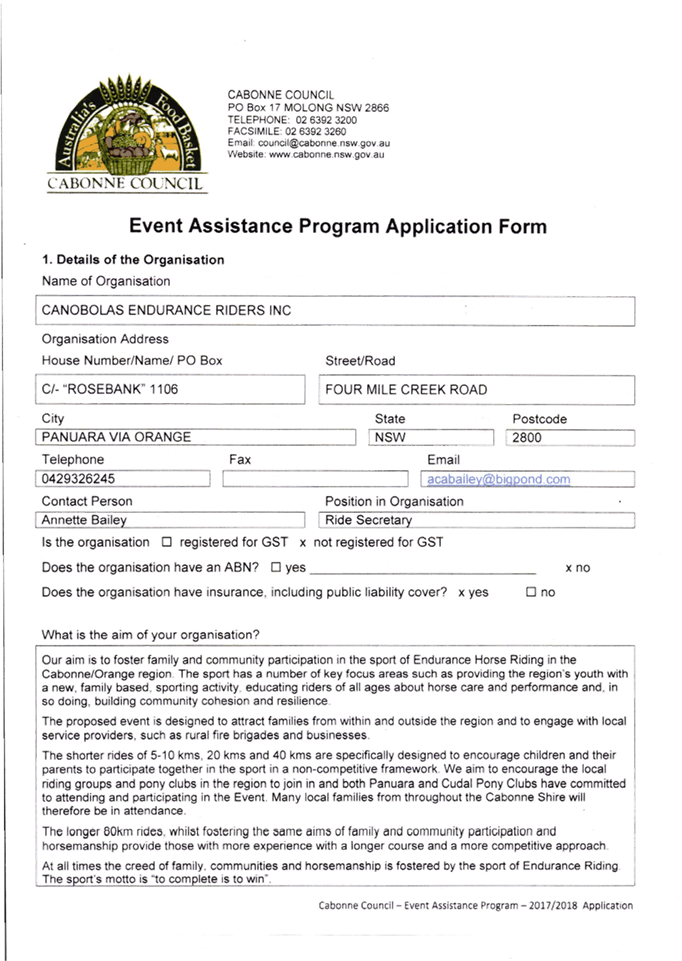





GENERAL MANAGER’S REPORT ON MATTERS FOR NOTATION
SUBMITTED TO THE Ordinary Council Meeting TO BE HELD ON Tuesday 24 July, 2018
Page 1
TABLE OF
CONTENTS
ITEM 1 INVESTMENTS SUMMARY................................................................. 2
ITEM 2 RATES SUMMARY................................................................................ 2
ITEM 3 RESOLUTIONS REGISTER - INFOCOUNCIL - ACTIONS
REPORTING 2
ITEM 4 COMMUNITY FACILITATION FUND................................................. 2
ITEM 5 REVIEW OF CABONNE HEALTH SERVICES................................ 2
ITEM 6 REVIEW OF ACCOMMODATION FOR AGED PEOPLE IN
CABONNE 2
ITEM 7 HERITAGE ADVISOR'S REPORT..................................................... 2
ITEM 8 ENGINEERING AND TECHNICAL SERVICES REPORT -
JULY UPDATE 2
ITEM 9 DEVELOPMENT APPLICATIONS RECEIVED DURING JUNE
2018 2
ITEM 10 DEVELOPMENT APPLICATIONS APPROVED DURING JUNE
2018 2
ITEM 11 MEDIAN PROCESSING TIMES 2018................................................ 2
ITEM 12 BURIAL STATISTICS........................................................................... 2
ANNEXURE ITEMS
ANNEXURE 1.1 Investments Summary June 2018............................. 2
ANNEXURE 2.1 Rates graph June 2018.................................................. 2
ANNEXURE 3.1 Council................................................................................... 2
ANNEXURE 3.2 Traffic Light Report Summary............................... 2
ANNEXURE 7.1 Heritage Advisors Report - July 2018................. 2
ANNEXURE 8.1 Engineering Capital Works and Expenditure
report July 2018............................................................................................ 2
ITEM 1 - INVESTMENTS SUMMARY
REPORT IN BRIEF
|
Reason For Report
|
Information
provided in relation to Council's Investment Schedule.
|
|
Policy Implications
|
Nil
|
|
Budget Implications
|
Nil
|
|
IPR Linkage
|
4.5.4.b. Maximise secure income
through investments
|
|
Annexures
|
1. Investments
Summary June 2018⇩
|
|
File Number
|
\OFFICIAL RECORDS
LIBRARY\FINANCIAL MANAGEMENT\FINANCIAL REPORTING\FINANCIAL REPORTS TO COUNCIL
- 938552
|
Finance Manager's REPORT
Council’s investments as at
30 June 2018 stand at a total of $44,452,294.
Council’s average interest
rate for the month was 2.50%. The effect of the low cash rate is having a
negative impact on term deposit rates offered by financial institutions. The
Reserve Bank’s official cash rate remained steady at 1.50% during the
month of June. However, Council’s average rate is higher than
Council’s benchmark rate of the 30 Day Bank Bill Swap Rate of
2.01%.
Council’s investments are
held with multiple Australian financial Institutions with varying credit
ratings according to Council’s Investment Policy. The annexure to this
report shows a break up of each individual institution that Council invests
with and its “Standard and Poor’s” Credit Rating.
The Schedule of Investments for
June 2018 is attached for Council’s information.
ITEM 2 - RATES SUMMARY
REPORT IN BRIEF
|
Reason For Report
|
Information
provided in relation to Council's Rates collections.
|
|
Policy
Implications
|
Nil
|
|
Budget
Implications
|
Nil
|
|
IPR Linkage
|
4.5.4.a -
Level of rate of collection
|
|
Annexures
|
1. Rates graph June 2018⇩
|
|
File Number
|
\OFFICIAL
RECORDS LIBRARY\FINANCIAL MANAGEMENT\FINANCIAL REPORTING\FINANCIAL REPORTS TO
COUNCIL - 940863
|
Senior Rates Officer's REPORT
Rate Collection Summary to 30
June 2018 is attached for Council’s information. The percentage collected
is 94.7%, which is the same as 30 June 2017.
ITEM 3 - RESOLUTIONS REGISTER - INFOCOUNCIL - ACTIONS
REPORTING
REPORT IN BRIEF
|
Reason For Report
|
To provide
Council with a report on progress made in actioning its resolutions up to
last month's Council meeting and any committee meetings held.
|
|
Policy Implications
|
Nil
|
|
Budget Implications
|
Nil
|
|
IPR Linkage
|
4.5.1.a. Provide quality
administrative support and governance to councillors and residents
|
|
Annexures
|
1. Council⇩
2. Traffic Light Report Summary⇩
|
|
File Number
|
\OFFICIAL
RECORDS LIBRARY\GOVERNANCE\COUNCIL MEETINGS\RESOLUTION REGISTER - 941517
|
General Manager's REPORT
InfoCouncil generated reports are
annexed including actions up to the previous month’s meetings resolutions.
Progress comments are provided
until the final action comment which will also show “COMPLETE”:
that item will then be removed from the register once resolved by the council.
Attached also is the “traffic
light” indicator system that enables the council to identify potential
areas of concern at a glance.
Councillors should raise any
issues directly with the directors as per the mayor’s request.
ITEM 4 - COMMUNITY
FACILITATION FUND
REPORT IN BRIEF
|
Reason For Report
|
To report on
approved expenditure under the Community Facilitation Fund (CFF).
|
|
Policy Implications
|
Nil
|
|
Budget Implications
|
Within
existing budget allocation
|
|
IPR Linkage
|
3.3.5.a. Review community need
for new and upgraded facilities
|
|
Annexures
|
Nil
|
|
File Number
|
\OFFICIAL
RECORDS LIBRARY\GRANTS AND SUBSIDIES\PROGRAMS\COMMUNITY FACILITATION FUND - 941455
|
General Manager's REPORT
Council adopted guidelines for
the Community Facilitation Fund (CFF) in March 2015. The CFF was created
for smaller community projects not originally included in the council’s
budget, to be allocated at the discretion of the Mayor and Deputy Mayor.
As a reminder, the guidelines for
the CFF are as follows:
1. Projects where no existing vote for
the works has been allocated or the vote is insufficient to complete the project.
2. Recipients must be community based
not-for-profit groups.
3. Mayor and Deputy Mayor to jointly
approve funds (with the General Manager as proxy if one is not
available).
4. Allocation of funds to be reported to
the next available council meeting.
5. Limit of $3,000 per allocation unless
other approved by council.
There were NIL
allocation of funds made in the past month.
ITEM 5 - REVIEW OF CABONNE
HEALTH SERVICES
REPORT IN BRIEF
|
Reason For Report
|
Undertake a
review of the health services in Cabonne
|
|
Policy Implications
|
NIl
|
|
Budget Implications
|
Nil
|
|
IPR Linkage
|
3.2.3.a Undertake review of
Health services
|
|
Annexures
|
Nil
|
|
File Number
|
\OFFICIAL
RECORDS LIBRARY\PUBLIC HEALTH\SERVICE PROVISION\HEALTH CENTRES - 939562
|
Community Services Manager's REPORT
Cabonne Shire has an extensive
array of health and medical services and support available to residents. Along
with the following services, Cabonne also has four pharmacies and only one
dentist.
In the 2016 Census, health care
ranked as the second highest employer at 12.8%.
CANOWINDRA
Community Health Centre
Services available include:
o District and
Community Nurse
o Dietician
o Dementia counsellor
o Speech therapist
o Audiometry
o Psychiatrist
o Social worker
o Drug and alcohol
information and referral
o Diabetes educator
o Sexual health
o Women’s health
clinic
Soldier’s Memorial
Hospital
Services available include:
o Emergency services
o Acute and long-term
beds
o Occupational
therapist
o Physiotherapist
o Day centre
Canowindra Medical Practice
& Skin Clinic
o GP clinic - four GPs
o Skin clinic
o Monday - Friday,
9.00am - 5.00pm
Dr Nicholas O’Ryan
Medical Practice
o GP clinic
o Nurse
o Visiting psychology
service
o Monday - Friday,
9.00am - 5.30pm
CARGO
Community Nurse home visits from Canowindra Community Health
CUDAL
Cudal Health Service
Services available include:
o Emergency services
o Acute care
o General medicine
o Community nurse
o Regular GP clinic
o Open Tuesday 9.00am
– 11.00am and Thursday 9.00am – 1.00pm
o There are no beds,
only a Community Health Service
CUMNOCK
o Community nurse
clinic by Health One Molong
o Child and family
clinic
o Open Monday and
Wednesday 8.30am – 5.00pm
EUGOWRA
Eugowra Memorial Multi-Purpose
Service
Services available include:
o Primary health
o Emergency services
o Acute care
o Palliative care
o Aged care
o Respite services
o Allied health
o Oral health
o Community nurse
Dr Vikki Wymer Medical
Practice
o GP Clinic
o Open Monday 9.00am -
5.00pm, Tuesday 9.00am - 11.00am, and Thursday
9.00am - 4.00pm
MANILDRA
Community Health Centre
Services available include:
o GP clinic
o Psychology clinic
o Podiatry
o Child and family
clinic
o Open Tuesday and
Friday 9.00am – 1.00pm
MOLONG
Waluwin Health One
Services available include:
o General practice
o Physiotherapy
o Psychology services
o Podiatry
o Pathology
o Dietician
o Maternal, child and
family health
o Occupational therapy
o Speech pathology
o Walk-in non-emergency
clinic
o Community nurse
o Open Monday - Friday
8.30am - 5.30pm
Molong Health Service
Services available include:
o Emergency services
o General medicine
o Palliative
o Respiratory
o Aged care
o Respite
Molong Medical Practice
o GP Clinic
o Skin Cancer Clinic
YEOVAL
Community Health Centre
o GP clinic
o Psychology clinic
o Podiatry
o Child and family
clinic
o Open Tuesday and
Friday 9.00am - 1.00pm
ITEM 6 - REVIEW OF
ACCOMMODATION FOR AGED PEOPLE IN CABONNE
REPORT IN BRIEF
|
Reason For Report
|
To document
the provision of accommodation for aged people in Cabonne
|
|
Policy Implications
|
NIL
|
|
Budget Implications
|
NIL
|
|
IPR Linkage
|
3.2.1.a Identify challenges and
opportunities for aged care facilities /services
|
|
Annexures
|
Nil
|
|
File Number
|
\OFFICIAL
RECORDS LIBRARY\COMMUNITY SERVICES\SERVICE PROVIDERS\AGED CARE SERVICES - 939027
|
Community Services Manager's REPORT
There are a variety of aged
accommodation services within Cabonne. This includes hostels and nursing homes,
resident funded aged care units, Multi-Purpose Health Facilities and rental
units.
Accommodation available to aged
people within Cabonne is as follows:
UPA Molong
· Molong
Lodge Retirement Village
o 22 modern and
comfortable two-bedroom units.
o The village on Hill
Street also has access to the UPA Community Centre, security, Medi-Alert and
24-hour on-site maintenance.
o Residents pay a
substantial bond to be accommodated at the Village, with this bond being mostly
refunded upon vacating.
o There is also a
fortnightly maintenance charge for the upkeep of the units.
· Prunus
Lodge
o 28 bed Residential
Aged Care Facility.
o Prunus Lodge recently
underwent renovations and refurbishments with all 28 rooms being private and
spacious with an ensuite.
o A Refundable
Accommodation Deposit (RAD), otherwise known as a bond, is required and is
based on income and assets test. No RAD is required for respite residents.
o A daily fee is also
payable which is 85% of the basic pension. This fee is indexed by the
Government and is increased twice per year in line with pension increases.
· Rose
Cottage – is incorporated within Prunus Lodge and is a secure,
dementia specific 12-bed unit.
UPA Yeoval
· Consists
of Hazelholme Hostel, Yeoval Community Nursing Home and a UPA Yeoval Home Care
Service.
· The
Home Care Service administers 12 Level 1 – Level 4 Home Care Packages to
residents of Yeoval and surrounding villages.
· A
Refundable Accommodation Deposit (RAD), otherwise known as a bond, is required
and is based on income and assets test. No RAD is required for respite
residents.
· A
daily fee is also payable which is 85% of the basic pension. This fee is
indexed by the Government and is increased twice per year in line with pension
increases.
Moyne Aged
Care Plus, Canowindra
· The Salvation Army runs Moyne Aged Care Plus Nursing Home and Hostel
at Canowindra. There are a total of 63 beds within the complex catering to a
variety of care needs, including Respite. Moyne is currently at full capacity,
with six on the waiting list.
· Moyne offers single, twin, triple and quad rooms. Both the single
and shared double rooms have en-suites.
· Facilities available to residents include a full-time Chaplain,
village bus, hairdresser, library and gymnasium.
· A
Refundable Accommodation Deposit (RAD), otherwise known as a bond, is required
and is based on income and assets test. No RAD is required for respite
residents.
· A
daily fee is also payable which is 85% of the basic pension is. This fee is
indexed by the Government and is increased twice per year in line with pension
increases.
Manildra
Lions Club
· There are 11 single units, 2 two-bedroom units and a cottage
available through the Lions Club for pensioners.
· Tenants pay four weeks bond to enter plus weekly rent.
· All units / cottage are at full capacity.
· The Lions Club at Manildra caters for various local events, such as
the Manildra Show, Australia Day, Christmas Fireworks and clearing sales, to
raise money for maintenance.
Molong Yarn
Market
· The Molong Yarn Market has seven self-contained units available for
aged people.
· There is a small upfront fee alongside a weekly maintenance fee.
Acacia Lodge,
Boree Lodge & Durack Court
· A s.355 Committee has been delegated the care, control and
management of Acacia Lodge, Boree Lodge and Durack Court.
· Acacia Lodge in Edward Street, Molong has three two-bedroom units
and a three-bedroom cottage.
· Boree Lodge in Wall Street, Cudal has four two-bedroom units.
· Durack Court in Edward Street, Molong has three two-bedroom units.
· All units / cottages are at full capacity, with two on the waiting
list for Molong.
· All units / cottage is available to pensioners at a discounted
weekly rental. An entrance bond is also required from tenants.
Western NSW
Local Health District
· Eugowra Memorial Multi-Purpose Service
o provides continuity of care. The MPS offers both permanent care,
respite care, a day centre and visiting allied health services.
o The structure of the MPS allows the integrated range of health
services, including acute care, subacute (palliative and respite), aged care,
emergency care, primary health and community nursing services.
· The Molong Hospital
o Reconstruction and refurbishment of the Residential Care ward is
complete. This has enhanced the existing area which is now more modern and
comfortable. There are now 18 aged care beds with one being dedicated to
respite care. All rooms are single occupancy with en-suites.
Eugowra
Self-Care Units
· A s.355 Committee has been delegated the care, control and
management of the Eugowra Self-Care Units. There are five one-bedroom units in
Nanima Street, Eugowra.
· The committee have a long term plan to expand and have been in talks
with Council in regards to suitable land to purchase which fits the regulations
for Aged Units.
There
is a wide range of accommodation options for aged people within Cabonne and
this area has been successful in attracting retirees to live locally. A high
factor of this has been the close proximity to health services.
Council’s continued support of
its communities through provision of aged services and improving accessibility
throughout villages helps make Cabonne an attractive place for older people to
live.
ITEM 7 - HERITAGE ADVISOR'S
REPORT
REPORT IN BRIEF
|
Reason For Report
|
Providing
councillors with a copy of the Heritage Advisor's report.
|
|
Policy Implications
|
Nil
|
|
Budget Implications
|
Nil
|
|
IPR Linkage
|
4.3.2.b - Heritage advisory
service provided
|
|
Annexures
|
1. Heritage
Advisors Report - July 2018⇩
|
|
File Number
|
\OFFICIAL
RECORDS LIBRARY\DEVELOPMENT AND BUILDING CONTROLS\REPORTS\HERITAGE - 2018 - 939349
|
Director of Environmental Services' REPORT
A copy of the Heritage Advisor’s Report for July 2018 is attached for the
information of the council.
ITEM 8 - ENGINEERING AND
TECHNICAL SERVICES REPORT - JULY UPDATE
REPORT IN BRIEF
|
Reason For Report
|
To update
Council on works in progress in the Engineering and Technical Services
Department
|
|
Policy Implications
|
Nil
|
|
Budget Implications
|
Nil
|
|
IPR Linkage
|
4.5.1.a Provide quality
administrative support and governance to councillors and residents
|
|
Annexures
|
1. Engineering
Capital Works and Expenditure report July 2018⇩
|
|
File Number
|
\OFFICIAL
RECORDS LIBRARY\GOVERNANCE\REPORTING\ENGINEERING AND TECHNICAL SERVICES
REPORTING - 941104
|
Director of Engineering & Technical
Services' REPORT
Please find attached to this
report an update of the 2018-2019 works in progress in the Engineering and
Technical Services Department.
ITEM 9 - DEVELOPMENT
APPLICATIONS RECEIVED DURING JUNE 2018
REPORT IN BRIEF
|
Reason For Report
|
Details of
development applications received during the preceding month.
|
|
Policy Implications
|
Nil
|
|
Budget Implications
|
Nil
|
|
IPR Linkage
|
4.5.3.a. Provide efficient and
effective development assessment
|
|
Annexures
|
Nil
|
|
File Number
|
\OFFICIAL
RECORDS LIBRARY\DEVELOPMENT AND BUILDING CONTROLS\BUILDING AND DEVELOPMENT
APPLICATIONS\REPORTING - DEVELOPMENT APPLICATIONS TO COUNCIL - 938310
|
Director of Environmental Services' REPORT
Development Applications have been received during the
period 01/06/2018 to 30/06/2018 as detailed below.
SUMMARY OF DEVELOPMENT APPLICATIONS RECEIVED
|
TYPE
|
ESTIMATED VALUE
|
|
Section 68 Only x 6
|
$----
|
|
Modification to Subdivision
|
$----
|
|
Modification to 10 Lot Rural Subdivision
|
$----
|
|
Depot (Storage of Buses)
|
$----
|
|
Subdivision
|
$----
|
|
Change of Use
|
$----
|
|
Food and Drink Premises (Licensed Premises)
|
$----
|
|
Boundary Adjustment
|
$----
|
|
Farm Shed
|
$45,000
|
|
Alterations & Additions to a Dwelling
|
$8,500
|
|
Awning over Swimming Pool
|
$50,000
|
|
Dual Occupancy (Manufactured Dwelling)
|
$101,418
|
|
Above Ground Swimming Pool
|
$19,000
|
|
Dwellings (x2) and Subdivision
|
$340,000
|
|
Carport
|
$10,800
|
|
Storage Shed
|
$20,000
|
|
Dwelling
|
$267,150
|
|
Alterations & Additions to Existing Dwelling
|
$300,000
|
|
Carport and Enclose Existing Carport
|
$10,295
|
|
Dwelling
|
$400,000
|
|
Dwelling
|
$400,000
|
|
Alterations & Additions to Existing Motel
|
$450,000
|
|
Alterations & Additions to Existing Church
|
$467,095
|
|
TOTAL: 28
|
$2,889,258
|
SUMMARY OF COMPLYING DEVELOPMENT APPLICATIONS RECEIVED
|
TYPE
|
ESTIMATED VALUE
|
|
Single Storey Dwelling with Attached Porch
|
$358,775
|
|
TOTAL: 1
|
$358,775
|
|
GRAND TOTAL: 29
|
$3,248,033
|
ITEM 10 - DEVELOPMENT
APPLICATIONS APPROVED DURING JUNE 2018
REPORT IN BRIEF
|
Reason For Report
|
Details of
development applications approved during the preceding month.
|
|
Policy Implications
|
Nil
|
|
Budget Implications
|
Nil
|
|
IPR Linkage
|
4.5.3.a. Provide efficient and
effective development assessment
|
|
Annexures
|
Nil
|
|
File Number
|
\OFFICIAL
RECORDS LIBRARY\DEVELOPMENT AND BUILDING CONTROLS\BUILDING AND DEVELOPMENT APPLICATIONS\REPORTING
- DEVELOPMENT APPLICATIONS TO COUNCIL - 938240
|
Director of Environmental Services' REPORT
Development Applications have been
approved during the period 01/06/2018 to 30/06/2018 as detailed below.
SUMMARY OF APPROVED DEVELOPMENT APPLICATIONS
|
TYPE
|
ESTIMATED VALUE
|
|
Section 68 Only x 3
|
$-----
|
|
Modification to Temporary Primitive Camping Ground
|
$-----
|
|
3 Lot Subdivision
|
$-----
|
|
5 Lot Rural Subdivision
|
$-----
|
|
Depot (Storage of Buses)
|
$-----
|
|
Dwelling
|
$462,920
|
|
Alterations & Additions to Existing Dwelling
|
$140,000
|
|
Farm Shed
|
$45,000
|
|
Agricultural Produce Industry (Winery) & Signage
|
$700,000
|
|
Storage Shed
|
$18,000
|
|
Machinery Shed with Workshop & Amenities
|
$260,000
|
|
Above Ground Swimming Pool
|
$19,000
|
|
Alterations & Additions to a Dwelling
|
$8,500
|
|
Carport
|
$10,800
|
|
Awning over Swimming Pool
|
$50,000
|
|
Farm Stay Accommodation
|
$300,000
|
|
Demolition of Dwelling
|
$20,000
|
|
Alterations & Additions to Community Facility
|
$900,000
|
|
TOTAL: 20
|
$2,934,220
|
SUMMARY OF APPROVED
COMPLYING DEVELOPMENT APPLICATIONS
|
TYPE
|
ESTIMATED VALUE
|
|
Single Storey Dwelling with attached Porch
|
$358,775
|
|
TOTAL: 1
|
$358,775
|
|
GRAND TOTAL: 21
|
$3,292,995
|
|
Previous Month: 51
|
$5,457,539
|
ITEM 11 - MEDIAN PROCESSING
TIMES 2018
REPORT IN BRIEF
|
Reason For Report
|
To provide
information on median processing times.
|
|
Policy Implications
|
Nil
|
|
Budget Implications
|
Nil
|
|
IPR Linkage
|
4.5.3.a. Assess and determine
development applications,construction certificate applications and Onsite
Sewerage Management Systems (OSMS) to meet agreed service levels
|
|
Annexures
|
Nil
|
|
File Number
|
\OFFICIAL
RECORDS LIBRARY\DEVELOPMENT AND BUILDING CONTROLS\BUILDING AND DEVELOPMENT
APPLICATIONS\REPORTING - DEVELOPMENT APPLICATIONS TO COUNCIL - 939348
|
Director of Environmental Services' REPORT
Summary of median Application
Processing Times over the last five years for the month of June:
|
YEAR
|
MEDIAN ACTUAL DAYS
|
|
2013
|
21.5
|
|
2014
|
13
|
|
2015
|
46
|
|
2016
|
32
|
|
2017
|
30
|
Summary of median Application
Processing Times for 2018:
|
MONTH
|
MEDIAN ACTUAL DAYS
|
|
January
|
36
|
|
February
|
24.5
|
|
March
|
22
|
|
April
|
21.5
|
|
May
|
31
|
|
June
|
24.5
|
|
July
|
|
|
August
|
|
|
September
|
|
|
October
|
|
|
November
|
|
|
December
|
|
ITEM 12 - BURIAL STATISTICS
REPORT IN BRIEF
|
Reason For Report
|
To provide
information on burial statistics.
|
|
Policy Implications
|
Nil
|
|
Budget Implications
|
Nil
|
|
IPR Linkage
|
3.3.1.a - Maintain cemeteries
in accordance with community requirements
|
|
Annexures
|
Nil
|
|
File Number
|
\OFFICIAL
RECORDS LIBRARY\PUBLIC HEALTH\CEMETERIES\REPORTING - BURIAL STATISTICS - 938917
|
Director of Environmental Services' REPORT
|
YEAR
|
NO OF BURIALS
|
|
2006/07
|
59
|
|
2007/08
|
62
|
|
2008/09
|
57
|
|
2009/10
|
65
|
|
2010/11
|
40
|
|
2011/12
|
54
|
|
2012/13
|
54
|
|
2013/14
|
80
|
|
2014/15
|
66
|
|
2015/16
|
64
|
|
2016/17
|
41
|
|
July
|
7
|
|
August
|
8
|
|
September
|
9
|
|
October
|
7
|
|
November
|
4
|
|
December
|
4
|
|
January
|
4
|
|
February
|
0
|
|
March
|
6
|
|
April
|
7
|
|
May
|
4
|
|
June
|
7
|
|
Total
|
67
|
|
Item 1 Ordinary
Meeting 24 July 2018
|
Item 1 - Annexure 1
|


|
Item 2 Ordinary Meeting 24 July 2018
|
Item 2 - Annexure 1
|
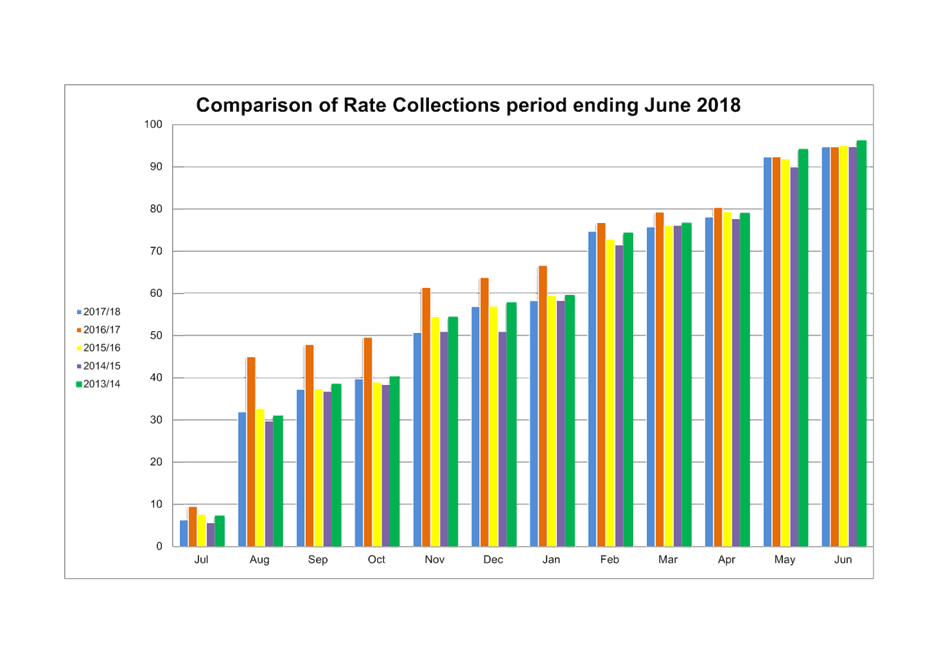
|
Item 3 Ordinary Meeting 24 July 2018
|
Item 3 - Annexure 1
|




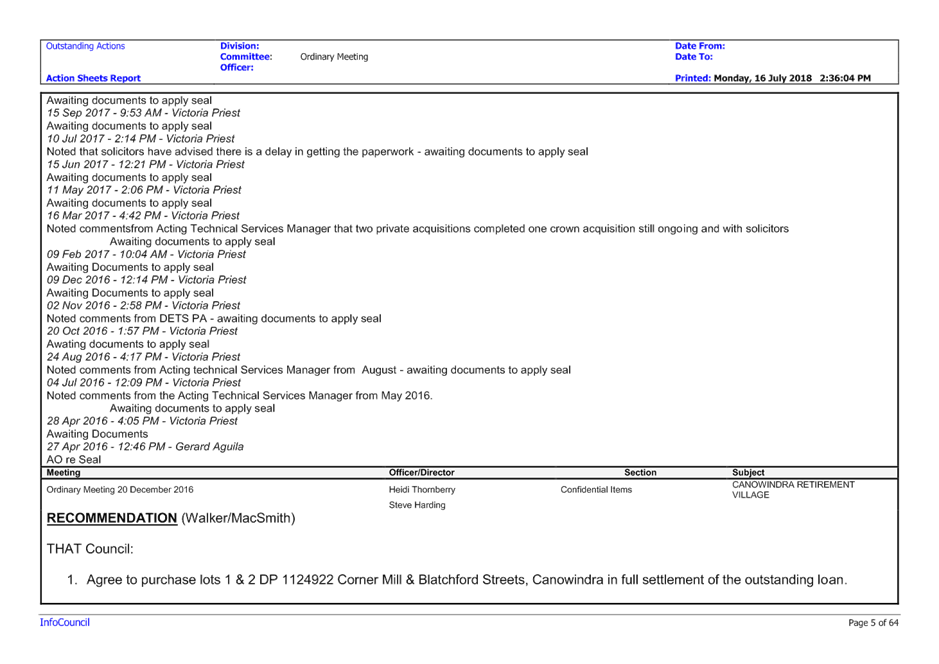
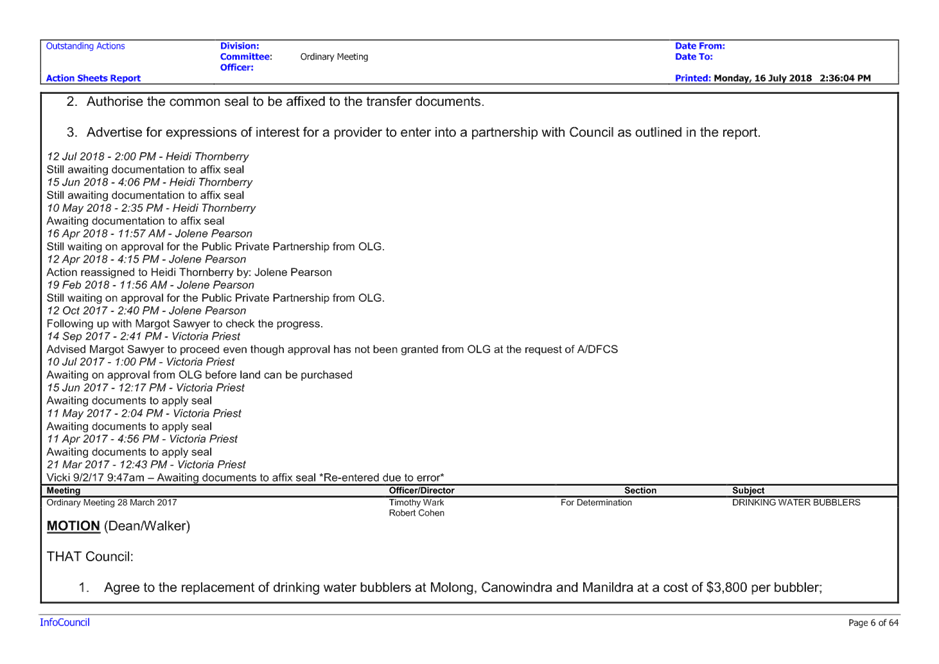
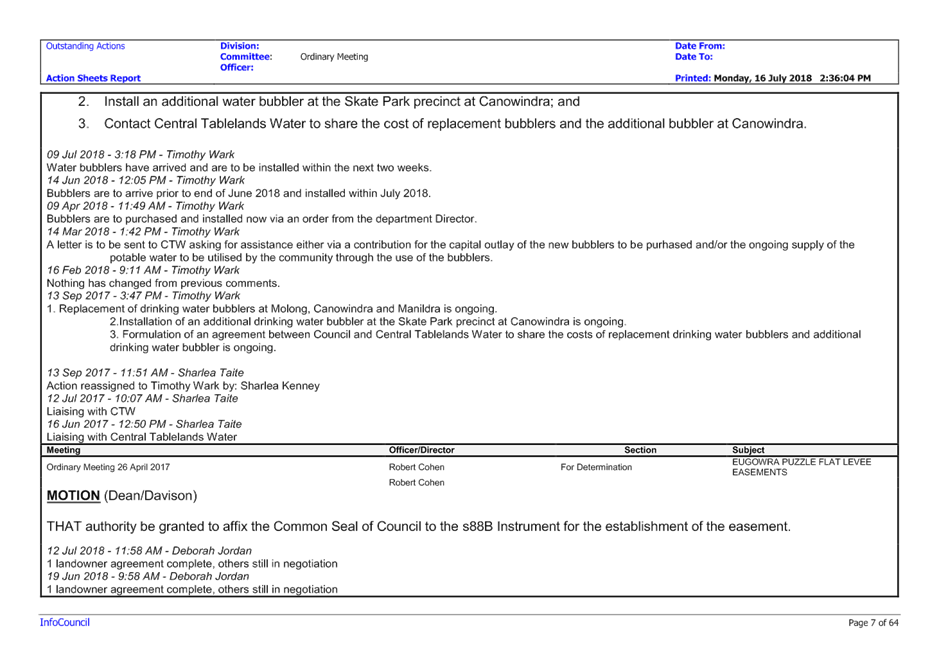

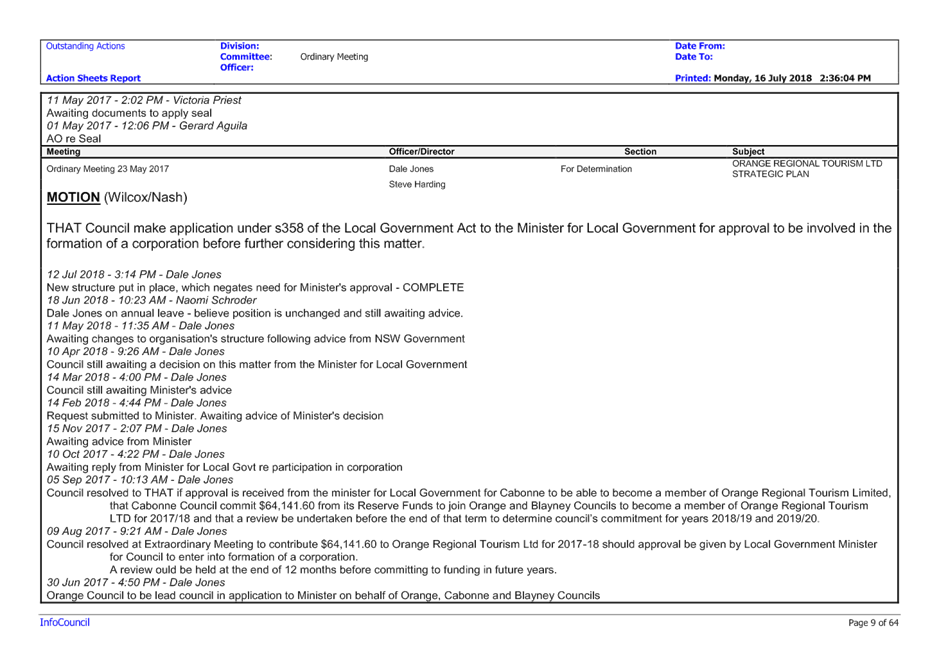
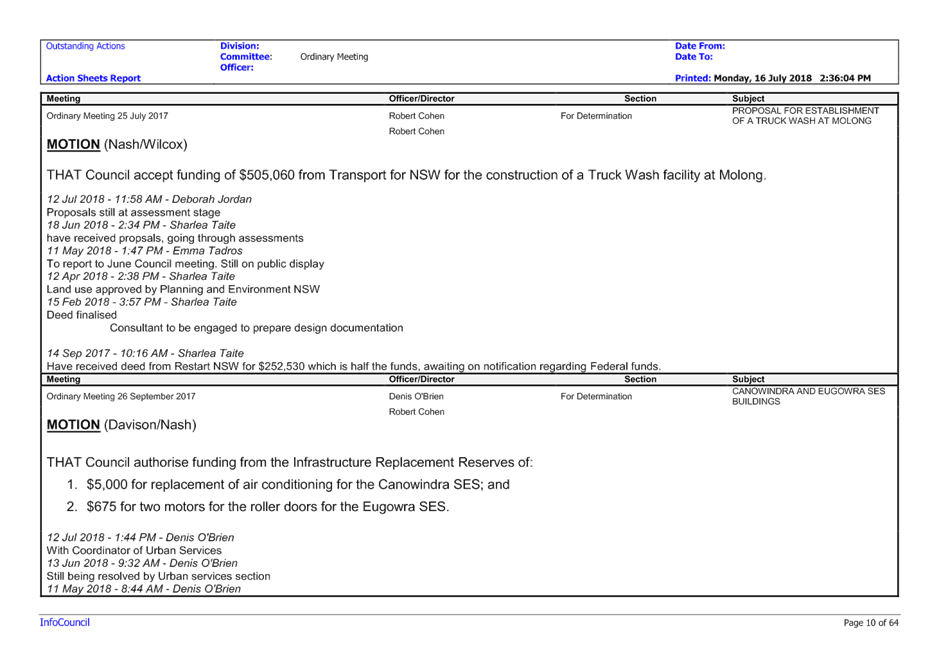
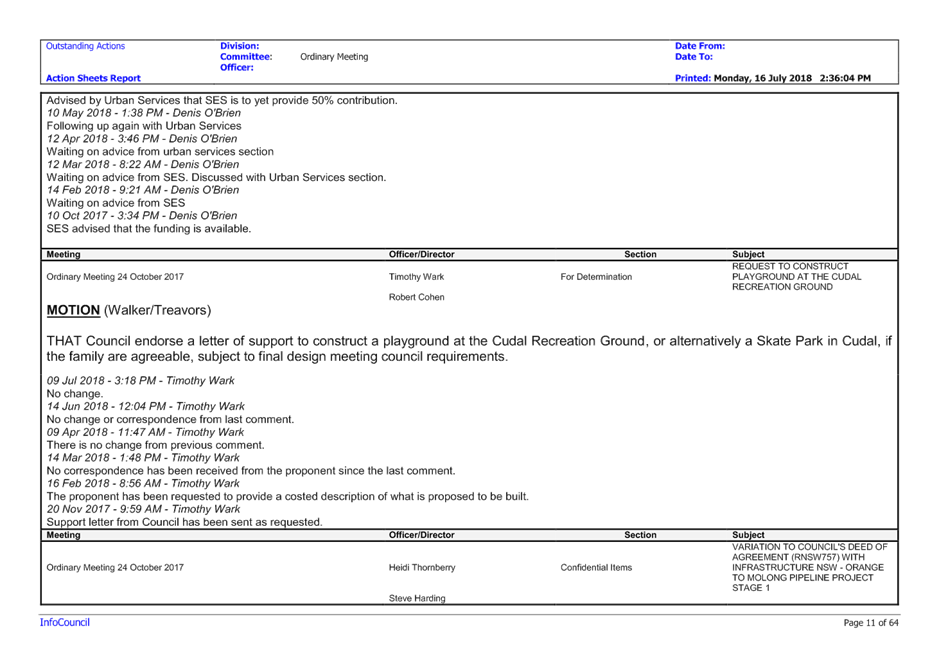
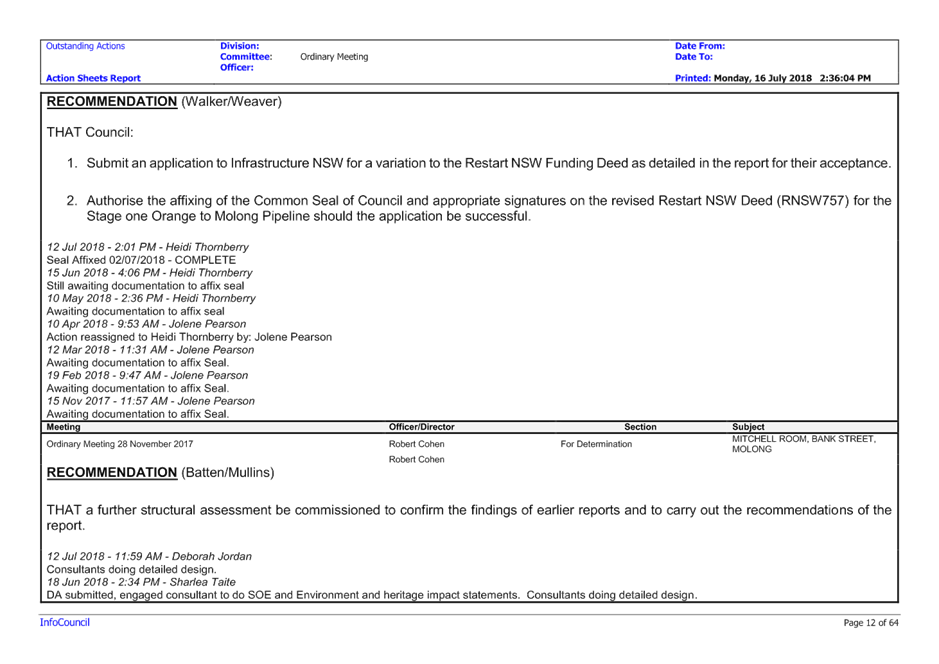


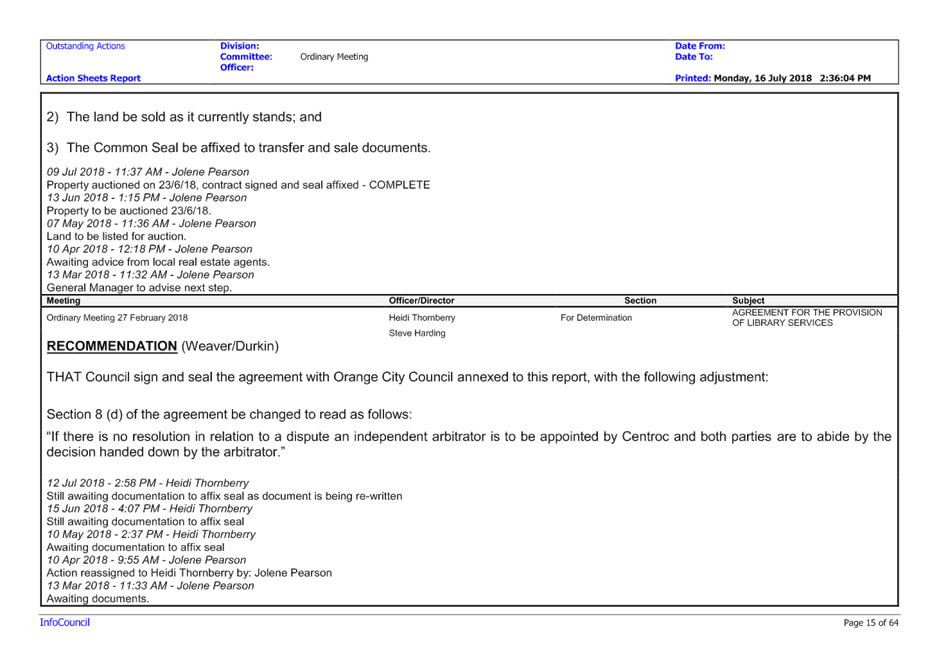
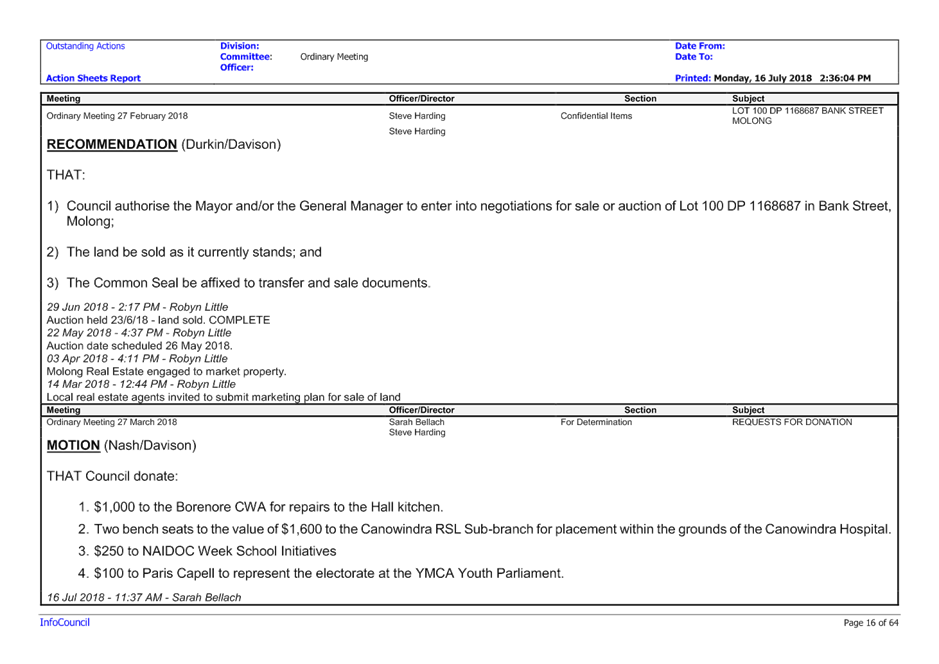
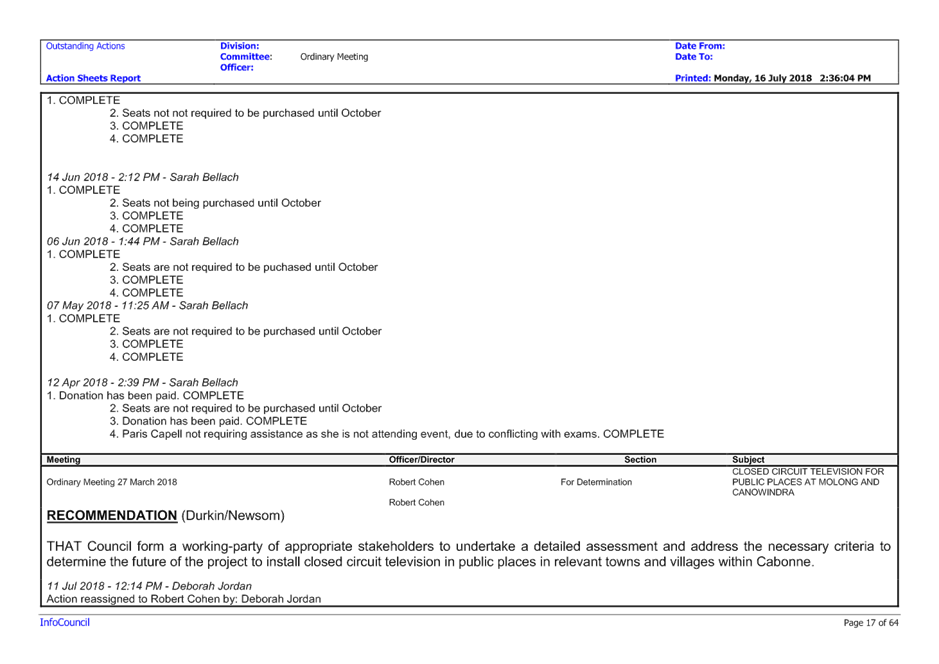

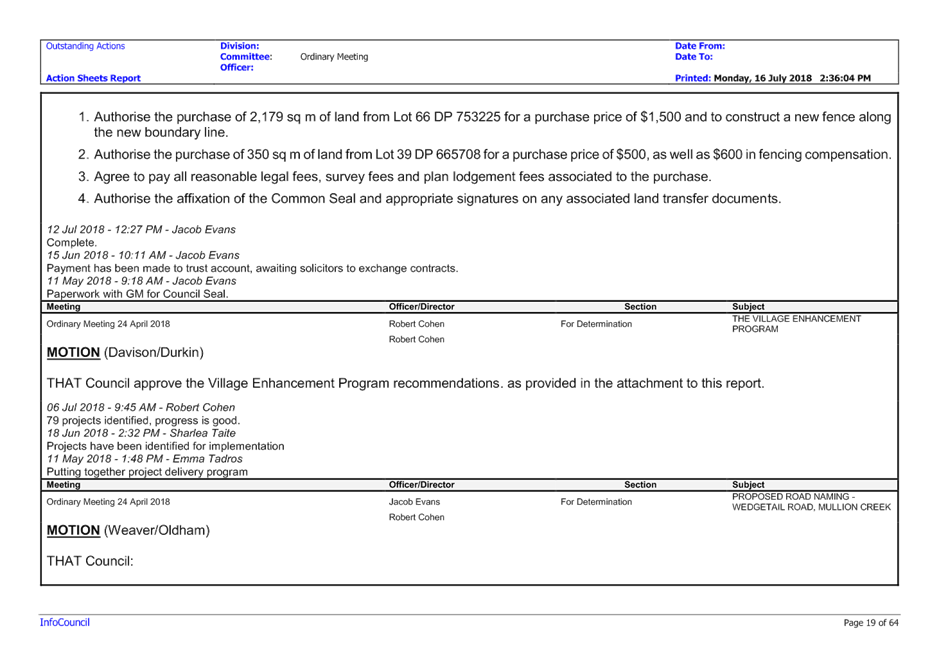
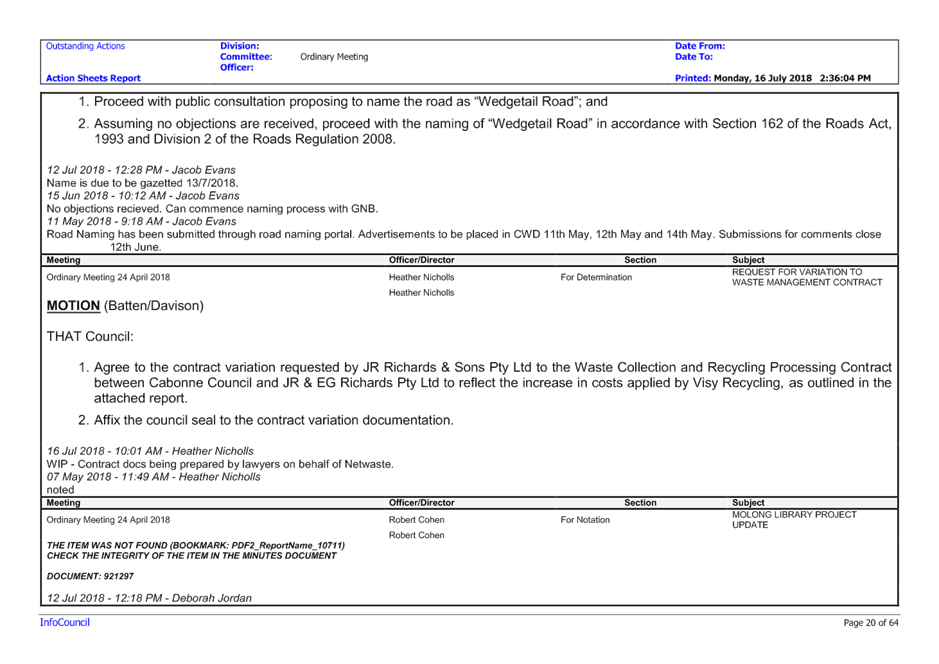
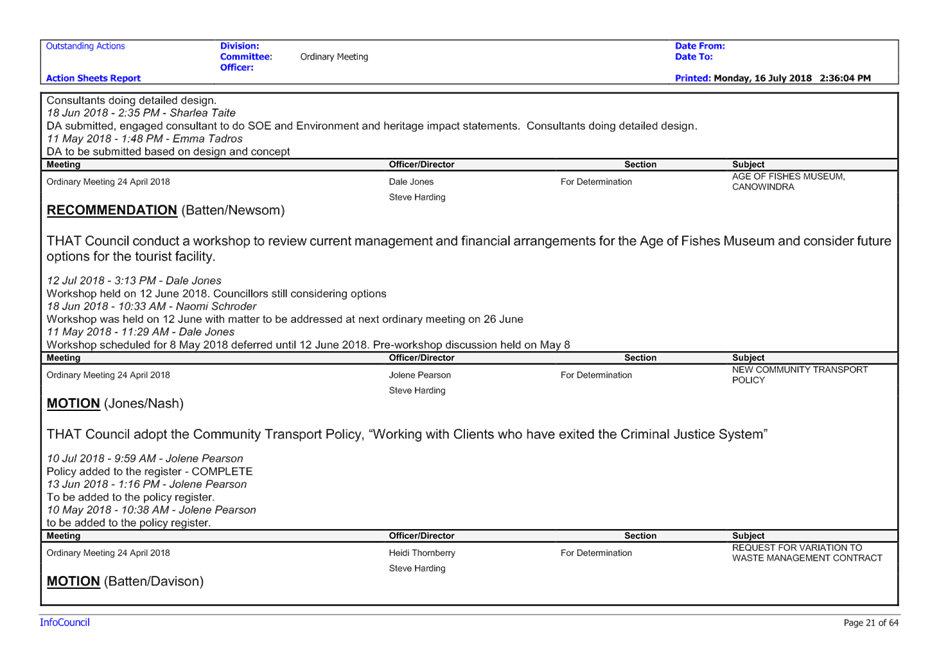
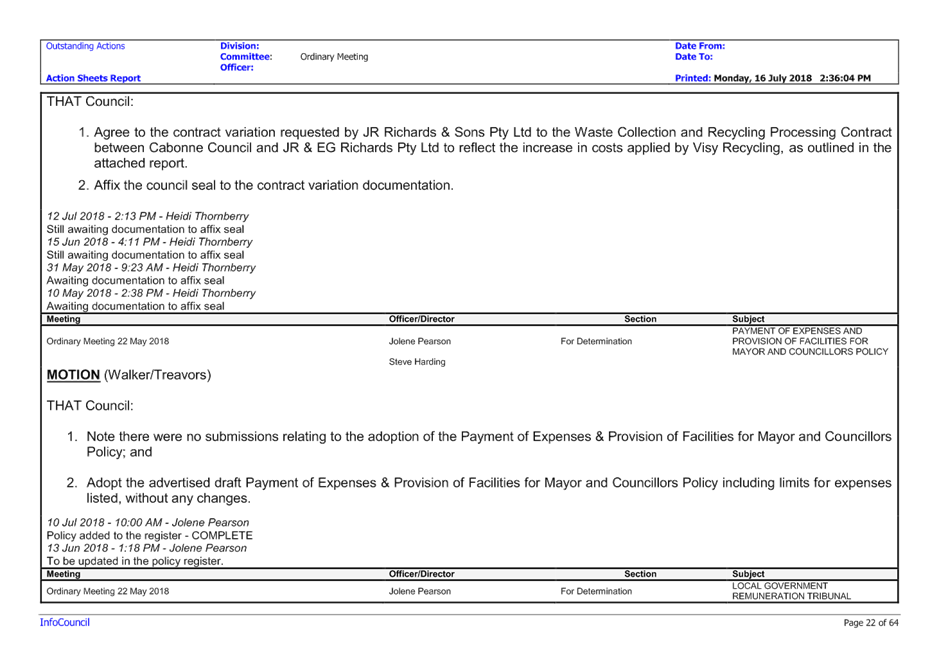
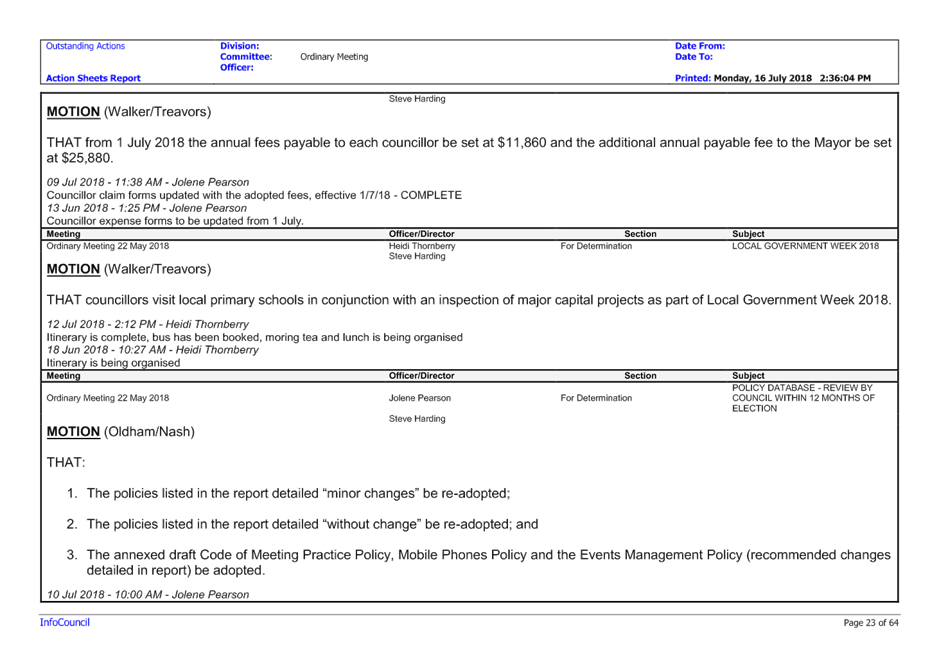
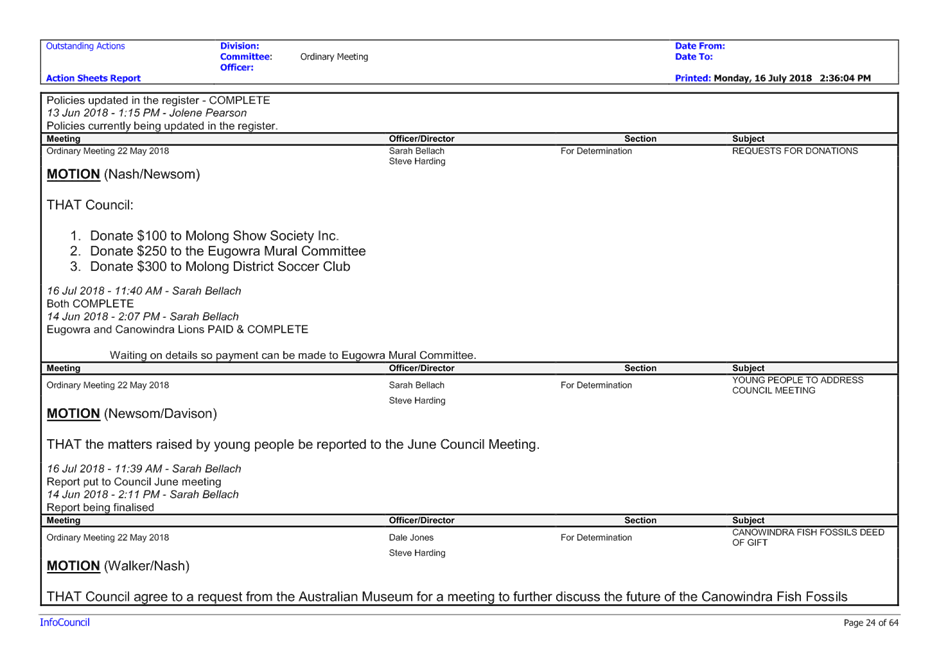
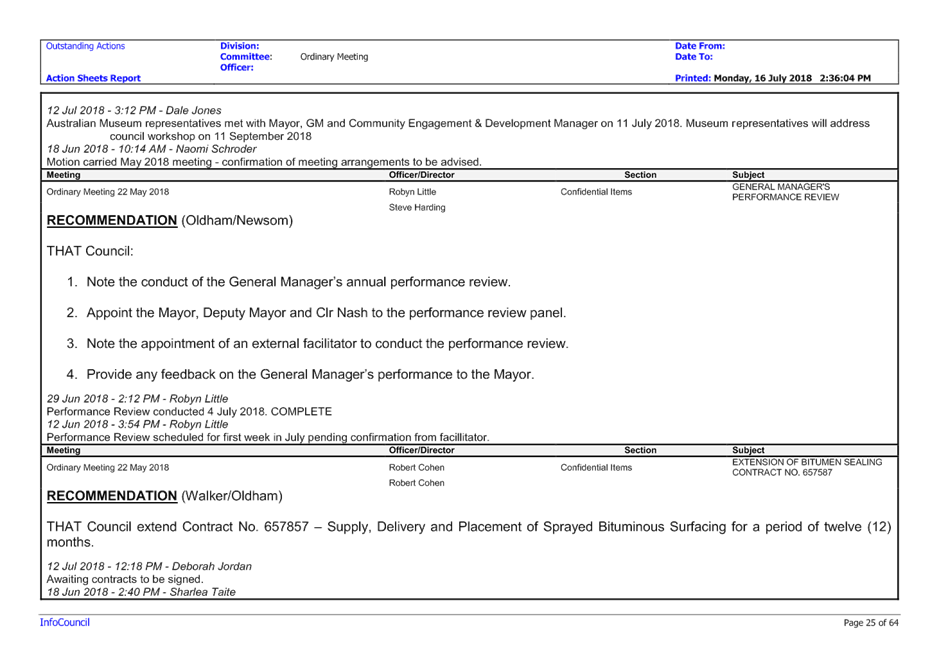
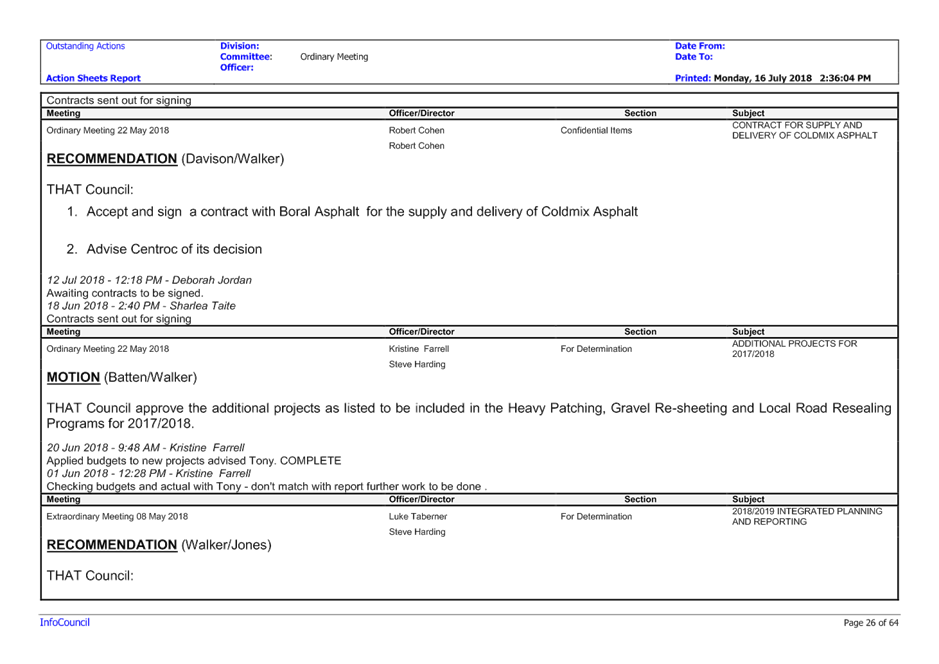
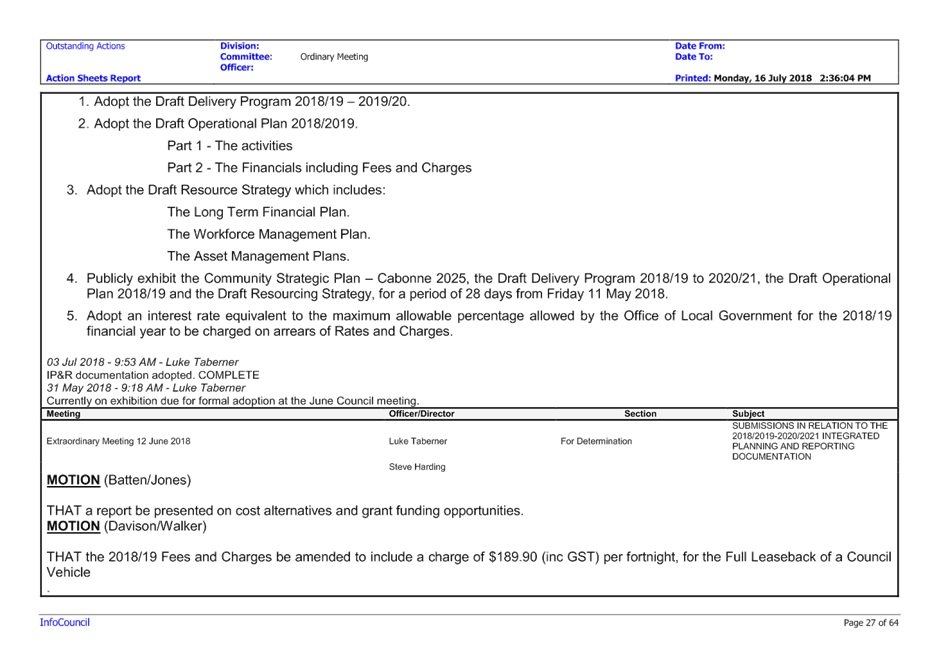

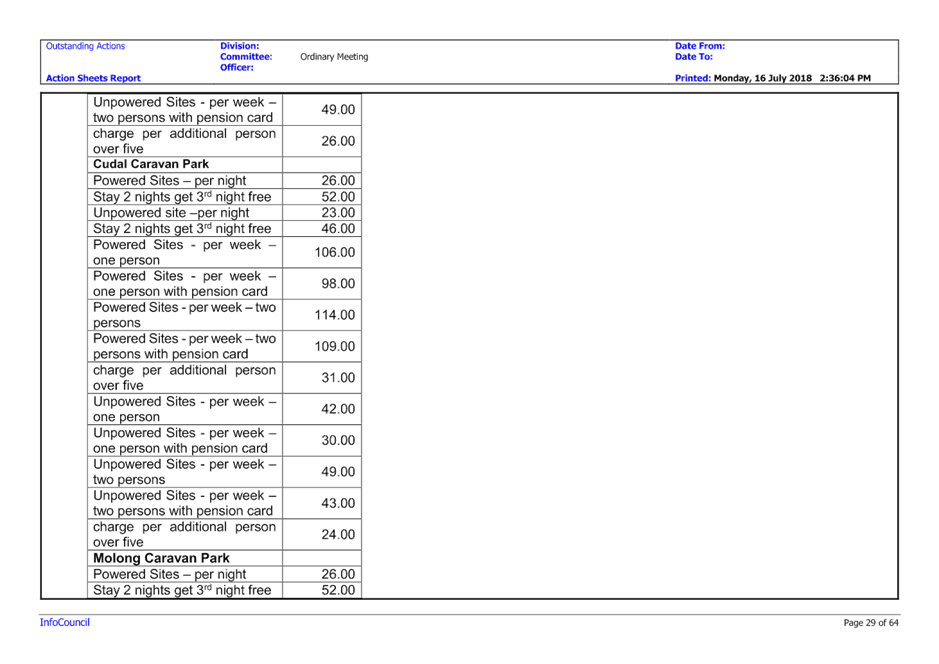
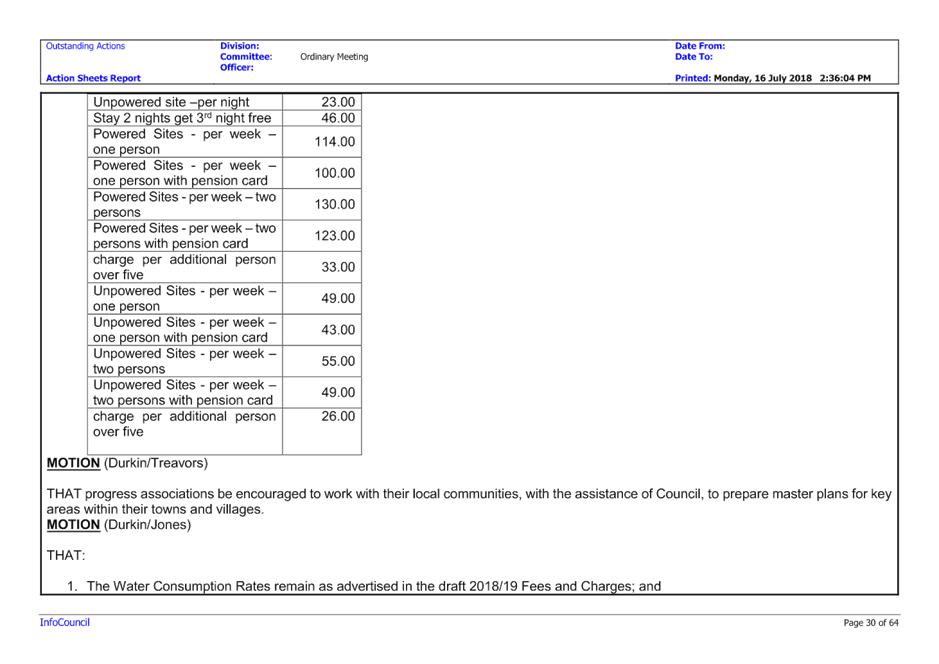
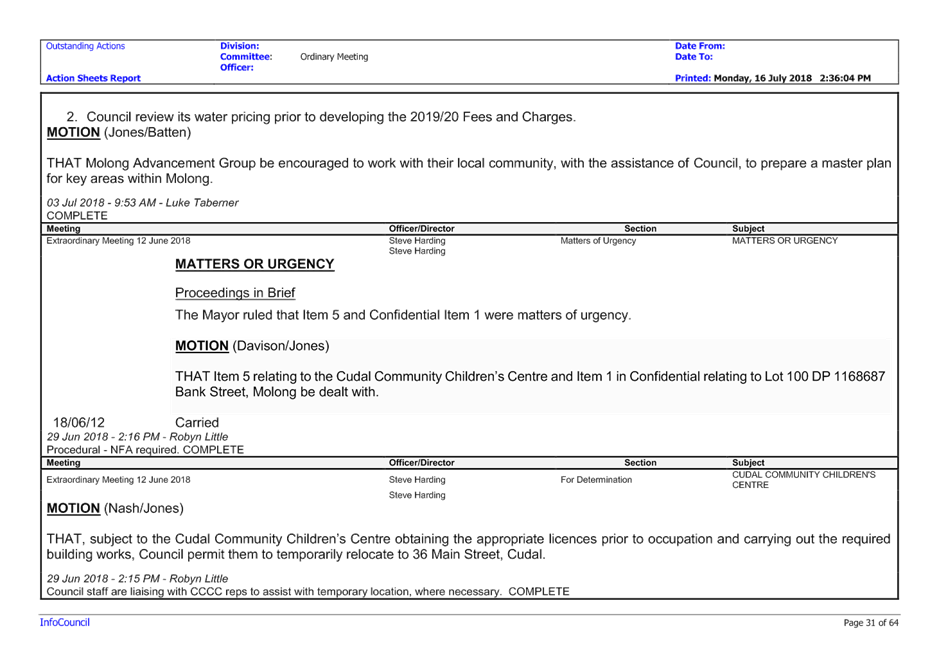
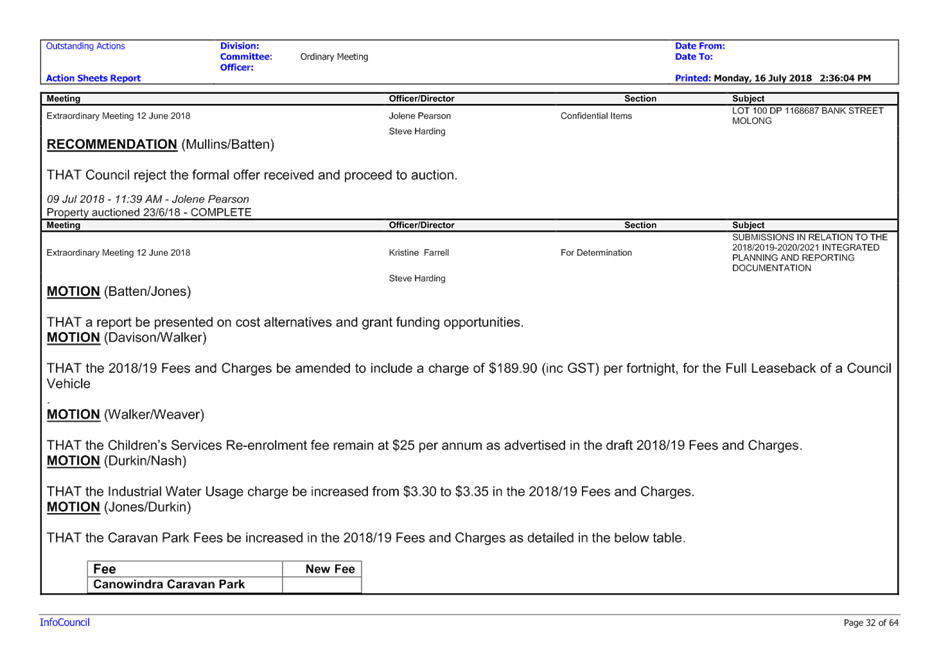
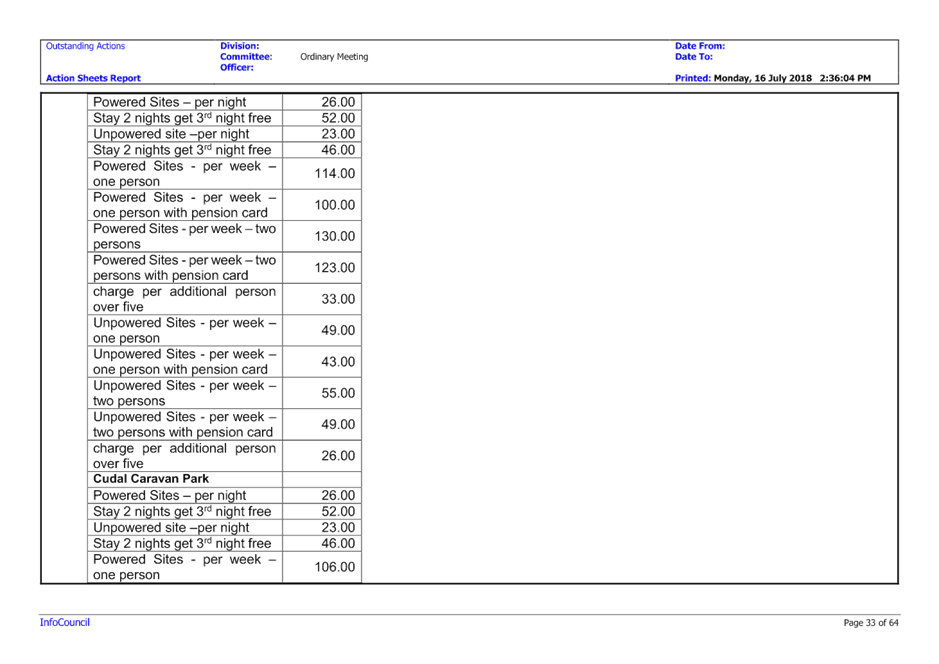
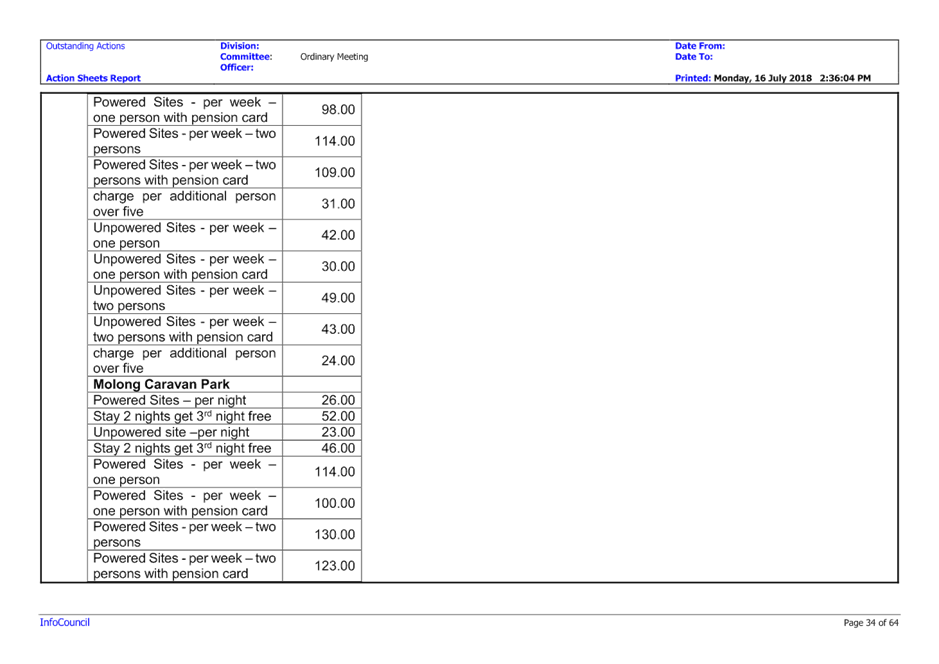
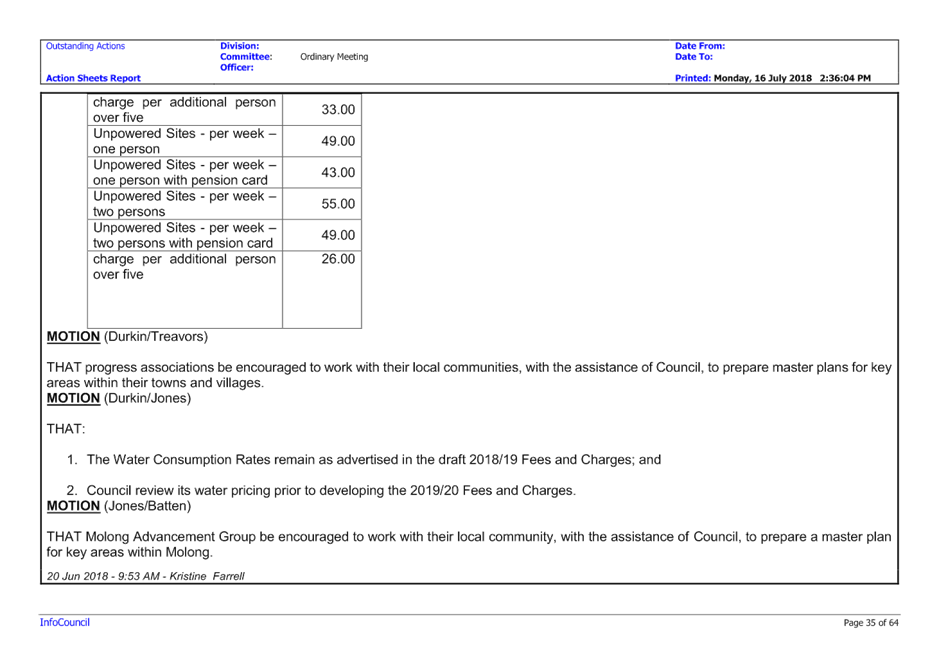
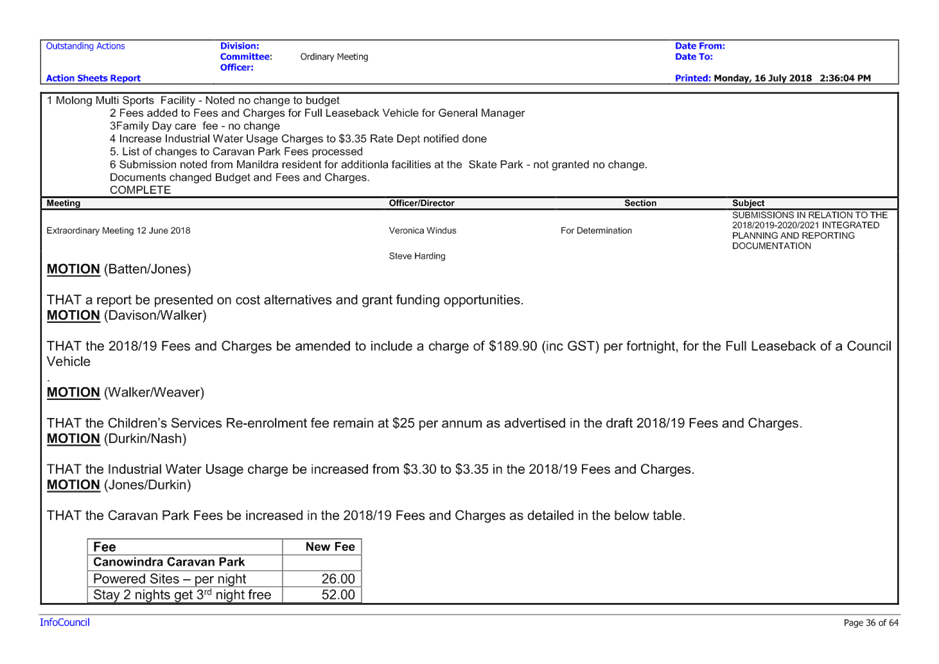
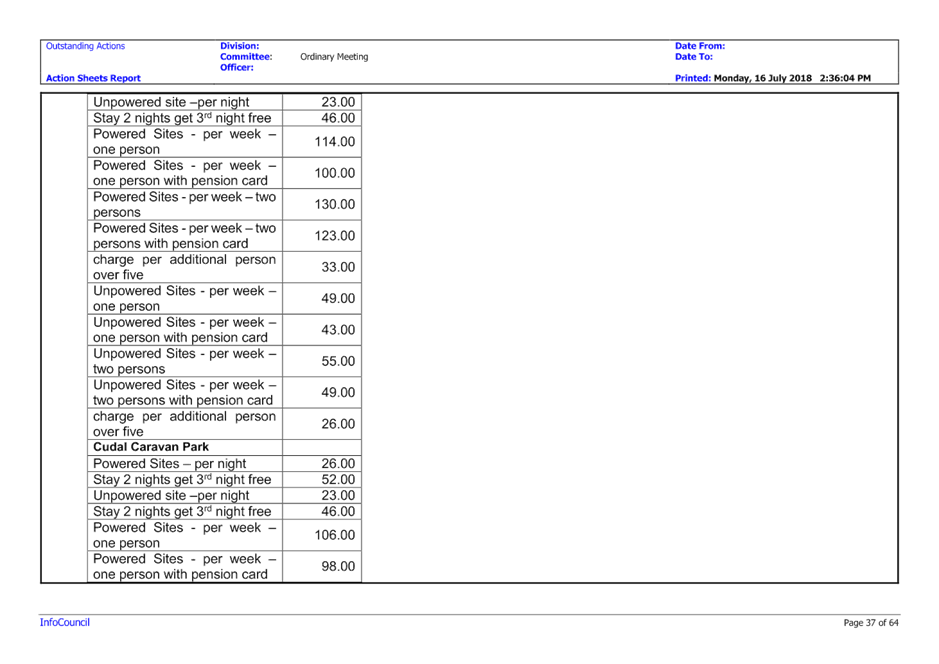
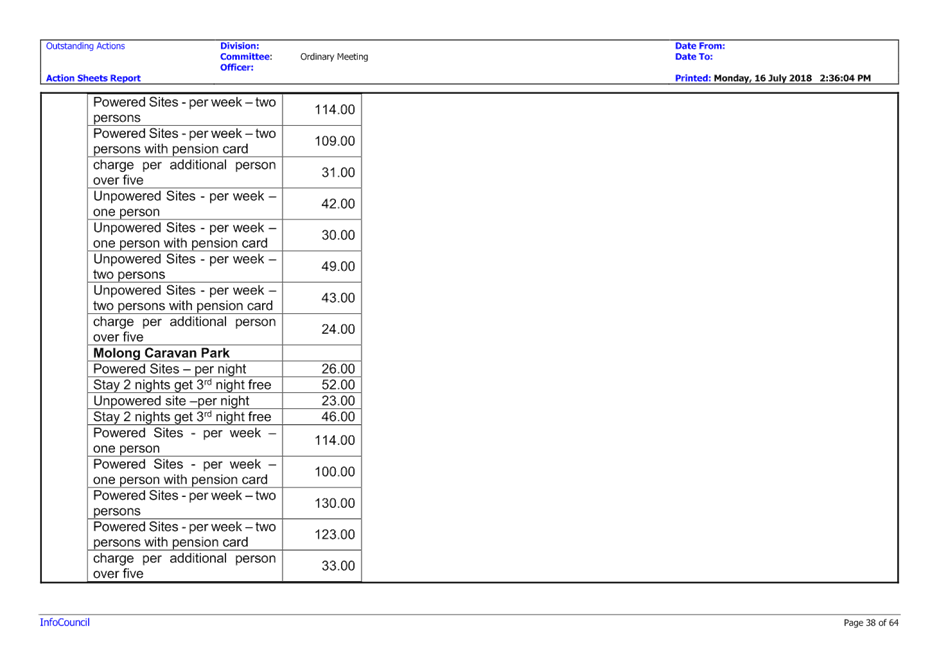
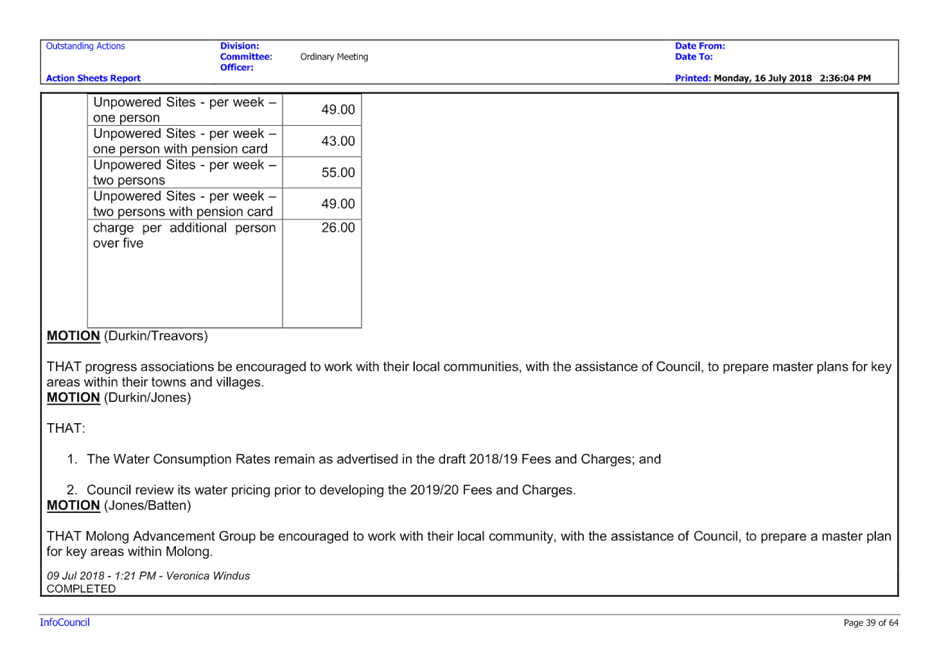
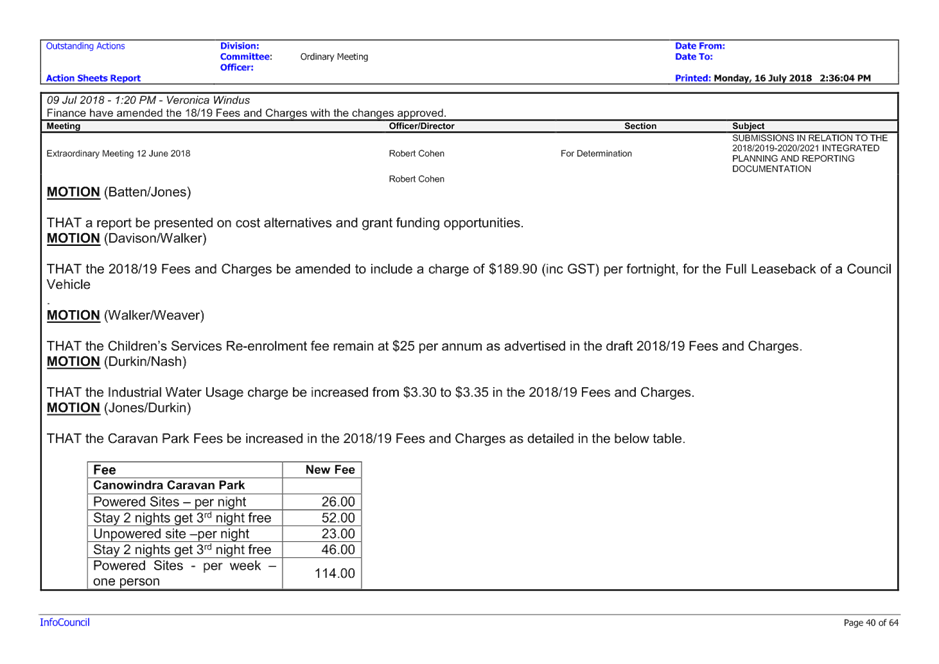
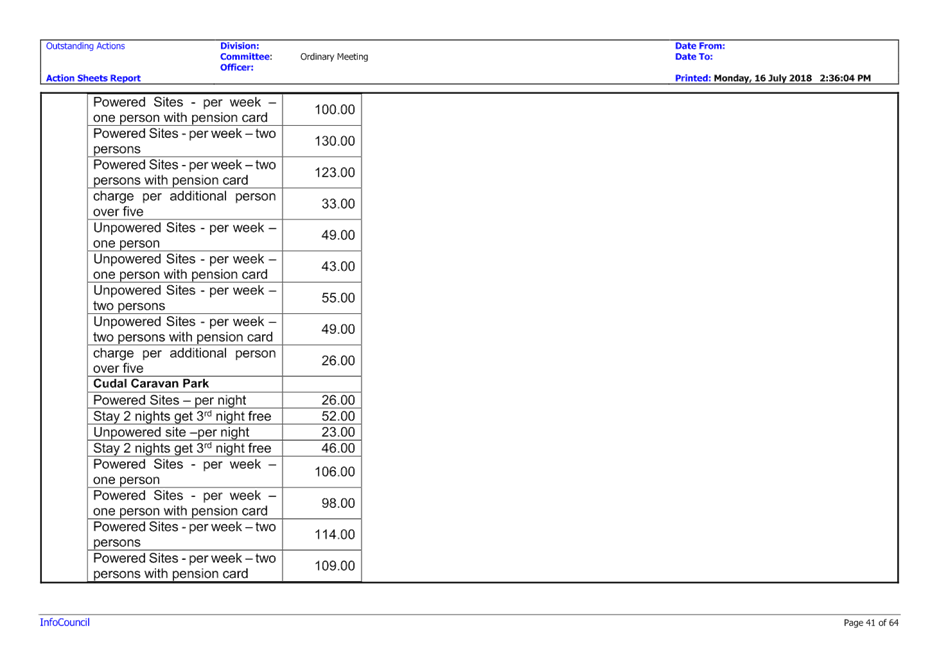
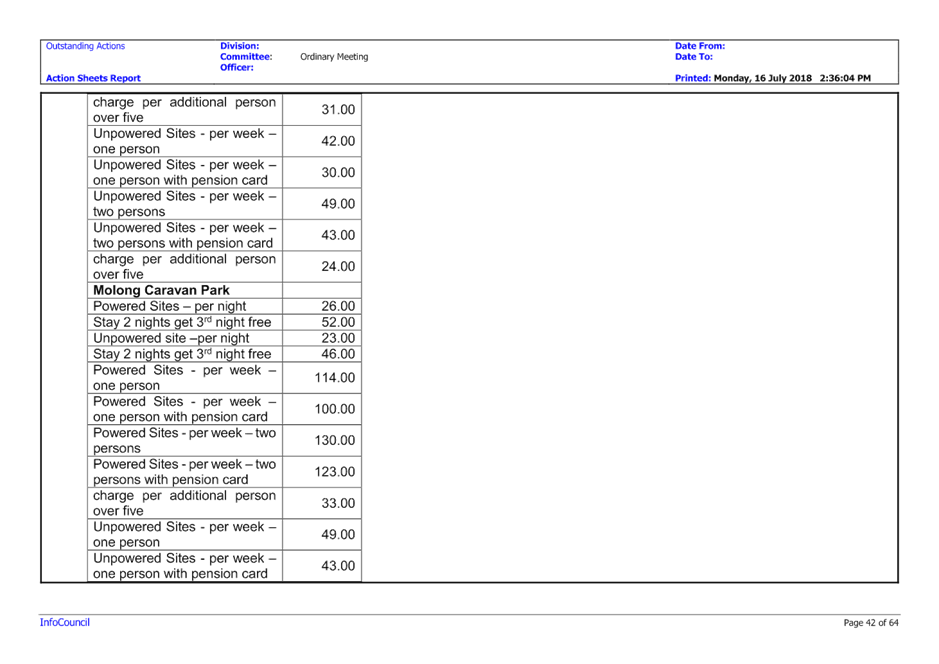
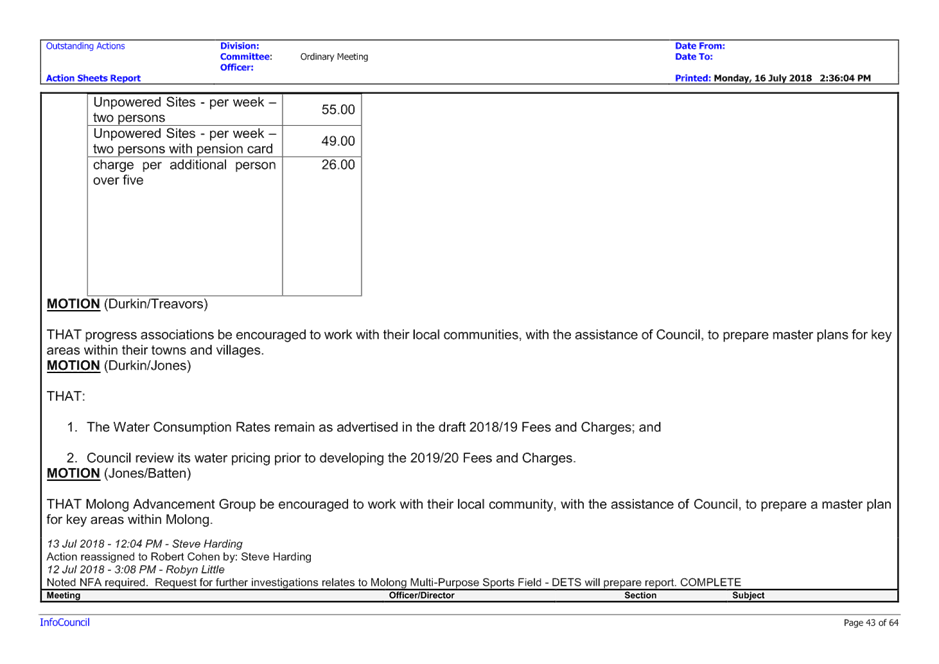
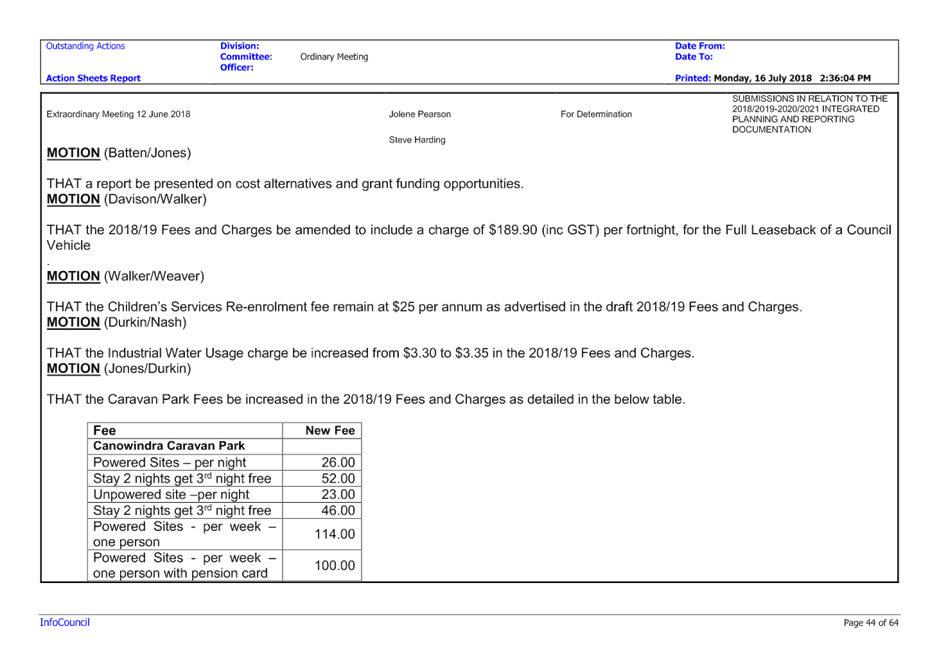
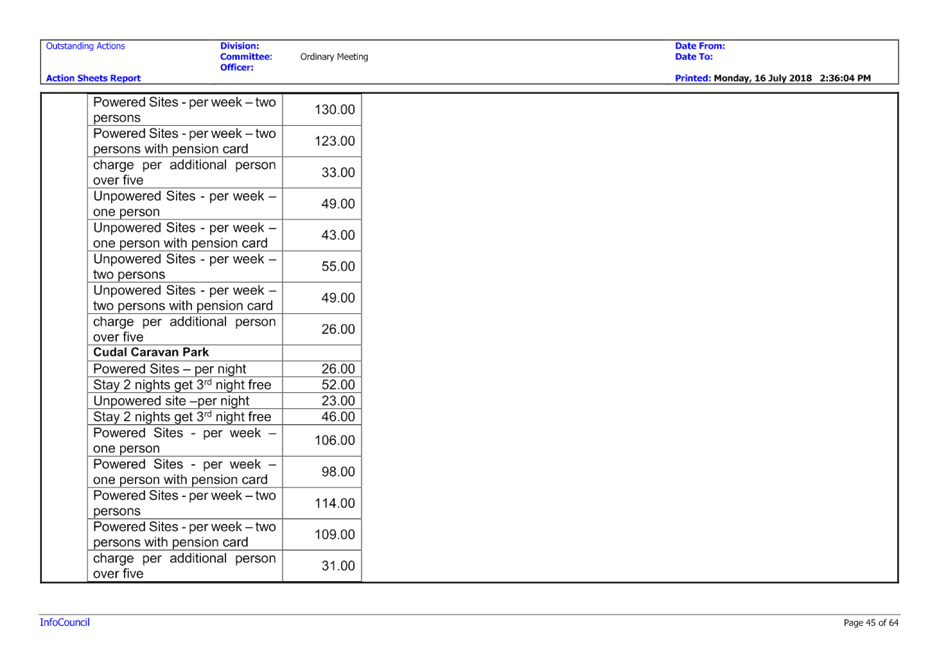
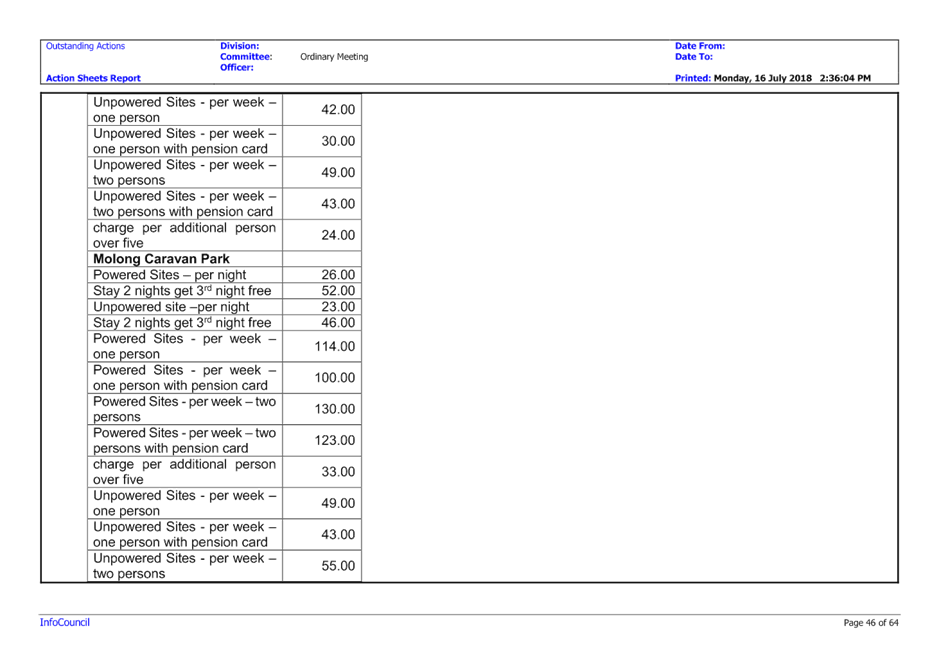
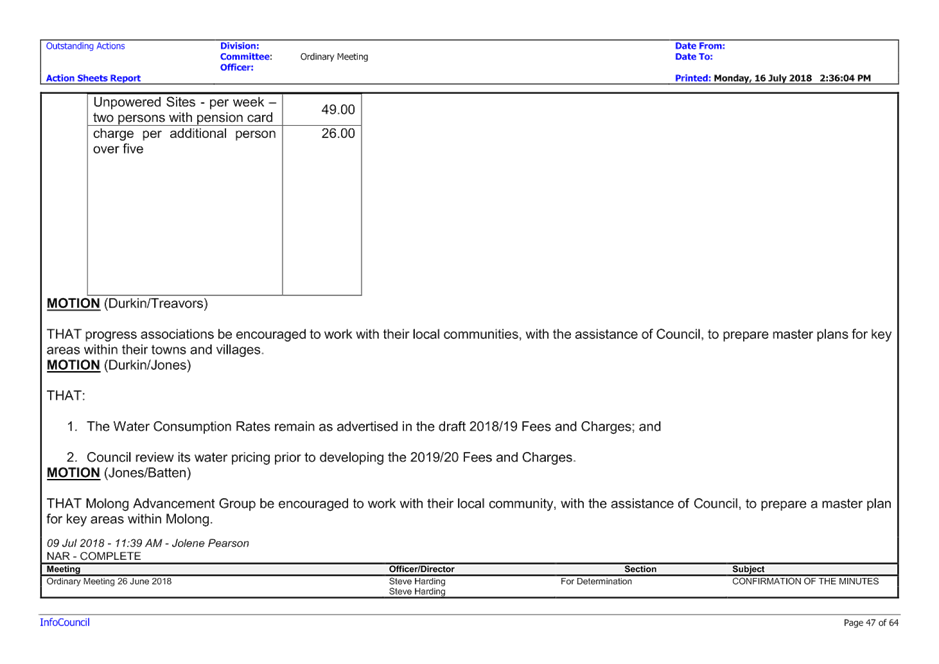
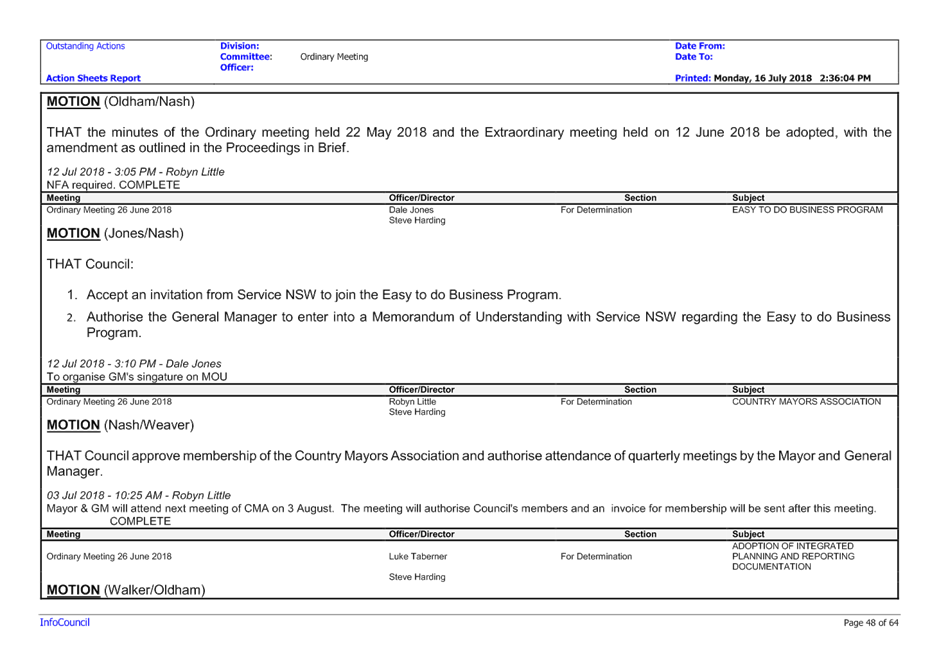
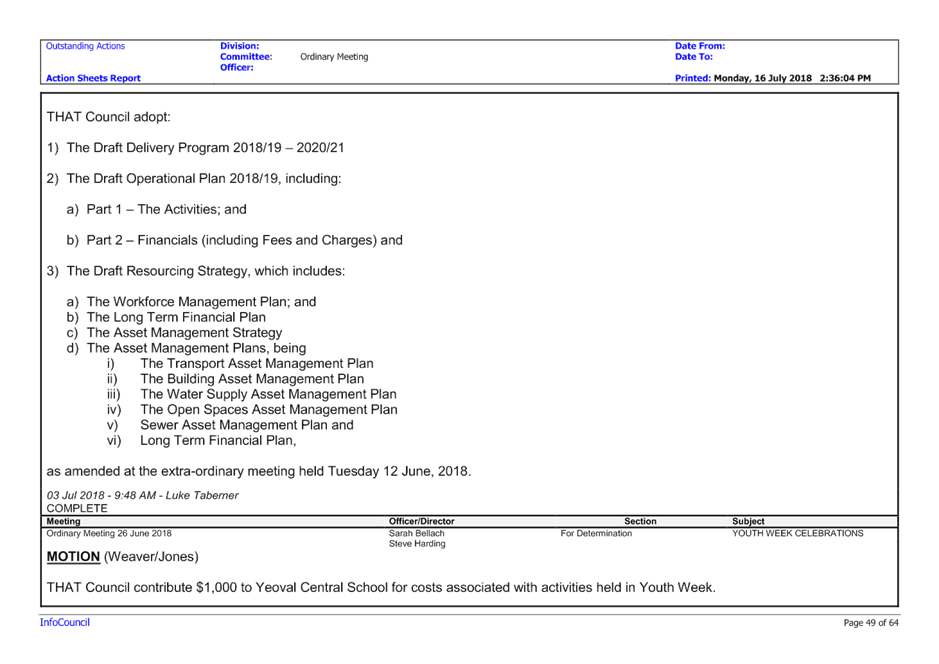
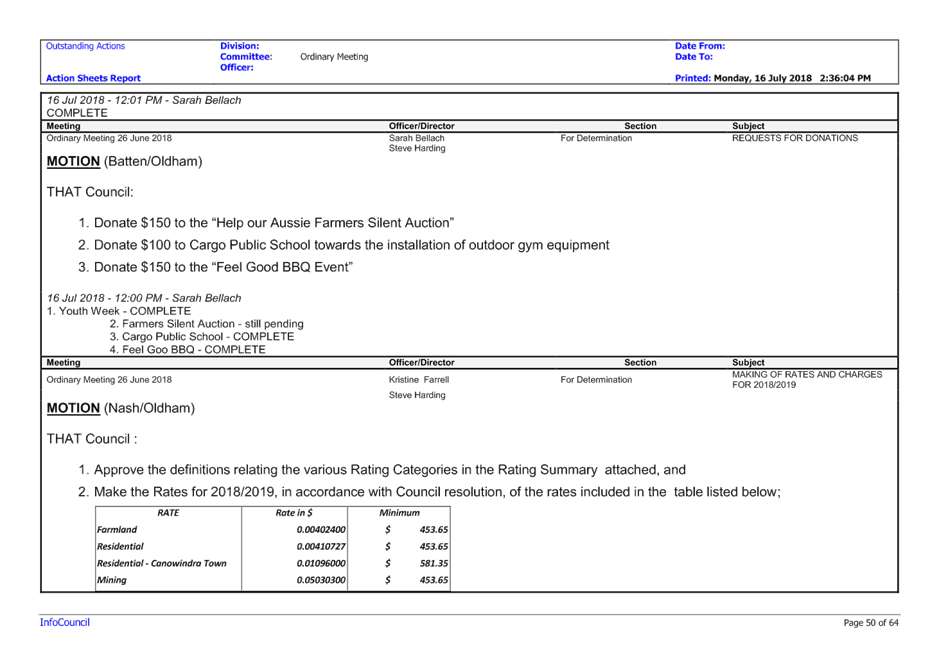
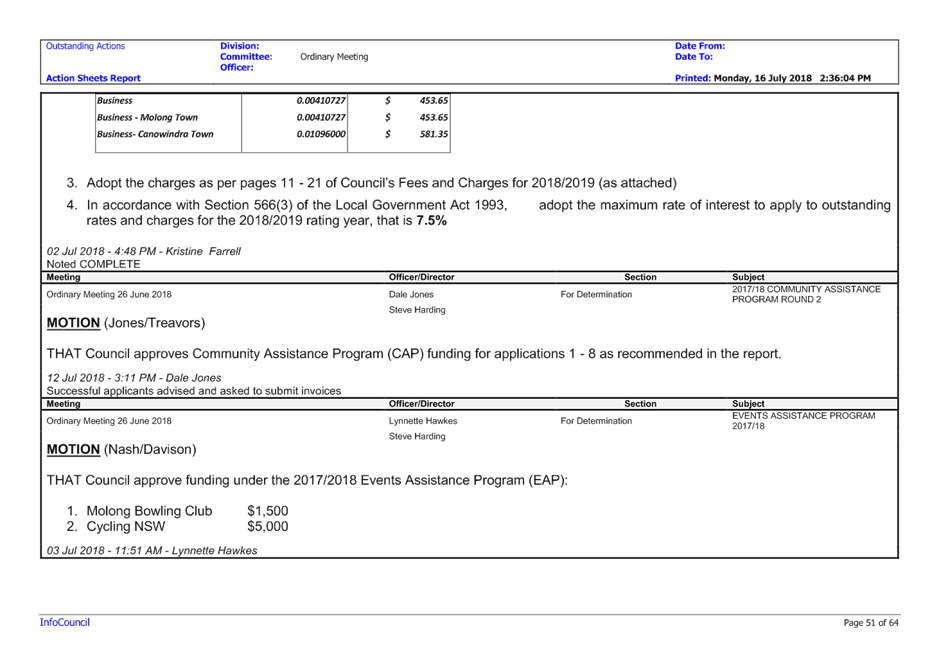
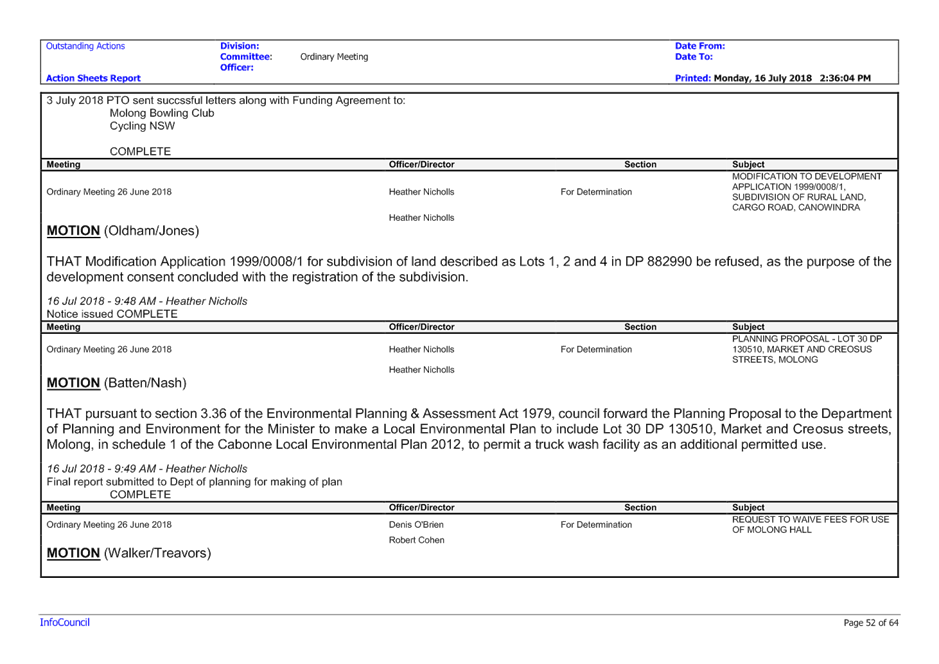
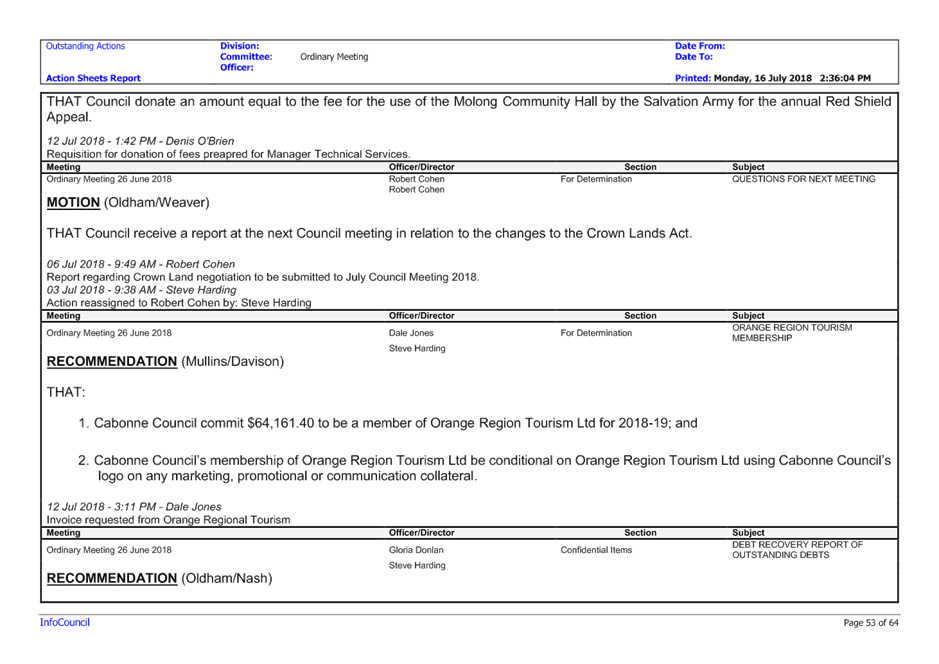
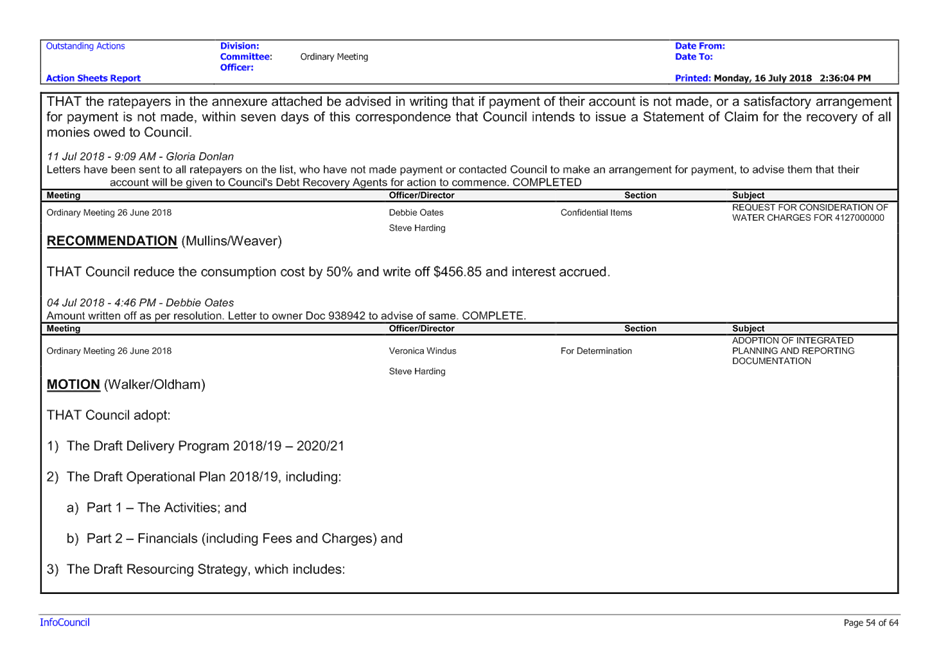
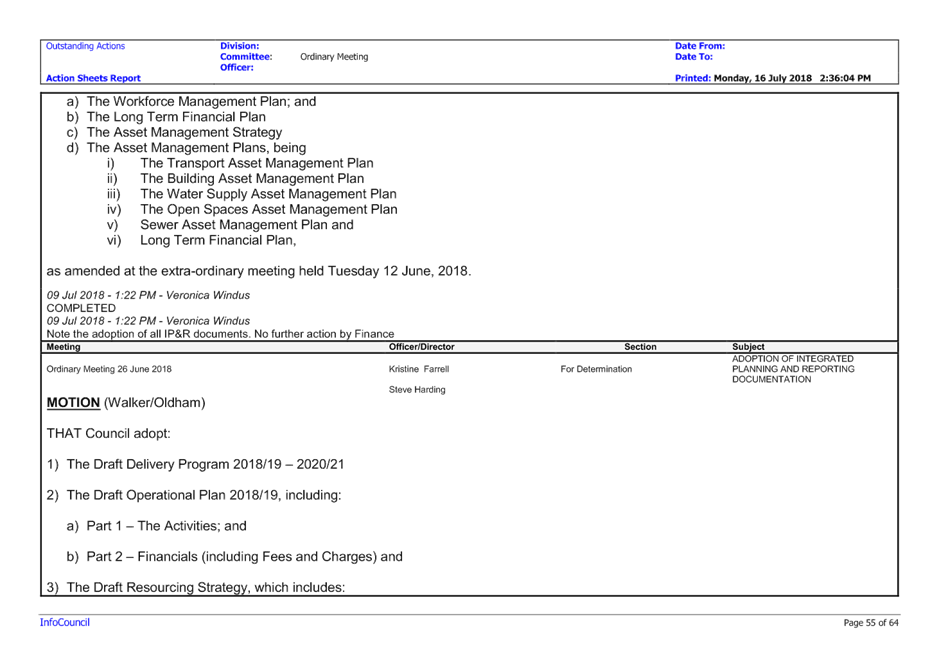
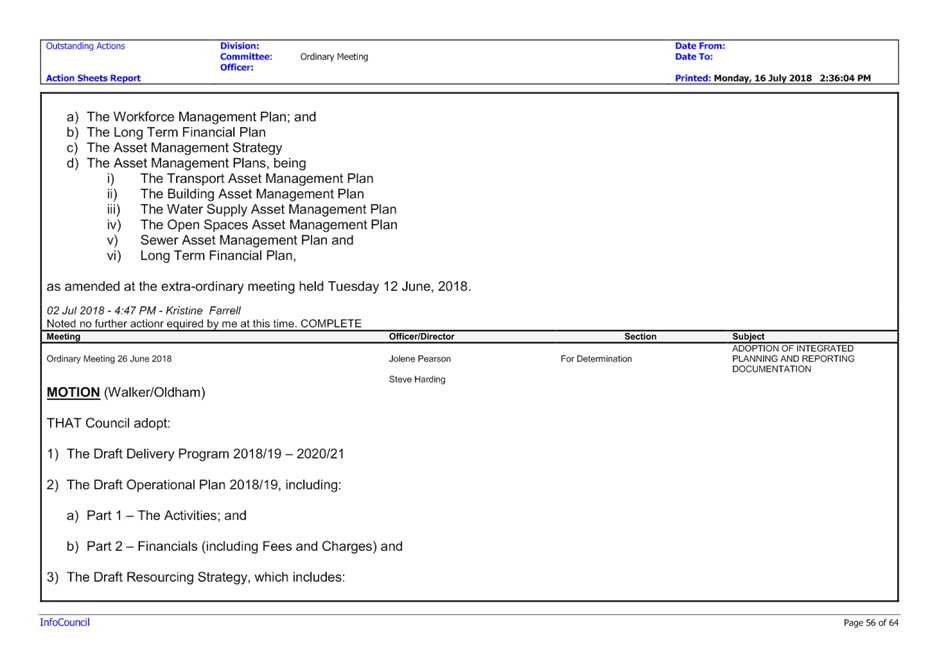
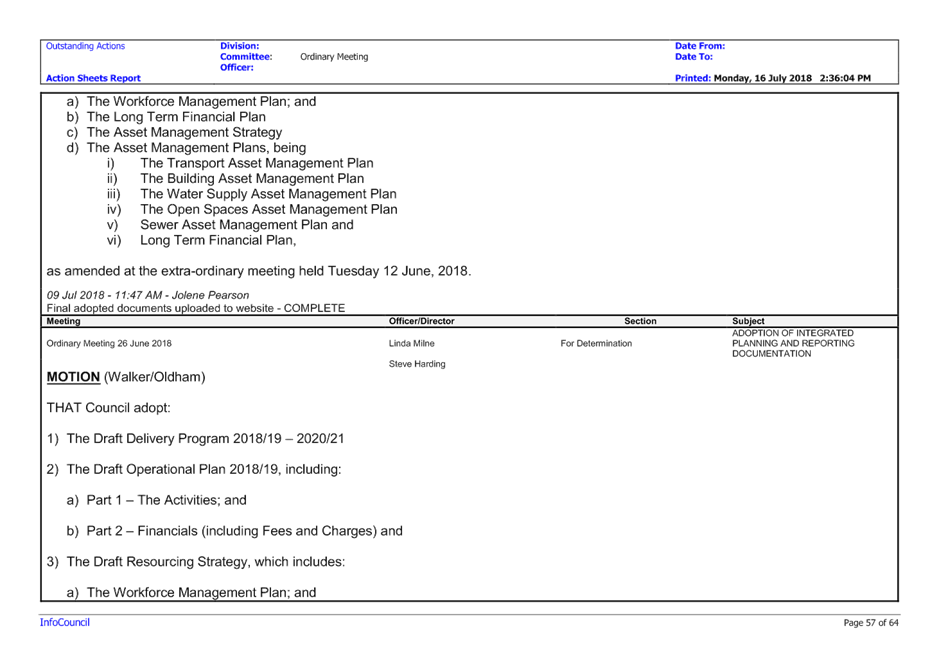
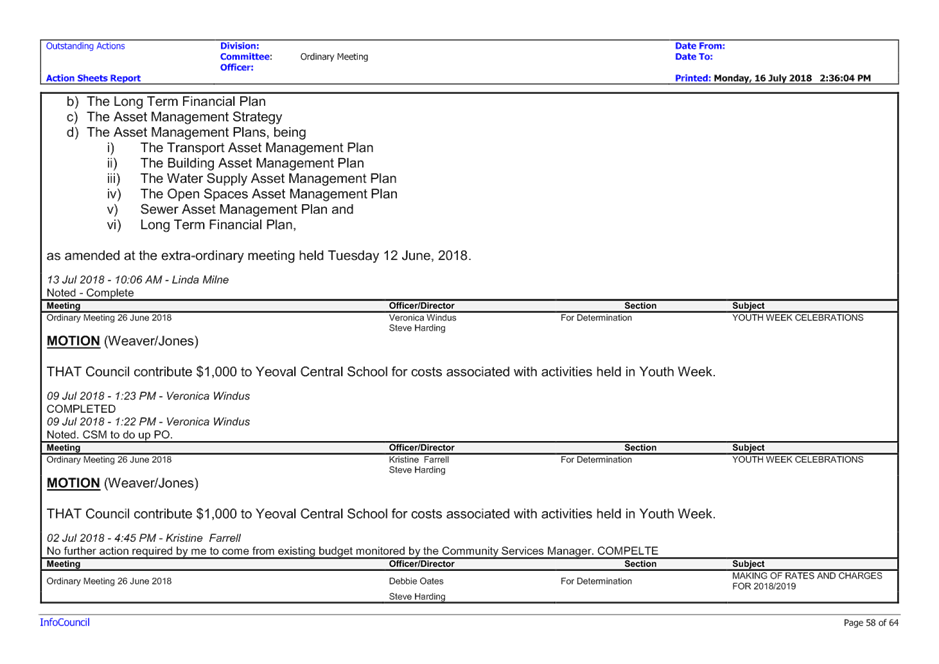
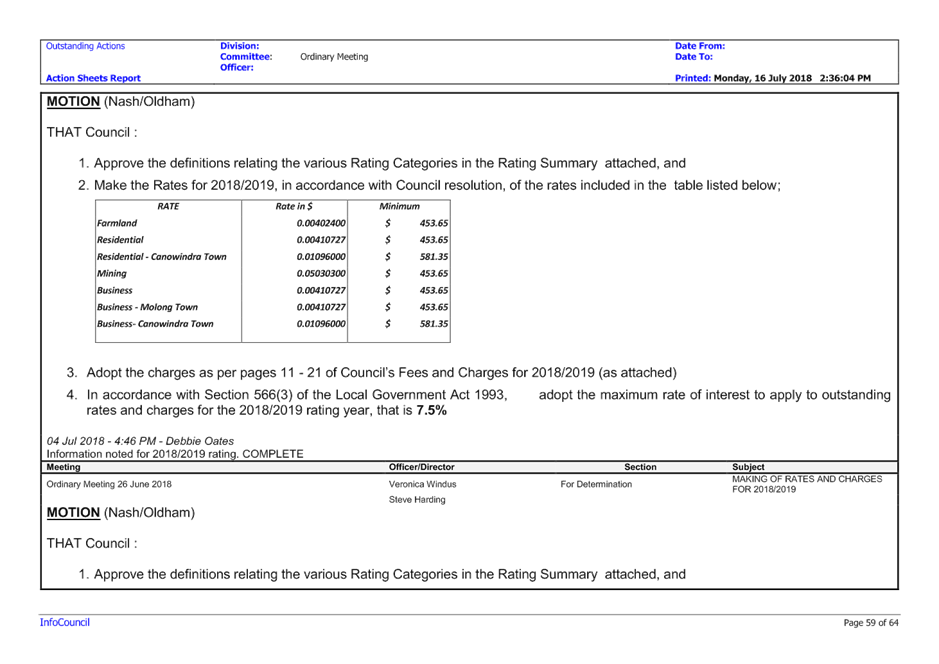
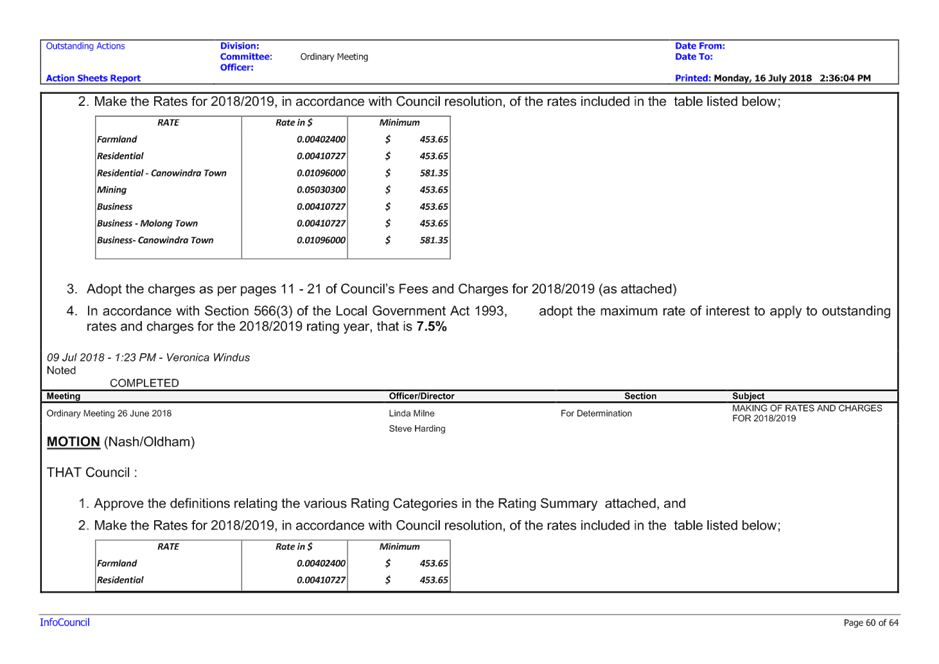
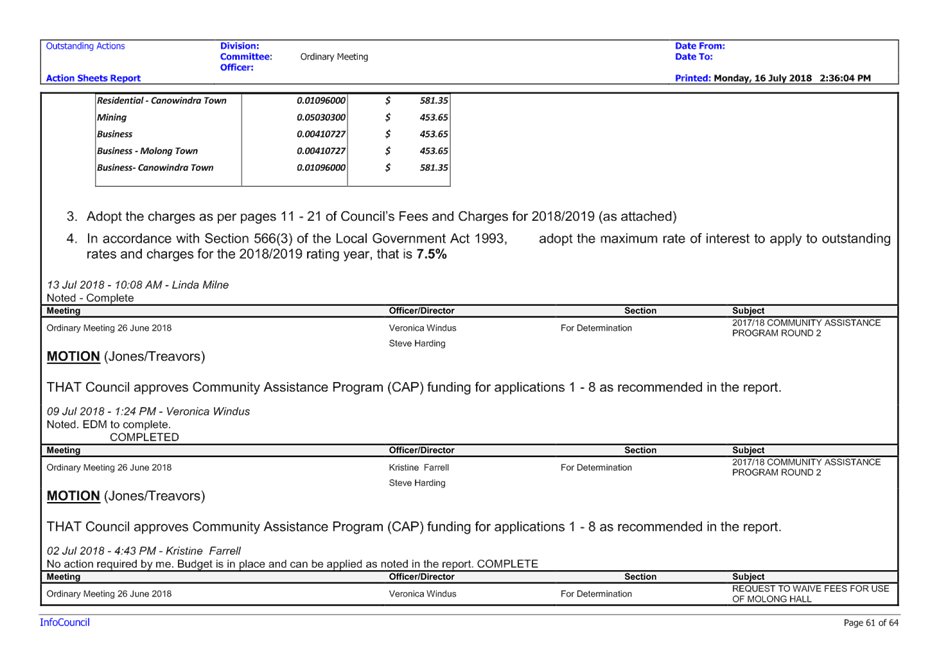
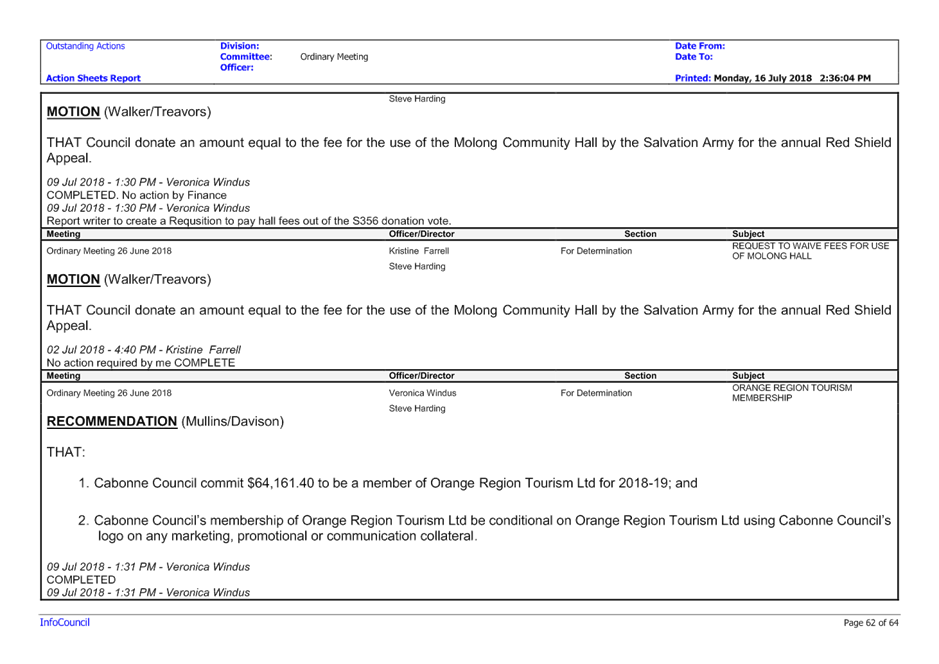
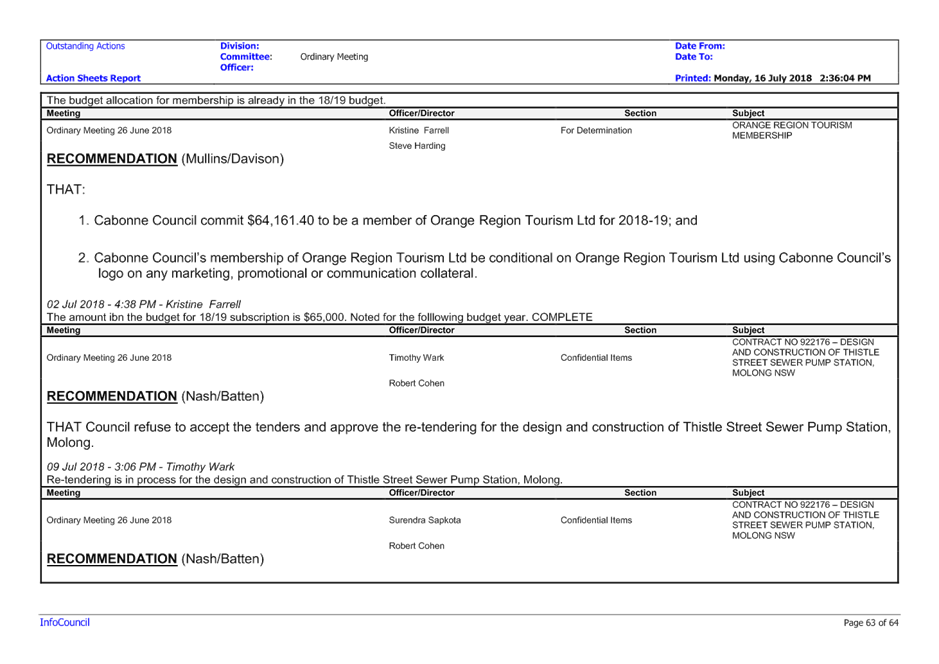

|
Item 3 Ordinary Meeting 24 July 2018
|
Item 3 - Annexure 2
|
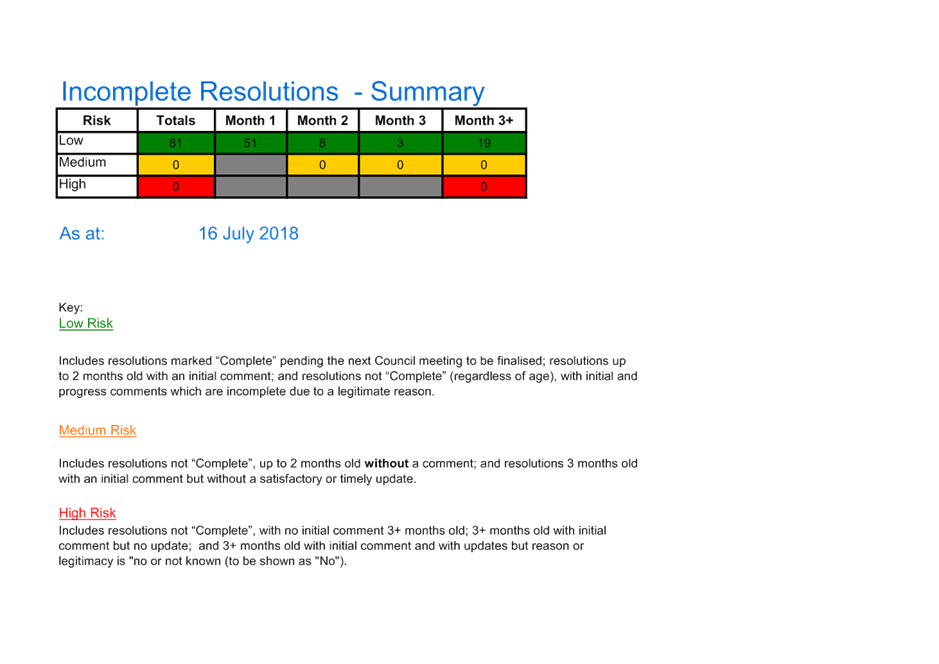
|
Item 7 Ordinary Meeting 24 July 2018
|
Item 7 - Annexure 1
|
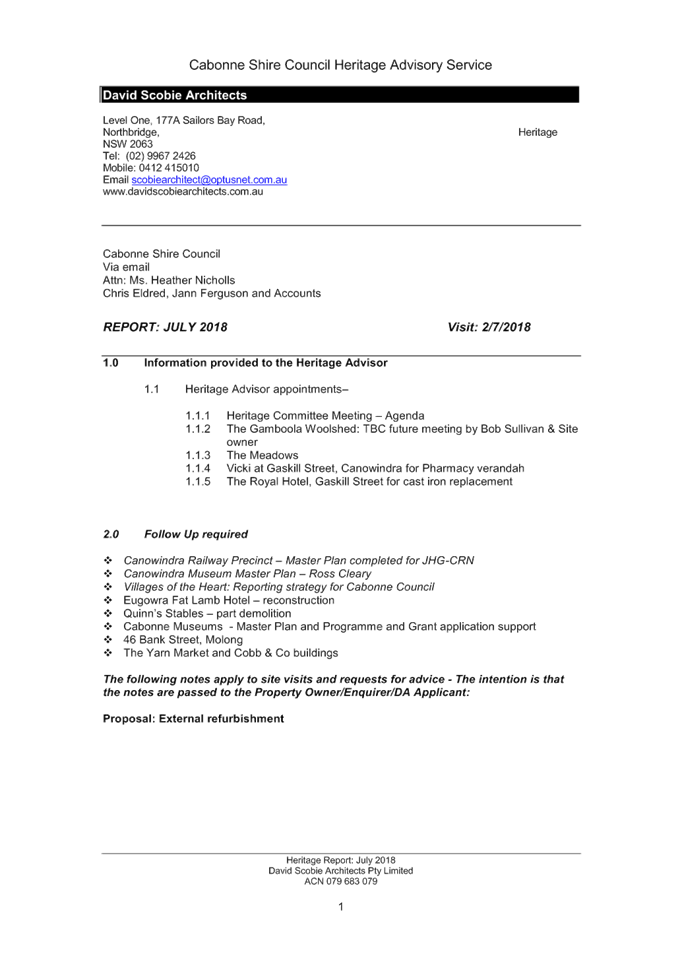

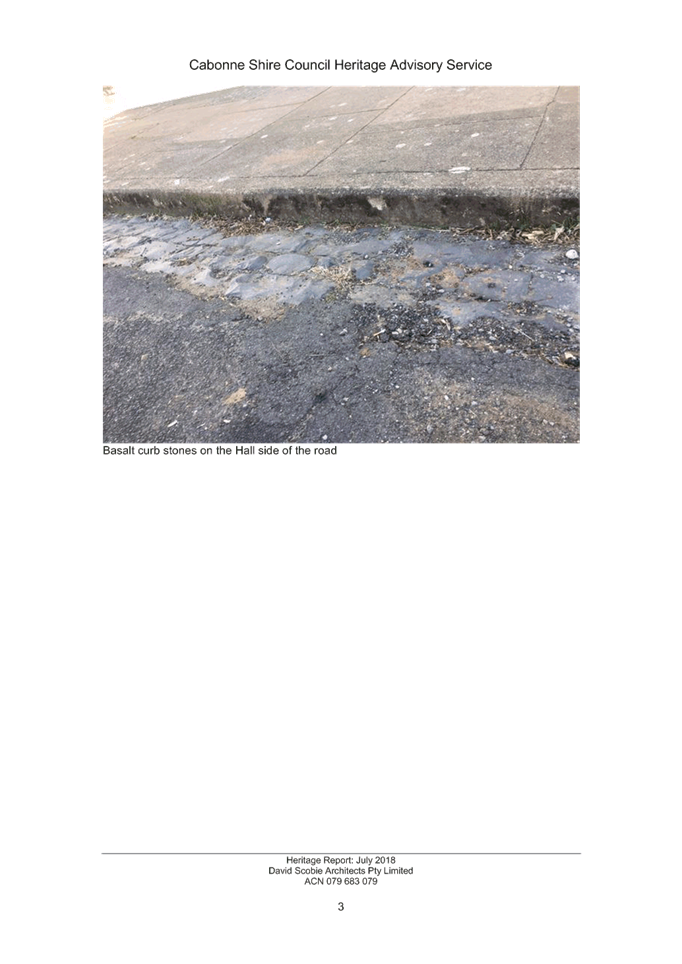
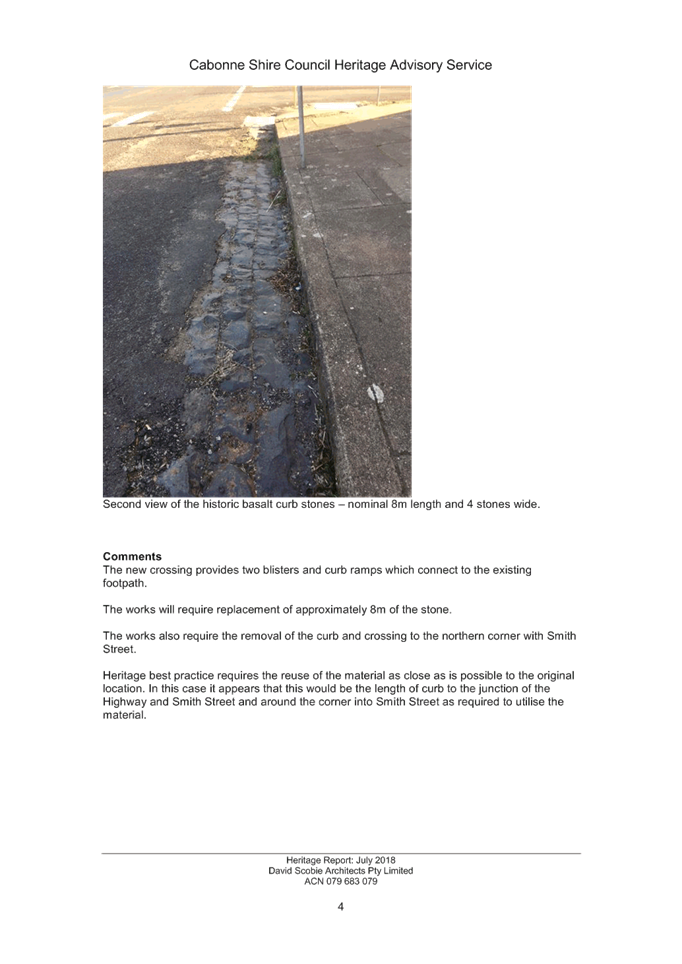
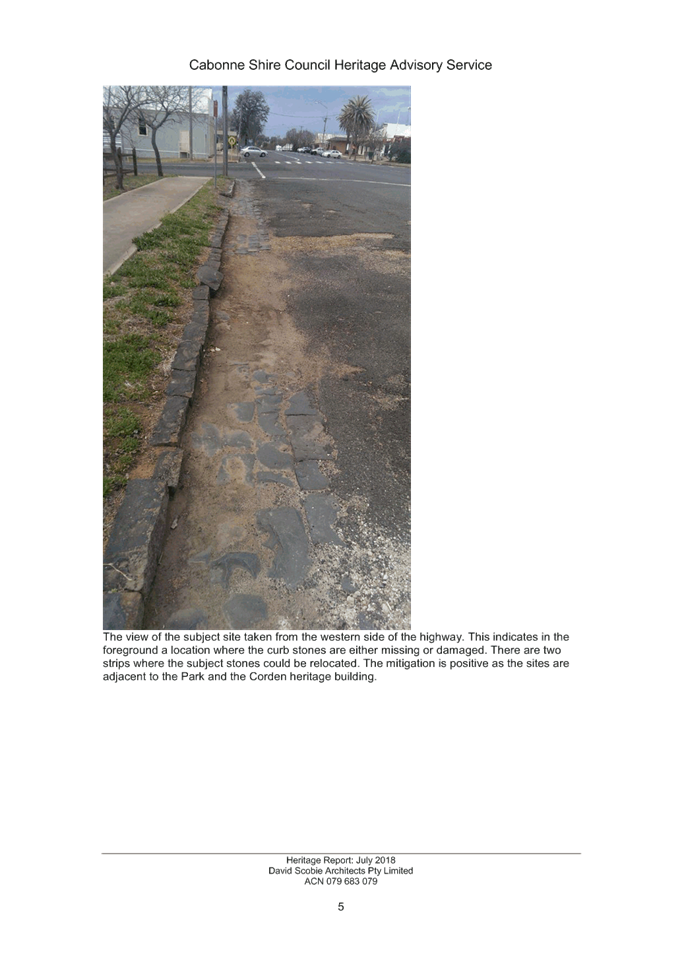
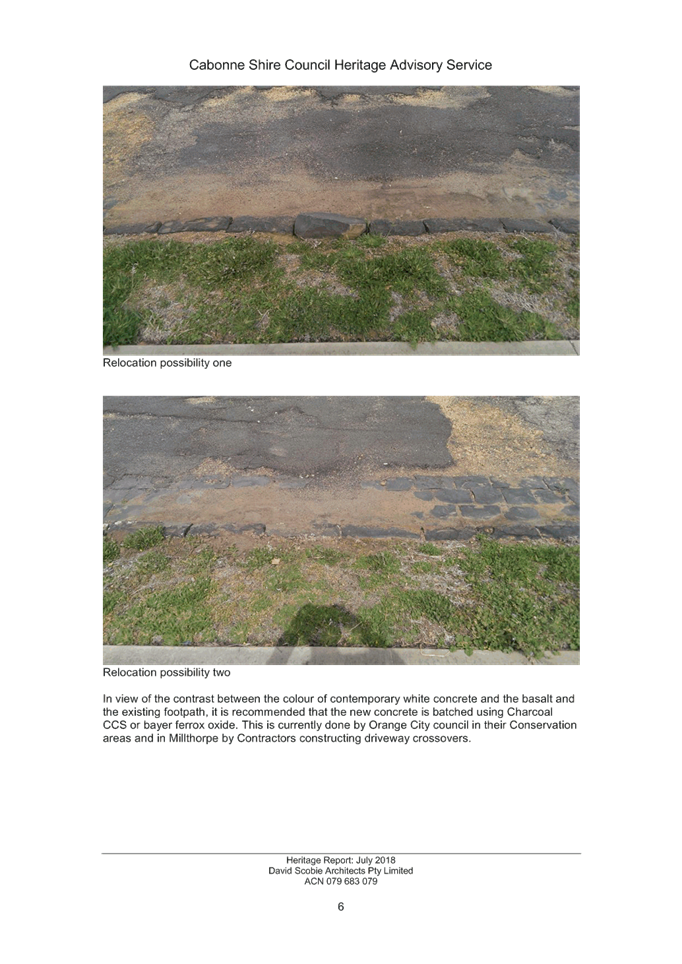
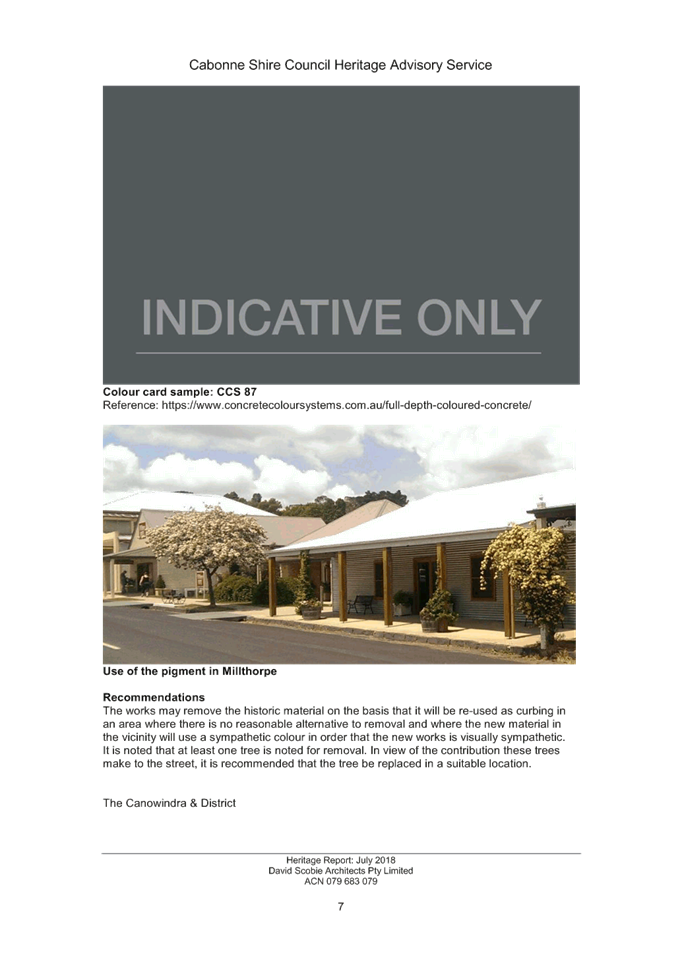
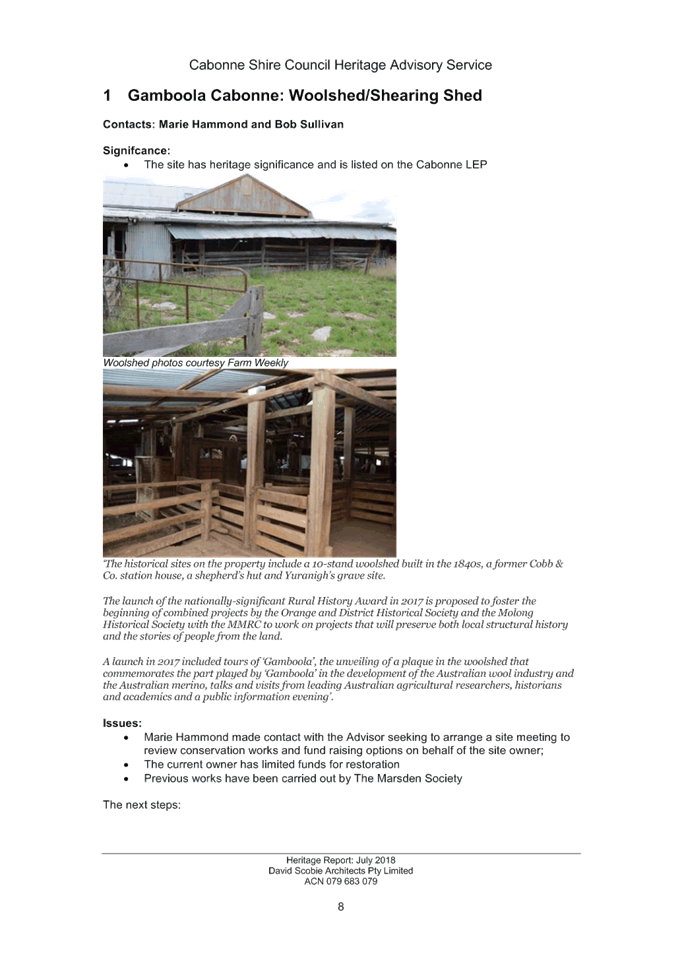
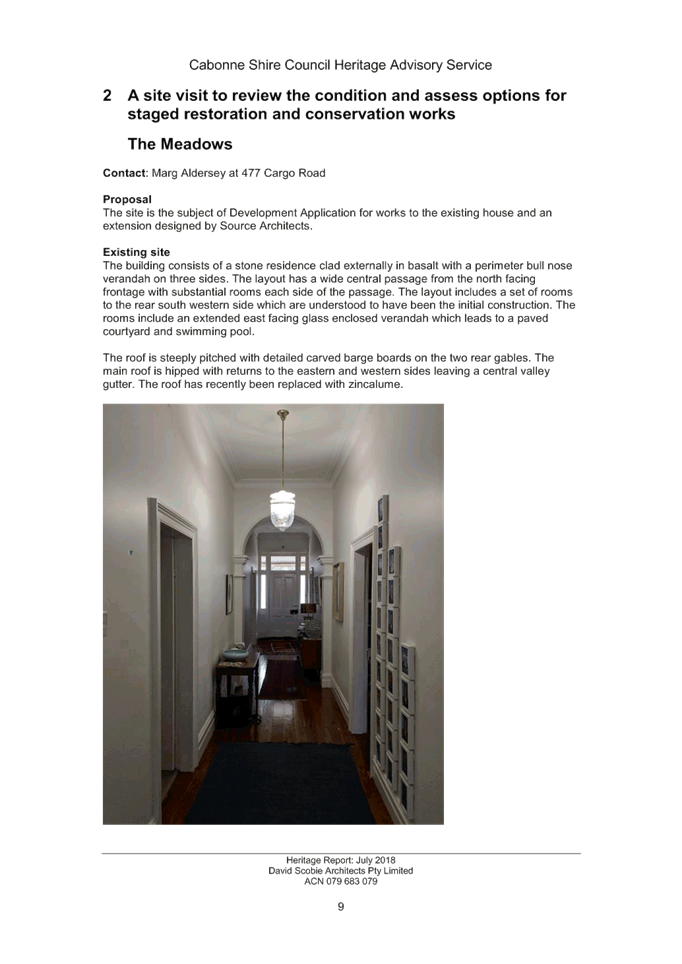


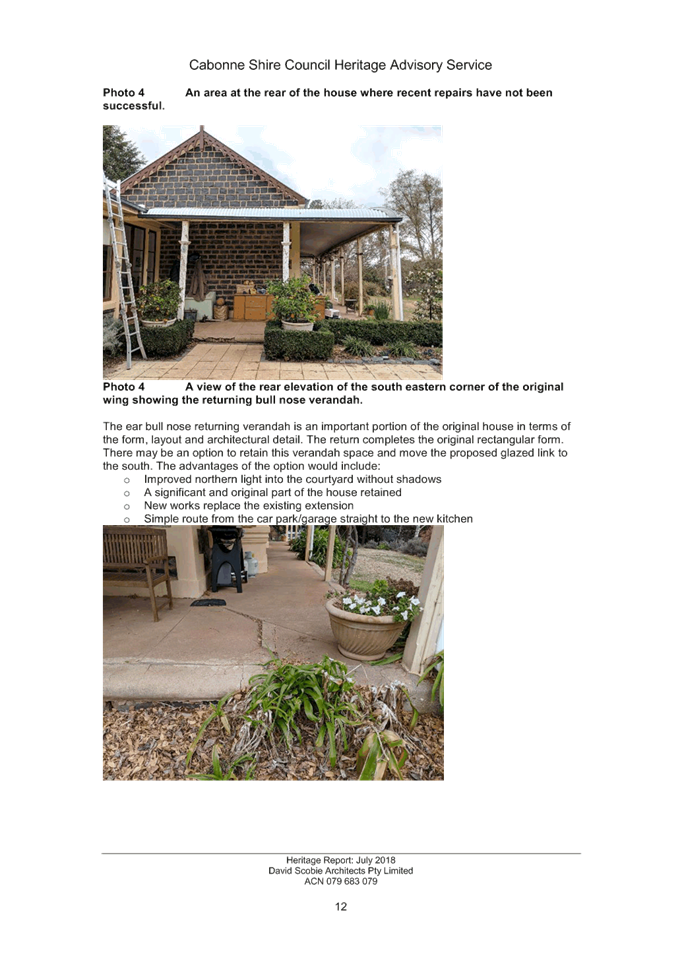
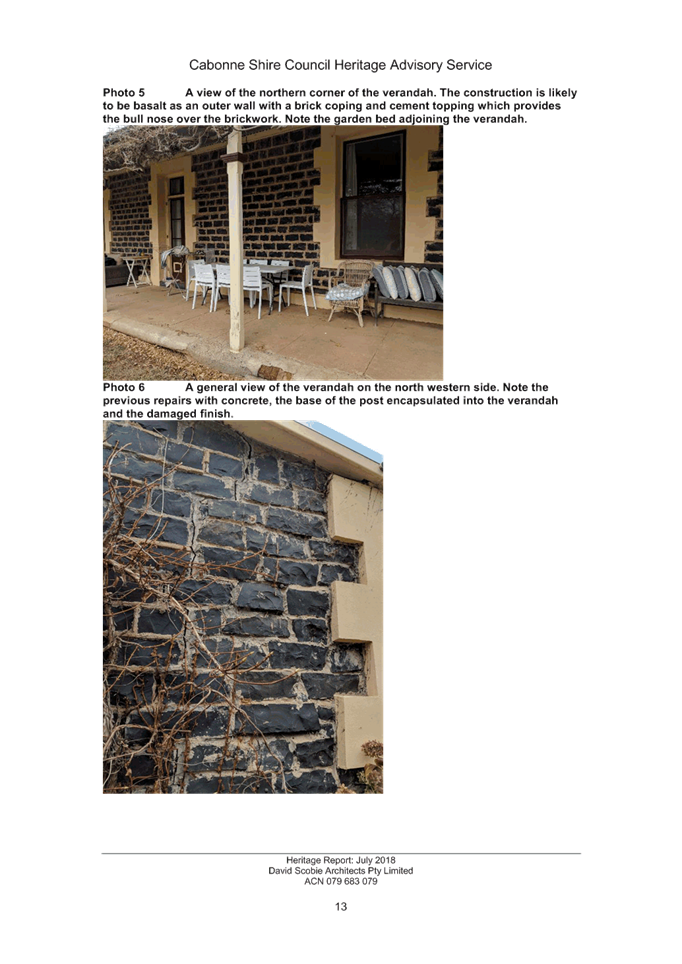
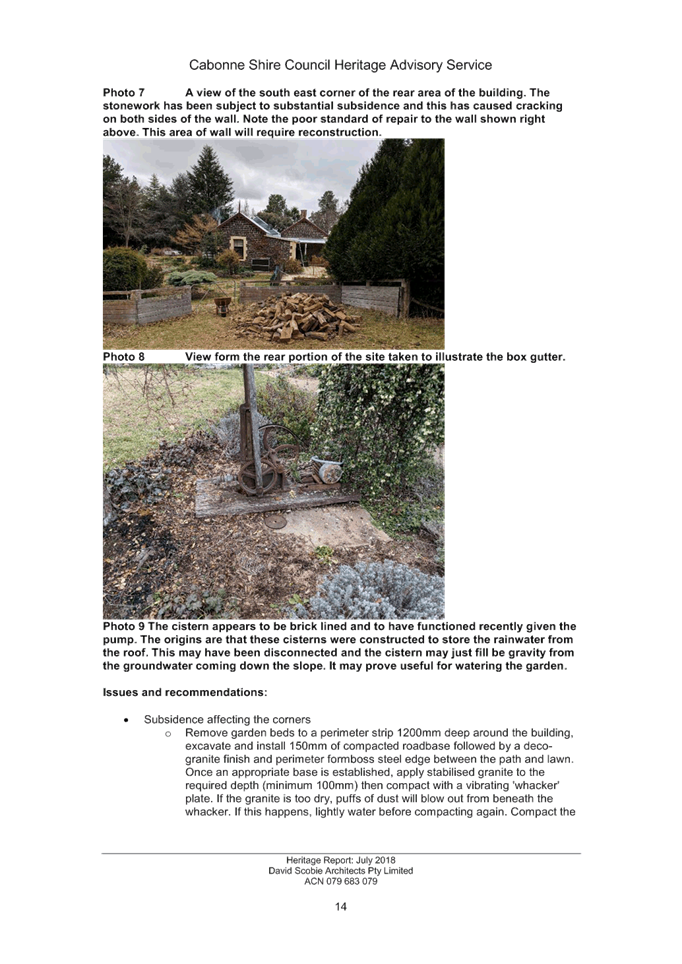
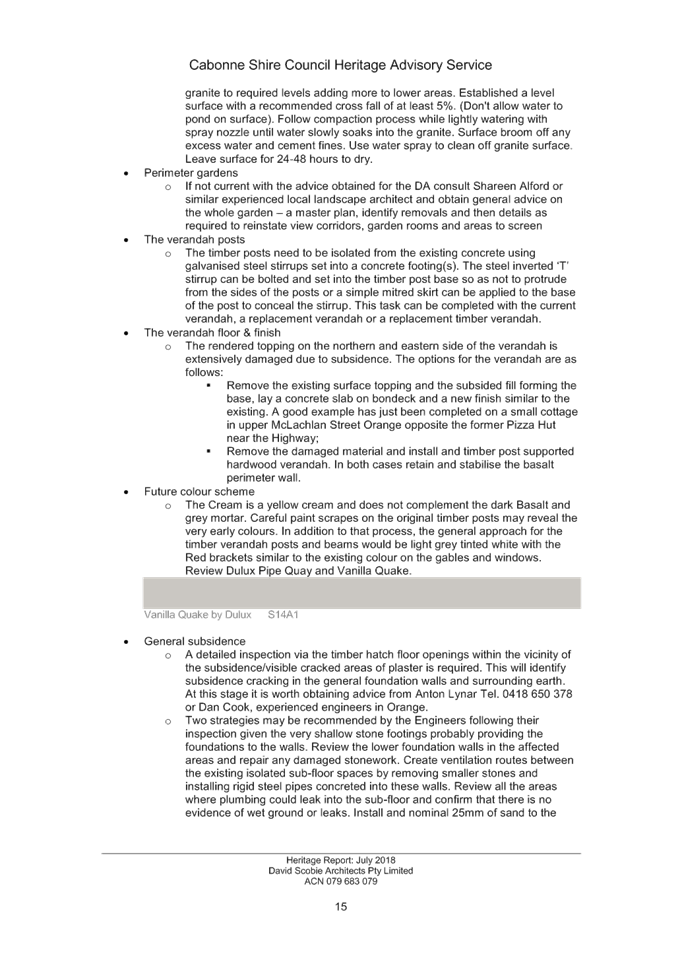
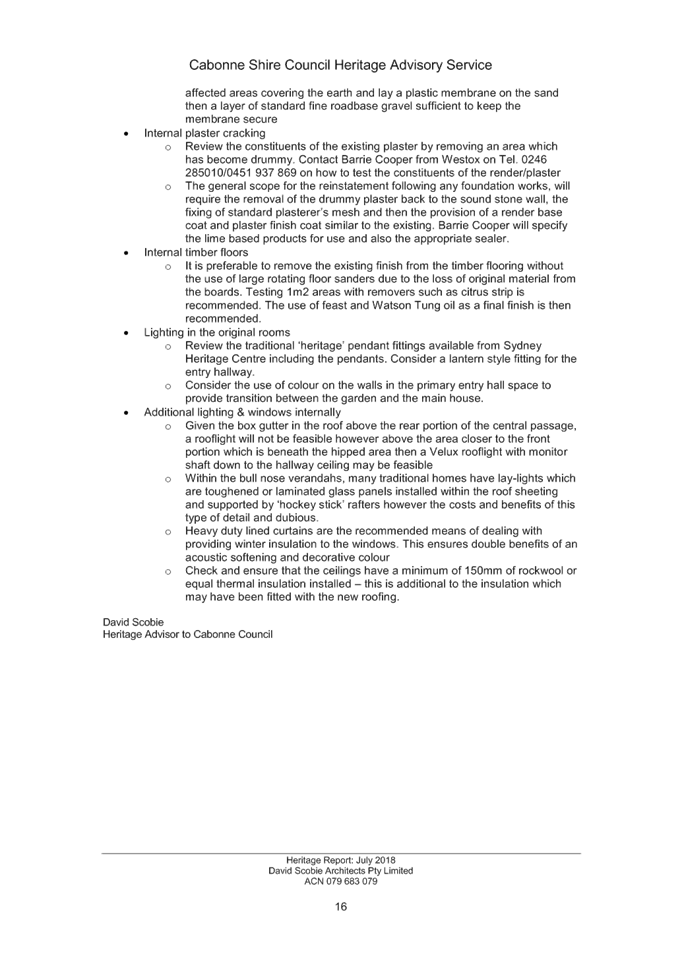


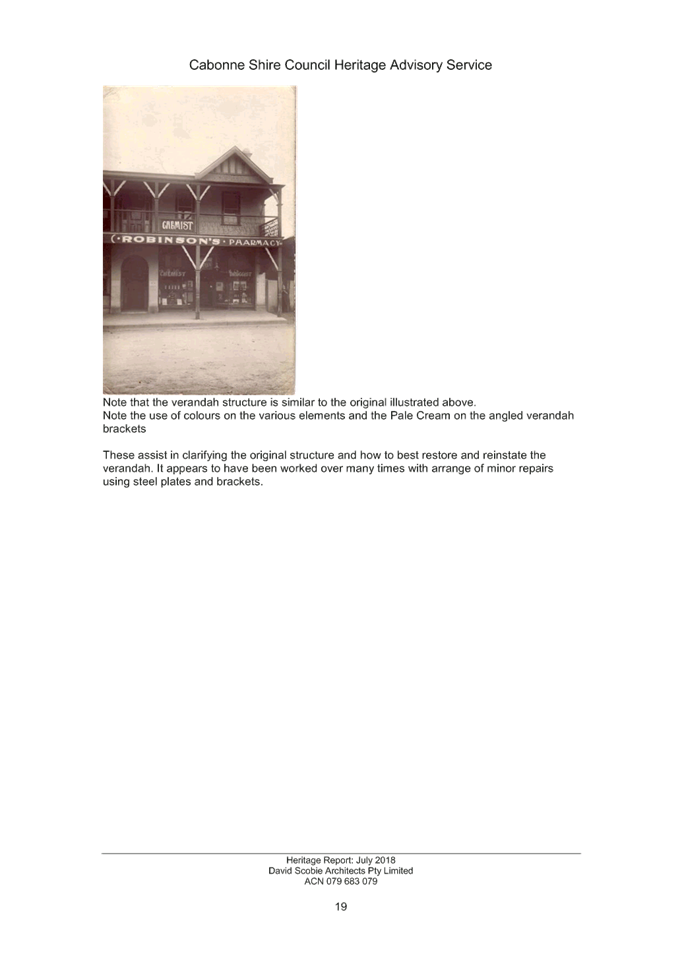
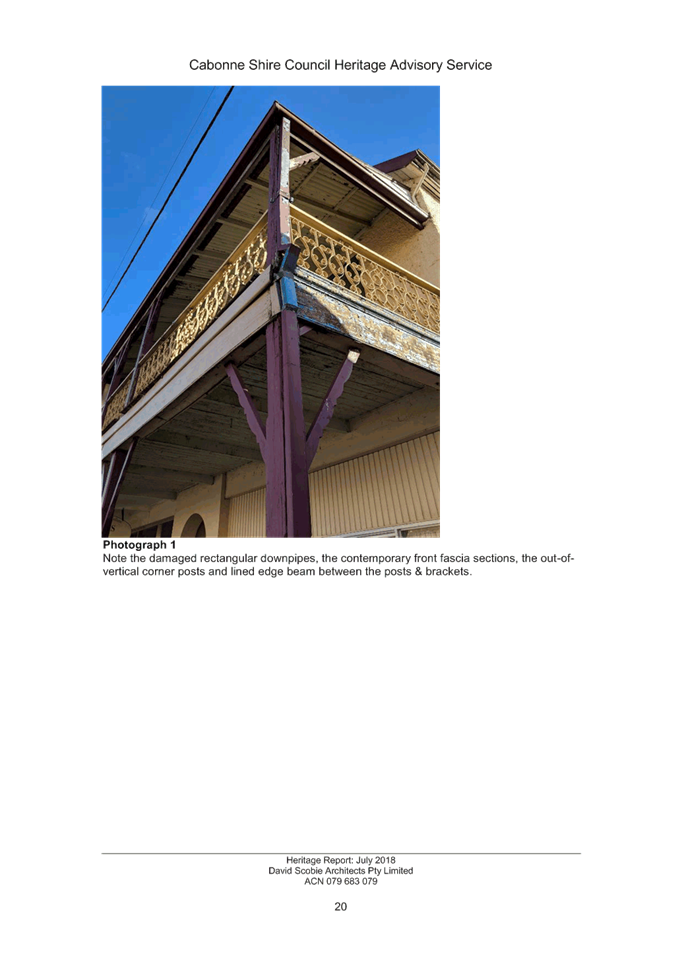
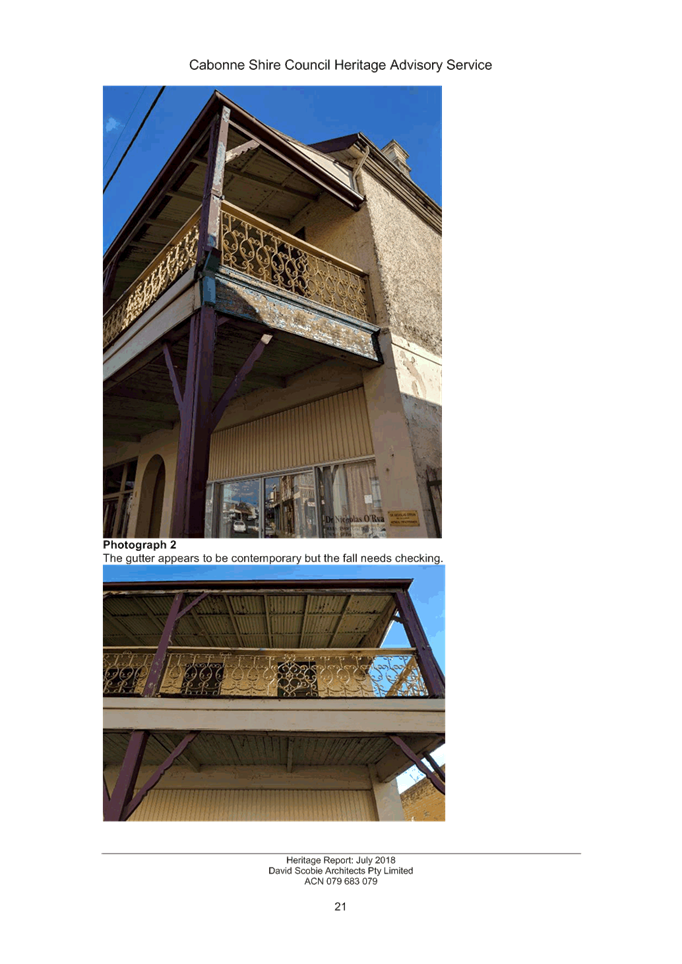
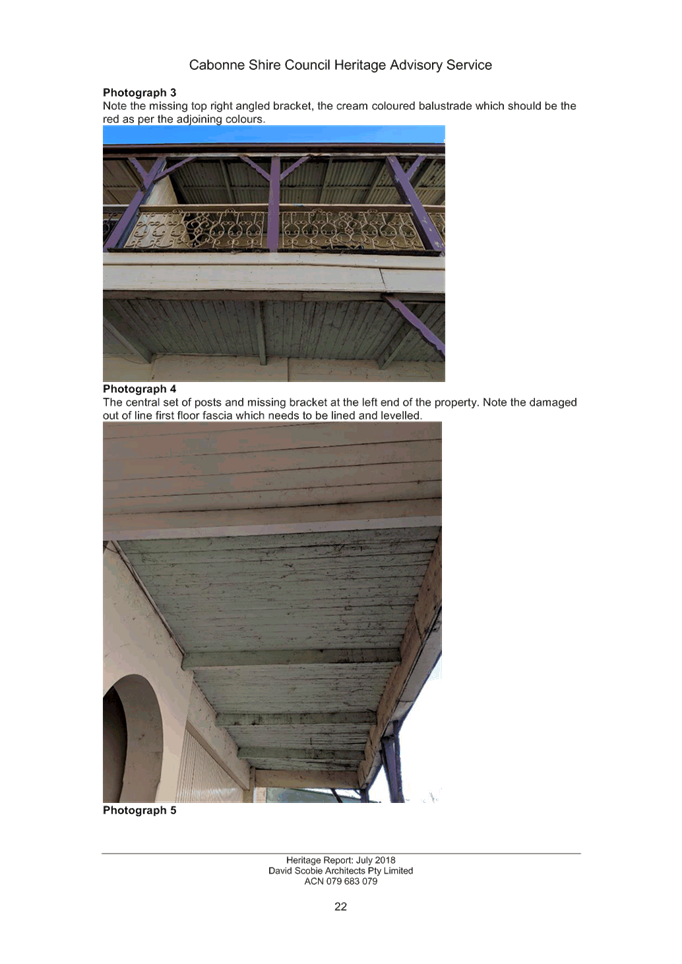
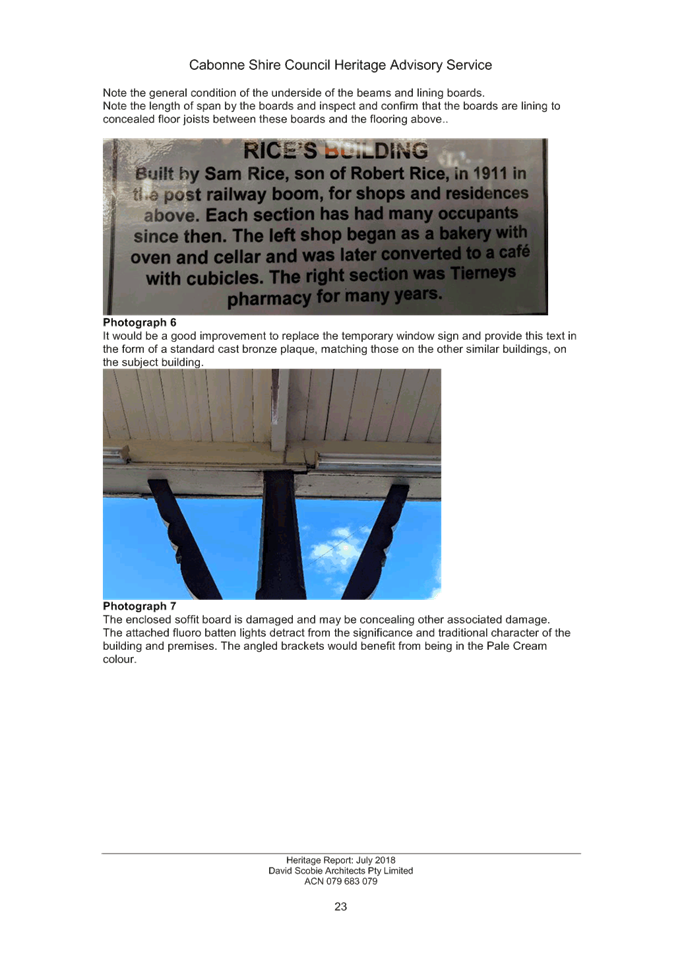
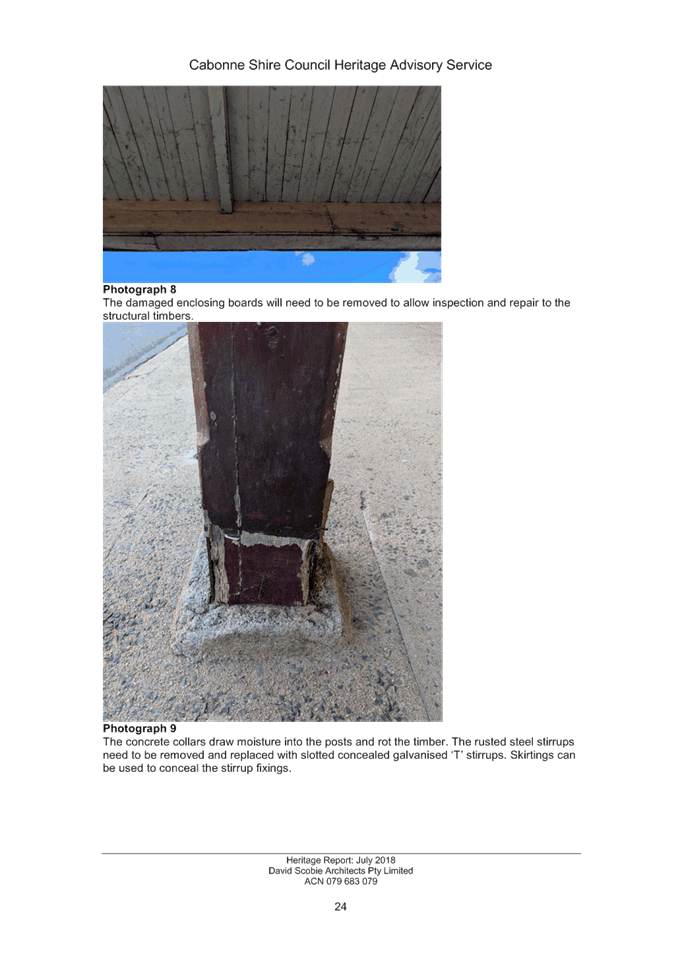
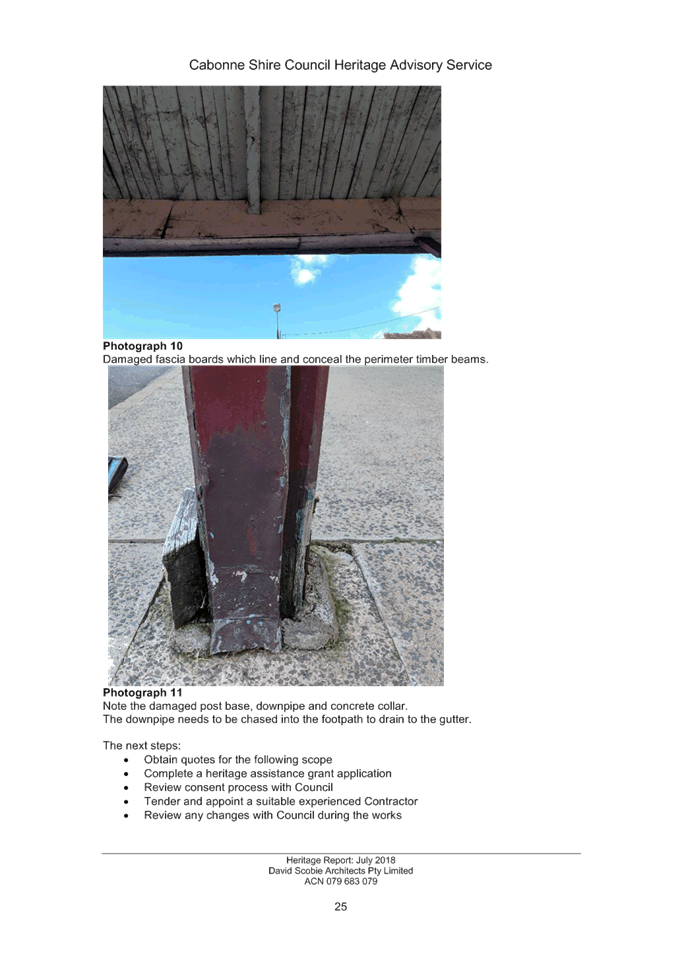
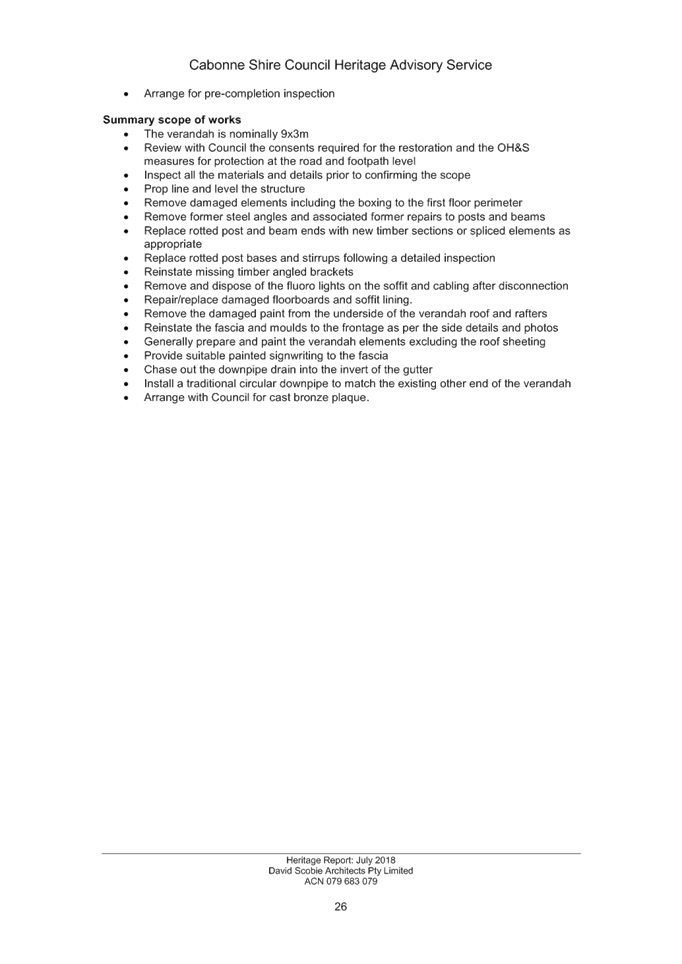
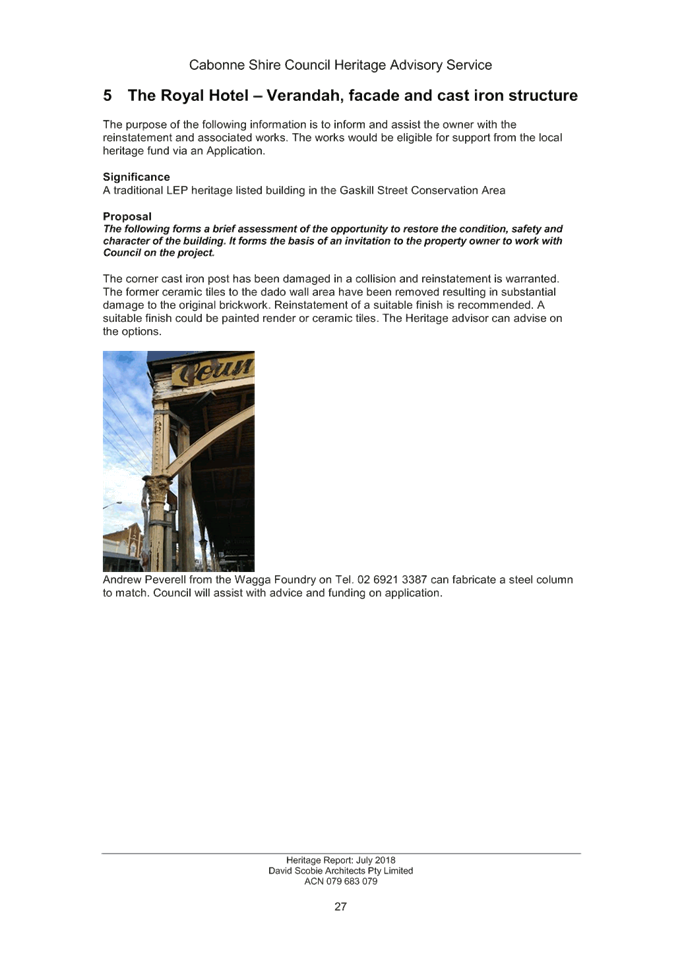
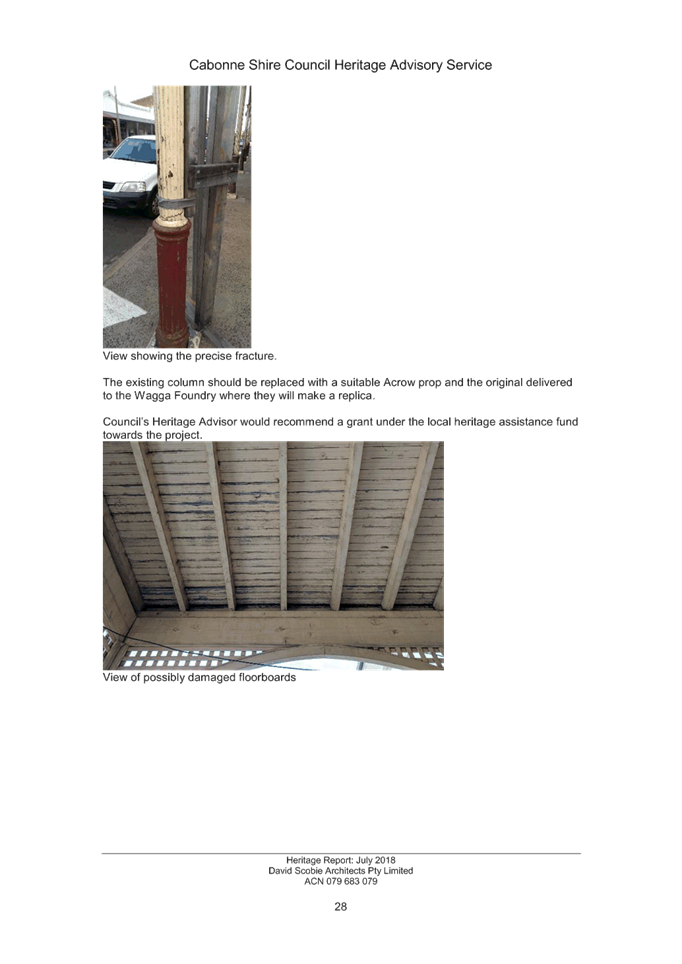
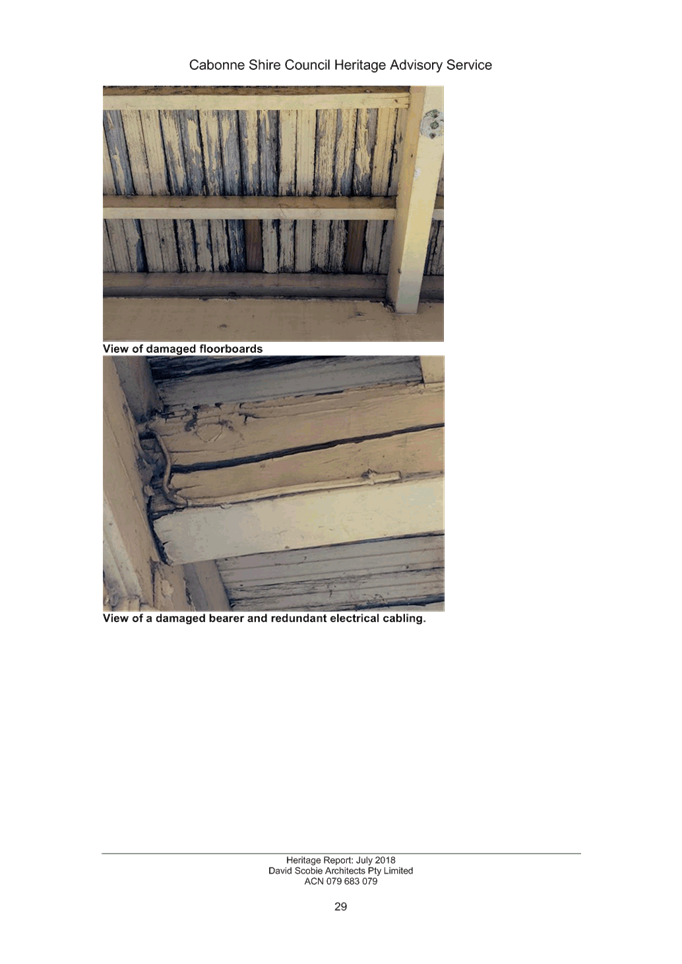

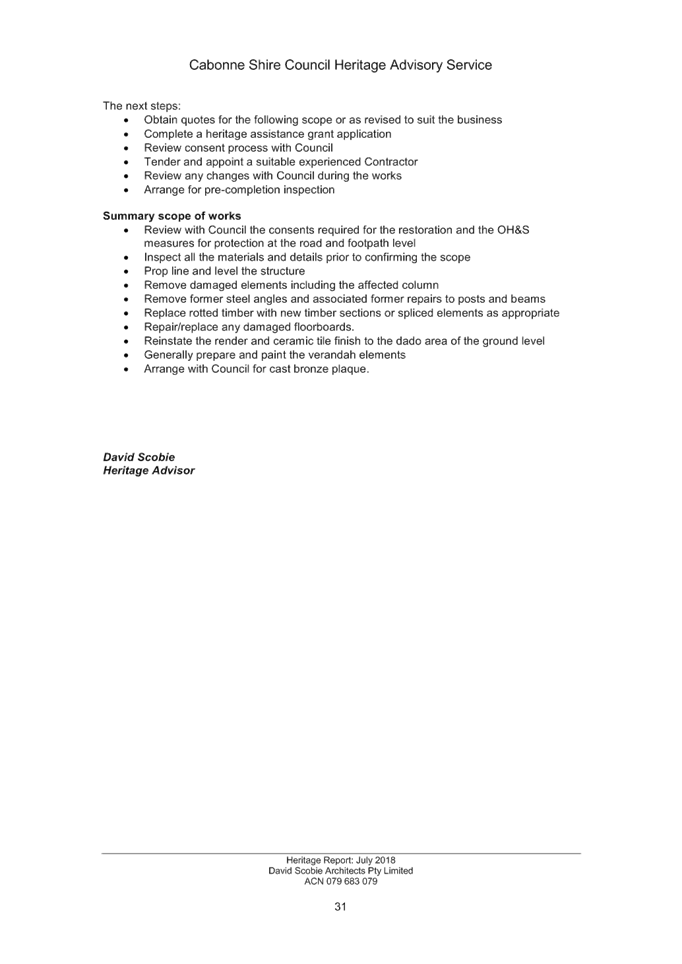
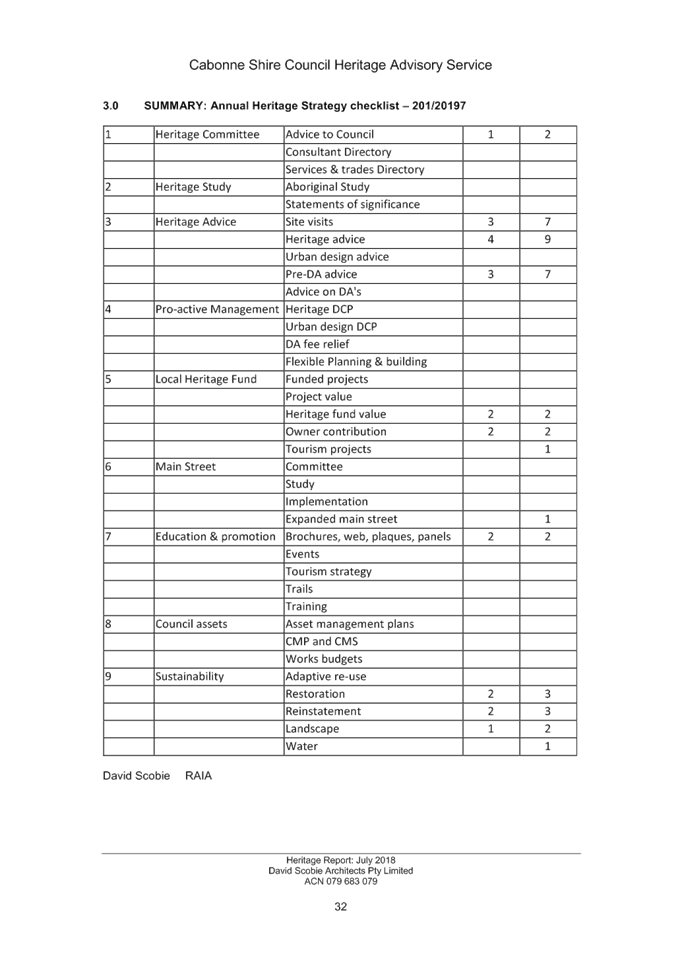
|
Item 8 Ordinary Meeting 24 July 2018
|
Item 8 - Annexure 1
|
|
ENGINEERING
EXPENDITURE and PROJECTS FOR 2017/2018
|
|
|
|
JULY
2018 REPORT
|
Budget
|
Actuals
|
|
14 - Administration
|
$4,864,500
|
|
|
Plant Fund Plant Purchases
|
$3,333,886
|
$2,128,644
|
|
Replace Council's Website
|
$69,000
|
$40,500
|
|
Connellys Store Upgrade –
internal upgrade.
|
$72,436
|
$8,580
|
|
Telephone System Replacement
landline
|
$80,500
|
$64,081
|
|
Orange Depot -Installation
of Security Fence and Gate
|
$34,500
|
$33,540
|
|
Orange Depot - Lunchroom &
Storage for Equipment
|
$11,500
|
$8,398
|
|
Refurbishment of Canowindra HACC
Office and Library
|
$31,533.00
|
$6,588
|
|
Yeoval Depot - Supply and
Install Air Conditioner
|
$2,990
|
$2,231
|
|
Cumnock Depot - Supply and
Install Air Conditioner
|
$2,990
|
$2,227
|
|
Replace Waluwin Alarm and Access
Control System
|
$17,250
|
$14,891
|
|
Redundant Network Links - Using
the NBN install redundant network links to offices, depots
|
$57,500
|
$4,606
|
|
Purchase of Asset Management
Software and Necessary Training
|
$100,000
|
$46,800
|
|
GS Scan Vehicle tester
|
$17,250
|
$13,600
|
|
Hitech Support - 40 Hours
Assistance
|
$9,775
|
$8,480
|
|
Configuration of Spectrum
Spatial Analyst - Exponaire's replacement
|
$57,500
|
$0
|
|
Upgrade Caterpillar Diagnostic
Computer Software
|
$17,250
|
$7,405
|
|
16 - Public Order &
Safety
|
$413,694
|
|
|
Moorbel Bush Fire shed
|
$38,287
|
$111,476
|
|
The Ponds Extension
|
$22,111
|
$1,840
|
|
Lidster Fire Station
|
$193,426.00
|
$107,089
|
|
Cumnock RFS Station
|
$400,000
|
$169,956
|
|
North Bangaroo RFS Station
|
$200,000
|
$79,254
|
|
19 - Environment
|
$3,303,126
|
|
|
Install Solar Security at
Council's 6 Waste Management Facilities
|
$207,000
|
$0
|
|
Voluntary Purchase –
5 Betts Street, Molong
|
$300,000
|
$194,836
|
|
Molong Floodplain - Flood Levee
|
$66,551.00
|
$31,681
|
|
Canowindra Stormwater Drainage -
Stage 1
|
$200,000
|
$413.50
|
|
Puzzle Flat Creek Levee
|
$2,426,625
|
$248.80
|
|
Eugowra Storm Water - Plan for
17/18 Budget
|
$88,000
|
$0
|
|
22 - Housing & Community
Amenities
|
$131,611
|
|
|
Molong Cemetery -
Upgrade/complete internal driveways and pathways
|
$47,086
|
$12,993
|
|
24 - Cabonne Water
|
$15,617,364
|
|
|
Water Assets - Electronic Meter Roll
Out
|
$244,088
|
$0
|
|
Water Assets - Telemetry Base
Infrastructure
|
$73,140
|
$18,775
|
|
Water Assets - Molong
Cumnock and Yeoval Installation of Gateways and Receivers for New Meter
Conn
|
$54,280
|
$0
|
|
Water Assets - Molong
Cumnock and Yeoval Base Infrastructure for Integration of
Smart Meters
|
$78,545
|
$12,345
|
|
Reservoir Cleaning
|
$11,500
|
$11,406
|
|
Calibration of Water treatment
plant
|
$11,500
|
$3,676
|
|
Turbidity meter testing
|
$14,950
|
$0
|
|
Contingency plant for Backwash
system
|
$23,000
|
$0
|
|
Online Chlorine Monitoring
|
$0.00
|
$0
|
|
26 - Small Town Sewer
|
$373,750
|
|
|
STSS Assets - Cudal STP - Inlet
Structure
|
$40,250
|
$23,792
|
|
Inlets and Outlets for the 4
Town Sewer
|
$92,000
|
$0
|
|
Telemetry installation for Sewer
|
$92,000
|
$17,355
|
|
Additional E1 replacements &
repair of pumps
|
$115,000
|
$56,506
|
|
STSS Assets - Manildra STP
Inlet Structure
|
$34,500
|
$21,143
|
|
27 - Cabonne Sewer
|
$886,793
|
|
|
Sewer Assets - All Weather
Bypass and Thistle St Pump Station Electrical Upgrade
|
$120,060
|
$0
|
|
Sewer Assets - Canowindra Sewer
- Sludge Disposal Treatment Rectification
|
$80,577
|
$96,945
|
|
Sewer Assets - Molong STP -
Sludge Disposal Treatment Rectification
|
$140,000
|
$78,852
|
|
Sewer Assets - Eugowra STP Inlet
Structure - Construct New Inlet Structure
|
$34,626
|
$0
|
|
Sewer Assets - Mechanical Mixers
- Upgrade of Aeration System at the Molong STP
|
$132,030
|
$0
|
|
Sewer Assets - Main pump at
Canowindra STP
|
$0.00
|
$0
|
|
Sewer Assets - Safety issues at
Canowindra STP
|
$0.00
|
$0
|
|
Sewer Assets - Thistle Street
Pump station
|
$0.00
|
$0
|
|
28 - Recreation & Culture
|
$4,513,447
|
|
|
Village Enhancement Program
(VEP) 2017/2018
|
$218,320.00
|
$3,374
|
|
Cudal Hall Refurbishment
(continued from 2016/2018)
|
$79,258.00
|
$79,258
|
|
Cumnock Showground - New
Amenities Building
|
$168,601.00
|
$159,994
|
|
Age of Fishes Museum - Fossil
Storage Facility
|
$594,192.00
|
$353,787
|
|
Molong Library -
Establishment /Refurbishment / Construction
|
$1,203,736.00
|
$62,536
|
|
Pool Cleaners - 4 shallow pool
cleaners for the wading pools
|
$10,925
|
$8,340
|
|
Manildra Pool - Remove and
Replace Loose edges on tiles around small and large pools
|
$20,700
|
$17,961
|
|
Canowindra Pool - Upgrade
power to Kitchen Powerboard
|
$2,875
|
$2,654
|
|
Eugowra Pool - Replace 4 Pumps
|
$15,870
|
$11,795
|
|
Regulation Signage for 6 pools
as per Pool Audit
|
$47,100.00
|
$10,816
|
|
Safety Equipment -
Defibrillators and Backboards for all Pools
|
$31,625
|
$23,771
|
|
Cumnock Pool - Replace Collapsed
Inlet Lines to Wading Pools
|
$11,500
|
$13,705
|
|
Manildra Pool - New Chlorine
Acid Controller
|
$11,500
|
$11,533
|
|
Cudal Pool - Remove and Replace
loose edges on tiles
|
$6,900
|
$7,967
|
|
Molong Pool - Remove and
replace loose edge tiles around small pool
|
$11,500
|
$7,796
|
|
Molong Multipurpose Sports
Facility - Lighting
|
$269,147.00
|
$231,109
|
|
32 - Mining Manufacturing
& Construction
|
$307,874
|
|
|
Molong Quarry Limestone Storage
Shed
|
$307,874
|
$297,610
|
|
34 - Transport and
Communication
|
$9,894,185
|
|
|
Local Road Construction -
Urban Reseal Program
|
$334,906
|
235,956
|
|
|
|
|
|
Local Road Construction - Rural
Reseal Program
|
$1,108,340
|
$921,120
|
|
Davys Plains Road
|
$92,583
|
$58,039
|
|
Gowan Road
|
$17,137
|
$15,840
|
|
Kerrs Creek Road
|
$12,500
|
$3,578
|
|
Ophir Road
|
$11,000
|
$7,041
|
|
Vittoria Road
|
$34,500
|
$28,092
|
|
Baldry Road
|
$174,000
|
$142,180
|
|
Belgravia Road
|
$24,000
|
$18,490
|
|
Borenore Road
|
$18,000
|
$10,129
|
|
Bowan Park Road Lot 1
|
$12,000
|
$12,133
|
|
Bowan Park Road Lot 2
|
$24,000
|
$22,034
|
|
Cadia Road
|
$46,400
|
$27,904
|
|
Davys Plains Road
|
$29,000
|
$24,445
|
|
Euchareena Road
|
$30,000
|
$22,012
|
|
Eurimbla Road
|
$87,000
|
$81,030
|
|
Garra Road
|
$47,000
|
$41,434
|
|
Griffin Road
|
$32,500
|
$27,131
|
|
Gumble Road
|
$97,000
|
$44,684
|
|
John Carroll Lane
|
$13,500
|
$5,461
|
|
Kurrajong Road
|
$45,000
|
$39,764
|
|
Long Point Road
|
$57,000
|
$55,792
|
|
Longs Corner Road
|
$69,000
|
$36,559
|
|
Lower Lewis Ponds Road
|
$24,000
|
$16,998
|
|
Lyndale Road
|
$15,440
|
$6,622
|
|
Moorbel Drive
|
$65,500
|
$50,408
|
|
Packham Drive
|
$28,000
|
$17,828
|
|
Square Road
|
$66,000
|
$48,288
|
|
Thomas Kite Road
|
$20,000
|
$12,092
|
|
Vittoria Road
|
$39,000
|
$22,800
|
|
Wellington Street – Molong
|
$45,000
|
$30,346
|
|
Rural Road Reseal Additional
|
|
|
|
Strathmore Lane
|
$61,000
|
$4,162
|
|
Tantallon Road
|
$173,756
|
$0
|
|
Strathnook Lane
|
$56,000
|
$174
|
|
Kjollers Road
|
$65,000
|
$2,440
|
|
Local Road Construction - Heavy
Patching
|
$1,286,150
|
$869,208
|
|
Baldry Road
|
$57,500
|
$67,855
|
|
Betts Street, Molong
|
$90,000
|
$61,798
|
|
Bowan Park Road
|
$63,000
|
$48,006
|
|
Four Mile Creek Road
|
$33,000
|
$23,550
|
|
Gavins Lane
|
$60,000
|
$32,965
|
|
Gazzard Road
|
$48,000
|
$8,207
|
|
Gumble Road
|
$51,000
|
$34,724
|
|
Icely Road
|
$135,000
|
$83,435
|
|
Long Point Road (at Burrendong
Way intersection)
|
$10,000
|
$138
|
|
Longs Corner Road
|
$67,800
|
$52,652
|
|
Mulyan Road
|
$18,300
|
$15,515
|
|
Obley Rod
|
$70,320
|
$45,186
|
|
Ophir Road
|
$75,000
|
$86,973
|
|
Orchard Road
|
$30,000
|
$18,493
|
|
Packham Drive
|
$65,000
|
$44,720
|
|
Paytens Bridge Road
|
$81,000
|
$55,936
|
|
Strathnook Lane
|
$49,500
|
$29,586
|
|
Thomas Kite Lane, Windera
|
$30,771
|
$30,808
|
|
Additional Heavy Patching –not
allocated
|
|
|
|
Forest Reefs Road
|
$100,000
|
$64,259
|
|
Pye Street Eugowra
|
$85,000
|
$64,960
|
|
Griffin Road
|
$70,000
|
$0
|
|
Deervale Lane
|
$85,000
|
$0
|
|
Davys Plains Road
|
$56,000
|
$1,803
|
|
Obley Road
|
$100,000
|
$2,777
|
|
Betts Street Molong AC Works
|
$32,000
|
$567
|
|
Packham Drive
|
$73,000
|
$344
|
|
Local Road Construction - Gravel
Resheeting
|
$924,352
|
$638,421
|
|
Avenel Road
|
$25,005
|
$26,243
|
|
Baldry Road
|
$20,338
|
$17,592
|
|
Bowans Lane
|
$14,998
|
$16,087
|
|
Bulgus Road
|
$32,200
|
$9,424
|
|
Carrolls Road
|
$32,200
|
$18,379
|
|
Cashen Lane
|
$32,200
|
$16,528
|
|
Cowriga Road
|
$32,200
|
$17,782
|
|
East Guyong Road
|
$25,189
|
$20,874
|
|
Favell Road
|
$32,200
|
$21,241
|
|
Glasson Road
|
$12,842
|
$16,359
|
|
Gowan Road
|
$32,200
|
$8,452
|
|
Greenbah Road
|
$32,200
|
$16,371
|
|
Heckendorf Road
|
$19,284
|
$16,177
|
|
Kangaroobie Road
|
$48,300
|
$22,084
|
|
Kildara Road
|
$31,799
|
$25,845
|
|
Lookout Road
|
$35,650
|
$13,960
|
|
Meadow Bank Road
|
$21,244
|
$17,899
|
|
Pinecliffe Road
|
$29,873
|
$24,153
|
|
Reedy Creek Road
|
$28,125
|
$28,546
|
|
Rocky Ponds Road
|
$23,408
|
$24,044
|
|
Rutherford Lane
|
$21,149
|
$18,520
|
|
Scenic Drive
|
$24,900
|
$24,900
|
|
Seales Lane
|
$65,683
|
$22,894
|
|
Strathmore Lane
|
$22,494
|
$18,106
|
|
Trajere Road
|
$9,854
|
$12,103
|
|
Yellowbox Road
|
$41,507
|
$41,507
|
|
Projects as determined:-
|
$192,840
|
$27,262
|
|
Byng Road
|
$32,000
|
$15,349
|
|
Bocobra Road
|
$32,000
|
$12,218
|
|
Nanami Lane
|
$20,139
|
$1,861
|
|
Lemmons Lane
|
$28,000
|
$21,952
|
|
Rutherford Road
|
$28,000
|
$18,887
|
|
Waldergrave Road
|
$28,000
|
$325
|
|
Byng Road
|
$28,000
|
$8,761
|
|
Lockwood Road
|
$28,000
|
$7,748
|
|
Reedy Creek Road
|
$28,000
|
$4,991
|
|
Yellowbox Road
|
$28,000
|
$10,971
|
|
Fish Fossil Road
|
$28,000
|
$11,168
|
|
Nanami Lane (Cargo Road end)
|
$28,000
|
$5,798
|
|
Nyora Lane, Molong
|
$28,000
|
$17,552
|
|
Springvale Lane, Molong
|
$28,000
|
$18,528
|
|
Garra Cemetery Road (off Packham
Drive)
|
$28,000
|
$18,061
|
|
Barrowong Road
|
$28,000
|
$8,772
|
|
Pratten Road
|
$28,000
|
$16,793
|
|
|
|
|
|
Local Road Construction -
Submission list
|
65,450
|
|
|
Extension of Seal for Griffin
Road
|
$65,450
|
$56,889
|
|
Local Road Construction - Road
To Recovery
|
$1,421,807
|
|
|
Belgravia Road Sealing $400,000
R2R, $485,500 Council
|
$861,057.00
|
$427,595
|
|
Gumble Road Sealing
|
$280,700
|
$274,004
|
|
Packham Drive Stage 4, R2R
|
$279,977
|
$25,955
|
|
Bocobra Road Shape & Seal R2R
|
$111,980
|
$97,393
|
|
Ophir Road - Road Widening Reconstruct Longitudinal
Drainage & Seal
|
$341,774
|
$67,616
|
|
Davys Plains Road - Intersection Improvements Gavins Lane
|
$598,930
|
$621,719
|
|
Belgravia Road, Stage 3
|
$
|
$27,033
|
|
Icely Road
|
$
|
$27,529
|
|
Regional Road Construction - RMS
Safety Program
|
$900,000
|
|
|
Cargo Road overtaking lanes -
Quarry Hill
|
$900,000
|
$806,488
|
|
Regional Road Construction - RMS
Repair Program
|
$440,000
|
|
|
MR238 (Nangar Road) Widen
4.3-6.6km from Warraderry Way (50/50 with RMS)
|
$580,000
|
$302,896
|
|
Regional Road Construction -
Heavy Patch & Reseal Program
|
$611,355
|
|
|
Heavy Patching - Cargo Road
|
$70,000
|
$70,828
|
|
Heavy Patching - Warraderry Way
|
$180,000
|
$116,409
|
|
Heavy Patching - Burrendong Way
|
$180,000
|
$60,938
|
|
Reseals - Nangar Road
|
$100,800
|
$63,194
|
|
Reseals - Banjo Patterson Way
|
$81,000
|
$63,879
|
|
State Roads
|
|
|
|
MR377 The Escort Way - Reedy
Creek Stage 2
|
$616,000
|
$426,816
|
|
HW7 - North Molong
Rehabilitation
|
$1,597,695
|
$1,515,658
|
|
Heavy Patching
|
$529,000
|
$397,627
|
|
Reseals
|
$950,000
|
$735,556
|
|
MR359 Shoulder (segment 50)
|
$132,984
|
$41,627
|
|
MR359 Prime and seal Boree Creek
Bridge, Peabody Road, new signage
|
$99,705
|
$21,743
|
|
MR377 The Escort Way - Reedy
Creek Stage 3
|
$438,166
|
$268,931
|
|
MR377 Main Street Cudal, Install
new blisters, pram ramps
|
$61,943
|
$53,668
|
|
MR61 reshape surface drains
|
$131,000
|
$120,436
|
|
MR310 replace Wire Rope with
Guard Rail Safety Fence
|
$75,000
|
$23,078
|
|
HW7 Mitchell Highway –
Heavy Patching for RMS
|
$377,848
|
$281,825
|
|
HW7 additional Heavy Patching
|
$34,675
|
$16,883
|
|
MR310 additional Heavy Patching
|
$42,427
|
$20,994
|
|
MR359 additional Heavy Patching
|
$60,217
|
$40,419
|
|
SH7 Install blisters, pram
ramps, footpath, Kerb & Guttering near Rec entrance Watson St
|
$105,660
|
$102,991
|
|
Bridge Construction - Local
Bridges
|
$1,581,250
|
|
|
Eurimbla Bridge, Cumnock
|
$876,250
|
$638,261
|
|
Eurimbla Bridge Approaches
|
$705,000
|
$364,851
|
|
Stormwater Drainage
Construction
|
$165,000
|
|
|
Culvert works from AMP list
|
$178,250
|
$69,013
|
|
Drainage for William
Street, Molong
|
$165,000
|
$113,131
|
STATE ROADS
MR377 Reedy Creek Stage 2
Works have been completed on The Escort Way
Reedy Creek Shoulder Widening and Pavement Rehabilitation. Council’s
contractor undertook sealing of 640m on the 20 July, and the remaining 400m was
sealed on the 8 August. These works included a 350-metre long concrete dish
drain at the base of the rock face cutting.
MR377 Reedy Creek Stage 3
Works have commence on 12th
April 2018, for the .600km section on MR377- The Escort Way, Reedy Creek
Shoulder Widening and Pavement Rehabilitation. Sealing completed Tuesday 8th
May 2018
North Molong Pavement Rehabilitation
Preliminary investigation works have been
completed on the pavement rehabilitation works on the Mitchell Highway from the
intersection of Edward Street and Hill Street to the 60/100 speed zone at North
Molong. The length of the project is 1.7km. These works will be carried
out under the Roads Maintenance Council Contract (RMCC) with Council and is
fully funded by the RMS. Council has commenced widening of the drainage
structures. The asphaltic pavement works were undertaken by RMS’s
contractor and the works commenced on 13 November 2017 and will be completed by
the 1st December 2017. The line marking to be undertaken by
Council’s contractor, Monday 4th December.
Council commenced pavement works in early
January 2018. Drainage works including culvert extensions and concrete
dish drains are also under construction.
The project also includes the replacement
of the safety barrier fence at Boree Hollow Creek bridge, the guard rail over
the rail bridge and at the Moss Hollow Creek bridge. Additional safety
rail was placed near the intersection at Thistle Street and Reynolds Street.
Moss Hollow Bridge to the Molong Sewage
Treatment Works was sealed on the 9 February, 2018.
The 810 metres of concrete kerb throughout
the job was completed on the 20th February, 2018.
As works have been completed, a handover
with RMS has finalised this project.
Heavy Patching and Reseals
The Routine Maintenance budget for State
Roads was $515,000.
The State Roads Heavy Patching programme
commenced 9 October, 2017 at Eugowra, and works were completed on all RMS State
roads 17th November. Additional Asphaltic Concrete works were
undertaken at Eugowra’s Pye Street intersection due to the turning of
heavy vehicles.
RMS have allocated $529,000 for Heavy
Patching and $950,000 for Reseals on State Roads, with all works completed.
Heavy patching was also undertaken for the
RMS on The Mitchell Highway near Wellington, and further funding allowed
additional heavy patching to be completed on State Highway 7 within Molong, on
MR359 - Peabody Road, and on MR310 Canowindra Road.
This extra heavy patching funding totalled
$515,167.00
The blister, pram ramps, footpath and kerb
and guttering has been completed in the Main Street of Cudal, and also at the
intersection of Hill and Gidley Street in Molong.
REGIONAL ROADS
Cargo Road Overtaking Lanes
Works commenced on 3 July 2017 at the
Quarry Hill Overtaking Lane, south of Cargo. Vegetation and culvert works
have been completed. The overtaking lane is north bound towards
Cargo. Bitumen sealing was completed on the 15 September, and
Council’s contractors completed linemarking and safety rail on the 5
October 2017.
Final seal was completed 6th
April 2018, and linemarking was completed 26th April 2018
RMS REPAIR Program 2017/2018
The RMS REPAIR program for 2017/2018 is to
fund shoulder widening on MR238 Nangar Road 4.3 to 6.6km from Warraderry Way
intersection. This is a 50/50 contribution from RMS and Council for a
total of $580,000 for this project. The project commenced on the 7 May, 2018
and sealing was completed by Council’s contractors on the 13 June 2018.
NSW Government Fixing Country Roads
– Banjo Patterson Way Widening Project
Banjo Paterson Way Widening Project was
successful under Round Three of the NSW Governments Fixing Country Roads
Program for $4,010,629 and a contribution from Cabonne Council of
$545,858. Design and development is currently under way in the 2017/2018
financial year, with construction works to be undertaken over the next two
financial years. This project has four stages, with Council to undertake
works at Stage 2 in the first instance, commencing on the 23 July 2018.
Heavy Patching
Heavy Patching on Cargo Road, Burrendong
Way and Warrederry Way regional roads has been completed. The reseal
program was undertaken by Council’s contractors and completed on
the 4th and 5th April 2018.
LOCAL ROADS
Roads to Recovery
Council has completed the final section of
road works on Belgravia Road, including vegetation clearing, drainage works and
sealing of 1.6 kms. The 3.8km stage 1 and 2 of this project is now
completed.
Belgravia Road Stage 3 tree vegetation work
has been completed, and the Councils road construction crew commenced
earthworks on the 9 July, 2018.
The 1.45km of Gumble Road Sealing was
completed on 21 December 2017.
Davys Plains Road - Gavins Lane
intersection works commenced with the clearing and drainage works
completed. This also involved the excavation works to place gabion rock
and gio fabric under the road base. Works recommenced in late March to
complete this project. The road works are now completed. The safety guard
rail has installed by Council’s contractor Summit Fencing.
Bocobra Road, from the Henry Way Parkes
end, has been completed with 2.9km sealed on the 23 October, 2017.
The final seal for Packham Drive and Ophir
Road were completed in March, 2018.
Gravel Resheeting
The Gravel Resheeting program has been
completed.
Additional roads allocated to be resheeted
(from the May council Meeting) were Burrawong Road, Byng Road, Fish Fossil
Drive, Garra Cemetary Road, Gowan Road, Lemmons Road, Lockwood Road, Nanami
Lane, Nyora Road, Pratten Road, Reedy Creek Road, Rutherford Road, Springvale
Lane, Waldergrave Road, Yellowbox Road. These works have been completed.
Maintenance Grading
Maintenance grading works have been
completed on Archer Road, Bocobra Road.
Sealing
Spring Hill Road Sealing (revoted from
2016/17 budget) has been completed. Reseals have been completed on the
following roads - Square Road, Moorbel Drive, Bowan Park Road, Borenore Road,
Long Point Road, Belgravia Road, Kerrs Creek Road, Longs Corner Road, Cadia
Road, Davys Plains Road, Toogong Street in Toogong, Boree Street in Cudal,
Hamilton Street in Cargo, Parks, Smith and Gidley Streets in Molong.
Total being $420,000.
Additional local roads allocated to be
resealed (from the May council Meeting) were Belmore Street- Canowindra, Short
Street – Canowindra, Strathmore Lane and Kjollers Road. Total being
$371,000. These works have been completed.
Heavy Patching
Heavy Patching has been completed on Baldry
Road, Bowan Park Rod, Four Mile Creek Road, Gavins Lane, Gazzard Road, Gumble Road,
Icely Road, Long Point/Burrendong Way, Longs Corner Road, Mulyan Road, Obley
Road, Ophir Road, Orchard Road, Packham Drive, Patens Bridge Road, Strathnook
Lane, Thomas Kite Lane, Forest Reefs Road, Pye Street Eugowra. Works have
commenced at Betts Street Molong from Euchareena Road to the Multi Purpose
Centre.
Additional local roads allocated for heavy
patching (from the May council Meeting) were Griffin Road, Deevale Lane, Davys
Plains Road, Obley Road, Betts Street and Packham Drive. Total being $426,000.
These works have been completed.
DRAINAGE
Ophir Road table drainage scouring works
have been completed.
The new culvert structure and approaches
have been completed on Burgoon Lane.
Mill Street Stormwater Drainage,
Canowindra
Works commenced early July, 2017 to improve
420m of drainage at Mill Street Canowindra. These works have been
completed.
Stormwater
Drainage for William Street, Molong
The new
stormwater drainage culvert and approaches have been completed in Molong.
Gidley Street Molong Upgrade of Drainage
Infrastructure.
Stage 1 - Stormwater Drainage Works
commenced by Council’s Contractor in Gidley Street, Molong, on the 17
July, 2017. The works are between Hill Street and Bank Street to upgrade
the drainage infrastructure. These works are completed.
BRIDGES
Eurimbla Bridge, Cumnock.
The contractor has completed the bridge
construction and Council has completed the construction of the road approaches
to the Bridge 22 June, 2018.
Footpath work
Belmore Street, Canowindra
– completed June 2018 , 145 L/M
Charlotte Street, Canowindra
– completed June 2018, 90 L/M
Riddle St, Molong –
Completed June 2018, 75 L/M
Bevan Lane, Mullion Creek –
started 9th July 2018
King St, Yeoval – Completed
June 2018, 30 L/M
Forbes St, Yeoval –
Completed June 2018, 88 L/M
Kerb & Gutter
Charlotte St, Canowindra –
Completed June2018, 90 L/M
Blisters
Hill St, Molong – Completed
June 2018
Wellington St, Molong –
Completed June 2018
Main St, Cudal – Completed
June 2018
King St, Yeoval –
(two sets) Completed June 2018
Central Tablelands water security for the
Regions – Orange to molong Pipeline Project stage 1
· The
design and construction Ammerdown (Orange) to Molong Creek Dam Pipeline and
associated break tank have been completed.
· The
design of Molong to Cumnock and Yeoval pipeline has been completed.
· Approximately
35 km of pipeline have been laid, commencing from Molong and progressing
towards Cumnock and Yeoval villages. The construction of the Molong Gidley
Street pump station building and the Cumnock and Yeoval chlorine dosing
buildings are in progress.
NOXIOUS WEEDS DEPARTMENT
Work carried out since the last report.
· Blackberry spraying program has finished up as large
frosts have arrived.
· Some tree sucker control work has been conducted on
Long Point Road and Packham Drive
· Council’s grass control program has begun
treating Serrated Tussock, African Love Grass, Chilean Needle Grass and Whiskey
Grass
· A program of Control of Century plant along Council
roadsides has started
URBAN SERVICES AND
UTILITIES SECTION UPDATE
· Fluoride
dosing unit has been commissioned internally awaiting external sign off.
· Tree
planting program is ongoing.
· Upper
Bank St garden beds nearing completion.
· Water
main breaks completed as required.
· New
private water and sewer connections completed as required.
· Sewer
main breaks and chokes completed as required.
· Hydrant
inspection program completed.
· Sheps
garden corner project progressing.
· E-one
units repaired and replaced as required.
· Tree
pruning works completed as required.
· Leaf
removal works completed as required.
· Major
cleaning works on amenities buildings completed.
· Hall
maintenance works completed as required.
· Multi-Purpose
sports field turf works scoped and costed.
· Cudal
office gardens renovations are completed.
· Project
scoping, quotation and ordering has commenced into a number of projects
identified in the recently allocated VEP works.
· Thistle
Street sewerage pump station retender commenced.
· Effluent
testing for all sites in Cabonne completed.
PROJECTS UPDATE
The current status of the
main projects are as follows:
1. Age of
Fishes Museum Storage Facility
· Roof
sheeting installation completed
· Frame
for Mezzanine commenced
· Awnings
sheeted
· Wall
sheet installation completed
· Hardstand
area completed
· Dish
drain concreting completed
· Vehicle
layback concreting completed
2. HACC
Building - Awning
· Roof
frame completed
· Roof
sheeting installation completed
3. Orana
House
· Tenders
have been called
4. Molong
Truck Wash
· DA
has been submitted
· Fee
proposals have been evaluated for design consultancy services
5. Pipeline
– Molong to Cumnock and Yeoval
· Construction
is in progress
6. Molong
Sewer Pump Station
· Re-Tender
7. Molong
Library
· DA has been
approved
· Detailed design
is in progress
8. Management
of Canowindra Swimming Pool
· Tender
evaluation has been completed
TECHNICAL SERVICES SECTION
· Council
has completed the Long Point Road Feasibility Study and this is with Mr Gee for
potential funding.
· Eugowra
easements are ongoing. Documentation has been finalised and the plan lodged at
Land Titles Office. Approvals are being sought from relevant land owners.
· Council
working closely with JHR to complete acquisition of land in Molong on the creek
opposite mechanics, draft environmental report has been completed. Contract has
been prepared and Council has signed their section, this has been sent to JHR
for them to also sign.
· Cargo
Road, Bowan Park Road have been finalised.
· Eurimbla
Bridge acquisition is close to completion. Payment has been made and we are
waiting on Exchange.
· SMEC
has completed flood report and this is being reviewed by Council and OEH. This
is currently with OEH for reviewal























































































































































































































































